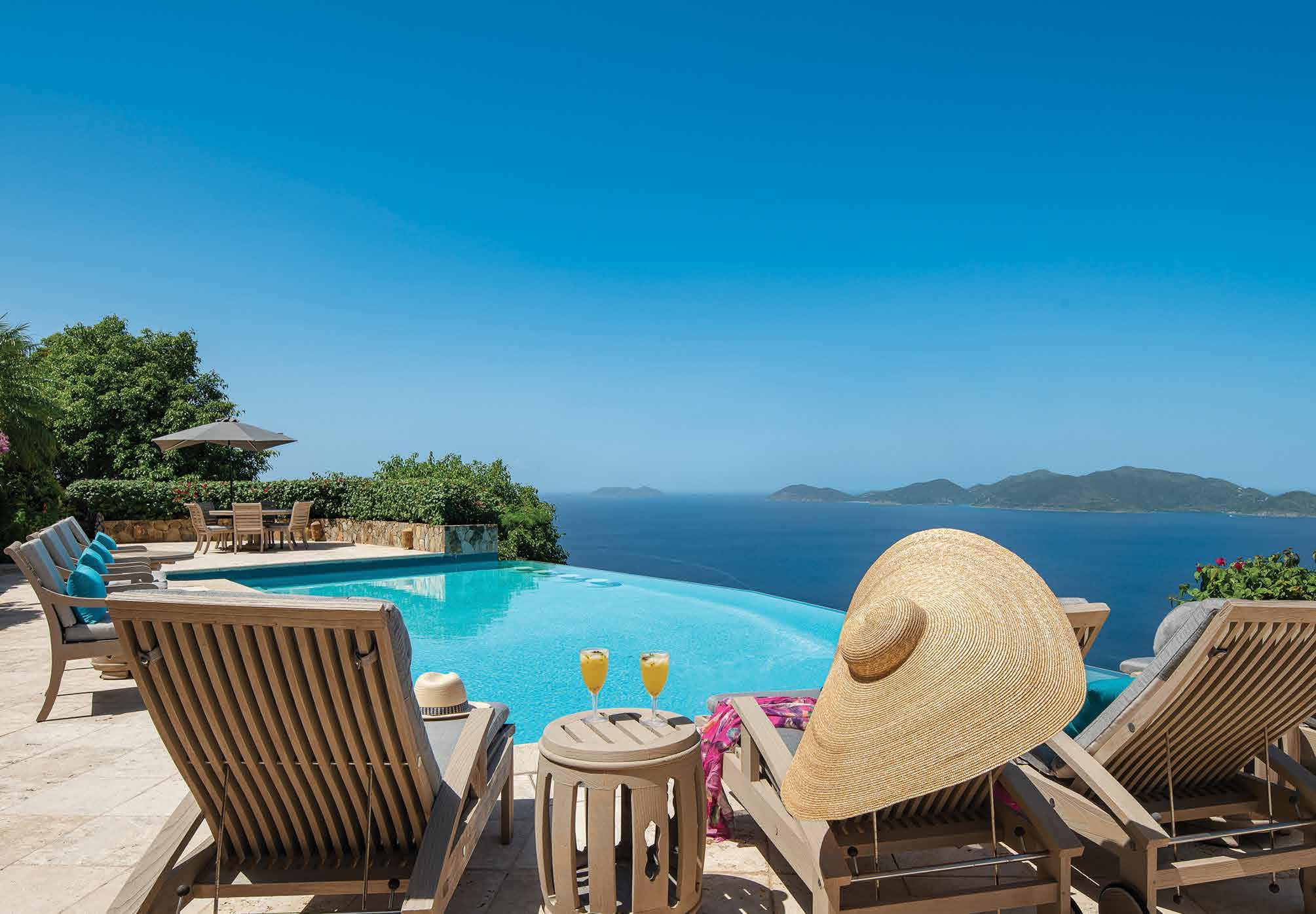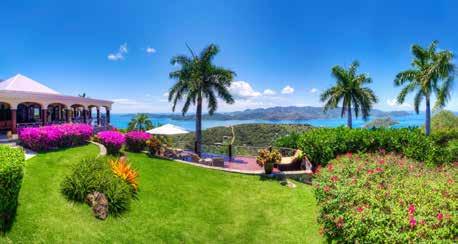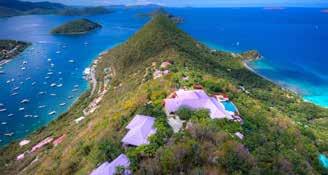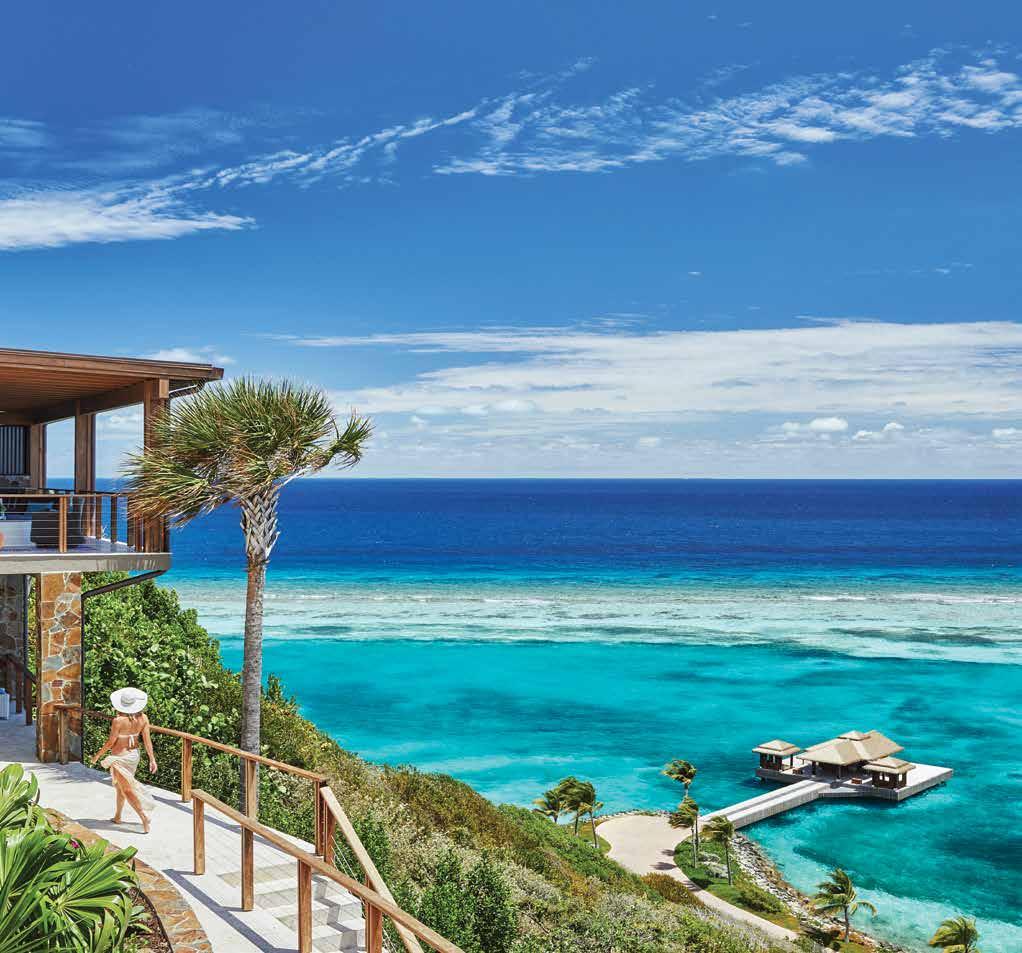


























































FOCUS
GROUP DISCUSSIONS
94 A state of the tourism industry discussion
106
PANEL:MATTHEW COWMAN, JEFFREY KIRK, VANESSA KING, JEROEN HOOGENDIJK, CLARENCE FAULKNER, ROBERT BRIANT, GEORGE WESTON, ELIZABETH KILLEEN
 a sovereign
a sovereign
What’s
going on in the luxury travel space

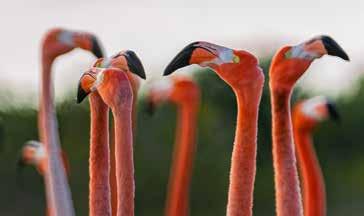



As I pen these remarks, the current debate raging in London is over the just published, January edition of the IMF World Economic Outlook Update, which forecast that the UK will be the only major developed economy to slip into recession in 2023. This, coming after headlines the previous day that the UK Army was no longer considered a tier one fighting force. One commentator reflected that, this is what happens when the country has seen four Chancellors of the Exchequer in a month and with the sitting government double digits behind Labour in the polls, ahead of advancing general elections. This is all about confidence. Or in this case, the lack of confidence and what it means for any country. In the case of our beloved BVI, our confidence about the future has been shaken and our ability to successfully navigate the same in the near term. Confidence is a commodity. One that is critical to the success of any modern economy. Since 2017, our confidence in the BVI has been serially shaken at a very foundational level. First came the double whammy of two category five hurricanes, followed by a global pandemic two years later. Fast on its devastating heels, a year later, the appointment of a Commission of Inquiry into Governance in the Territory; the principal recommendation of which, was the partial suspension of the constitution. Essentially, the suspension of the hard fought for democracy in these British Virgin Islands. A recommendation accepted by the UK’s FCDO, two short months after Putin’s attempt to snuff out Ukraine’s democracy. To cap it all off, this announcement was made by the Governor, coupled with his release of the COI Report, one day after the arrest of the then Premier in Miami, at the end of last April. Clearly, a sustained broadside that would rattle the confidence of all, but the Angels guarding St. Peter’s gate.
It goes without saying, that just as confidence is contagious, the absence of confidence is equally so. It is critical that as a territory we move collectively, to do all we can to shore up longterm confidence in our economy, given the beating it has taken over the last several years. Not just from the pandemic, but also from ill conceived governmental action and policies. The time is opportune for the territory to implement a robust growth agenda. One that invests in the economic muscle of the BVI.
Such an agenda would entail the territory threading a series of needles over the next several years, in a very disciplined manner. Some concurrently, while others with a bit longer window on alternate paths, all coalescing within a 3-5 year period. In our estimation, the primary needles are; The general elections, immediately up ahead - electing an able and experienced team to the 5th HOA, negotiating a fit for purpose relationship with the UK, inclusive of an architecture that fosters economic growth - in the ever changing global economic environment, diversification of the economy, a mission focused national infrastructure agenda, a human resources agenda directed at talent for a competitive services-based economy and a framework for effectively engaging in a global economy, given the emerging Cold War like blocks.
As we contemplated the direction for this edition, we focused on the critical role of confidence in repositioning the BVI, given the uncertain global economic outlook. We opted for a Special Section (p.54) informed by focus group discussions and augmented with articles and interviews with leading private sector influencers in tourism and financial services. Persons uniquely positioned to share with our readership, their insight into the economic and business outlook for the territory in 2023, and beyond. We did so with an eye on the fact that 2023 will see general elections in the territory, setting political leadership for the next four years.
What follows, is our near 40K words, deep dive into the ongoing discussion of what we as a territory must do to halt our race to the bottom. Regain our footing we must, and return to our former posture of - punching above our weight in our economic space. We believe that the BVI has substantial upside potential for a bright economic future and quality of life. We intend the following three focus groups to help to inform the discussion.
1. BVI FINANCIAL SERVICES FOCUS GROUP DISCUSSION (p.82). An informative dive into the current state of doing business in the BVI and the global challenges and trends that are impacting the jurisdiction, in a sustained period of global uncertainty, economically and geopolitically.
2. BVI TOURISM FOCUS GROUP: A STATE OF THE INDUSTRY DISCUSSION (p.94) An immersive dive into the current state of tourism, informed by the back drop of a destination emerging from the hurricanes of 2017, pandemic overhang, a competitive global tourism space and the ghostly figure of recession in our key markets. A worthy read for anyone, given tourism’s directional pull on the local economy.
3. BVI TOURISM FOCUS GROUP: WHAT’S GOING ON IN THE LUXURY TRAVEL SPACE (p.106) No economic sector in the territory is in greater need of attention than the Tyrannosaurus-rex in the space: Tourism. A failure to refocus tourism, has the potential to impair the local economy, with real consequences. We followed our mantra of seeking out some of the sharpest minds and freshest thinkers, with in the weeds knowledge of marketing luxury travel. Panelists with a granular understanding of brand BVI and what differentiates it in the luxury travel space. We were not disappointed.
As you journey beyond the focus groups, we stay focused on the confidence theme, with a spread of timely articles and interviews with key leaders in the business and economic space. We kick off with - Filling Big Shoes (p.26) an interview with Kenneth Baker, MD/CEO-FSC, and transitions to a growth agenda - Building for Growth: The Key role of Infrastructure (p.57). Next, we segue to - The BVI in the new World Order (p.73) and realise that if you are not world class, you can’t be on the stage - Choosing challenge and chasing growth (p.65) and we ask - How about a sovereign wealth fund for the Virgin Islands? (p.70). Meanwhile we interrogate Mark Pragnell - Charting uncertain Seas (p.34) about his recent report“Beyond globalisation: The British Virgin Islands’ contribution to global prosperity in an uncertain world.” Never to be missed is The Outlook for Real Estate (p.128) a comprehensive sector roundup. Sales increased by 106.5% between 2018 and 2021 with total real estate sales in 2022 likely to match, or exceed, that of 2021. Total sales in 2022 was boosted by a single sale of $44.34M within Oil Nut Bay.
As always, we wrap up with our must read - Investor Conversation with Dr. Juleen Christopher (p.154) looking at her recent acquisition of St. Bernard Hill House, her vision for the estate, her varied interests and a most interesting career.
Enjoy! Please share your feedback at russellharrigan@gmail.com


With matters requiring offshore expertise, you need lawyers who know their stuff and get it right first time. At Collas Crill, we aim to achieve your goals when representing you offshore. When you succeed, we do too. To find out how we can partner with you, visit collascrill.com

Russell Harrigan

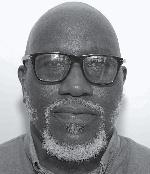
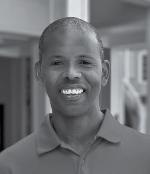
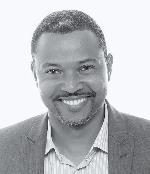
MANAGING EDITOR & CHIEF CONTENT OFFICER
Oyster Publications LTD PUBLISHER
Portia Harrigan PROJECT CO-ORDINATOR
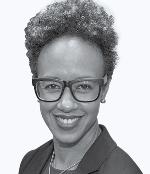
Louie Acantilado Oyster Design Team CREATIVE

Russell Harrigan ADVERTISING
Portia Harrigan BUSINESSBVIMAGAZINE.COM
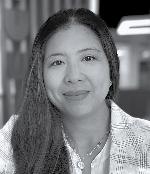
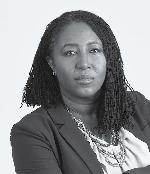




Business BVI is a bi-annual magazine published by Oyster Publications LTD

P.O. Box 3369, Road Town, Tortola, British Virgin Islands
Tel: 284-494-8011 Fax: 284-494-3066 www.oysterbvi.com
Email: info@oysterbvi.com
Please send comments and address changes to this address.
Business BVI and Oyster Publications LTD are divisions of Oyster Global Marketing Group. www.businessbvimagazine.com
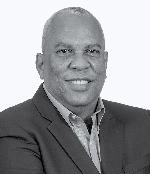
All information in this publication has been carefully collected and prepared, but it still remains subject to change and correction. Use this content for general guidance only and seek extra assistance from a professional adviser with regard to any specific matters. Copyright reserved 2023. None of the contents in this publication may be reproduced or copied in any form without permission in writing from the publisher.
These articles do not constitute tax or legal advice, and no action should be taken based on the information in these documents without first consulting suitable tax or legal advisers. No liability for actions taken, or in action, based on the information in these articles, will be accepted.
Introducing some of the talented individuals whose hard work and creativity helped us to produce this edition.

We are very pleased to welcome back Colin O’Neal to the pages of Business BVI after an extended hiatus, contributing a lead article in our Special Section. It is near impossible to be competitive in the global marketplace without fit for purpose infrastructure. Colin makes a passionate, reasoned and compelling case for why we must up our game and focus on upgrading our national infrastructure. Colin is the Chief Executive Officer of JOMA (Properties) Ltd. He is a graduate of Boston University and the University of the West Indies, and the Norman Manley Law School at the University of the West Indies. He is a member of the Urban Land Institute (ULI), BOMA International, the Congress on New Urbanism and other professional bodies related to law and real estate.
CONSTRUCTION IN THE BVI: SECTOR UPDATE AND OUTLOOK FOR 2023 (p.47)
In this annual update, Marvin interprets the picture of the forces that are having an impact on the construction sector either positively or negatively. He explores the global economy, the banks’ role in the construction process, Town and Country Planning, the British Virgin Islands Government, The Recovery and Development Agency (RDA) and opportunities that contractors are utilising to diversify and expand their services. Marvin also speaks to the redevelopment of resorts in the North Sound area, including Biras Creek which has started its rebuild and have passed the halfway mark and targeting Q4 of 2023 to reopen the first phase. Oil Nut Bay continues to outperform most regional residential resorts, with multiple home lots either under construction or several in the design stages.
THE OUTLOOK FOR REAL ESTATE (p.128)
Real estate sales increased by 106.5% between 2018 and 2021 with total real estate sales in 2022 likely to match, or exceed, the total sales of 2021. However, total sales in 2022 were boosted by a single sale of $44.34M within the Oil Nut Bay development. The stamp duty waiver for Belongers continued to be a key driver for local purchases through to December 2021 with the Government introducing a revised policy in 2022 for first time Belonger purchasers. Edward Childs insight is always well informed and driven by research and analysis. Such sound advice is critical to informing a purchaser or a seller final decision be it residential, investment in a vacation villa or the development of a top tier resort, marina or private island.
BVI FAST FACTS (p.146)
We are indebted to Patlian for her yeoman’s role of ensuring that our Fast Fact Guide is well researched, current and informed. We are delighted to have it once again included In this edition after a brief absence in the last issue. This Guide provides invaluable fingertip information which is especially useful to persons doing research about the BVI from a business perspective or for relocation purposes.
INN AT CORNUCOPIA (p.117)
Sharon has become a regular contributor to Business BVI and we are most pleased to have her input. In this edition she was a panelist and as well as a co-moderator for our tourism focus group discussions. And are excited to have the second edition of SHARON’S TAKE coupled with this article on a new twist on hospitality in Virgin Gorda, which opened in March 2022 in Little Trunk Bay. Owners Inge Judd and Rose Giacinto have said time and time again, that they are not hoteliers, but innkeepers and there is indeed a distinct difference. Friends for over forty years and both have been involved in the BVI tourism industry in varied capacities. Sharon is Director of Operations at Virgin Gorda Villa Rentals and Leverick Bay Resort & Marina.
PUTTING ETHICS IN FOCUS THROUGH A REGISTER OF INTEREST (p.33)
We welcome Ann Encontre to the pages of Business BVI with her inaugural article on the most topical of issues, ethics at the national level in the territory. As Director of the Ethics Office at the United Nations High Commissioner for Refugees (UNHCR) in Switzerland, Ann is eminently qualified to speak to the critical role of a culture of ethics in a modern democracy.
OPPORTUNITIES FOR DEMOCRACY AND BUSINESS: THE HOPE OF THE COI (p.77)
We gladly welcome Noni Georges to the pages of Business BVI with this intersection of the recent COI and business. She states that “Governance is governance, but it is also a business. The business of providing the infrastructure, and the legal and regulatory playing field where citizens and businesses can live, work, trade, execute and enforce contracts and prosper. Governance thus provides the undergird of the BVI business platform.” Noni is an attorney at law and environmental policy consultant, and is the Executive Director of the Georges-Rhymer Institute for Public Policy, an independent non-partisan not-for-profit which seeks to improve environmental quality; improve public policy analysis, articulation, and implementation; improve access to justice; and promote a more just and equitable national vision for the Virgin Islands.
OPPORTUNITIES FOR DEMOCRACY: THE HOPE OF THE COI (p.76)
The perspective of our young people on all matters affecting the territory is invaluable. We turned to Joseph ArchibaldBowers for his thoughts about the COI and its implications for the territory. Those recommendations will undoubtedly shape governance in the territory for many years. In this piece, Joseph reminds us that - “Robust democratic governance, with functioning checks and balances, is the best system we have to deliver business freedom and economic prosperity.” He is a writer and an Associate at the Georges-Rhymer Institute for Public Policy assigned to the COI Citizen’s Review Project, which seeks to explore the COI process, report and recommendations and engage, particularly with young people, in a deeper reflection and analysis of the implications for the BVI. He is passionate about financial literacy and civics.
CHOOSING CHALLENGE AND CHASING GROWTH (p.65)
Readers of this edition will repeatably encounter the case being made for a Growth Agenda for the BVI, one that we see as critical to repositioning the territory in an uncertain global economic landscape. No one better exemplifies making such a pivot than Jennifer Potter, a steadfast contributor to Business BVI over many years. Having recently transitioned from the public sector back to the private sector, we asked her to reflect on the same, at a national level vis a vis the global space. “Transitions are naturally reflective, and I’ve thought about purpose and impact. Mine involves problem-solving and strategy. I see the BVI’s place in the world, and our geopolitical relationships, as being ready for a transformation. It is a value I can offer simultaneously to the industry and the Territory” she writes in this must read article. “On a priority list, I would include a pro-business climate, modern infrastructure (physical and digital), skilled workforce, broadband penetration, sustainable development policy frameworks, and access to global markets” she implores us a territory. Jennifer is Head of Operations, Risk and Compliance and has a range of leadership responsibilities at George Henry Partners LP.
THAT AHA MOMENT! ACHIEVING VISION POSSIBLE IN FINANCIAL SERVICES (p.62)
9.
HOW ABOUT A SOVEREIGN WEALTH FUND FOR THE VIRGIN ISLANDS? (p.70)
As a territory we must think in a strategic manner. We asked the most able Kinisha Forbes to explore the idea of a Sovereign Wealth Fund (SWF) for the BVI. She states that “A question sadly, often asked in some form in these Virgin Islands is: “What happened to the billions of dollars that have passed through Government coffers over the last thirty-five years?” She concludes that “Alongside the very obvious physical infrastructural deficits of our Territory, there is another looming deficit present in these Virgin Islands that should not go unattended: the Virgin Islands is not secure enough.” A SWF which by definition is a Government-owned investment fund of money generated by the Government, can boost our security in this increasingly uncertain global climate. Kinisha is Head of Monitoring and Evaluation at the RDA and maintains a laser-focus on results, and previously she was Head of the Macro Fiscal Unit in the Ministry of Finance.
THE BVI IN THE NEW WORLD ORDER (p.73)
Neil Smith is a no stranger to Business BVI and is uniquely qualified as a former Financial Secretary to speak to the BVI place in the New World Order. “Our progress did not come without effort, nor did it come by chance. We earned it. We had to overcome innumerable challenges and obstacles along the way.” — Dr. Robert Mathavious. Neil states that “In no other facet of BVI society is this such a potent truism - than in the financial services and tourism sectors. They are sectors that have built on and further expanded by the efforts of only a few pioneers. Today, we are challenged to further define and clarify the role that our BVI should play in the global landscape. To do so, however, it is important that we first understand the role that it currently plays.” Neil is currently Director, Programme Strategy Department at the RDA.
13.
Nearly 10 years since the inception of The McKinsey Report, Ayana Glasgow, a frequent Business BVI contributor askVision Accomplished? She writes that “Today, some will say that the BVI’s success in international financial services was more luck than vision. The sustainability of that success, however, would prove naysayers wrong. It logically follows that in 2014, the BVI Government embarked on a collaborative exercise, facilitated by the global consulting firm McKinsey. With contributions from local and international thought leaders, on the financial services industry - Building on a thriving and sustainable Financial Services Sector in the British Virgin Islands - was published.” The McKinsey Report articulated the BVI’s financial services strategic vision. Ayana is Executive Director/Resident Manager ALEMAN, CORDERO, GALINDO & LEE.
THE BVI A BUDDING ‘GLOBAL SOFT POWER IN SPORTS (p.52)
The BVI is known by its many admirers in the global marketplace, as a territory that is capable of punching above it weight in financial services and tourism. It is quietly adding sports as a third space of prowess. We asked Dean Greenaway in this, his first time at bat in Business BVI, to drill down on how he sees this potential further cementing brand BVI. In his article, Dean reminds us of the national joy we felt during the Tokyo games, where he said that “All told, by the Tokyo Olympics, BVI athletes had won seven medals in six different competitions, and had reached World Championships and Olympic Games finals, with McMaster earning 4th place finishes in both events.” Dean is himself a former Olympian having competed in the 1984 Summer Games.
14.
FUND ADMINISTRATORS AND WHERE TO FIND THEM: THE BRITISH VIRGIN ISLANDS (p.44)
We welcome Cecilia Matthews with her inaugural article looking at Funds and Fund Administrators and their role. As of 30 June 2022, the BVI Financial Services Commission (“FSC”) statistical bulletin published quarterly, stated that there are over 1,800 registered funds in the jurisdiction. They range from open-ended funds such as Professional, Private, Public, and Incubator and Approved funds to closed-ended funds such as the recently promulgated Private Investment Funds, most commonly known as PIFs. Cecilia is a funds aficionado as a Director of ATU Fund Administrators (BVI) Limited and is a Certified Public Accountant. She spent eight years in the Cayman Islands working with two large Fund Administration service providers overseeing many complex fund structures and providing first class solutions.
Ocean Villa
Oil Nut Bay’s newest neighbourhood, The Ocean Villa is unlike anything else on property. With 8 lots right on the water’s edge, 2 have already sold and the remainder will not last long. Positioned right at the ocean’s edge with zero setback, Oil Nut Bay’s Ocean Villa Neighbourhood is entirely unique to the Caribbean. Boasting ocean frontage of 110 to 160 feet, each home site is able to accommodate a home where every living space and bedroom enjoy uninterrupted sea views. While two of the total eight homesites are already spoken for, of the six remaining, three are on offer as blank slates upon which to create the ultimate dream home. Oil Nut Bay will shortly break ground on the second three creating three-bedroomed developerdesigned model homes. The Ocean Villas offer truly incomparable door to shore living!

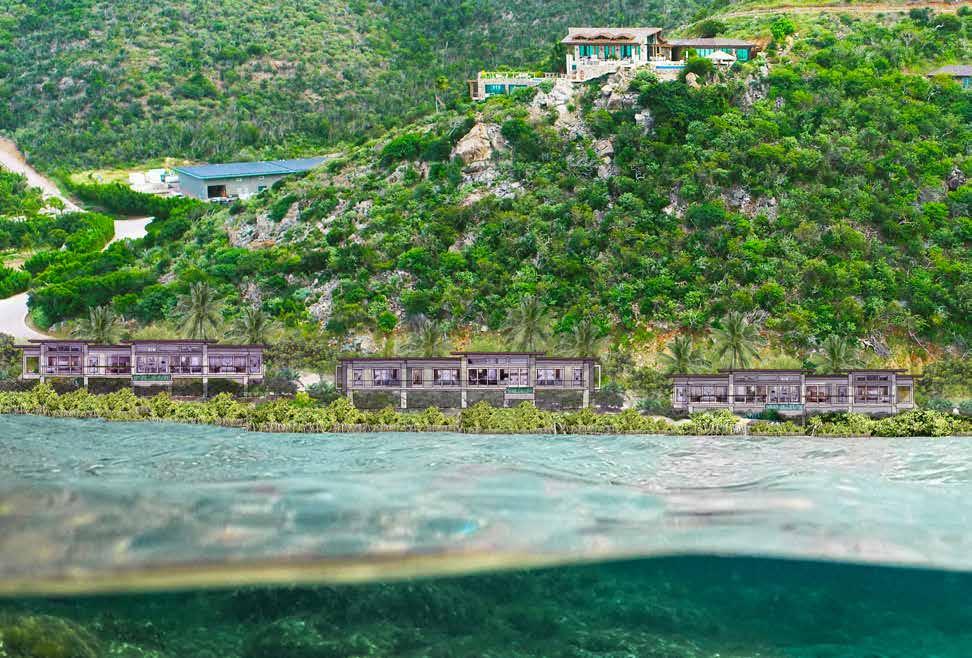
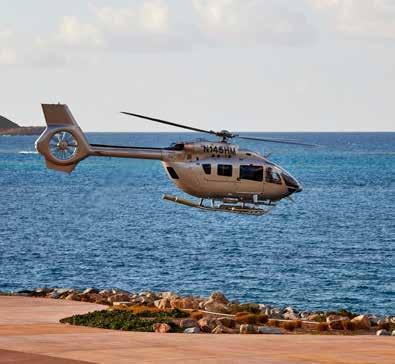
Oil Nut Bay has unveiled a brand-new heliport certified for international arrivals – the first and only in the region. This service is available exclusively for the use of owners and guests of Oil Nut Bay. Direct flights are now available from St. Thomas and San Juan, offering a luxurious and smooth arrival experience with breathtaking views. In addition, guests can utilize the heliport to travel to St. Bart’s, St. Maarten, Anguilla and other nearby islands, allowing for easier travel access within the Caribbean.
The heliport has ICE immigration clearance on-site and the staff are fully trained and certified in all aspects of helicopter travel. As the resort is only accessible by boat or helicopter, this new service saves valuable transit time for guests and provides an arrival experience that is truly second-to-none.
In addition to the helipad, Oil Nut Bay is introducing several exciting enhancements for 2023, including a reimagined Beach Club with an updated restaurant space featuring revamped lounge areas, a new menu concept and a private dining area. The Pavilion will be transformed into a guest arrival lounge experience with an updated bar for cocktails and light bites. Additional new offerings for 2023 include a more comprehensive butler and chef service, an on-call rum butler, a curated cigar menu and sushi-making classes.

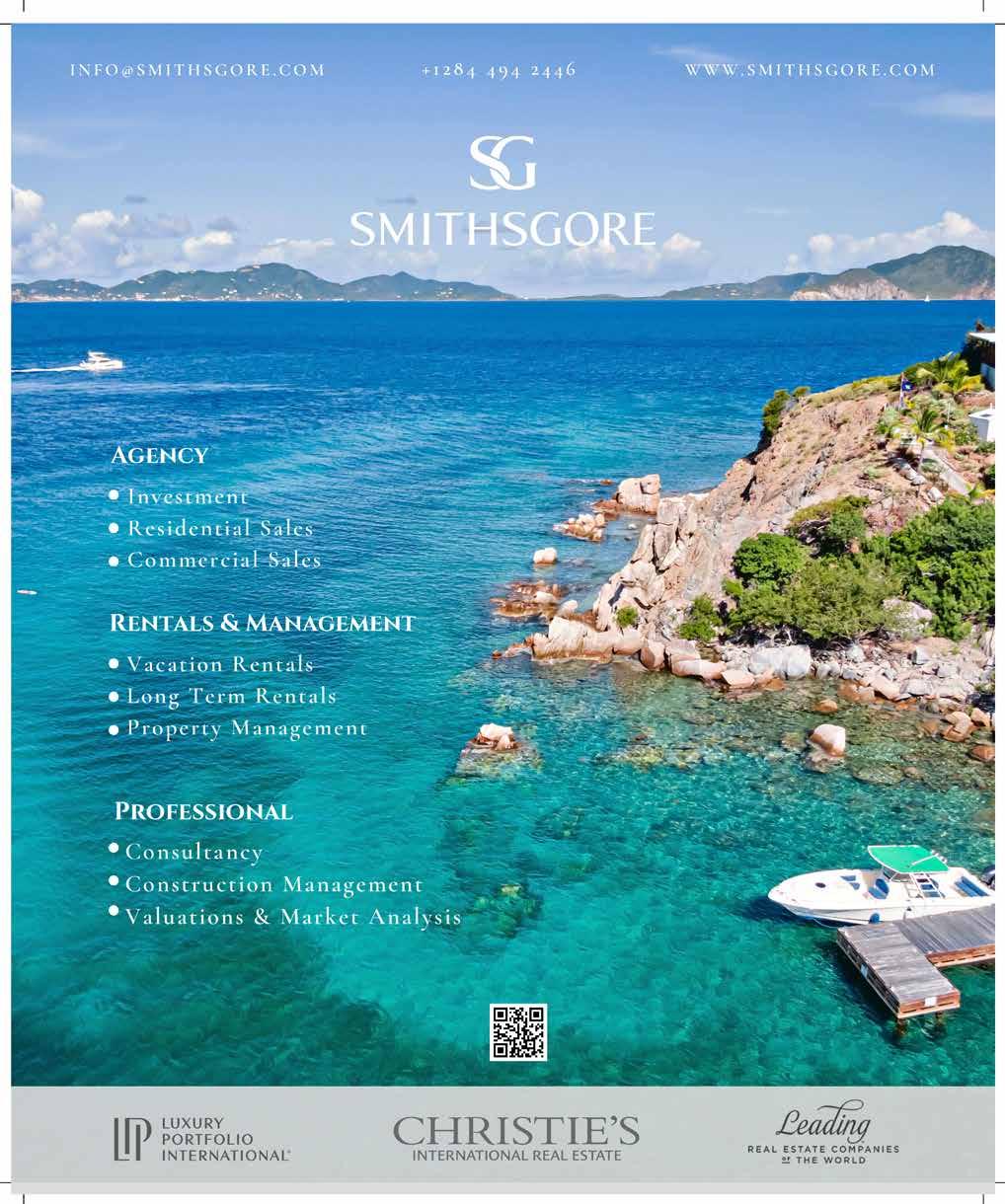
Industry analysts worldwide are saying that tourism is rebounding in a very big way. At Caribbean Hotel and Tourism Association’s MarketPlace, held in San Juan Puerto Rico in the Fall, discussions were held as regional tourism leaders weighed in on the outlook for the Caribbean against the backdrop of the pandemic, global warming and the world economy. The Caribbean has the distinction of leading the global tourism rebound. Jamaica boasted about their record of the highest arrivals ever in the history of the island’s tourism. The United States Virgin Islands (USVI) revelled in highest growth rate in the reason surpassing many previous records.
What does all this mean for British Virgin Islands tourism? It means that we have the potential to again take our rightful place as a leader on the Caribbean tourism ladder. Tourism in the BVI suffered a drastic downturn, fuelled in large part by the hurricanes of 2017 and the pandemic, but this was compounded by revised policy regulations of the yachting sector and unforeseen negative posture by a government that relegated tourism to the back burner. Listening to tourism ministers from several other destinations, a common theme was that the industry suffered from a lack of respect, as well as an understanding from other branches of government as well as residents as to the industry’s importance in driving regional economies. The pain of that has been felt by other countries, but none as severely as The BVI, which has no other supporting industry apart from Financial Services, which continues to see its own troubling times and a challenging long-term forecast.
The British Virgin Islands like many other Caribbean destinations is severely challenged by human capacity to support the tourism industry. There is a chronic labour shortage, hampered by the


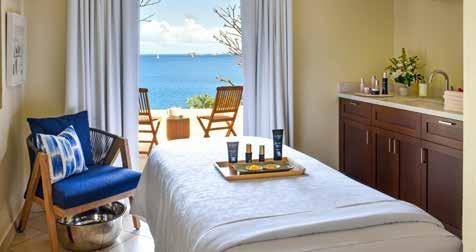
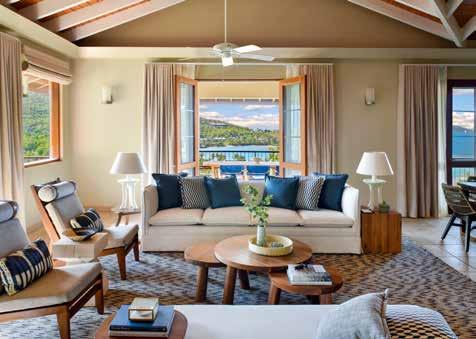

inability of the local Labour Department to process work permits for expatriate workers in an expeditious and timely manner, where it doesn’t negatively affect the operation of businesses. We realize as well, that tourism workers are some of the lowest paid as punctuated by statements of the Tourism Minister of Jamaica, Edmund Bartlett, a foremost and respected tourism leader in the Caribbean and the wider tourism world. We, like many others are seeing a brain drain and the inability to engender the younger generation to seek careers in hospitality. There are very few British Virgin Islanders in executive level positions in an industry which employs one in five persons.
Climate change and the resounding effects of global warming, as well as the ever-present threat during hurricane season, is yet another challenge that faces the territory. We are in the “hurricane belt” where we are seeing the increasing severity of storms. An already non replenished Treasury that is still funding the rebuild from damage realized more than 5 years ago. Coupled with the pandemic and the additional strain placed on an already challenged Health Care system, funding and financing for government infrastructure projects to support tourism looks bleak. The road ahead will be tough without some imaginative and experienced leadership at the tiller.
The British Virgin Islands Government wants to see increased visitor arrival numbers to the destination but in 2016 when BVI’s tourism was at its most historic levels, with over 1 million visitors per year, the infrastructure was hard pressed to support and cope with those numbers. The strain on beaches, parks, museums, transportation
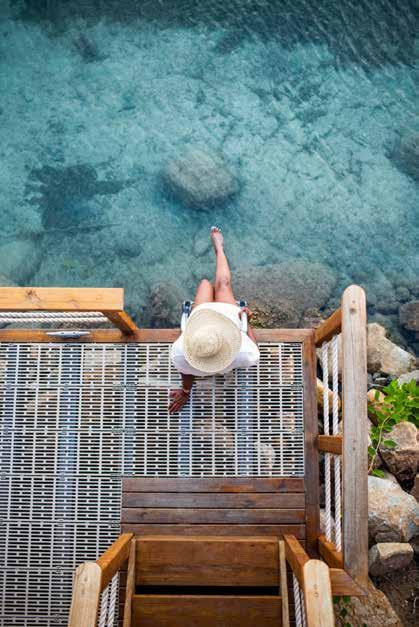

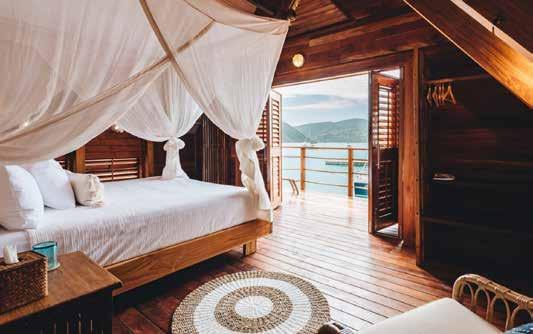
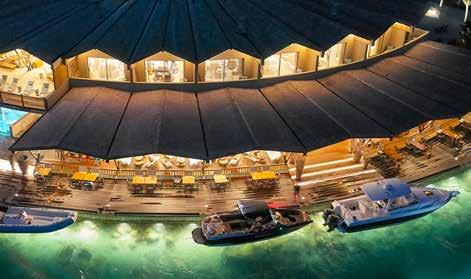

were evident. The hurricanes and the pandemic reduced these numbers considerably. Based on the numbers YTD for 2022 we are projecting to still be at about 50% of 2016 levels with an infrastructure that can barely support what we have now, much less any significant sustained increase. Capacity studies as well as those that backed up the need for enhanced, ports, roads and policies to support tourism growth have been many, but the commitment and financing to support this are currently not on the horizon.
There is the recognition that access to the destination should not be at the whims of other gateways outside of the BVI, but the quest to build a larger air terminal on the main island, as well as a longer runway continue to be on the table, but the reality is that any such completion is years away. How do we support access when our seaports as well are challenged. There are designs on the table for seaport enhancements, but no meaningful and large-scale development can be seen. Leadership and imagination are needed to move these to reality.
Tourism must be managed in a far more holistic manner to ensure that the islands receive their full benefit. Investors have taken a very cautious approach to opportunities in The BVI. Many have been timid or even scared away for the time it takes to have a project green-lit and others have expressed frustration in the governmental process even when permission is granted. Many potential investors have settled for other opportunities in the Caribbean where the climate and posture have been more
While we posture and are unsure due to the lack of a National Strategic Plan for Tourism and a meaningful action-oriented approach by Government, our competitors have targeted our visitors determined to reduce our market share. Our competitive setneighbours such as Anguilla, St. Lucia and Antigua never outpaced us in overnight arrivals, they have now exceeded our numbers and are fighting for market share unabashedly. This is unheard of. Destinations such as Dominica and St. Vincent and the Grenadines now boast of direct air access and have innovative global marketing and public relations campaigns that rivalled anything BVI had in the marketplace before. BVI once had the enviable position of the “Sailing Capital of the World” and we are now seeing destinations such as St. Vincent and The Grenadines as well as St. Lucia and even the United States Virgin Islands encroaching on what was once ours for the keeping. Remedial and swift action are required to counter these threats. We must not assume that our competitors will rollover and play dead.
Notwithstanding the challenges mentioned, The British Virgin Islands still holds the cache of one of the premier luxury destinations in the Caribbean. We still possess strong fundamentals in the luxury space. Travel and Leisure released a well placed and timely article at the end of 2022 entitled “How Virgin Gorda is Making a Comeback”. Virgin Gorda was also named as one of the top destinations to visit in 2023 by Forbes Magazine, the only Caribbean Island to earn that distinction, proving that tourism in the BVI is quite resilient and can still benefit from a very high repeat clientele who are anxious to revisit “Nature’s Little Secrets”. The accolades continue enhanced by the reopening of many of the iconic luxury sector’s Grande dame properties such as Rosewood Little Dix Bay, (rosewoodhotels.com) who gained the distinction of being named as one of the leading properties in the Caribbean by Condé Nast and Travel & Leisure. They now feature full butler service and have their own gardens and host trendsetting organic dinners. Most recently Virgin Gorda was named to Forbes’ List of Places to Visit in 2023 – as stated earlier, the only Caribbean Island to have this distinction. Notwithstanding the pandemic, many businesses have sought to reinvent and reinvest in themselves, and we see a fairly bright rebound from the pandemic. Saba Rock (sabarockbvi.com) and Bitter End (beyc.com)are now open and re-welcoming yachtsmen and other guests with new
services as well as scintillating and delectable new menus. The overwater bungalows at Bitter End are reminiscent of sleeping on the decks of an antique sailing vessel, complete with the lull of the waves.
Many new luxe villas are now welcoming guests namely Xela and Edge of Paradise – four bedroom villas at Oil Nut Bay, (oilnutbay.com) along with three new marina villas. Rounding out their other big news is that their Heliport received approval for international flights and their newly redesigned Beach Club is welcoming new guests. Other new developments include The Village Estate at Moskito Island, Segura and La Vida at Virgin Gorda Villa Rentals (vgvirgingordavillarentals.com). New to Jost Van Dyke is The Hideout Villas (thehideoutbvi.com) which feature one and two bedroom units right on the beach with their own private plunge pools.

An unofficial count puts the British Virgin Islands at more than 400 villas and the new hot vacation destination for the traveler who is looking for all the amenities of a luxury hotel, but with a bent on privacy and aloneness. This includes new ownership at St. Bernard’s Hill House on Tortola (stbernardshillhouse.com). Long Bay Hotel at the West End
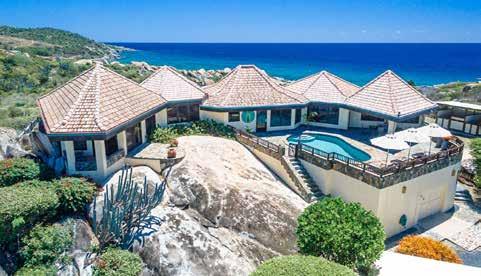

reentered the villa market with fabulous hillside villas (longbay.com).
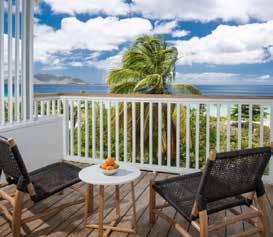


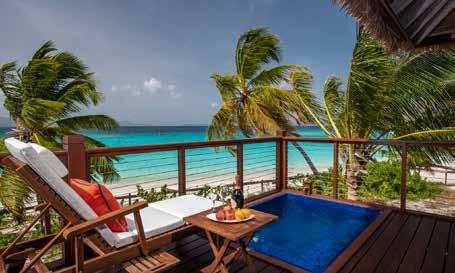

The Foodie scene is heating up literally in many ways. PRIME (primedinevi.@gmail.com) is the new in place in the heart of Road Town overlooking main waterfront drive in both directions. PRIME features a roof top coffee and cocktail bar as well as a private dining option overlooking Road Town. Floor to ceiling windows and an open kitchen make this a spectacular addition to The Dove and many of the coffee bars around town.
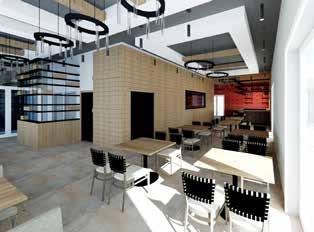
The Dove, CocoMaya, Sugar Cane and many others are boasting new menus for the season. Nova at Oil Nut Bay now has brunch on both Saturday and Sunday in a spectacular setting. Blunder Bay provides the only seaside air-conditioned dining experience in the North Sound Area. Local cuisine as well as street food is a great way for guests to truly experience a “Taste of The BVI” There are many great local haunts. On Virgin Gorda Mermaids and Pirates as well as Village Café delight. Not to be missed are Mama Africa’s as well as Juliette’s kiosks along the main road and DMC White Oleander Destinations (whiteorleaderdestinations.com) host foodie tours to tempt the taste buds. As usual White Bay restaurants and Foxy’s are ‘must dos’ while in Jost Van Dyke. Anegada remains a seafood lovers haven.
I continue to look forward to the ever-evolving tourism scene in the British Virgin Islands. For sure it’s never a dull moment and that’s my Take for this edition. Enjoy.

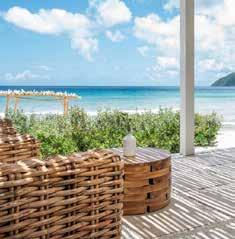
-Sharon Flax-Brutus
In what is seen as a transformative announcement, American Airlines plans to launch direct flights to the British Virgin Islands starting in the 2023 summer season, a boost for the territory that has been actively seeking to attract service from a North American airline.
American regional affiliate Envoy Air will begin operating from Miami (MIA) to BVI’s Lettsome International Airport (EIS) from June 1, 2023. The carrier will fly the route daily with an Embraer E175 aircraft.

American said the service will be seasonal, running “through the summer,” but will also be operated during the winter season with flights set to restart in November 2023 after a brief pause.
BVI is without direct air service beyond the Caribbean so the connection to MIA, an American hub, is significant. Hon. Kye Rymer, Deputy Premier and Minister for Communications and Works, had previously said American was one of eight North American airlines with which a delegation from the territory met last October at the Routes World 2022 conference in Las Vegas.
But the American regional flights will connect the territory to the Oneworld carrier’s extensive global network via MIA, providing tourists, residents and other visitors with a means to get to BVI other than via ferries or short-hop flights from other Caribbean islands.
“This venture to have [nonstop] flights between Miami and the British Virgin Islands will make it significantly easier, faster and more affordable for persons from around the world to come to the British Virgin Islands, which is one of the must-visit tourist destinations in the world,” Rymer said in a statement announcing the new service. “Our residents will also benefit from convenient connections for business and leisure travel to dozens of destinations across American’s route network.”
American VP-Miami Juan Carlos Liscano noted the Oneworld carrier operates to 70 destinations in the Caribbean and Latin America. “This year demand has remained strong for Miami travel,” Liscano said.
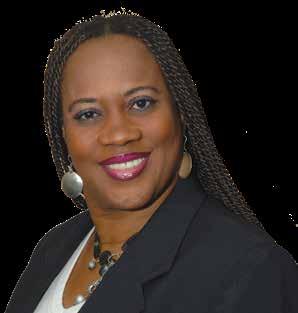
Lynette Harrigan, Niche Marketing and Tourism Liaison Manager at the British Virgin Islands Tourist Board & Film Commission received the award of Member of the Most Excellent Order of the British Empire (MBE) from His Majesty King Charles III for her contributions to International Travel during the COVID-19 pandemic and to the community in the British Virgin Islands. This special recognition was given in the announcement of His Majesty King Charles III’s New Year’s Honours List and is well deserved.
Lynette, who has served the BVITB for over 20 years is highly regarded in international tourism circles and has helped to build the reputation of the British Virgin Islands as a top destination for romance, sailing, dive adventure, luxury and meetings and incentives travel. Her work has helped to diversify the tourism mix and create more business during the traditional tourism “off-season”.
In a press release by the Government of the Virgin Islands announcing the award, Lynette was said to have, “Provided exceptional service to hundreds of tourists and industry partners, even during the recent challenges. During Irma, she offered a lifeline to international partners providing crucial updates and in COVID, she assisted tourists and locals in navigating the changing and at times complex quarantine protocols and producers. She became the ‘go to’ person, working exceptionally long hours to offer around-the-clock assistance to resolve COVIDrelated travel issues.”
Commenting on the award, His Excellency Governor John Rankin, CMG, said, “Lynette is a great representative for the BVI. Over the last two decades, she has repeatedly gone above and beyond in her work for the BVI Tourist Board. She strove tirelessly throughout the pandemic to support travel, which was appreciated by both the industry and tourists. This award rightfully recognises her outstanding achievements for tourism in the BVI, particularly through COVID, as well as her contribution to the wider community.”
Director of Tourism Mr. Clive McCoy said, “Lynette is a highly valued employee of the BVITB who always answers the call in times of crisis. She provided exceptional service to both our visitors and residents travelling to and from the BVI during the COVID-19 pandemic. She continues to play a pivotal role as the Board’s Tourism Liaison to the BVI Government. Congratulations to Lynette, as she is truly deserving of this prestigious award.”
Ms. Harrigan responded, “I am grateful that His Majesty has bestowed the honour of the MBE on me, and I shall continue to serve my community with pride and humility. Though each day presents new challenges, I am driven to succeed and am truly appreciative of this recognition.”
The MBE is awarded to an individual “for an outstanding achievement or service to the community. This will have had a long-term, significant impact and stand out as an example to others”, according to the Government of the United Kingdom.
Business BVI extends our hearty congratulations to Lynette for her continuous hard work in positioning the BVI as a top tier luxury destination and for receiving this most deserving award. She earned it. A great use of an MBE.


he British Virgin Islands International Arbitration Centre (BVI IAC) in late January announced the appointment of Ms. Shan M. Greer as Chief Executive Officer. In that capacity, Ms. Greer will be responsible for the overall growth, management and operations of the institution, as well as being the head of the Secretariat of the BVI IAC. In this dual capacity, she replaces previous CEO, François Lassalle, who served from the founding of the BVI IAC and Hana Doumal, who served as Registrar from January 2021.
Ms. Greer has a distinguished career in private practice in the Caribbean, Europe, and North America as arbitrator, adjudicator, dispute board member, mediator and counsel on a wide range of complex and high-value transactional and commercial disputes in the construction, infrastructure, energy, banking and finance, hotel and property development, oil and gas, telecommunications, and water sectors. Ms. Greer is well known in the Caribbean as a strong advocate for the development of arbitration practices, policies and initiatives and for her involvement in the training of legal and arbitration professionals. Prior to her recent appointment, Shan was the President of the BVIIAC Arbitration Committee.
Speaking on behalf of the Board of the BVI IAC, John Beechey CBE, said that the Board had been enthusiastic in its unanimous decision to offer the post to Ms. Greer. The Board had every confidence in her to lead the BVI IAC into its next phase of development, having negotiated the turbulence of Hurricane Irma and the pandemic.
On her assumption of her new role, Shan said: “I am excited about taking on this new challenge as CEO of the BVI IAC. Francois and Hana did an excellent job building the BVI IAC brand, and I look forward to adding value to their hard work. The BVI IAC provides world-class arbitration services from our state-of-the-art facilities, together with full administrative and recently updated arbitration procedural rules. BVI is also a signatory to the New York Convention and has adopted the UNCITRAL Model Law, which means parties choosing BVI as their seat will benefit from its quality legal framework and stable political environment. Certainly, there is a lot to be excited about in BVI.”
Ms. Greer also highlighted that, “while the BVIIAC’s facilities and rules in and of themselves weigh highly in its favour, I appreciate an institution is only as strong as its people. Rest assured, the Centre’s staff and the local arbitration and legal community are more than capable of meeting international standards.”
Under Ms. Greer’s leadership, in the next few months, the BVI IAC will launch new services and initiatives designed to meet the demands of its key markets and firmly to establish the Centre’s place as the leading arbitration institution in the Caribbean.
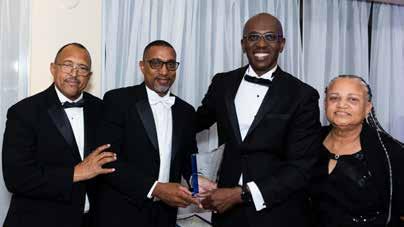
ATt the BVI Investment Club’s 30th Anniversary Black Tie Dinner in the Fall with attendees including the Territory’s leading business executives, leading members of Government, and visiting regional guests, CCT’s Chief Executive Officer, Averad Penn, was awarded the BVI Investment Club’s (BVIIC) Corporate Leadership Award.
The award acknowledges and celebrates exemplary leadership that has a significant and positive impact on advancing the organisation led by the recipient. Within the Club’s varied portfolio of interests, the recipient must demonstrate initiative, promotes a work environment that is respectful, collegial, and supportive, leads an effective team to achieve results, and is an excellent role model.
In accepting the award, Penn acknowledged the hard work of his entire team at CCT. “I humbly accept not as an individual but on behalf of all the managers and staff of Caribbean Cellular Telephone who make me look good every day. Leaders are only as good as their people, and I am very fortunate to have such excellent people.”
Penn also thanked the BVIIC for acting on its vision of economic empowerment for Virgin Islanders. Penn adds, “The Club’s initial investment has provided the opportunity for our young people to find a remarkable opportunity at a dynamic, agile, and competitive telecommunications company. We have proven that we have what it takes to compete with the big multinational providers, and if given a chance, we are as good, or better, than anyone.”
Penn became the CEO of CCT in 2013 and swiftly began reorganising the company. Under his leadership, CCT was led from a deficit position to profitability while navigating regulatory and technological changes and the historical impact of the Hurricanes in 2017.
Other awards given out on the celebration of the Club’s 30th anniversary year were the Secretariat Award to Ermyn Richardson; Community Awards given to Judith Charles and Nurse Bernet Scatliffe; and Entrepreneurship Awards to Kristin Fraser and Sinclair Flemming.
The BVIIC was started in 1992 by a group of Virgin Islanders and Belongers who had a vision of meaningful participation in the economic development of the Virgin Islands. The group strongly believed that through collective efforts, they could achieve far greater success than individually. Since then, the group has amassed assets valued at approximately US $100M.


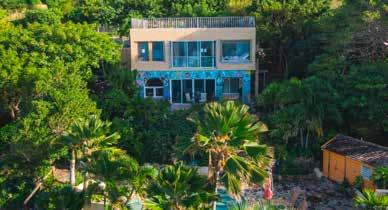
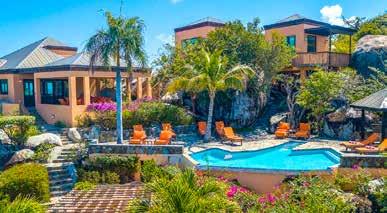
Virgin Gorda Villa Rentals (VGVR), the leading management company for luxury villas on Virgin Gorda, BVI continues to expand its impressive portfolio. Known for their unique coastal and luxury villas with breathtaking views and beachfront locations, the four new villas have diversified the company’s product offering, giving travellers more top choices in terms of luxuriousness, size, style, and sheer character.
These villas have increased VGVR’s portfolio to 28 with villas ranging in size from one to six bedrooms, offer high-end amenities, that are ideal for families, couples and small groups. The villa’s locations create the perfect backdrop for small destination weddings and special celebrations. “Our villas deliver the ultimate getaway with so many amazing choices” stated Sharon Flax-Brutus, Director of Operations. Most of the villas can be booked directly, through a travel advisor or villa tour operator. Travellers and trade partners can check availability and book through the easy-to-use online reservations platform available on the website. Rates are commissionable to the trade.
Amateras is a 5,000 square-foot estate which can be rented as one’s own private resort. Perched on 1.5 acres of hilltop and set among the mighty boulders found only on Virgin Gorda. The villa offers dramatic 360-degree views of both sunrise and sunset over the Atlantic Ocean and Sir Francis Drake Channel. With three independently appointed pavilions, Amateras’ can comfortably accommodate up to eight people.
LaVida is a luxurious 5 bedroom, 7 bathroom beachfront villa in a secluded, private setting on the Virgin Gorda’s western shores. Every room faces west with ocean and beach views and breathtaking sunsets. Privacy is paramount, and guests are just mere steps from the turquoise Caribbean Sea. Villa LaVida features expansive decks surrounding a large infinity pool which offers stunning views of surrounding islands. A few steps down the artisanal stonework pathways brings guests to a virtually private beach.
Segura is a newly built ultra luxurious hillside villa located at the top of Leverick Bay. It is a different type of villa given its carefully designed features. Spectacular and unparalleled views of the North and South Sound as well as the islands of Moskito, Necker, Eustatius and Saba Rock. Five bedrooms with their own private patios facing the North Sound, a large kitchen, an expansive dining pavilion, an infinity pool, polished concrete floors, fire pit for cool nights, make this villa is a truly serene escape. Set on three levels, Segura is one with nature, from its top floor seating where one can enjoy the sun or moon rays to its interior design and muted and natural hues. A small, equipped gym on the lower level sets the perfect tone. www.vgvirgingordavillarentals.com or email vgvrbvi@gmail.com.
Paradise Lane, which was completed in early 2022 is located on the beachfront community of Nail Bay Estate. This centrally air-conditioned 2-bedroom 2.5 bath villa is situated within a lush tropical garden bordering the ultra-exclusive private Nail Bay Golf Course. Elegantly appointed it has an over 1,000 sq. ft. roof top deck, as well as all the latest technological conveniences. The beach is only a short pathway from the villa and guests also have complimentary access to all the facilities of Nail Bay Sports Club.
INTERVIEW: KENNETH BAKER
For two decades before that, the agency was led by Dr. Robert Mathavious, an industry giant who was lauded on his recent retirement - see Business BVI winter 2021/22 - for helping build the economic pillar that today brings in more than half of government’s revenue.
Last fall, Mr. Baker sat down with Business BVI Managing Editor & Chief Content Officer Russell Harrigan at the FSC offices and during a nearly two-hour interview, he fielded questions on topics including his leadership philosophy, the pending public company register, economic tensions emanating from China, Taiwan, Ukraine, inflation and his strategy to help guide the industry through an uncertain future
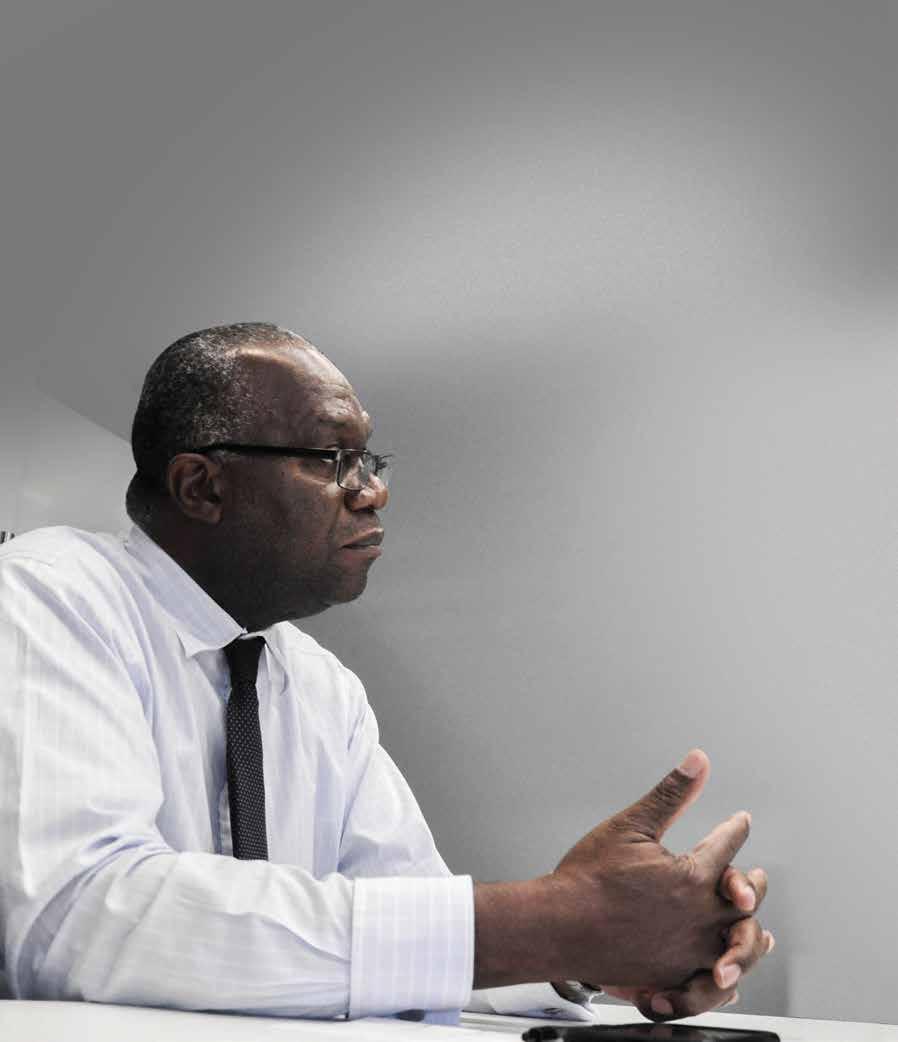
Business BVI: It’s been nearly two years since you assumed responsibility for the managing director position here at the Financial Services Commission. What has been your biggest challenge so far, and your most satisfying accomplishment.
Kenneth Baker: It has been a turbulent two years. I assumed the role at a difficult time at the height of the pandemic. It was difficult in terms of keeping the commission going in the environment of having to work remotely. This is something that the Commission has done, but usually at a very senior level — with technology you can work remotely. But to get the whole organisation on board was a challenge. The priority was with respect to approvals for licences and for senior officers and things like that: to make sure that those go through in a timely manner and that the service standards [are met]. From a financial perspective, we didn’t know what the fallout would be. But clearly there was an impact on the economy. The tourism sector was completely shut down. Fortunately, our systems remained resilient, even in the environment of working remotely and we were able to meet our financial targets in terms of the revenue that we had projected. So I think the biggest reward is that we were able to keep the commission going with minimal impact on its operations.
BB: So you see that as not only a challenge, but also an accomplishment?
KB: Yes. And it’s really as a result of the collaborative work of the senior management team. We’d meet on a weekly basis; we’d discuss what the challenges were, how we’d go about them. From a legislative perspective, the passage of the Financial Services (Exceptional-Circumstances) Act, 2020 helped tremendously. We had a similar piece of legislation shortly after the hurricanes of 2017, but it had a finite life period. So we put in another piece of legislation, which will operate indefinitely. That was passed in April of 2020, and we continued it up until December of last year, when we felt that things had settled down sufficiently, that we didn’t need these extraordinary powers to make sure the commission operates effectively.
BB: That would have been, I suppose, a lesson out of ’17. The legislation is going to continue — not continue in operation, but it’s there should something happen?
KB: It is there, yes. I suspect what I would want to do is implement it much in the same way that the [United States] would activate
[the Federal Emergency Management Agency] when a storm’s approaching: to declare a disaster, which frees up resources. If it’s a hurricane, then I would be wanting them to implement the legislation prior, and not wait until the aftermath.
BB: At the global level, we’ve entered what is undoubtedly a sustained period of significant turmoil and uncertainty. Some are billing it the end of globalisation, we have the war in Ukraine and the related sanctions against Russia. The growing schism between the US and China, rising inflation, not seen since perhaps the early ’80s and supply chain disruption. There’s an economic slowdown coming at the global level, which is difficult as it is less than two years after the last, which was pandemic-induced. There’s a steep escalation in terms of the cost of energy and climate change challenges. Against this backdrop, how do you see the outlook for financial services in the next 18 months to two years?
KB: We do foresee a slowdown in economic activity internationally, regionally and locally. Internationally — because that’s where we get our business from — we expect to see a slowdown in incorporations. And that has a direct impact on revenue. But the FSC board has just approved an amendment to the fee schedule to increase licence fees: about a 20 percent increase in incorporation fees. So whilst we anticipate that there will be a decrease in the rate of incorporation, we are projecting that revenue should come in on par or even a little bit higher than normal. Certain people will say, “Why increase fees when things are tough?” But what we looked at is the wider popularity of the [product] and the strength of the brand. The brand is perceived as being relatively cheap versus its value. We think we need to get closer to realising the brand’s value. If you have a quality product, then the fees should reflect that.
BB: When would that increase take effect?
KB: Those increases will come into effect from January of 2023. So we are hoping that they’ll be approved by Cabinet and published during the course of this month - September. The industry requests three, four months of notice.
BB: As you said, a global slowdown is a given. China, which is a major driver of our incorporation business, seems to have hit a bad patch economically. COVID, for them — while they started off initially robust and ahead of everyone, they seem to have been the laggards left, in terms of still having complete shut down
of large cities. As a result, the economy has certainly taken a hit, and they seem to be a lot more internally driven. How do you see that? Are they going to be driving most of that slowdown that you anticipate?
KB: Yes, you’re right. China benefited significantly from the pandemic, because they supply everything to the rest of the world. But then coming out of that, what we saw is that other factors then started impacting the Chinese economy, including in the real estate property market. The major property developers are significantly leveraged with outstanding debts in the hundreds of billions of dollars — and the collapse of one or two of those companies — which then can impact the banking sector. Historically, the Chinese banking sector has always been propped up by the Chinese government, and the central bank would always step in when it needed to provide liquidity and additional capital injection. What we find is that if the Chinese economy sneezes, then we feel the direct impact of that: Our temperature starts to increase, because that economic activity is what drives the need for business companies.
BB: Do you have a philosophy or a set of guiding principles that you are using to navigate what is clearly a difficult global environment?
KB: Yes. We will continue to monitor what’s happening on the international stage. That is what translates into our outlook for the economic slowdown. What we’re hoping to do, is to respond in a manner that’s appropriate for the jurisdiction. Which goes back to the point I raised earlier about increasing the cost of incorporation in a downturn. Now, some people may say that’s not the right time to do that, but if you believe in the quality of your brand, then you will have to take what we call a calculated risk in adjusting our price at that time. The management team is important: We discuss these issues, and we arrive at a consensus which we think is the best approach for the jurisdiction. In fact, the consensus view, is that we probably should have gone higher on the fees, because you recognise the strength of the brand. But my approach, is that we will do it in gradual steps. Because whilst most of the companies operate internationally, the companies also operate domestically and it therefore has implications for local businesses. Government has always been asking us to do more for the local companies. Clearly, we cannot go back to the ring-fencing regimes that we’ve had of years gone. So, government would need to find creative approaches as to how to bring relief to the
local companies, because they too will be impacted by the increase.
BB: I’m glad you touched on that. You hear it a discussed a lot in the House of Assembly in particular: As the sector has grown, there is a perception that it has done so with increased costs to the local business companies. The question I have for you — some of which you just mentioned — is, what is the FSC’s view in this regard, and what can be done about mitigating those concerns?
KB: There are two things we have been advising the HOA on. One, the House passed the Micro Business Companies Act in late 2017. For a variety of reasons, it has been suspended. We think it’s time to implement it.
BB: Who caused the suspension?
KB: The House suspended it, because there were some other factors when the Act was implemented with respect to international standards from the [Organisation for Economic Co-operation and Development] and so forth, which the Act didn’t properly address. So as not to disrupt the assessment process with a negative implication, the easier approach was to suspend the Act, get over that hurdle with the Global Forum assessment, and then come back and address those issues. Our work programme actually calls for us to revisit the whole subject: see what amendments need to be made to the Act; get those amendments done; and then bring the Act into force, with the focus being for local businesses. Because we know that economic activity is really driven by entrepreneurs: people who start up businesses. They may start it off with one or two persons — the husband and the wife or the husband and children — and then grows into bigger businesses. The micro business company is a good steppingstone for the starting off of your business, with lower incorporation fees, lower annual fees. Then when it has matured, you migrate and you transition up to the business company, which has more flexibility for bigger businesses. You are then able to afford those higher incorporation fees. Outside of that, the government has an opportunity. What we have advised, is that there are other ways to ease that burden for local companies, which is some sort of a rebate scheme. We’ve seen it in Hong Kong, where the cost of incorporating and annual fees for business companies is rebated through relief in other areas, whether it’s by a reduction in the trade licence fee or different fees that you need to pay as well.
Or it can be done through a direct rebate at the end of the year. So these steps are what we are advising government to do to bring relief to the small entrepreneurs and local businesses.
BB: Is there going to be in this review process, a chance for the airing of the concerns of the small businesses, so that when the package is orchestrated, there would have been some appreciation for their concerns? Is that your bailiwick? Or is that a governmental responsibility?
KB: That is the responsibility of government. The commission is charged with the implementation of the regime. The rebate mechanism is really not an FSC matter. The FSC’S role is to roll out and to collect the fees and so forth. What we are prepared to do, is to provide guidance and advice to the government as to how to go about developing and structuring the rebate. But the commission cannot be involved in the implementation of that. The idea of having some public discussion on it is a good idea. We’ll certainly bear that in mind.
BB: If we can go back to what’s going on globally: The sanctions against Russia, resulting from the invasion of Ukraine, have become a significant challenge for the sector locally in managing their Russian portfolio. The prevailing approach seems to be one where service providers have offloaded that business to avoid conflicts. What’s your take on this approach, and is there an offshore future for Russian business post the Ukraine challenges?
KB: It’s an interesting question. We don’t subscribe to the notion of offloading all Russian business, because that is essentially equivalent to what has been happening to the international finance centres like the BVI: If you’re offshore, the perception is that what you do is bad. In fact, that’s not the case. There’s a perception that if you’re offshore, then you’re involved in money laundering. That’s clearly not the case. The prime minister of Barbados explained it pretty well yesterday at the [US House of Representatives Committee on Financial Services]: The monies are not here in BVI; they’re not here in the international finance centres. The monies are in the major financial centres in the world. How do you launder billions of dollars in small countries? If you walk into a bank with $10 million in cash and ask to deposit it, half the population would know about that before it happens. It doesn’t happen here. That sort of money has to go through big banking systems. Now, we know from
experiences some offshore vehicles — or international-finance-centre vehicles —have been used in money-laundering cases. But at the end of the day, money laundering is getting the funds into the banking system. And the funds would not get into the banking system in the international finance centres. So going back to your question, we don’t subscribe to the offloading of all Russian business. What we do subscribe to, is conducting proper due diligence: knowing your customers and properly riskrating them. If it means that you’re from Russia, you have an elevated risk, so be it. There’s nothing wrong with having highrisk business, provided that you take the appropriate measures and you price your service accordingly.
The sanctions have now resulted in the identification of some $400 million in assets that have been frozen in the case of the BVI. Is that the extent of all assets? No, but that is what has been identified in the BVI. I suspect even more assets are in BVI companies, but elsewhere. It is for the jurisdiction where those assets are to identify those assets and to appropriately freeze them.
BB: Do you view the Ukraine-driven sanctions led by the US and the European Union as a kind of a dress rehearsal for Taiwan should China decide to cross the Taiwan Strait?
KB: Well, we’ve seen that China is taking a more proactive approach to Taiwan. They’ve been doing military exercises for years. The US is stepping up their response as well, by also having their naval presence there. So the answer to your question: That’s probably where we are heading. China’s “one country, two systems” policy that’s in Hong Kong — we’ve seen them flex their muscle there. We’ve seen them put in the national security law. We’ve seen the zero-COVID policy. I suspect to a large degree China wants to see — whether you want to call them its states or whatever — conform to the Chinese philosophy. And I suspect it’s a matter of time before they go a bit further. If that happens, you’re right.
I am not sure what the UN response would be. But I suspect the US would respond in some way. But then the US is in a bit of a difficult situation. I don’t think the response would be as quick as we saw in Russia, because the US has a significant exposure to China, in that a significant portion of US bonds are owned by China. China is a sleeping dragon: You have to be careful how you wake it up or how you disturb it.
BB: Should China decide to invade Taiwan, given the role that China plays in our financial services sector, what do you see will be the implications for the BVI
KB: It could have significant implications for us, depending on if and how economic sanctions are applied, and how those sanctions are worded. If it’s targeted just to the leaders of China, that’s one thing. But if it goes much further than that, then, yes, it could have significant implications for the BVI. As we all know, a large portion of the business comes out of China. But then China also is a major player in the developing world, in Africa and in the Caribbean.
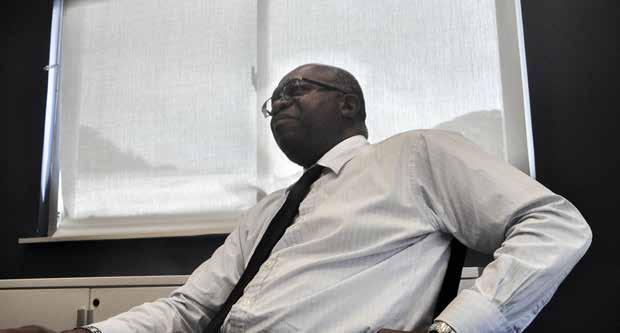
[Barbados] Prime Minister [Mia] Mottley spoke about that yesterday as well, because when the US cut off correspondent banking relationships, you still have to trade, you still have to buy food and import stuff. And you seek alternative arrangements. China has been there for the region. When the US pulled back its close relationship with the region, China stepped in because there was a vacuum. Between China and Taiwan, they’ve stepped in particularly with respect to the independent countries. And they have funded a lot of economic development in those countries, whether it’s airports, sporting venues, and seaports. So they have made significant investments in the region.
BB: Switching a little bit to the United Kingdom, I think it is agreed on both sides that the public registers of beneficial ownership are going to take effect in 2023. Are there plans being made by the FSC to facilitate that? And do you think that those registers will be a serious disruptor toward our Chinese and Asian business?
KB: To answer your first question, yes, the government gave a commitment some years
ago that they will transition to publicly accessible beneficial ownership registers. And then, either late last year or early this year, they assigned responsibility for that to the commission. In an amendment to the Business Companies Act that was passed late June, the legal framework for publicly accessible registers was included and passed. So the framework is there. The next step of the process would be public consultation on the implementation of the regulations to make it effective. Simultaneously, the commission is doing the technical work in the background to put the technology infrastructure in place for that. We aim to have it in place by the end of next year. We don’t see any delay in that, and we don’t see any pushing back on that timeframe. In fact, there have been discussions in the UK on why we can’t just bring it forward, because we have [the Beneficial Ownership Secure Search System, known as BOSSS]. So we are working towards meeting the obligation in the timeframe that has been given.
BB: And you clearly see the BOSSS technology as the model that will be used for that? I’m assuming it’s going to be an electronic registry?
KB: Yes, it’s going to be an electronic registry. We’re doing two things simultaneously. One, we are upgrading the VIRRGIN System. It’s 15 years old. VIRRGIN is like a Toyota Hilux — those rugged jeeps that go anywhere and are sort of indestructible. But it’s 15 years old, and you have new technology. What we want, is to get the system onto the new technology: better resiliency, better features, more ability to do data analysis. So we’re modernising the infrastructure. We are upgrading the technology. As part of that
upgrade, we will build in the ability to have publicly accessible registers.
BB: So there’s a VIRRGIN 2.0 on the horizon?
KB: Call it VIRRGIN Leap; it’s a leap forward in the technology.
BB: You are well under way to making it happen?
KB: Yes, there are going to be various steps to it. The first step really is modernising the current VIRRGIN, plus the beneficial ownership. Then there will be some other phases over the next three to five years, where we’ll be adding more things onto it.
BB: Do you see the public registry having an impact on your Asian business? They seem to have not reacted to it one way or the other. So is it a non-issue with them in terms of the continuation of their business?
KB: I suspect that there will be some individuals who will choose not to have their information publicly accessible. But because the world is shifting in that direction in any event, the international standards are moving in that direction. The fifth European [Union Anti Money-laundering] Directive has it; the [Financial Action Task Force] is advocating it. I suspect it’s only a matter of time before it becomes embedded in the FATF standards. So the world is shifting in that direction. The international finance centres, the overseas territories, are going to be sort of like the leaders in that shift, because the UK is pushing it, but the rest of the world is coming along behind us.
BB: It’s actually one of the areas where we certainly have demonstrated our leadership, even when compared to major financial centres in the world, in terms of the ability to provide this information in a very timely and quick way.
KB: It is not only that: It is the ability to react to issues. Those issues — we almost treat them like existential threats, because it’s a threat to how the jurisdiction operates. And whilst we don’t subscribe to the concept of our HOA passing legislation in one sitting — because you should create an opportunity for public hearing and public contributions — when we are under threat, we respond and put measures in place to do it. Bigger countries don’t demonstrate that nimbleness, although the US did it after 9/11, when they passed the Patriot Act in record time. Then again, the legislation was always drafted for years, and was just sitting there waiting for the right opportunity or crisis.
BB: Recently, you’ve done some amendments to the BVI Business Companies Act 2004. Come January 2023, those amendments are going to come into force. What are some of the key provisions that the amendments are going to cover, and how will it make the BVI business company more competitive?
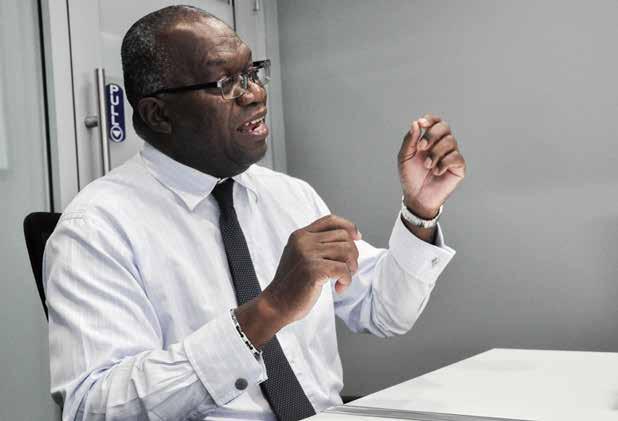
KB: One of the simpler things, would be the abolition of the bearer share regime. We’ve had it from the [International Business Company] days. Then we started getting pressure internationally about bearer shares. So we then went and we immobilised the bearer share regime. But the empirical data shows that whilst companies had the ability to issue bearer shares, a relatively small amount of them actually did. Now the international standards are moving in directions where they’re saying bearer shares more generally should be immobilised. We’ve already gotten to that stage and we’re going further and abolishing them, because the revenue earned from them is insignificant to the risks and the perception that it imposed. We’re doing away with the regime altogether. In fact, we started a process some years ago, where we have seen that when the bearer share regime came into existence, we had at one point close to 20 authorised custodians for these bearer shares, and over time they have shrunk down to about two or three now. We saw from those that, in fact, we don’t have a big market for bearer shares. So we had asked our licensees to get rid of the ones that they have.
The second major issue is that we’re getting rid of this concept of struck-off companies. That, again, has been around since the IBC Act. Whilst the legislation tells you what cannot happen when a company is struck off, the data shows that in fact, sometimes companies are struck off and they continue to operate in contravention of what the legislation says should happen. Secondly, it was difficult to explain to international assessors how the struck-off regime worked. It was difficult to comprehend, because you’re saying the company is dead but yet it still has a bank account; it is still doing business. It became difficult to explain that. So what’s going to happen, is that the company after it’s struck off — after, I think, a six-month period — if it’s not restored, it will be dissolved. Then they would have about a year to restore it: make an application to the registrar to have the company restored and pay the outstanding fees. After that year, then you’d have to go to the court for the court to make a declaration that the company should be restored. So it will make the process of us being able to explain to assessors how the BVI regime
works simpler and more straightforward. Then the third major section in the act, is what we spoke about earlier: the legal framework for publicly accessible beneficial ownership information. Those are the three issues. It was passed by the House late in June, and it will come into effect on the January, 1st 2023.
BB: A few years ago, there was much anticipation that the requirement for BVI-based substance would result in some economic growth in the territory. Was that just a mirage? Or do you think it still has possibilities?
KB: It was sold to the territory that it would provide economic stimulation: that these people who own these companies would be coming into the jurisdiction; they would need accommodation; that there would be an increase in the office accommodation market as they set things up. That increase in economic activity has not happened to the extent that was anticipated. Not that there was not an increase in activity — there was, but it was more concentrated with the trust and corporate service providers. They have been able to help their companies demonstrate economic substance, by using their own resources. So they designate their staff for the companies; they use the same office environment. You might just add in a phone line or a fax line, whatever the case may be. So they were able to demonstrate that, without incurring significant expense. What did happen, though, is that for the trust and corporate service providers who
were able to provide that service, it meant an increase in revenue for them. But because you didn’t increase your headcount [and] because we don’t have corporate taxes, there was no additional income for government. It went directly to the bottom line for the companies. The wider aspect to that, is that a significant number of those companies were exempted because of the nature of the business that they do. We were thinking that 300,000 or 400,000 companies were going to need to establish a presence. A significant number of them were exempted. If you’re just a holding company, then you don’t need to do that.
BB: Also in 2023 you have the Caribbean Financial Action Task Force assessment in the cards. How are the preparations for that going, and why is this assessment seen as critical?
KB: Yes, you’re right: The assessment is critical. The jurisdiction is a member of CFATF, and so we are obligated by membership to undergo a periodic assessment. This is a fourth round of assessment that’s being conducted, the last round being in 2008, which was the third round. During the previous round of assessment, the BVI did very well. We had one of the top assessment ratings, because it looks predominantly at whether or not you had the legislative framework in place. We did a fairly good job in developing our legislative framework, which is modelled off the international standard. When they assessed it, we were found to be largely
compliant. Since then, the FATF has revised the assessment methodology, so to speak. They have said that, not only do we want you to demonstrate that you have the legislative framework in place, but we also want you to demonstrate that you have effectively implemented that framework. You demonstrate that through, what they call eleven immediate outcomes. They take a deep dive into how effectively you have implemented it. You will demonstrate through statistics and typologies and case studies, that you have been able to identify money-laundering crimes; that you have investigated them; that you have prosecuted them; that you have convictions, because a prosecution without conviction is a futile exercise. The last part is that you have essentially taken the profit out of crime: that you have confiscated the proceeds of crime; that once a person has been sent to jail, that you have frozen and you have confiscated the assets. If you think back to when we went to university, you remember they had different types of tests. You had the multiple choice and then you had a test where you had some essays, and the essay part carries more weight. In this case, it’s broken down into two parts. The technical compliance is essentially: Do you have the legislation in place? That is probably about 25 percent of the marks. And the 75 percent — the essay part — is the effective implementation. Now, you have to have good technical compliance in order to get effective implementation. So if you fail the first part, then you cannot pass the second part. We made some amendments to the legislation just recently, so we’re pretty confident that we can get a good score on the technical compliance. The effectiveness is more of a challenge, but we think we have increased our chance of getting a good outcome there. An important point is that the assessment itself, will be led by the International Monetary Fund in conjunction with the CFATF. Then, once the report is finalised, it will go through the same CFATF process. Why the International Monetary Fund? Well, they’ve had a history of doing assessments in the international finance centre arena. They did an assessment of the BVI back in 2010 as well. So they approached and asked the Government. We discussed it with the Attorney General, who is the contact for the CFATF, and we agreed collectively as a jurisdiction to allow that to happen.
The IMF was actually here a couple of months ago and it did some training, both for the public sector and for the private sector: training as to how to go
about answering the questionnaire on the effectiveness component. It is essentially like a professor saying to you, “I want you to write an essay on a subject and these are the issues that I want you to cover in your essay. And if you follow my guidance and you do sufficient work, then you’ll likely get a passing grade.” We have set up a coordinating committee to lead that process; to engage with the other sectors.
A lot of people may think because the commission is leading it, that it’s an assessment of the commission. It’s not: It’s an assessment of the jurisdiction. So there are a lot of different players. It involves the commission, the Financial Investigation Agency, because they’re the ones responsible for receipt and analysis of Suspicious Activity Reports. They are key part of it. The police is a key part of it. The Attorney General is a key part of it, because they are responsible for international cooperation, mutual legal assistance requests. The Governor’s Office is part of it, because he is responsible for the sanctions regime. The industry is a part of it, because they’re the ones who have to implement. The DPP is part of it because that’s the office who has to prosecute these people. The customs, immigration, they’re part of it, because they need to make sure that criminals can’t get through. So it covers a lot of the public sector. That’s why we had this training to bring them in on it. The first part of the questionnaire — the technical compliance part — has been submitted. That was due at the end of August, and we’re currently working through any remaining issues. The second major submission is at the end of October, when we have to submit the effectiveness component part of it. Then the actual onsite visit will happen somewhere in March of 2023. A team of somewhere around 10 experts will be here to conduct the mutual evaluation. The window is fairly narrow in that CFATF has about two plenaries a year: one early in the year and one later in the year. So somewhere along October, November of 2023, the report should be presented at the plenary for discussion and approval. Then it goes to the FATF plenary, which is the following February, 2024. FATF would look at it to see whether or not the report is consistent with the other reports. If it is, then it is given its final approval. So about mid 2024, the report will be published to the entire community. It’s important because it will demonstrate whether or not the BVI has an effective anti-money-laundering regime in place. A lot of it is based on being able to demonstrate the true statistics to show the number of different things that you have
done and be able to articulate them clearly.
BB: Once it’s done and the assessment is made, what’s the upside of it, assuming we get a good standing? What does it say to the global financial community?
KB: It says that the jurisdiction has a good anti-money-laundering regime in place: They’re able to identify money-laundering claims; they’re able to investigate them, prosecute them, get convictions on them, and confiscate the proceeds of that crime. Clearly the events of earlier this year have not helped us, because the former premier was the chair of the national council for anti-money laundering. So when the head gets caught up in corruption matters, it makes it more difficult for us. While the event itself will create negative perception, the delay in the resolution of that and the timing creates another dimension.
BB: The central takeaway from the Commission of Inquiry undertaking was a governance matter in my mind. Does that present challenges for this review?
KB: It does colour the process, because the assessors will know of the COI report and they will know that the former premier was arrested. So they will come with certain notions in their minds that there are weaknesses in governance. They will come with that. We need to be able to demonstrate as best as we can, that this system might have had some kinks, but it’s not broken. The good thing is, when the investigation was launched, they reached out to a number of agencies, including the commission. And we gave a very comprehensive response to the questions that they asked, and they came back and said, “Based on your submissions, we don’t think there’s any need to ask any further questions there.” Now, that is a direct result of the leadership of the commission, particularly before my time. That goes to Robert’s leadership. He put proper governance structures in place. My responsibility now, is to strengthen those governance structures as best as we can. And where we have unwritten governance procedures in place, to reduce them to written form, so that everybody knows what they are. I’m on a number of other boards, so I ask those questions as well, and try to strengthen the governance. Because if you are perceived to stand out as a light on the hill, then you need to spread that light as far as you can, to help make sure that others aren’t found wanting.
BB: Are there some trends that you see globally that we as a jurisdiction should keep our eyes on?
KB: Yes. One in particular I want to speak about, because I saw an email from HLSCC last night. They’re having a graduation ceremony for a FinTech group. The government has [a memorandum of understanding] with the National University of Singapore. They hosted what I consider to be an important training event earlier this year, teaching people how to essentially write apps. I think that there’s close to a million apps on the app store. Anything you want, there’s an App for it. Which to me is an opportunity for particularly our young people. I remember December 2019. The commission had its cocktail party, and late in the night I had a drink with the manager of Cable & Wireless. I said to him, “I need a favour from you.” And he asked me where I live, because Cable & Wireless was putting back in the fibre optics. I said I’m not asking for internet service where I live: I want a better level of service at the college, because I know we have this relationship with Singapore.
Fast forward, the first cohort is about to graduate. The FSC had a team on it, and they developed an App to receive and analyse our potential returns. We were in discussion with a service provider who would have done that same work for us, and we’d have probably spent a couple hundred thousand dollars doing it. They were able to do it in a matter of weeks at little cost. I think we paid about $3,000 for each person to attend. But now they have skills to be able to do this. I would want to see more people, both young and old, being able to take advantage of that. These are skills you can use anywhere in the world. It creates entrepreneurial opportunities to solve problems for people at reduced cost; enable them to develop the apps and put them on whatever app store. Remember, the government has passed some legislation to help digitise the economy. They passed the data protection legislation, the electronic transactions support. So the legal framework is there. What you need is technology to take advantage of that.
The point really is that FinTech is here to stay. FinTech is disrupting financial services business. FinTech helped a lot of people through the pandemic when the world was shut down. People used technology to keep going. One of the amendments we made to the legislation back in probably 2018, is what we call electronic verification. But it requires the technology to make that happen. The commission is prepared to fund the development of the App for
electronic verification — so that when you want to go and open another bank account, you don’t have to stand in line for an hour to get inside, and then spend another hour in there. You will be able to take your phone and conduct electronic verification from the office or your home or whatever the case may be.
So FinTech provides the jurisdiction with tremendous opportunity to bring us into the 21st Century; to get us closer to where Singapore is. Our VIRRGIN system is based on the Singapore registry, considered to be one of the best registries in the world. Because it’s modelled after that, we have one of the best registry systems in the world. Singapore is known to have deployed technology throughout the country, and that is what has helped to propel that country to where it is today. And because of the lockdown in Hong Kong, Singapore is poised to take over, to surpass Hong Kong. If Hong Kong doesn’t reopen by the end of this year, Singapore will leapfrog Hong Kong as the leading financial centre in Southeast Asia. We are now considering whether or not we commit to staying in the Far East, but it may not be in Hong Kong: It very well might be in Singapore. So I would want us to see the technological development and advancement that Singapore has. I’d want to see that replicated here in the BVI. And I am prepared to use the commission’s resources to help get us there.
BB: What’s the best piece of advice you’ve received since assuming leadership at the FSC?
KB: One of the best pieces of advice is to listen to my senior management team. We meet on a weekly basis — almost every Monday we meet — and it’s really to listen to their advice. Collectively, we have hundreds of years of experience in different areas. I think in the past we relied to a great extent on the brain power of Robert, because of his years in government: his important role as financial secretary and his international presence and experience and so forth. Some of us to an extent have some of that international presence, but collectively we can’t measure up to that. So we had to come together and share that experience to come close to equating to Robert’s knowledge. I think for me the one thing that I believe the government should have done differently in recognising his contribution was to bestow a more significant honour on him than an OBE. He should have at least gotten a CBE, and in many respects he deserved a knighthood for the work that he has done for this country.
BB: What canary in the coal mine is keeping you up at night? I did a focus group yesterday and raised the same question. The canary in the coal mine was China for a number of people, particularly with the Taiwan angle. What would you say?
KB: I wouldn’t disagree with that. Because the data shows that 60 percent of our business comes from China — well, comes from China through Hong Kong. And if China sneezes, we catch a cold. At the end of the day, it translates into dollars and cents. If confidence in the Chinese market were to wane significantly, it would touch our pockets in a real way. It would make life difficult for us.
That’s why we’ve had to be talking about diversifying for years, but no government has really made a concerted effort we have seen. We have to diversify away from financial services. Would it mean that the commission becomes less relevant? Probably. Do I have a concern about that? No. If the commission becomes less relevant, but the economic pie in the BVI increases significantly, that’s so much better for us. It’s not about me and the commission, or what we do. Whilst we take pride in what we do, and what we do is important, equally important is the empowerment of the masses. Equally important is the whole economic pie getting bigger for us — and there’s a legacy for our children or grandchildren and others to come. So I think FinTech is a tremendous opportunity for the jurisdiction. We have the ability to pivot, and I’m hoping that we pivot before a crisis. We tend to pivot in crises, but I’d want us to pivot before the crisis happens. So when it does happen, the income stream is well on its way and it does not disrupt our standard of living. BB
It was on the 9th of July 2022 when I read the article in the Island Sun on the postponement of the passing of the Register of Interests Act that I started to question whether our ethics in the BVI are still in focus. Traditionally, we are a people who are in favour of upholding ethical standards and by extension good governance. But, today, what does this mean? To some, it sounds like a good pledge during election campaigns, while to others, it seems that they believe in it, but do not know the true meaning for themselves. For elected officials, once they are in power, it’s as if good governance is for the previous Government and other people, but does not apply to themselves. One has the impression that their main goal is in fact, to have better opportunities for personal aggrandizement. Hence, the importance of legislation for the Register of Interests Act 2022, which will make declarations of interests of senior public servants more transparent - as part of good governance and mitigate the risks of dishonesty.
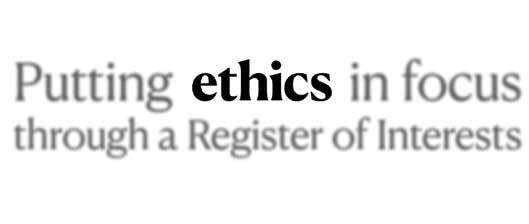
With growing inflation, the aspiration to do business, invest, and live a better life, most able bodied persons are seeking means to increase their incomes. It is a normal right, especially in a world where there is hyperinflation and climate crises which negatively impact the costs for agricultural and fisheries products. Businessmen and women turned politicians, will continue to do business. This is the way of the world. Business endeavours, however, must be linked with the moral imperative, for those in public office to be transparent in their business dealings.
One of the tenets of a democratic society is equality and equal opportunities, but hiding one’s business and financial dealings, shows disrespect by political leaders and contributes to defiance among members of their constituencies. There is nothing wrong with being wealthy or with being involved in business outside of our regular civil service portfolios. But as a senior official, one’s dealings should stand up to scrutiny
to show that acquired assets are not directly linked to one’s public office.
The requirement for public officers to declare their interests, should not result in reluctance to aspire to high office. Transparency contributes to higher levels of citizen involvement in social development. Transparency as a process, involves being completely visible and open to scrutiny. We must be able to look at each other as citizens - in the face - and say we have done right by you. We need to promote opportunities for all our people. Additionally, we cannot afford to exclude potential investors. In this regard, transparency is imperative.
Just as remuneration of elected leaders is public knowledge, there should likewise be a commitment to ensuring that public servants adhere to the tenets of the constitution. It is common knowledge that the lack of responsible and transparent action on the part of elected officials leads to corruption. Elected officials are entrusted with making decisions that directly affect the daily lives of the constituents - and must strictly comply with the law. A Register of interests in keeping with a Code of Ethics for public servants is most appropriate.
A system of registration of interests once established, that implements the requirements of the Constitution insofar as it requires the declaration and registration of interests by elected officials, gives clear guidance as to what must be disclosed and when, and has effective provisions (involving sanctions where appropriate) to require compliance. Subject only to restrictions that are truly necessary, the register should be open to public access as detailed in the COI Recommendation B2.
As stipulated in the recommendations of the COI, for an effective registration of interests’ system, it must be designed to cover all persons in public life, a properly formulated and costed plan should be produced for the implementation of such a system, and a commitment made to ensure that it is, and will continue to be, funded, and resourced
so that the system is efficient and effective stated in the Recommendation B3.
Once the registration of interests’ system for Members of the House of Assembly has been established, evaluated and its extension costed, then consideration should be given to its extension to other public officials on an incremental basis. For example, the first tranche of public officers to be covered could be the most senior officers such as the Permanent Secretaries, the Financial Secretary, and the Cabinet Secretary (or those acting in such roles); the second tranche could be members of statutory boards; and so on, until all public officers intended to be included are covered in concert with the COI Recommendation B4.
Sections 66 and 67 of the Constitution will need to be amended. This is to make clear the circumstances in which a person seeking election to the House of Assembly, or a Member of the House who (either personally or through a DBA, a partnership or company with which he or she is associated) contracts with the BVI Government, needs to declare such an interest, how such a declaration should be made and the consequences of him or her not doing so. See COI Recommendation B5.
In conclusion, elected officials are entrusted with making decisions that directly affect the daily lives of their constituents - and must strictly comply with the law. When they do comply, public trust in leadership will be enhanced - especially if elected officials and public servants are seen as not taking advantage of business and financial opportunities during their tenure of service. Accountability means that there are governance procedures with checks and balances in place to prevent decision making being infected by factors other than the public interest.
Best practices in Bermuda, Singapore, and Switzerland, for example, sensitize all public servants and provide regular training and appropriate resources to manage the maintenance of up-to-date registers. Confidentiality is maintained by independent service providers who conduct checks and verifications of the entries.
Leaders must lead by example, as it gives good impressions to the citizens at large as well as to the outside world, including potential investors. As our legendary Bob Marley said long ago, “there is so much trouble in the world” and now, more than ever, we need leaders with integrity to face the struggles through painful crises. It is only with strong guidance from our leaders and more particularly transparent leaders that ‘we can overcome one day!’ BB

These qualities are keys to continued success as the BVI financial services sector enters an uncertain global future, according to United Kingdom economist Mark Pragnell. Mark should know as well as anyone. He is the director of Pragmatix Advisory, a consulting firm commissioned by BVI Finance to produce the report “Beyond globalisation: The British Virgin Islands’ contribution to global prosperity in an uncertain world.” During their research, he and his team considered the BVI industry’s future under various very possible scenarios that may already be in the early phases of unfolding on the international geopolitical stage. Shortly after the report’s release last November, Mr. Pragnell sat down with Business BVI Managing Editor & Chief Content Officer - Russell Harrigan to discuss and elaborate on his findings and on other ideas he shared two days earlier at the Globalisation: BVI Beyond Conference. An insightful and informative read that will deepen your understanding of the headwinds that will shape the jurisdiction’s course and by-extension that of the territory in 2023 and beyond. The conversation highlights a number of the opportunities and challenges facing the BVI.
Most timely, its covers areas such as: the creeping politicisation of the rule of law, the very grave implications for the BVI if China crosses the Taiwan Strait, the increasing realisation that the current BVI-UK relationship is not fit for purpose and could become an impediment to the territory’s economic expansion and thereby its viability, the need for the jurisdiction to develop a product for the digital age, the territory’s growing capacity challenge, the trend towards non-geographic - and the opportunity-laden need to be geographically footloose, climate change and the enormous opportunity attached thereto - including in the branding space, the need to migrate up the value chain - moving from back office offerings to front office opportunities and the need for the BVI lifestyle to become a heat seeking missile in the jurisdiction’s global positioning arsenal. A must read.
Business BVI: Firstly, I want to congratulate you on a thought-provoking and timely report and for the presentation you did at the BVI Finance conference. What would you say are the three main takeaways from the report that the BVI as an international business and finance centre must take on board in its strategic planning for the future?
Mark Pragnell: The first one isn’t about the future. The first one is about recognising what has been achieved already. One of the elements of the report which I think is really important is the extent to which BVI has a finance centre that has done well and is making a significant contribution globally and domestically. It’s important that before anyone starts to think about the future, they also recognise the achievement so far — and be proud of that. That would be number one. The second element is we don’t know what the future is going to look like. The main report is around two hundred and fifty pages. It’s a long document, and I can’t tell you what the future is going to look like. On that basis, we’ve developed some scenarios to try and think about what the future might be. But the future is what it always is, but especially at this juncture: It is uncertain. Looking forward, the most important thing is not to have a rigid Plan A that the jurisdiction is going to do: The most important thing is for there to be the agility in the jurisdiction to respond and proactively develop the financial centre as you move forward. The third important takeaway is the need to recognise the interconnectedness of the financial services sector and the rest of the BVI economy. The only way in which you’re going to have that strategic future planning done well is by having government, the financial services sector, and the rest of business coordinated, communicating and singing from the same hymnbook.
BB: How do you see the findings of the report being used to advance our financial services sector?
MP: There are a number of ways in which the report can be deployed. One of the reasons why the main report is so long is because it’s got a lot of audiences. One of the most important ways it’s going to be deployed is domestically here on the islands. It’s for government and for the territory to recognise the contribution that the financial services make, but also for the financial services sector to recognise the contributions it’s made. So one of the important things is to stimulate and inform that domestic debate. However, the report’s primary objective is for external audiences. A part of that is to give the industry and BVI Finance some hard data to go to potential markets and explain what happens here to places where they could be doing business. It’s also important that this report can help develop and foster a more constructive and more informed dialogue with the government in London. Finally, and probably most importantly, hopefully this gives a richer and fundamentally more positive perspective on the contribution that these islands really do make to the global economy, which can be used to inform the broader debate around international finance and those dangerous two words: “tax havens.”
BB: In the report, you described three possibilities for the next phase of globalisation: “weaker internationalism,” the “bloc economy,” and “a new economic nationalism.” As you sit here today, what do you see as the most likely next phase?
MP: Again, I’m going to answer your question with a negative rather than a positive answer initially. I think the most important thing is what I don’t see happening: I don’t see the world carrying on as it has done for the last twenty years. The world after the fall of the Berlin Wall, I think, was an unusual anomaly in the history
of economic development across the globe. We’re going to see something different. I think the world is going to grow economically more slowly than it has in the previous couple of decades. The question then becomes: How bad will it be in comparison to what has happened previously? My view is that the most likely outcome is what we’ve called “weakening internationalism:” The trends carry on, just that the trends carry on more slowly than they have previously. If I was to put a broad number against that, I would probably say something like a forty or fifty percent probability that will go forward.
Our next scenario is the bloc economy. That’s the one where we see the fragmentation of the world into big economic blocs and those blocs become more integrated themselves — but the blocs between each other start to go in diverging directions. I’m not sure that the most extreme example of that is likely to occur. But I believe we
will start to see elements of that. To a certain degree, we’ve already started to see some elements of that: The behaviour of the European Union, the extent to which China is taking a slightly different perspective over recent years. That was probably our second most likely scenario. If I was to put a ballpark number to that, that’s probably a thirty-percent-type probability. Then our least likely scenario is what we’ve called “new economic nationalism.” The basis there is what we see as populist politics writ large across a lot of the major states. It’s basically a Trumpisttype perspective. I believe that the Western democratic political establishment is such that actually that [phenomenon] will be dampened over time. But it might not be. We could probably see maybe a twenty, twenty-five percent type of probability associated with that.
BB: What preparations should the BVI be undertaking as this pivot takes place if we’re going to be half as successful as we’ve been over the last twenty to thirty years?
MP: The danger is that the BVI can’t control which scenario ends up coming forward. When you think through what the implications might be for the BVI of those different scenarios, they’re quite varied. So the best planning is to be agile; the best planning is to be forward-thinking. It needs to be about looking at the external environment and trying to work out what direction the world is going and trying to spot the early warning indicators. And then you need to have the speed of response as you go forward. That plays back to the point earlier about having an industry and a government that are working well together; having that common dialogue. That’s going to be absolutely essential to be able to respond. For example, if we head towards the bloc economy, the bloc economy could be a significant impact on this jurisdiction, especially given the scale of which this jurisdiction has a large share of business in China and Asia. To respond to that — and to make the changes or to think through what your position is in that environment — you’ve got to do that early. You’ve got to look for the early warning indicators, and you’ve got to make sure that you’ve got the ability to move quickly. That’s the challenge for government; that’s the challenge for industry.
BB: If you can pivot a little bit to what I’m calling the dragon in the room: China. At the recently concluded 20th National Congress of the Chinese Communist Party, the primacy of the economy and economic growth seems to have taken a back seat to things like national security and the competition with the United States. You mentioned the bloc economy approach. Do you think that’s where the Chinese are heading? Which option do you think today, if you were to posit a guess, would be the direction it will take? And what is the implication of that on BVI?
MP: There are a number of different potential factors that come into play here. I think my central view is that China will continue to grow at a reasonable pace. It’s already got the status of an economic superpower. It will continue to have that and probably grow as well in that context. But we’ve got to remember that the Chinese economy is now heavily indebted. There is a non-trivial risk that there could be implosion of the Chinese economy, just because of the extent to which they’ve got themselves in an indebted position. It’s helpful that most of their indebtedness is actually to themselves — and in some way related to the Communist Party as well. So I think it’s a debt position that probably can be managed better and more easily by them than it would be if it was a similar circumstance in the US or in the UK, for example. But we mustn’t forget that they have got themselves into a position of reasonable fragility.
Let’s put that to one side, though. I personally can’t see them signing up to too many more European-led international initiatives. Regardless of whether or not we end up with this rather stark bloc economy scenario that we’ve put in our report, you can’t see anything other than greater friction between China and elsewhere. The bit that I think is really interesting is the extent to which Africa and Asia start to fall in with China more — or we start to see China going it alone more. That, I think, is a real interesting and unknown quantity at the moment. Clearly, the Belt and Road Initiative has drawn African and Asian states into the Chinese economic sphere of influence. But some of that’s already starting to unravel. I could see a world where there was an Asian bloc fundamentally led by China. But equally I can see a world where there’s an Asian bloc which excludes China, and China carries on as quite a large supertanker of an economy but still somewhat arm’s length to the rest of Asia. I think those are the sorts of things that play in. What does that mean for BVI? Well, it means there’s some really tough questions ahead. And under all those circumstances, when you look at the pie chart of the business done by BVI, there is a large chunk of it which is done by China. Being able to make sure that that business is protected [and] developed will be a tough ask under certain scenarios as we move forward. So that agility becomes really important.
Africa, 3 Russia, 4 North America, 4
Estimated share of active BVI Business Companies by location of ultimate beneficial owner 2022,
Source: Pragmatix Advisory industry survey, 2021/22; Note: ‘China’ refers to China, Hong Kong and Macau; ‘Latin America’ refers to Caribbean, Central America, Mexico and South America; ‘Asia’ refers to Asia and Pacific Region (excluding China, Hong Kong, Macau and Central Asia); ‘Non-EU Europe’ refers to Non-EU Europe, United Kingdom, Channel Islands and Isle of Man; ‘North America’ refers to United States and Canada; ‘Russia’ refers to Russia and Central Asia; ‘Africa’ refers to Middle East, North Africa, and Sub-Saharan Africa.
China, 44
Latin America, 20 Asia, 13
China accounts for almost half of asset value
Non-EU Europe, 5 European Union, 7
mediate between those blocs, that’s a really important role to have. And it could become an incredibly valuable role to have. But as you rightly point out, as an overseas territory of the United Kingdom your ability to do that will be influenced by the extent to which the United Kingdom is willing for that to happen. So you could paint a picture even in the bloc economy of BVI — as currently one of the biggest mediators of China [and] non-China business — having a really valuable and important role. It’s just whether or not that can be navigated through the geopolitics of what’s happening in Washington, what’s happening in London, and what’s happening in Paris.
UK, Channel Islands, Isle of Man, & Non-EU Europe, 7
China, Hong Kong and Macau, 46
Estimated underlying value of active BVI Business Companies by location of ultimate beneficial owner 2021, per cent European Union, 21 European Union, 12
Estimated underlying value of active BVI Business Companies by location of underlying asset
China, Hong Kong and Macau, 45
BB: To what extent is Singapore a country to look at in mediating between the two from a business standpoint? If you look at what they have done from their founding, they have managed to be a-go between without getting caught on one side or the other. And that was, I think, a deliberate strategy. Is their history in that regard something we should be informed by?
Rest of the world, 22 Caribbean and Latin America, 10
UK, Channel Islands, Isle of Man, & Non-EU Europe, 11
Caribbean and Latin America, 8 United States and Canada, 6 United States and Canada, 4
Reasons for using the BVI have changed
Rest of the world, 9
Source: Analysis of Pragmatix Advisory industry survey, 2021/22
MP: It’s certainly history you should be informed by, but there are obviously two very important differences. One is independence, and the second is scale. The relationship with London in many respects becomes really important in this context. A constructive, forwardlooking relationship with London — and that’s not just a pressure on the BVI; that’s a pressure on the government in London as well — could easily open ways in which this jurisdiction could be that big mediator. Also, though, the scale point is important. This is still a jurisdiction with a population of only 33,000. You need the scale; you need the capacity to be able to operate at that level. That, again, is a part of the challenge for the BVI.
BB: Given where things are at the moment with our relationship with the UK, constitutionally and otherwise, what is the likelihood of their willingness to say, “BVI, we hear you: Let’s have a conversation about the longer term”?
BVIBCs hold an estimated US$1.4 trillion in assets
Source: Bank of International Settlements, World Bank, International Monetary Fund
BB: [A high] percentage of our business comes from Asia and [especially] from China; we are an overseas territory of the UK; and then we have longstanding deep relations with the US. If the blocs keep going their separate ways, is BVI going to be stretched to a breaking point?
MP: This is where it becomes a bet. It’s a wager that has to be taken by the industry and by government. Even under the bloc economy, you will still have trade between blocs. It’s simply human and business nature: Where you can see that advantage, people will try and get it. There’s always going to be some form of business advantage to trade and investment flows. What happens is that those trade and investment flows become more difficult to do, more costly, more inefficient. If — and it’s a big if — but if BVI can
MP: Speaking candidly as someone who lives in the UK and sadly has been following UK politics too much recently, nothing in my view is going to come from London at the moment. The scale of trauma that has been caused — economically over the last few years through the Pandemic; more recently in the markets through the interesting (if I can use that phrase) mini budget; and politically through our absolute inability to keep the prime minister in power for more than a few weeks — [means that] there are some big problems in London. They are focused, and their focus is going to be there. So I really don’t think you can expect the government in London to come here or start that conversation. However, let’s be blunt about it: This is a period after what’s been a traumatic period for the BVI as well. The Commission of Inquiry: I actually see that as at least the door being ajar for a meaningful conversation. I’m hoping that our report at least starts to allow there to be a proper discussion with London about what’s at stake. I really don’t think that civil servants in the departments that matter — for example, civil servants in His Majesty’s Treasury — really understand what happens here. Their level of insight about the nature of the international business and financial centre in BVI will come out of what they read a few months ago in the newspapers. So I think the BVI needs to go to London [and say], “This is what’s at risk. This is what’s at stake. This is how the islands do well with a successful international business and finance centre. This is what would happen if you don’t at least provide a supportive environment for what we do.”
BB: Taiwan has become a flashpoint between the US and China. The president of the US has made it very clear that if the Chinese were to cross the Taiwan Strait, he will not sit by and do nothing. Do you see the situation as it relates to the Ukraine sanctions being part of a response should that happen? And how would that impact BVI?
MP: My first point is that I don’t see a Chinese movement towards Taiwan as particularly likely.
BB: In the near term or —
MP: In the near term or in the medium term. A lot of what we’ve seen recently has been more about Nancy Pelosi landing there than has been about anything significant in terms of a change in perspective from the Chinese. In fact — especially given what’s happened with Russia’s invasion of Ukraine — I think the Chinese are quite risk averse in terms of military action. For me, the risk is a more generalised parting of the waves between China and maybe Asia and the rest of the world as China realises, “Actually, we’re a superpower in our own right. We don’t need to follow your rules or behave in the way that you want us to.” I’m less concerned about the potential trigger point of Taiwan. However, that’s only my view, and I’ve been proven wrong on lots of things before. I’m not going to pretend that just because I say it’s not going to happen it won’t happen. If it does happen, the BVI at first glance looks pretty exposed to what might be sanctions. There are a couple of issues here. Firstly, yes, the Ukraine model has at least illustrated what can be done. But it’s illustrated what can be done versus a nation — i.e., Russia — which had very limited trading relationships with the US and a reasonable chunk of Western Europe. Clearly, gas is an issue. But predominantly, the relationship between Russia and the rest of the Western alliance was one which was relatively limited in an economic sense. That’s not the case with China. So as we move into a world where there’s some form of military intervention by China with respect to Taiwan, the model of sanctions will come forward, but I think they will be done far more cautiously. Fundamentally, blocking trade with China is going to hurt the Americans and the Europeans a lot more than blocking trade with Russia. Notwithstanding, with forty-four percent (44%) of BVI business companies related to China, that’s going to have an impact here. Again, that relationship with London — the scenario planning, the preparation, the
recognition: “You go down that route, look what it’s going to do to our islands” — I think is really important.
BB: I want to pivot a little bit to the panel discussions on Tuesday. Your presentation was quite insightful and informative, raising and highlighting a number of opportunities and challenges for the BVI. There were five things I pulled out that I want to get your further thoughts on. One was a comment by Robert Briant about the politicisation of the rule of law, which is an interesting thought. You can make the case that it has always been, but I think he was referencing that Ukraine has brought it to a really high level. What do you think of that idea and its implications for the BVI?
MP: It was a lovely turn of phrase, and Robert has a really big and serious point to make there. Fundamentally, what he’s highlighting with the politicisation of the rule of law is playing exactly into the beginnings of an extreme bloc economy scenario. Effectively, the Western alliance has changed the rulebook in order to form a bloc against another area. With that, you will get the start of a lack of trust in the ability to use law on either side of that bloc divide. So I think the point that Robert is making is absolutely valid. It’s part of a general weakening of the norms that we’ve seen over the last twenty years or so. That will have an implication in terms of people’s willingness to trade. It will have an impact on people’s willingness to invest across borders and the risk appetite that they’d have to have to do that. That can play out either way for the BVI. It can play out badly for the BVI in that [it] might curtail levels of activity. It might also [mean] that the likes of China will look closer to home to find places to mediate. The flipside is that if the BVI can maintain that independence — can maintain that robustness — the solidity and the maturity of the product that it offers may well be more valuable in a world where these things start to weaken.
BB: Do you think there’s a chance that [such developments] could undermine the use of the common law, which is what our law is based on?
MP: I suspect it’s more an issue of: Is there a potential undermining of jurisdictions able to deliver on it? If it appears that the common law jurisdictions are becoming partial rather than impartial, regardless of the underpinning law, that would be a problem in terms of the market. I don’t see it being an issue of trading legal codes: I see an
issue being the reputation and authority of the individual jurisdictions.
BB: The second thing that came up [during the conference] that I thought was interesting is that the BVI needs to develop a new product for the digital age. What are your thoughts on that?
MP: I’m the last person to ask what the product should look like. I don’t know. Trying to second guess what the market looks like isn’t where I ought to be — and I don’t think many should be. What the islands need to do is have an environment where you can see the good ideas being made and developed with speed and robustness. Digital is one of those areas. Digital is a very important part. The two bits for me is that nimbleness, that agility; but the other bit is I think it’s important to not just jump on the bandwagon that others are doing. What’s important is to step back and think about what you’ve got here that can be deployed. What is the [unique selling proposition]? What is the competitive advantage? What is it that people are going to want from you that they wouldn’t want from somewhere else? There are a number of elements to that. The bit that struck me is the extent to which this jurisdiction is really successful in effectively recognising and registering asset and allowing the securitisation from it. Which, for me, feels like an absolute no-brainer in terms of moving into the digital world. I know that some of that is being done. But I think it’s a case of thinking through: What’s here? What do we do? What’s our skill set? And how can that work within the digital age? And rather than saying, “Bermuda’s doing that; Jersey’s doing that: Why aren’t we?” it’s “What can we do that they can’t?”
BB: To me as a BVIslander, one of the challenges that we have in that regard is capacity. This is not trying to land a man on the moon, for heaven’s sake: It’s about knowing what is it that you have; what is it that the world needs; and how can you match those things — and creating the offerings, the legislation, the environment. I think we have a capacity problem in stepping up to that plate. The more competitive it becomes, the more dependence we have on the sector. We have that burden to step up to ensure that the quality of life that we’ve become accustomed to is maintained. But if we don’t build that capacity, we are going to end up in a bad place.
MP: I’ll say it again: This is a jurisdiction of a population of 33,000. It’s simply the case that you are limited resource-wise. It
doesn’t mean you can’t do it: It means you’ve got to think laterally about how you do it. I think it’s easy for an industry, it’s easy for a government, it’s easy for a jurisdiction to get bogged down by all the choices they’ve got. A part of the issue is having some faith to give something a go. At some point in time, some risks are going to have to be taken. You’re going to have to choose something and you’re going to have to give it a go. It may go wrong. It may not work. But you’ve got to. I think there needs to be a cooperative approach between government and industry. A part of that’s also got to be a recognition that there could be failure, and that to be successful you’ve got to be footloose; you’ve got to be rapid; you’ve got to be agile. And some of them won’t work.
BB: The International Business Companies Act came about in 1984, and prior to that there were things we were doing that didn’t go the right way. We thought they were going the right way until Ronald Reagan said, “No, we’re not signing that double taxation treaty again.” We went back and found some opportunities. To be honest, though, I think over the successive period we’ve become a little bit more complacent. I’m worried about that and its implications for the future.
MP: I’m sure there is a chunk of it which is complacency. But it’s also that with success you become more cautious, and you become more careful to try and maintain what you’ve got. The danger at the moment is that what you’ve got is something that isn’t necessarily sustainable. You need more; you need different. You’ve got to have a punt on something.
BB: The third [point from the conference] was the idea of digital distorting geography. What does that mean from where you sit and for BVI? It essentially to me is saying, “Look, a lot of things can be done anywhere.” I say to people in tourism, for example, “There are places with no assets but lots of money, [who are] very determined and putting together a strategy and selling it. That’s what we’re up against.” To me, it’s the same thing in financial services. Your thoughts?
MP: There are two elements to our thinking on what we’ve called the trend towards nongeographic. The first point is an absolute positive in BVI because of the revolution in digital technology; because of what the Pandemic has taught us about how we can work, how we can invest, how we can play without having the same geographical limits. Let’s be absolutely blunt about this:
The BVI isn’t an easy place to get to. The digital world has allowed people to do more from BVI than was the case in the world where physical location was one hundred percent important. So that’s an absolute positive for the BVI, because it’s pushed the BVI up into the marketplace where previously only airports that could take a 747 were going to go. My other point on this: Digital means there’s a whole raft of activities out there now which are put in the cloud; are non-geographic. And the rule of law has always been geographically specific. Assets have been geographically specific. We’re now getting into a world where a large chunk of what we’re willing to put our money into — what we see value in — is at best geographically footloose; potentially completely non-geographic in terms of its identity. The [Base Erosion and Profit Shifting Project] regime has been a part of trying to respond to that. We’re starting to see some of this in terms of tokenisation and digital assets. But I don’t think yet we’ve fully understood or thought through what it means to be in a world where a large chunk of value doesn’t have to be geographically specific. For me, that’s an area where this jurisdiction could be really powerful. Up to now, it’s been very good at being able to work out what you do with assets that have got multiple geographical locations or relationships. I see the sorts of skills and the sorts of understanding that you’ve got here in Road Town as being the sorts of skills and knowledge that’s going to be vital in trying to make this new digital non-geographic world work.
BB: An interesting example was when the hurricane hit. The government went up to The House of Assembly — interestingly, digitally — and said, “You can now do BVI business from anywhere in the world.” There’s a sunset clause in it, obviously, but that’s an interesting example of not being fixed geographically in this particular location. The other thought I heard raised was the notion that the global climate change movement is potentially also a branding opportunity for the BVI: We are a small place where the environment — and managing it in a certain way — is critical to our quality of life. But can you then extrapolate that on a wider level and do some things in the green space, particularly on the financial services side of the economy? What are your thoughts on that?
MP: I think it’s more than a branding opportunity. If we’re going to see both significant retail but also significant privatesector and public-sector institutional capital flows to address climate change, then they
would be facilitated by jurisdictions that have got skin in the game. And that’s what this place has got. Yes, that’s a branding opportunity. But I think it makes sense that these are the sorts of activities that this jurisdiction has done well.
BB: The final one: I think you were the one who made this point about wealth management as a possible area of opportunity, particularly as the baby boomers move off the scene and pass [their wealth] on to the millennials. What are your thoughts on that? As you pointed out, the millennials and the Gen Zs are certainly different in the way they manage wealth and the way they look at wealth. But it’s a huge amount of wealth to be passed on. The millennials in terms of a cohort are much larger than the baby boomers were. So there is the potential for opportunity for jurisdictions such as the BVI.
MP: There are some interesting dynamics here. The first one is that the cohort of those who are rich is probably going to be far more concentrated than it was previously. In previous generations, the wealthy typically had reasonably high birth rates. So the wealth that was passed on was passed on to more, as it were. Nowadays — especially in the West, although it’s starting to happen in China as well — the birth rate for those who are more affluent is starting to come down quite markedly. Rather than passing on your wealth to several siblings, what you’re doing is you’re passing on your wealth to only children, or a couple. So the first thing is that we end up with a more concentrated wealth pool, and more individuals with a very high amount of wealth versus what there would have been previously. Secondly, as you said, the new generations of the wealthy are going to have some quite markedly different values playing directly into the arguments around climate change and [so on]. What we’re seeing is that they’re not doing what their parents did. So there is an opportunity and there is also a risk. But I think what we’re going to see is quite a bit of turbulence in the private wealth environment —which may or may not be the right thing for BVI to do, but it’s certainly something that I think is worth flagging and spotting as a potential movement now.
BB: There’s an increasing realisation that the current BVI-UK relationship could become an impediment to the territory’s economic expansion, and thereby the viability of the territory. How do we address that?
MP: I’ve seen the work of the BVI London
Office: I know how much effort goes into the relationship with the UK government, so this is in no way trying to criticise the work that’s done in that context. But fundamentally, nobody really knows who you are or what you do here. It’s absolutely important that there is better understanding amongst civil servants in London about the nature of the BVI and what it means. That has to be beyond just the Foreign, Commonwealth and Development Office. That, for me, is critical.
BB: That’s an important point, because the FCDO now seems to be the only point of contact. And you’re right: I don’t know to what extent there is the depth of appreciation for how the BVI is 30,000 people. As a result of that, you get policy positions that are askance to where we are and how we think we should be dealt with.
MP: I don’t know if you noticed in the report, but, somewhat controversially, I’ve used the phrase “the islands” to describe the BVI rather than “jurisdiction;” rather than “territory.” I think part of the issue is that it’s a set of islands with a population of 30,000. A lot of the language that’s used around the overseas territories — a lot of the language that’s used around the “tax haven” debate — is frankly dehumanising.
I think it’s vitally important that not only is the economic significance of these islands made clear to policymakers and opinionformers in the UK, but also just what the human story is. Here is a set of islands with a population of 30,000 — low-lying islands where the sea is rising in the middle of a hurricane area — trying their best to make a living. That human dimension has to come across in London, rather than it being about “jurisdictions” and “tax havens,” which is how the dialogue works at the moment.
BB: One of the things you said in the report: Under weaker internationalism, the jurisdiction would need to pivot towards providing a wider and deeper range of high-value advisory services and professional services. Put another way, someone said in the panel discussions we need to migrate up the value chain. Can you give some specific things that the BVI can do in the short term to make this a reality?
MP: Just to explain the concept on that one: For the first couple of decades of the existence of the finance centre here in Road Town, growth was achieved through volume; through more and more business companies, more and more registrations. Although I don’t think they’re going to fall off any cliff, in my view you’re not going to see significant growth over time in the registrations. So you’ve got to get more out of each company on the register. You’ve got to try and find more value — more wagepaying work — out of each company rather than just trying to find more companies. That’s the important bit. This isn’t something that is particularly innovative or radical, because you’re doing it already. Look at the work of a number of the corporate law firms here. The corporate law firms are delivering quite significant amounts of value add: employing people on island with decent salaries; paying quite significant taxes; and supporting quite a lot of jobs elsewhere on the islands. That’s already here. The question is, can you grow that? That’s the model that you’ve got to move forward. Likewise when you think about the corporate service providers moving into a world where you’re doing directorships and you’re doing more fiduciary duties on top of the registration.
Finally, we talked earlier about the digital changes. Up to now — and I don’t mean this in a pejorative way — a lot of what’s
happened in BVI has been a bit of the back office of the value chain. The front office — for example, investment management — has been done either onshore or in other financial centres. Part of that reason is because it’s been difficult to get here, and you haven’t necessarily had the same level of telecommunications connectivity that others might have. I think that’s changing. I don’t see why you can’t have some of that front-office-type business: actually having investment managers, portfolio managers here on island. They can do that work here just as easy as they can do it in Jersey or in the City of London, but they can have a BVI lifestyle. For a decent chunk of people out there, that BVI lifestyle has got value. They want to have it. It’s just whether or not they can get the jobs here to do that.
BB: It’s interesting you mentioned the legal [work] that’s going on. I know that one of [the government’s] challenges with it is because the politicians can’t really tax it and say, “The more dispute resolution you engage in, and the more M&As you do, send us five percent of it.” So it’s a challenge for them to come to grips with. But the fact that it’s going on — as you just pointed out, there’s more lawyers being hired and hence each lawyer needs some air-conditioned space, amongst other things — also produces more value added.
MP: I think you flagged a really important point, which is that there needs to be a rethink of how public services are funded in the jurisdiction. Up to now, the main driver of government revenues — of the funding of public services — has been fees taken off that volume of business companies that have been registered. If that volume of business companies isn’t going to grow as fast as it used to — it might not even grow at all — then you’ve got a limit on what could be funded through that. So I think the islands have got to move from a world of fee-based, volume-based provision of government funds to one which is trying to tax the value that’s created. You’re never going to get five percent of the M&A. But you can start to think about taxing the domestic incomes of the IFC; you can think about taxing the domestic profits of the companies in the IFC.
BB: If you were to list the top five global financial centres in terms of the best or most complete list of expertise and services with the lifecycle of a business company, who would make the cut?
MP: That’s a good question. I’m not totally
sure I know how to answer it. I think it’s a case of horses for courses. In most circumstances, probably what might be described as midshore locations are the place where you’re going to have the scale and the depth. If the question is whether or not you can manage the structures that you want to have internationally within that more mature environment, then it comes down to what’s the purpose. I’m not going to list any: I think that would be too dangerous. The issue is that the BVI scores well for a certain group of activities. And the question will be: Can you grow some of those activities and score well on more than that?
BB: I think you’ve answered the question. The reason for my question, obviously, is given where we are, who is the competitive set? Who do we need to aspire to be? Who do we need to keep an eye on?
MP: I think that plays back to the point you were making earlier about how well respected the law and the delivery of the law is here. There are lots of new starters, and quite a few of them aren’t so new anymore. Frankly, your competitive edge is that you’re in respected British common law jurisdiction. If that remains the case, I wouldn’t worry about them too much. Then you’re back into the world of competition with the other Caribbean centres, the Crown dependencies — and to a degree you’re playing a game with some of the European midshores as well. The point I made in the presentation, which I think is important here, is that under all of the scenarios, we see a world where growth is going to be slower than it was before. I can’t believe that all the IFCs out there at the moment will survive. The competitive position is going to become more important. Up to now, lots of IFCs have been able to survive because the market has grown so quickly. Now that the market will slow, the competition will get tougher. And some will fail.
BB: There’s been a lot of discussion about the digital space being potentially the next sector for growth. What’s your sense of that whole space at the moment, particularly given some of its more recent challenges?
MP: It’s like so many disruptive technology markets. You know full well that in twenty years it’s going to be massive. It’s going to be ubiquitous, and it’s going to be the norm. At the moment, you don’t quite know where it’s going, and you don’t know when it’s going to turn the corner. I think that’s where we are with cryptocurrency. I come back to
the point I made earlier, though: This is where you’ve got to avoid jumping on the bandwagon. This is where you’ve got to think about where does the BVI add value. Where does the DNA fit with these markets? The BVI has done a really good job in the physical world of helping people have faith in ownership of assets and securitise them for debt and exchange them in deals. That core concept of how you use law to help people have assets and have faith in their assets is exactly the same competency you ought to be bringing to digital.
BB: My next question is a little bit along the same lines. How do you see the global response to climate change in terms of the possibilities and potential for growth for an offshore centre such as the BVI?
MP: This is exactly the same issue as with digital: You know in twenty years, thirty years, it’s going to have to be. But you can’t quite see how it’s going to get there. At the moment, I’m afraid to say the pressures are pushing it a little bit into reverse, because we’ve got a period of quite significant fiscal constraint globally with the cost-of-living crisis and with what’s happening in the macro-economy. So it’s definitely a longterm win. The question is what the shortterm trajectory looks like. I don’t know what that means for the BVI in terms of what it does precisely now. But, as I say, it feels like this is an area the BVI ought to be able to leverage. We talked about the DNA: This is a part which just feels like it is essential to the DNA.
BB: If you were able to pull into a room the key private-sector and public-sector decision-makers in this space, what three things would you say, “You guys need to get right and you guys need to cooperate on to navigate the uncertainty that is ahead of you”? What three things would you say, “Don’t leave the room unless you can agree on these three things”?
MP: In many respects, it’s not a case of what needs to be agreed now. In many respects, it’s too early to tell what’s going to happen. What the report has highlighted to me is the extent to which — and I know we economists come out with this all the time — the world is uncertain. But it is uncertain at the moment. On the fan chart of what could happen, the trajectories are so diverging. If you’ve got those individuals in the room, what they need to agree is the way in which they handle the next few months and the next few years of really tough decisions. It’s ensuring that there’s that
dialogue. It’s ensuring that there’s a common understanding of the risks. And it’s ensuring that when decisions need to be made, they can be made quickly and will be followed through. That, for me, is the bit that has to happen. It’s not the time to be saying, “You know what? We need to put on the brakes in China.” I’m not too sure it is yet. It’s not the time to be thinking, “We’ve got to sign up to every European Union directive that comes out.” Again, I think you have a bit of time to work out what to do. And you have a bit of time to track and look out for those early warning indicators. Before they leave the room, they’ve got to have that process in place; they’ve got to have that common understanding in place. As I said before, they’ve got to have that acceptance on both sides that at some point some mistakes will happen as well. This can’t be a blame game. This has to be one where there’s proper cooperation around the table about having a process that can be responsive to what is a very uncertain future.
BB: What canary in the BVI coal mine is currently keeping you up at night?
MP: I’ll bring one topic up, because we haven’t mentioned it so far. It may seem a bit left field, but I think it’s important. The one that worries me — and that’s increasingly worried me as I’ve written this report — is banking: the correspondent banking regime and concerns over it in the US. We talked about trying to go up the value chain regardless of the volume in this jurisdiction. I think a part of that is about trying to get to a place where this is a sort of one-stop shop for corporate activity of whatever market you’re in. My concern is that I don’t know how achievable that will be — or how competitive that will be — if it doesn’t have a decent banking system next to it as well. Let’s be blunt about it: Other jurisdictions have been trying to do this as well, and other jurisdictions may well have that banking in place. BB
This interview was condensed and edited by Business BVI.
The real estate sector in the British Virgin Islands has experienced a sustained period of steady growth since the hurricanes of 2017, including during the pandemic, driven in part by government led incentives, designed to encourage first time home ownership and the acquisition of property and land by Virgin Islanders. For a deeper dive into the current status and the future outlook for the sector, Business BVI caught up Lucienne Smith - Co-Founder and Managing Partner of Red Coral Properties in late November, for an engaging conversation about the outlook for 2023 and beyond. The conversation covered: post pandemic trends, the 2022/23 winter tourism season, meeting the dynamic needs of local and overseas buyers, inhibitors to future growth by foreign investors, that fact that 60% of villa purchases have been made with the goal of leveraging for the tourism sector, either directly or indirectly, and the potential for the multibillion-dollar global wellness space to become a longterm driver of the sector.
Business BVI: How did you get into the real estate sector in the BVI?
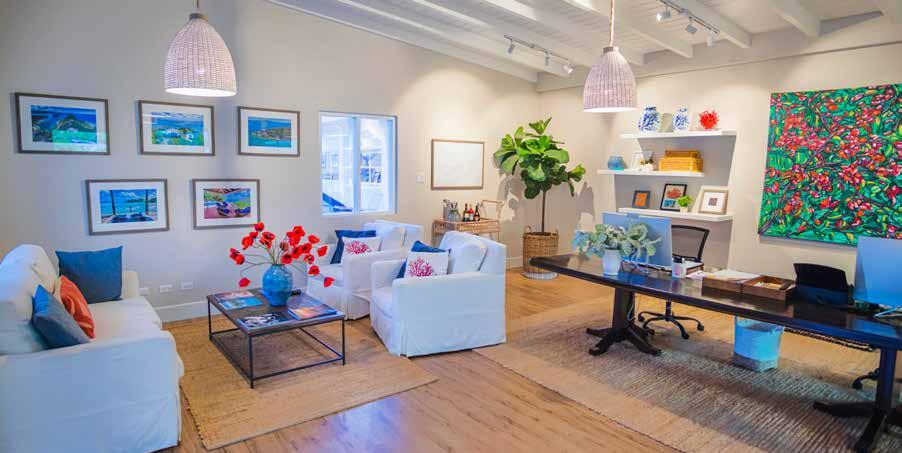
Lucienne Smith: I lived in London for over twenty years, and I had a career in business development and corporate sales but I also worked closely with a property developer who renovated and listed buildings. I loved the process of transformation and I have loved architecture and interiors since I was very young. Having grown up in the BVI, I wanted to return to these beautiful islands and eight years ago an opportunity presented itself to relocate and to utilize my sales skills and love for real estate.
BB: What is the feeling like to have finally hung your own shingle in the real estate space?
LS: It is a great privilege to be able to work independently and to have the opportunity to deliver something new and innovative to the market. It is also wonderful to build a team of like-minded and talented professionals who are consultative in their approach and motived by delivering excellence. People move around and purchase differently, and expectations have evolved a lot in recent years, so it is great to be able deliver real estate solutions which are forward leaning.
BB: What is the significance behind your branding Red Coral?

LS: The delicate structure of coral itself has always fascinated me and I love how it gives protection. There is a connection to family, my father has been devoted to natural history all his life and my mother was a lover of colour and the sea. Red Coral for a number of reasons resonated strongly and it is celebrated for being lucky, as well as being a symbol for energy and joy, so it felt like a good fit.
BB: Are you specialising in any specific area of real estate, such as residential as opposed to commercial?
LS: Our primary focus has been on residential real estate, but we have been approached by clients and investors to broaden that and once we are more established, we will certainly explore niche and complementing markets. For the moment our focus is on residential sales, vacation rentals and estate management.
BB: Will Red Coral have a Villa rental component?
LS: There are a number of really great villa rental and management companies and we work in partnership with them. Finding visitors and clients the right place for them to stay is fundamental and we provide end to end care for anyone looking to rent or buy in the BVI. We have some villas in our portfolio, some with other agents, our objective is to identify which one is right for our clients.
BB: Have you noticed any pandemic driven trends/changes in the sector? If so what are the three leading trends?
LS: That is a really interesting question. What the pandemic has done is redefine buyers’ expectations and to some degree it is still evolving. The first and overarching trend is increased demand from overseas buyers at higher price points ($3M+). Activity in the last 24 plus months alone has already transformed the sales trends here in the BVI. Secondly, across all price points, in sales and rentals, the trend is for homes with plenty of outdoor space and a home office, this is true globally and it has applied to the BVI property market as much as elsewhere. Thirdly, but certainly not least is the growing trend for young local professionals who want to invest and get on the property ladder. The pandemic has made us all think about our quality of life and working with individuals and families who want to invest in their own homes has been a great privilege.
BB: What’s your take on the medium-term outlook for the sector in the BVI?
LS: am optimistic about the winter season ahead and the coming years for BVI real estate. We are a destination of choice for international investors who want to enjoy our high quality of life, low density population and safe and secure surroundings. Many investors are looking for a retreat for their families now more than ever. The cost-of-living crisis is very real and the impacts have been, and will be, far reaching. The pandemic caused global pain and worry, but the recent shifts in political agendas across Europe, Asia and elsewhere are no less troubling. We have certainly seen an uplift in traffic in villa rentals this winter with clients choosing to stay away from Europe and preferring the calm and warmth of the Caribbean. There is a great deal of global uncertainty but the
BVI attracts a very specific investor, they are discerning and want to be here, and with everything that is happening elsewhere the BVI remains a haven for tranquility and escape.
BB: Post hurricanes Irma and Maria the sector saw a considerable influx of local buyers, does that trend still have legs?
LS: Local buyers are our core business and that is what we are most proud of. Belongers are savvy investors and have established enviable property portfolios. Young professionals are increasingly aware that investing in land and property is a smart move and that is definitely a growing demographic. Getting on the property ladder and not paying rent is extremely liberating. We have also seen many longterm residents who want to put down roots and have secured land to build their dream home.
BB: What percentage of those buyers who invested in villas would you say did so as a business opportunity to enter the tourism sector?
LS: That is another great question. We have seen a number of local buyers purchasing a larger family home and then renting the one they moved out of on Airbnb (or other). Others have acquired purely as an investment. The villa rental market is very strong post COVID across all price points, but smaller units are very popular and you can achieve 20+ weeks occupancy with relative ease. I would suggest that 60% of villa purchases have been made with the goal of leveraging for the tourism sector, either directly or indirectly.
BB: What is the principal concern you hear about the BVI from overseas investors in the real estate space?
LS: The initial concern voiced is that it is not easy to get here. Connecting flights from Antigua, Puerto Rico and St Maarten don’t always link up with arriving flights from Europe. The ferries from St Thomas can present the same challenges for flights arriving from North America. This can be frustrating and can certainly deter investors from the East Coast who want a weekend retreat. However, most accept that the tradeoff is being able to enjoy a high quality of life once here. The recent announcement by American Airlines about direct flights from Miami to the BVI, starting next June is a cause for great optimism. The
primary concern once here and exploring investment options is the uncertainty around buying and the timeframes to get governmental approval to invest here. Other Caribbean islands offer citizenship and will fast track transactions to attract investors, although in the BVI it can take six plus months to get issued with a NBLHL. With global economies and currency fluctuations as they are, these timeframes can prove challenging. An additional level of concern and perhaps heightened over the course of 2022 is the low level of local investment being put into infrastructure and amenities.
BB: Where do you see future growth in the real estate space, and is Wellness a potential area of opportunity for investment in the tourism sector?
LS: Wellness is a multibillion-dollar industry and although the very essence of being in the BVI is synonymous with wellness we have not really leveraged from this sector. Some resorts here do this very well, but there is certainly room for a more targeted approach and for the offering to be further developed. Our proposition has always been based on our clear warm waters and our pristine beaches, but the BVI has so much more to offer, which often gets missed. The depth of experience is already here, from hiking to moon lit kayaking, from farm to table and fine dining, dance and theatre, song and poetry, yoga and meditation, all linked to the language and culture of the BVI. The more the BVI celebrates and champions this diversity, the better as combined with the natural beauty of the BVI, it will be hard to find a more compelling destination.
BB: What’s currently keeping you awake at night?
LS: I thankfully sleep well. I am on high alert all day, I am an early riser, so as soon as the sun is up, I am focused on moving forwards. I love being a part of Red Coral’s evolution and having the opportunity to work with wonderful people, work colleagues and clients alike. It is a pleasure to come to work this way which overrides the day-to-day worries. As a startup, we are learning and getting stronger every day and although there is a great deal of global uncertainty, economic and environmental, we never forget that we are privileged to live in the BVI, doing what we love. BB
These conversations typically end with ‘we would like to work with you’ as they soon realize that fund administration is an essential aspect of operating an investment fund. The increasing demand for the appointment of an independent fund administrator organically grew from the need for checks and balances in funds. All regulated investment funds are required to appoint a fund administrator, although at times this has been driven by investor requirements more than regulatory ones.
The investment manager is initially responsible for setting and identifying the investment strategy and investment objective of a fund, but the ultimate

responsibility rests with the directors. The fund administrator, in their role, then assists the investment manager and the directors in the day-to-day operations of the fund.
The two primary functions of a fund administrator are fund accounting and registrar and transfer agency, although various other services can be tailored to meet a wide variety of unique client needs. The fund administrators support the directors with their fiduciary oversight and regulatory discipline that aim to safeguard investors’ interests.
One of the primary functions of the fund administrator is to calculate the Net Asset Value (the “NAV”) of the fund which is circulated to its investors on
One of the most common questions that investment managers ask when setting up an investment fund is ‘do we need a fund administrator?’, which is almost immediately followed by ‘what do fund administrators do?’
a periodic basis. The NAV is calculated in accordance with the valuation policy of the fund, which is predetermined when the fund is initially set up. This valuation policy is typically outlined in the fund’s offering document (the “OM”), and it typically adheres to the International Financial Reporting Standards (“IFRS”) depending on the asset class in which the fund is invested. In most cases, investors prefer to see the valuation policy of the fund defined in the OM, although, at times it may be documented in a separate form. Even though the valuation policy can be documented separately as mentioned, it is recommended that it is included in the OM.
The calculation of the NAV depends predominantly on the type of fund and its investment strategy. In most cases, the typical ‘vanilla’ funds are invested in listed securities whereas those holding unlisted securities or private equity investments will require more in-depth and dedicated analysis.
The main concentration of the work will be on portfolio valuation. The portfolio investments of a fund can vary from exchange-traded securities such as stocks, bonds, options, futures, and exchangetraded funds (“ETF”). These investments can also include unlisted securities, and investment funds, such as private equity funds, real estate, and cryptocurrencies.
The valuation policy of a fund should cover how to price all the different assets of the fund. Typically, funds follow the IFRS valuation standards, and in cases where they deviate from IFRS, the valuation should be properly supported by an independent pricing agent.
The other primary function of the fund administrator is to process investors’ subscriptions and redemptions and to maintain its share register. The compliance function is an essential part of this.
Furthermore, due to the level of risk and responsibility required of fund administrators, they are usually SOC 1 (“System and Organization Controls”) accredited. The SOC 1 accreditation certifies that the fund administrator has effective systems and controls to ensure that they are recognizing, accounting for, and mitigating risks in financial reporting. This also gives the fund auditors and investors confidence in the internal controls of the fund administrator. Given that most regulated funds are required to file audited financial statements, having an independent SOC 1 accredited fund administrator enables
auditors to place more reliance on the financial information provided to them. With the growing regulatory requirements for investment funds, it has also become administratively vital to have a fund administrator who can assist and provide the necessary support to investment managers and directors to ensure that the fund is, and remains compliant with, the various annual reporting deadlines. Furthermore, having the right fund administrator to work with makes the reporting much less cumbersome and significantly raises operational efficiency.
Changing appetites in investment funds delivered the introduction of a new asset class that has created significant demand for a different type of investment fund to grow: namely, crypto funds. The rise in the levels of interest in setting up crypto funds has grown dramatically over the last few years. More and more investment managers are deciding to venture into this new asset class. The need to have the right fund administrator with highly specialized experience is integral to reducing inefficiencies and maximizing beneficial outcomes for investors. Fund administrators act independently when protecting the interests of investors by determining if the fund is consistently in line with its investment strategy.
In the British Virgin Islands (“BVI”), various funds are operating under different licenses. As of 30 June 2022, the BVI Financial Services Commission (“FSC”) has published its quarterly statistical bulletin. In this report, there are over 1,800 registered funds in the jurisdiction. They range from openended funds such as Professional, Private, Public, and Incubator and Approved funds to closed-ended funds such as the recently promulgated Private Investment Funds, most commonly known as PIFs.
At the end of 2019, the Securities and Investments Business Act (“SIBA”) was amended to include the registration of Private Investment Funds. This was in response to the growing pressure from the European Union (“EU”) to regulate closed-ended funds. This new regulation has drastically increased the number of registered funds in the BVI.
One of the main requirements of a PIF is that it has a valuation agent, such as a fund administrator, who can calculate the NAV of the fund. The launch of PIFs has amplified the demand for fund administration services.
With the growing number of new opportunities created each year it is important for fund administrators to offer dynamism, flexibility, and ease of navigation. These are some of the key strengths of ATU Fund Administrators (BVI) Limited (“ATU Funds”).
Incorporated in 1997 as part of the ATU Group of Companies, ATU Funds was the first licensed Administrator of Mutual Funds in the BVI and currently holds a Category 6 investment business license, issued under SIBA.
ATU Funds has grown notably in recent years by providing products and services that are innovative in how they satisfy the increasingly sophisticated needs of investors and investment managers. ATU Funds is a boutique and dedicated 15-person fund administration team all based in the BVI.
As a SOC 1 accredited fund administrator, the ATU Funds team deliver the following services:
• Full fund administration services, including fund accounting and Registrar and Transfer Agency services;
• Preparation of IFRS financial statements;
• Ensuring compliance with CRS and FATCA reporting requirements;
• Coordination of the establishment of different types of investment funds;
• Facilitating the establishment of investment management companies in the BVI;
• Provision of MLRO and Compliance Officer services;
• Registration of funds in Bloomberg;
• Obtaining an ISIN for a Share Class in a fund;
• Preparation of financial reports for the board of directors and investment managers; and
• Providing referrals for key fund functionaries such as auditors, custodians, brokers, etc.
Additionally, ATU Funds’ close proximity to its sister company, ATU General Trust (BVI) Limited, allows for an extension of the traditional fund administration services by utilizing ancillary services such as fund directorships, registered agents, authorized representatives, and compliance functions. With this overall perspective, ATU Funds exemplifies the best of what a full-service provider can offer. BB
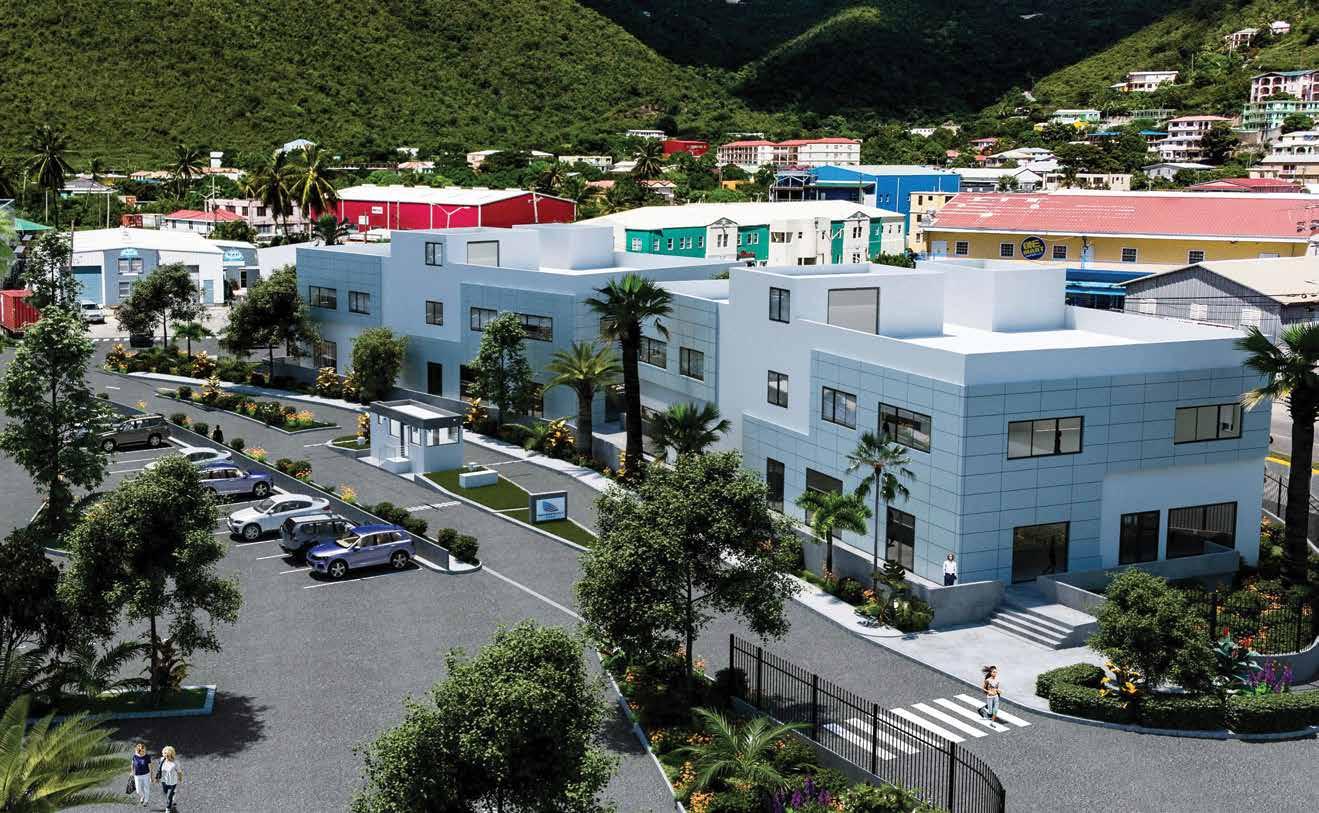







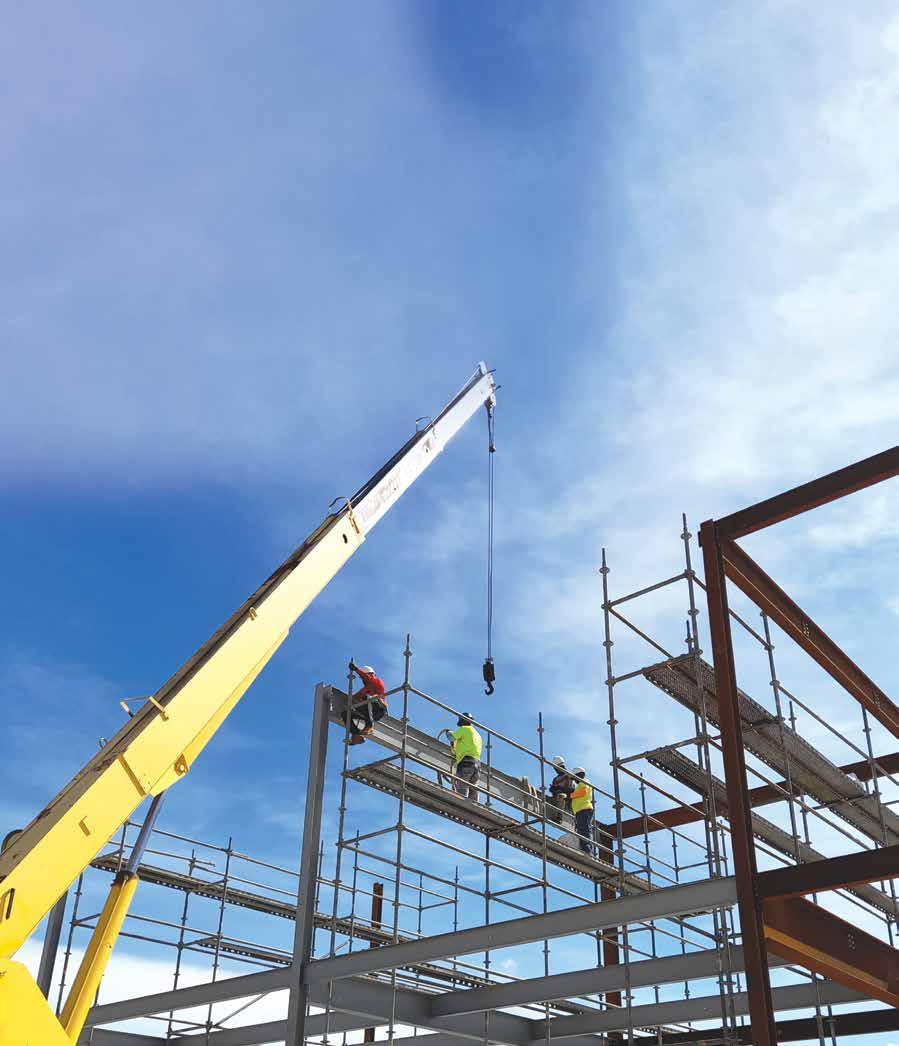 Marvin Flax
Marvin Flax
Construction employment is a significant contributor to the British Virgin Islands economy and the gross domestic product. In 2022 the territory struggled to cope with a series of challenges threatening the industry. Like most countries, the BVI was starting to recover from the Pandemic, and shortly thereafter, the Ukraine-Russian conflict started, which significantly spiked fuel prices. In April, there was an abrupt change in local leadership, all on the heels of the concluded Commission of Inquiry and the threat of the constitution being partially suspended. Many residents and onlookers felt that this was a crisis that threatened to upend livelihoods and the territory’s economic pillars. Despite those challenges, 2022 was seen as a successful year for many contractors.
In this annual update, as I have done prior, I paint the picture of what forces are having an impact, either positively or negatively, on the construction sector. We will explore the global economy, the banks’ role in the construction process, Town and Country Planning, the British Virgin Islands Government, The Recovery and Development Agency (RDA) and opportunities that contractors are utilizing to diversify and expand their services.
We are impacted by global economic forces, in which the British Virgin Islands is very much an active participant. Elevated shipping costs, 40-year high inflation, and elevated interest rates designed to offset and help manage the aforementioned inflation levels have set the stage for a recession, higher unemployment, and slow
to zero growth in 2023. Through 2021 and 2022 as the pandemic raged, excessive lead times for materials were due to a significantly decreased manufacturing labor force and diminished demand. This caused significant disruptions to supply chains and procurement for all constructionrelated projects locally and globally as the demand quickly turned around due to a high residential sales market in the United States. On several occasions in 2022, sand was not available in the territory. That is one example of many procurement challenges contractors faced.
The extended lead times have improved for some materials, but glazing products and household appliances are still months passed pre-pandemic timeframes. Many home builders and project managers still encourage their clients to purchase many of these items before commencing construction. This usually requires having readily available cash flow.
Over the last four years, the British Virgin Islands Central Government has loaned and injected capital into many reconstruction projects. Some have been tendered, some are actively under construction, and others are in the design stages. From infrastructural projects, to a new West End Ferry terminal, The R.T. O’Neal Central Administration Complex, The Elmore Stoutt High School, and Prospect Reef, to name a few. Dr. The Honourable Natalio D. Wheatley Premier and Minister of Finance recently gave his first budget address, and referenced several future construction and design-related requests for proposals that are game changers for the construction market. Later in this article, we will discuss some of them in more detail.
Local financial institutions play a vital role in the construction industry. Variable rate financing or bridge financing has been common over the last two years. Banks were providing low-interest rates, driving the demand for residential home construction. This led to mortgages that were close to rental costs. The local banks’ risk appetite changed, and more were receptive to taking calculated risks. With the current high inflation rates, however, the market is beginning to change, and interest rates are rising and are expected to remain that way for at least the next two quarters. The expectation is that the demand for bridge financing is going to soften. The above factors greatly aided the 2022 construction activity but expect a cooler residential building market in early to mid-2023.
Despite the risks, the banks see publicly operated transportation structures as sweet spots, and the BVI government will more than likely seek financing for some of them. Overseas developers present challenges for financial institutions because most have low cash flow, big ideas, and little experience. With direct airlift from Miami by American Airlines on the horizon, expect more foreign investment opportunities that will create construction employment.
The banks monitor and protect their early investments, by hiring quantity surveyors to assess the bidding process that they require from potential home builders. They usually request three quotes, and each one is analyzed in detail. Ideally, a bill of quantities is produced, and each contractor adds their rates. This creates an apples-to-apples comparison document that is considered the best practice. Usually, a potential home builder has a preferred contractor they want to work with and if they can negotiate a price independently of the tender process, the bank will still want it to be analyzed. Quantity surveyors usually look for industry averages related to labour and materials. During construction, the banks are given regular updates and reports by the quantity surveyors, which assess progress and current value. These reports also determine drawdowns or payments to the contractors for their monthly certificates.
For half the year, the British Virgin Islands Government reduced the import duty percentage to 5%. In some instances, home builders saved an average of $30K - $40K per home. For some home builders who happened to have building permits, but were on the fence if they should start construction or not, the tax discount helped them decide.
As I have done in past updates, I highlight the activity at the RDA and the Town and Country Planning Department. The Chief Planner and his team play a vital role in facilitating the overall process from design through construction to receiving a certificate of occupancy. These government-funded entities provide an informed snapshot into the front-line activity of the local construction economy. Some recent statistics worth mentioning; four years ago, one year after Hurricane Irma ravaged the territory, between September 2018 – September 2019, TCP received 377 applications. As with most post-disaster jurisdictions, those twelve months were seen as a construction boom. In 2020, TCP received 250 applications.
For the first three quarters of 2022, 244 applications were submitted to the department. Of that amount, 192 were single and multi-family homes. The other 52 make up resort residential and commercial applications.
The above numbers indicate that residential and multi-family (apartments) development drives the local construction market as usual. For many years, Virgin Islanders have built apartments, catering to the expatriate population. The banks are usually receptive to these building types as they have traditionally been seen as low risk. With a percentage of the population that left the territory during the pandemic, there is an oversupply of apartments, which is driving the rental costs down. Most of these structures are built by small to medium size firms. The medium to large outfits are usually sufficiently staffed and have the operational capacity and pre-qualifications to work on the resorts, larger homes, and RDA / BVI Central Government tendered projects.
The private resorts in the North Sound area of Virgin Gorda have been reopening one by one since 2020. The Bitter End Yacht Club and Saba Rock both reopened in late 2021. Biras Creek also in the North Sound, is one of the last resorts to start their rebuild. They are past the halfway mark and are targeting Q4 of 2023 to reopen the resort’s first phase. Oil Nut Bay continues to outperform most regional residential resorts, with multiple home lots either under construction or several in the design stages.
The RDA remains a bright spot for the territory. Cabinet recently approved an extension for 3 more years for the agency. The successful and timely completion of the Elmore Stoutt High School highlights 2022. The RDA tendered the demolition, architectural designs and eventually tendered the new academic blocks. According to recently published figures, the E.S.H.S. cost $15 million and took 12 months to build almost 25,000 square feet. At the peak of construction, the four construction firms totalled 140 workers on site daily. That number included foremen, masons, carpenters, landscapers, electricians, plumbers, and project managers. The four construction companies led by the RDA CEO and his project management team are to be commended for their dedication and commitment. An unintended consequence was that at various times during the construction of the high school, many other construction sites were understaffed due to
the labor force demands. Projects like this come along seldomly and have major positive impacts on the local economy. The next big project the RDA is leading is the West End Ferry Terminal. There are only a handful of locally qualified marine experienced contractors in the BVI, so expect to see some local companies teaming up with foreign firms before the request for proposal is released. The Terminal is a Caribbean Development Bank-funded building so lending countries can submit tenders.
Premier Wheatley recently mentioned the Prospect Reef Resort project in a press release and his recent budget address. The first step in the rebuild is via a request for proposal. While no specific details were given, the expectation is that the RFP will require local and foreign financing, local and foreign ownership, a concept design & masterplan, a contractor, a hotel brand, and a preliminary construction budget. The resort was bought in 2005 by the BVI Government and was slated to be a hospitality training centre. Two different development deals fell through dating back to 2013 and in 2017 Hurricane Irma destroyed the property which is ideally suited for a lifestylebranded four-star mixed-use resort. The lack of a beach is a challenge that could prevent attention from a 5-star brand, but it can attract a high-end marina anchor operator. The RFP should attract a great deal of attention from local and foreign investors and contractors.
In 2022 the BVI Government secured additional contractors to work on additional areas of the R.T. O’Neal Central Administration
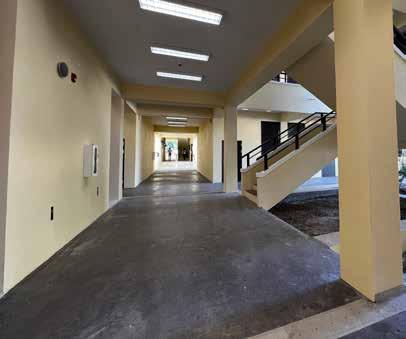
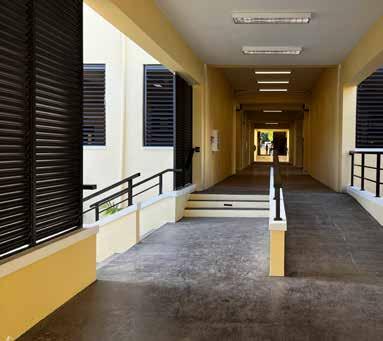
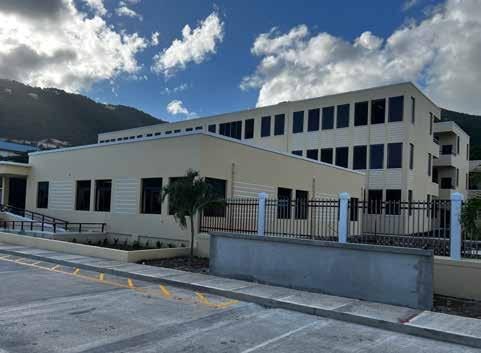
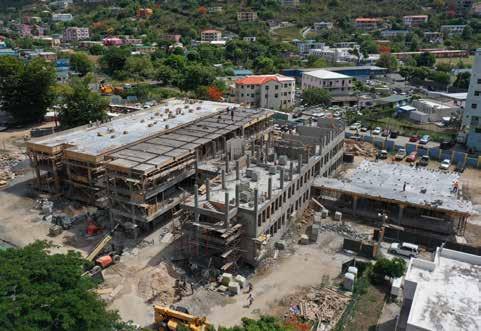
Complex. The building has a 95% complete new high-impact curtain wall glazing system and a 50% enhanced façade design. A recently tendered exterior attached elevator will commence construction in Q1 of 2023. Several other RFPs are slated to be released from the Central Tenders Board for the Complex. They will include; a complete interior fit-out, new furniture, a new HVAC system, new fixtures, fittings, and equipment, a new information technology system, and new electrical and plumbing systems. The above items will require skilled contractors with an available labor force.
Contractors who may need more of a workforce and/or unique skills should consider joint ventures or importing temporary labour, who can assist in more complicated projects requiring warranties and certifications that a local firm cannot provide. The R.T. O’Neal Complex is an example of this successfully being done. While completion of this government-owned structure is still a way off, this project will hire dozens of construction workers.
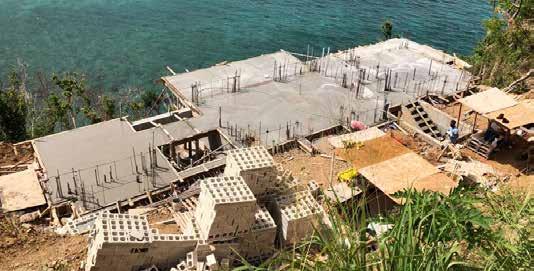
Local Class A developer JOMA Properties, which has over 200,000 square feet of existing commercial real estate, is now entirely out of the ground with two new additions to its portfolio, with their 55,000 square foot Port Purcell East development. Larry Adams Construction was the successful tenderer, and they average a daily site workforce of 35, but that number is expected to grow as the workflow increases.
Asset and cash-flow friendly contractors, continued to use their skilled workforce to build their own commercial real estate
developments. This is not the local norm but an excellent example of controlling costs to facilitate investment projects.
A major development that will have a longterm positive impact on the construction market, is American Airlines’ returning to the Virgin Islands in June of 2023 with direct flight from Miami. This development has been met with great enthusiasm for several reasons. One of which is the impact on the tourism industry. The absence of direct airlift capacity from the US has always been detrimental to hotel development and foreign investment in the territory. The BVI tourism product can now move to realize its full potential and by extension, will create hundreds more construction-related jobs.
Forbes Magazine recently named Virgin Gorda the eighth-best place in the world to visit in 2023. Accolades like this are a testament to the successful rebuilding of the island’s tourism plant, especially Rosewood Little Dix Bay and the many North Sound resorts. The construction labor for these properties was mostly sourced locally, which is a clear sign that
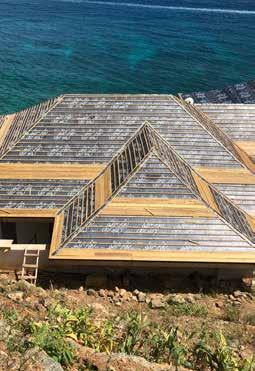

the needed building skills and workforce are readily available.

In 2022 The BVI government enacted a new Public Procurement Act, 2021. According to the legislation, it is “An Act to make provision for the regulation of public procurement, providing for the fair, equal and equitable treatment of all tenderers and for other connected matters.” This act will be the new guiding legislation related to taxpayer-funded tenders. All contractors that plan to respond to a request for tenders need to familiarize themselves. One of the Act’s primary aims is to promote transparency and fairness in public procurement.
The first two quarters of 2023 will be uncharted territory for most of the world and the BVI will be no exception. Global forces will continue to impact inflation, interest rates, and consumer confidence. Despite this uncertainty, members of the construction community are mostly optimistic and poised to seize the many current and available future construction opportunities noted above. BB
With roots in the BVI for over 50 years, OBMI has held an outstanding reputation for creating sensitive, unique, and appealing designs within tropical environments. From conceptualization to built reality, we devote ourselves to capturing your vision.

Just as I parked by the mango tree adjacent to the A. O. Shirley Grounds, across from the tamarind tree that intersects Pickering Street and Station Avenue, I was approached by a 13 year old track athlete. “Good afternoon, Mr. Greenaway,” the male athlete said. “Can I ask you something?” Yes, I replied curiously. “You know the ceremony that you had earlier in the month, will you be having it again?”
At the time in January 2010, I was President of the BVI Athletics Association and assured him that the ceremony - an Athletes Awards Gala introduced after the 2009 seasonwould be held as long as I was in the post. “Thank you,” he said as he eagerly bounded off to train. That athlete is 400m Hurdler Kyron McMaster, who now carries the BVI brand around the globe and was inspired to achieve by an incentive.
The territory came into the global spotlight, when sprinter Tahesia Harrigan-Scott won a World Indoor Championships 60m

bronze medal in Valencia, Spain in 2008, becoming the smallest country to have a podium finish. That historic feat coincided with the opening of the red Mondo track surface at the A. O. Shirley Grounds and has seen an upward trajectory in the development of the sport, as evidenced by the growth of women in particular, who began carrying the sport in 2005. The immediate impact since the introduction of the Athletes Awards Gala 12 years ago, was observed with an improvement in performances that was seen from the first development meet in January, 2010 and has continued ever since.
A second, but more important initiative was introduced with the start of the 2013 season, when ‘Project Podium’ was launched. An analysis of BVI athletes performances at the Carifta Games, showed that while our athletes were winning medals, unlike their regional counterparts, whose athletes were advancing to finals and winning medals in other major
competitions including the World Youth, Junior and Senior Championships, Pan Am, Commonwealth and Olympic Games. While our athletes qualified for the events, they were not advancing to semifinals and finals.
The concept for Project Podium, was for BVI athletes to eventually make its name known on the global stage and to win one medal between 2013 and 2018, in an area where no medals had been earned. As a result, all athletes aged 10-14 on clubs who would be 16-17 between 2013-2018 were identified and placed in a projection pool through the 2020 Tokyo Olympics and lined up with the respective competitions over the years. However, not many bought into the vision.
Ironically, the exception was McMaster’s coach Dag Samuels, who didn’t believe in developing ‘teenage stars’ who would fade away by the time they depart from U20 competitions. On reflection, Project Podium began yielding fruits in its first
year, when the youth team of 16-17 years old, won an IAAF World Athletics Championships Mixed Relay silver medal. In individual events, athletes gradually began advancing to semifinals and finals and medals began coming in from areas where they have never been won before. By the 2018 Project Podium timeline, six medals had been won in five different areas including McMaster’s IAAF World Jr. Championships (U20) 400m Hurdles bronze and the 2018 Commonwealth Games 400m Hurdles gold.
All told, by the Tokyo Olympics, BVI athletes had won seven medals in six different competitions, and had reached World Championships and Olympic Games finals, with McMaster earning 4th place finishes in both events. Long Jumper Chantel Malone became the first BVI Olympic Games finalist, before being joined by McMaster. Winning an Olympic medal would put the BVI in a unique position in global sports, as one of the smallest countries to do so and further cement the territory’s brand globally.
As a budding ‘global soft power’ in sports, the remarkable development of our athletes over the last 12 years in particular, has seen three BVI athletes currently ranked in the Top 100 All Time globally, in the history of their respective events. McMaster’s 47.08 seconds in the 400m Hurdles, is No 4. Long Jumper Chantel Malone’s, 7.08m (23’2¾” is No 42 and Shot Putter Eldred Henry’s, 21.47m (70’5¼”) is No 88. While Harrigan-Scott’s 11.13 seconds 100m is tied at No 317, a remarkable feat in the BVI Athletics Association’s 52-year history, that quietly slipped by on September 19, 2022.
With the resumption of the Carifta Games - an U17 and U20 championships for athletes from 26 regional countries - after a 2-year hiatus because of the pandemic, Adaejah Hodge emerged as the new face of BVI athletics. Hodge, 16, became the territory’s first athlete to win three gold medals in one Carifta Games in her debut and earned the Sir Austin Sealy Award, for the Most Outstanding Athlete. The BVI, who began participating in the Carifta Games in 1976, became the 11th country with an athlete claiming the prestigious award since its 1978 introduction.
While track and field has been at the forefront of carrying the BVI’s flag internationally, swimming, led by Elinah Phillip - who learned to swim at Long Bay Beach, Beef Island - has also emerged on the international scene, competing at the FINA (International Swimming Federation) World Championships, Commonwealth and Olympic Games levels, despite the territory not having a pool of any size. A pool would be beneficial not just for competition but introducing a water safety program, swimming lessons and being able to attract collegiate teams to train in the territory with spinoff benefits for our youth, our economy and our brand globally.
In order for sportsmen and sportswomen to continue carrying the BVI brand globally, there must be sports reform. While there’s an Inter Primary Schools Track and Field Championships, involving 19 public and private schools, there isn’t the same for other sports, although Football has introduce Primary and High School competitions and players have emerged from that program on to the national team.
This reform must see a structured Primary and Secondary Schools program, with team sports in particular—Basketball, Softball, Volleyball—competing in zones. Associations governing the respective sports too must be reformed and have programs in place, targeting U9 through national leagues. From these competitions, they will fan out through the various national competitions for each sport. There must be a structured calendar season, with pre season
competitions. Our athletes spend far less time in competition and training, than in competition as their regional counterparts, but are expected to be competitive when they face those spending more time on their craft.
Having a structured system, will see more of the territory’s sportsmen and sportswomen, obtaining athletic scholarships and that exposure translates into building national teams and by extension, the athletes who will represent the territory internationally, particularly in individual sports.
For sport’s development to really thrive, there must be government support as well, with sports having its own line item in the national budget - from funding school based programs where the grass roots seeds are sown, through assisting in partnership with the private sector - teams traveling to international competitions. The investment made, will engender returns down the road, as evidenced with the breakthrough of McMaster. There are many more McMasters out there, but the structure must be in place.
A critical component of getting the BVI to remain as a global soft power, starts with the education of key stakeholders and policy makers. This way, better decisions regarding funding programs can be made, as this is a long term investment. There’s also a dire need for each sport to do more about its history, research and analysis, for the betterment of their respective sports.
Furthermore, there must be a plan by associations to have inter district competitions in all team sports. Our fields across the expanse of the country should be occupied with our youngsters being exposed to different sports at all levels, with the associated leagues. This existed before in softball and cricket in particular, when there weren’t the opportunities available today, for exposure as well as regional and international competitions.
Training of administrators, coaches, table officials, public relations officers, using the various high school community service programs, is a great place to start in order to meet the goal and develop the capacity and the requisite pool of officials. Those who are exposed to sports, but might have no interest as a competitor, can find a place in sports as an official or using the technology that they understand to enhance the delivery of sports at all levels.
In conjunction with the respective programs, there must be the requisite athlete services put in place - massage therapists, physiotherapists, psychologists, nutritionists, doctors, strength and conditions coaches, among others-from the grassroots levels, treating, rehabilitating and educating athletes about their bodies and injury prevention. The same services must also be available for our athletes competing in regional or international competitions. Our athletes have competed at the highest levels without these basic services that their counterparts have access to and are expected to produce podium finishes - an impossible task.
If the BVI is to deepen its impact in sports as a global soft power, the vision must be clearly articulated and all the requisite systems and resources along with private sector support, must be in place. BB
“A critical component of getting the BVI to remain as a global soft power, starts with the education of key stakeholders and policy makers.”

is a commodity
Confidence is a commodity, one that is vitally critical to the success of any modern economy, notwithstanding its size. Since 2017, confidence in the BVI has been repeatedly shaken at a very foundational level. First came the double whammy of two Category five hurricanes in quick succession within a two week period, followed by a global pandemic two years later and fast on its devastating heels, a year later, the appointment of a Commission of Inquiry into Governance of the Territory. The principal recommendation of the COI was the partial suspension of the constitution, essentially, the suspension of the hard fought for democracy in these British Virgin Islands. A recommendation accepted by the UK’s FCDO two short months after Putin’s invasion and attempt to snuff out democracy in the Ukraine. And to cap it all off, this announcement was made by the Governor, coupled with his release of the COI Report one day after the arrest of the then Premier in Miami at the end of last April. Clearly, a sustained broadside that would shake the confidence of all but the Angels guarding St. Peter’s gate.
As we contemplated the direction for this edition of Business BVI, we decided to focus on the critical role of confidence in repositioning the BVI in what is very clearly, a potentially sustained and uncertain global economic outlook. We eventually opted for a Special Section informed by a focus group approach, augmented with articles written by and interviews with key leading private sector influencers, at the forefront of our primary economic pillars - tourism and financial services. Persons who we deem uniquely positioned to share with our readership, their take and insight into the economic and business outlook for the territory in 2023, and beyond. We did so with an eye squarely on the fact that 2023 will see general elections in the territory. We also wanted to provide the wider community with an informed take on the thinking of the
business community as voters consider their options for the political leadership of the territory for the next four years.
As a territory, we must come to grips with the firm reality that we are losing our competitive footing in the global economy, in our two key areas of economic activitytourism and financial services. We can no longer afford to bury our heads in the sand and pretend otherwise. This diminution of our global competitive standing as we see it, comes at a time when the global economic landscape is facing significant fundamental turmoil, economic and geopolitical. A time when the decoupling of the US and China is very real, and where the potential fallout is estimated at a 5% drop in the global GDP, equivalent to the size of the Japanese economy. It also comes at a time when attempts at diversification of our economy will be that much more difficult, given the head start of our immediate competitive set. An undertaking that we have dangerously neglected. And, underpinning our current position, is the hard reality that our national infrastructure is less than fit for purpose in a competitive arena.
The challenge before us is not insignificant. It is fundamentally about the future quality of life that we will enjoy, as residents of these islands. And it will require steady, informed and strategic leadership to address. Not emotional nor knee jerk leadership. It will require an acceptance of where we are, and hence what must be done to change our current trajectory, thus placing us on a road to regain our footing. We need a growth agenda, one that will invest in the economic muscle of the BVI. We must up our game and our longterm thinking and investment in our economy. We must have an honest debate and discussion about the key role a strong economy plays in our standing as a people and territory. We must be fighting fit if we are to survive and thrive.
What follows, is our 40K word, head first, deep dive contribution to the ongoing discussion of what we as territory must do,
to halt our race to the bottom, regain our footing and return to our former posture of - punching above our weight class in our economic space. We believe that the BVI has substantial upside potential. We conducted the following three focus groups to help to inform the discussion.
A deep and informative dive into the current state of doing business in the BVI and the global challenges and trends that are impacting the jurisdiction in what is clearly a sustained period of global uncertainty economically and geopolitically.
What follows is but a glimpse into some of the issues flagged up in the discussion:
What will be the impact on the BVI financial services sector should China cross the Taiwan Strait
The FSC deserves credit for the way they have handled digital assets
The cold war response to the deepening China/Russia alliance and the implications for the BVI
Time to pivot to quality over quantity
Time for satellite driven high speed internet services in the territory
The introduction of the concept of a Registered Agent in the UK - is this and opportunity for the BVI to monetise its deep knowhow in the area
The need for a government revenue model based on quality instead of quantity
The need for a strategic alignment between the public and private sectors in the BVI
The need for the client facing private sector to drive idea generation in the space
Does the government have the capacity
The need to focus on an economic growth strategy for the territory
Is it now time for the separation of the Registry from the regulator with the registry focused on selling companies
BVI TOURISM FOCUS GROUP - A STATE OF THE INDUSTRY DISCUSSION - A wide ranging and immersive dive into the current state of tourism in the BVI, informed by a back drop of a destination emerging from the disastrous hurricanes of 2017, the lingering pandemic overhang, a very competitive global tourism space and the ghostly figure on the horizon of a recession in our key markets. A worthy read for anyone, in or out of the space, given tourism’s significant directional pull on the local economy and the quality of life enjoyed in the territory. These pull quotes offer an enticing colouration of the discussion:
“I’m optimistic. The war in Ukraine obviously was a curveball that none of us expected after coming out of the pandemic.”
“It needs to be ongoing, the same way they do it in financial services: Every step you make, you consult the industry. Every change in policy should be discussed with the industry, so that you get the full perspective of how it’s going to affect things.”
“We had a 13-point plan for tourism coming out of the hurricanes. Where is the plan for tourism as it relates to coming out of the pandemic? Where is the national strategic plan for tourism?”
“There’s a lot of emphasis on wellness. That’s something that we can do very well here given the natural make up of the BVI. We should look more into capitalising on that.”
They just question, “Do we want to do business in a place with that much governance issues?”
“But [we need] leadership that says, “Tourism is our numberone priority.” We have [to have] all of the departments working towards a common goal that is set by leadership: “Tourism is our business. Anything that affects tourism needs to be dealt with in consultation with the industry.”
“We’ve got to make it more efficient. Especially for younger travellers: They’re used to everything happening instantly. Nobody wants to be standing in a Customs and Immigration line for an hour in this day and age with advanced technology being what it is.”
“The college has done a great job with that on the marine side. They actually took the time to design that programme based on what the industry told them they needed. That’s starting to pay dividends now.”
“Yes, our arrival numbers have gotten better. But if we do a deep dive into what our numbers were, even 2019 prepandemic and 2016 as opposed to 2019, we’re still 50 percent down on overall overnight arrivals.”
“A brand-new boat that goes into the charter fleet sits on the dock for about 45 to 60 days — not producing revenue — to go through all the hoops, to get all the paperwork. Of course, we always do the paperwork; we do everything by the rules. It’s becoming more and more difficult to do that.”
BVI TOURISM FOCUS GROUP - WHAT’S GOING ON IN THE LUXURY TRAVEL SPACE - No economic sector in the territory is in greater need of attention than the Tyrannosaurus-rex in the space: Tourism. A failure to refocus our tourism, has the potential in the near term to impair and hollow out the local economy, with real consequences. For this most important focus group, we followed our mantra of seeking out some of the sharpest minds and freshest thinkers, with in the weeds knowledge of marketing luxury travel. Panelists with a granular understanding of brand BVI and what differentiates it in the luxury travel space. I am most pleased to say, we were not disappointed. This panel confidently stepped up to the plate and delivered a thoughtful and incisive discussion about the BVI attractiveness in luxury travel, what is required to remain competitive and responsive to clientele in the space, given the constantly evolving trends shaping this key market segment.
Follow the bread crumbs below for a flavour of the discussion:
“Money is not their greatest problem: Time is.”
“Tolerance for turbulence”
“So that TikTok person is going to be our guest sooner than we think.”
“Being nimble and quick and having your plans ready to change — and have lots of ABCD plans — is really the new normal.”
“Jumping onto a helicopter is like getting a taxi for a lot of them.”
“Generally for us, that’s when we tend to see our highest level of occupancy pick up: about 120 days out. But that has been changing. We have been seeing in-the-month-for-the-month bookings, which has never happened in Little Dix Bay’s history.”
“What kinds of adventure things are we offering? What kinds of cultural experiences do we have? What kinds of culinary offerings are there that’s going to appeal to the millennial tastes?”
“The one thing I would say — and I don’t want to offend anyone here — I do feel that the Tourist Board has taken its foot off the gas a little bit. Actually, they’ve taken their foot off the gas a lot over the last couple of years.”
“They know that they’ve got to please the grandchildren to get the whole family to go. The advisory board was saying to the cruise line, “Talk to the kids. That’s where you’ll get the business from.”
“That’s where we’re beginning to see that increase in multigenerational families who are bringing their kids, their grandchildren. I’ve got a guest who will be coming to us this year: I believe it’s going to be her sixty-sixth stay. She’s ninety-six years old, and we have her, her children, her grandchildren, and her greatgreat grandchildren. It’s a beautiful thing.” BB
We need a growth agenda, one that will invest in the economic muscle of the BVI. We must up our game and our longterm thinking and investment in our economy.
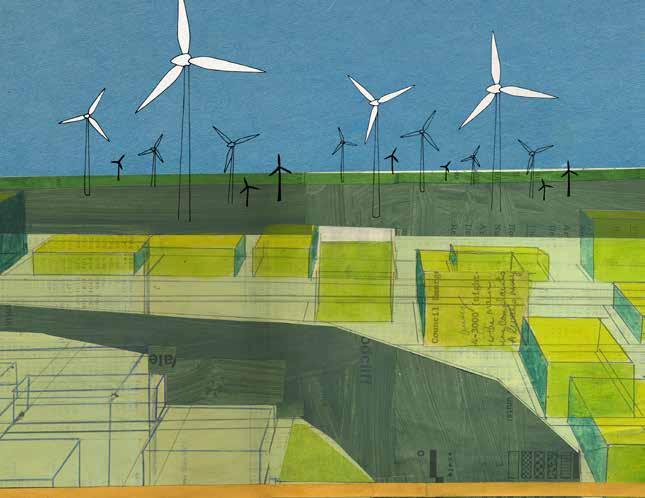 Colin O’Neal
Colin O’Neal
At the time of this writing in November 2022, most advanced economies stand on the brink of recession. At the same time, the British Virgin Islands continue along the path of an arduous recovery from the COVID-19 pandemic and the 2017 natural disasters, which devastated large swaths of the built environment and caused significant social dislocation and economic hardship. In these circumstances, one might see only struggle in the shortterm future for the BVI, as there is so much yet to be done in terms of recovery. The purpose of this article is not to offer predictions, nor to downplay the challenges arising from these disruptors, but to offer a practical manifesto for positive change in the BVI, as we meet the challenges of recovery and the opportunities which lie beyond.
Unfortunately, in the past, my inclination to call things as I see them was received in some quarters as being pessimistic. In this article, I hope to put this notion to rest and revisit some old observations about the BVI economy and offer some options regarding what we might do differently, to achieve the material prosperity which is the bedrock of successful societies.
I approach my thoughts about the possibilities with the mindset of a real estate developer, accustomed to taking the long view of things based on a sense of optimism. The real estate development business is founded on an optimistic view of the future. With project financing spread over ten to twenty years and expected return on investment likewise deferred according to long timelines, taking the long view and faith in the future are essential parts of the developer’s toolkit
and a motivator for action and progress. The late United States Secretary of State, General Colin Powell, said that “perpetual optimism is a force multiplier.” It is through an optimist’s lens that I view the future of the BVI.
The BVI has the potential to bounce back from the recent natural disasters and successfully negotiate challenges, presented by the recommendations from the recently completed Commission of Inquiry (“ COI”) to create a community that is more prosperous, resilient, and equitable. The requirements to meet these challenges are varied and complex, but one clear thing is that we can only do so upon the foundation of a strong and growing economy. This article focuses on infrastructure, which I view as the backbone of any modern economy.
Several years ago, I was a guest on a call-in radio talk show when talk shows were “a thing.” I was invited to discuss an article I had written, concerning the issue of developing a social and political consensus around key development policies for the British Virgin Islands so, that successive governments could advance an agreed national agenda and discontinue the stop/ start approach to significant development in the BVI. A caller stated that a developer who had any commitment to the country should cease doing projects as the sewerage infrastructure in Road Town was already overstrained. Despite being taken aback by the suggestion, I found that though he may not have intended to do so, the caller was articulating an approach to development that was worth reflecting upon and which should not be dismissed out of hand. Many voices have been raised supporting the argument that we should slow down growth to retain the character of the BVI. Usually, these voices emanated from those comfortable enough to be satisfied with the status quo and what they have already achieved or those sufficiently isolated from the daily frustrations that affect the lives of the majority.
The approach just mentioned, suggests that we have the infrastructure (in this case, a sewerage system), and the infrastructure would work fine if we did not tax it further through greater use than for which it was designed. Stretching the argument to its illogical conclusion, we have reached full capacity for development, so we ought to maintain what we have and be careful not to overuse it. This argument might be attractive if one was prepared to limit all further growth and deny the entrepreneurial drive and ambition of those trying to improve their lot, while collectively improving the standard of living of the territory. However, the “standstill” approach is not one that I believe will appeal to most people. The logic is unconvincing. To stand pat on what we have, will more likely than not cause us to lose ground, relative to our regional neighbours, who are also our competitors. We have witnessed this nearby in the United States Virgin Islands, where vast sums of Federal dollars are transforming infrastructure in that territory. Furthermore, it may be viewed as inherently unfair, not to mention counterproductive to growth and advancement, that we deny others the same
opportunities for wealth creation and selfrealization that we have enjoyed. But, more important, should the country be deprived of the benefit of the entrepreneurial energy required to power economic growth, needed to underpin the social and economic advancement of the people? To my mind, the only answer to that question is an emphatic “No.”
Infrastructure must be viewed as a foundational element in economic development, rather than an option. The lives we all enjoy are a function of the increased economic activity generated by, or from the BVI over the past six decades. Tourism, from the 1960s and, in more recent times, financial services, have put the BVI firmly on the map and firmly in the consciousness of the global community. Every aspect of the growth of the economy which has underpinned the rise in living standards in our community, has been supported by investment in physical infrastructure: airports and seaports to facilitate visitor access to our country; roads to move people and goods; electricity to power commerce and industry; water for our consumption and use in construction and other industries; hospitals and healthcare clinics; telecommunications to link individuals and businesses to each other and the outside world. Infrastructure is, in simple terms, the basis upon which economic capacity and growth have been enabled, a platform that must be continuously improved to sustain and advance our well-being. Looking forward to prospects for our future prosperity, we must also be mindful that where investment takes place, depends in considerable measure on the quality of infrastructure and our infrastructure, compared to our competitors. Even among local BVI developers, investment cannot continue indefinitely without the necessary foundational support and continuous improvements. This is especially true today
as the impact of climate change – more frequent and powerful storms and rain events – and population growth add stress to public infrastructure.
Where is the BVI in terms of the availability and quality of infrastructure? The simple answer is that it is not where we need it to be. However, it is worth looking at a few key areas where improvements are most needed, if our infrastructure is to provide the necessary capacity for development. The following show the most significant cause for concern, if we are to maintain an economy able to provide high living standards and able to compete with our neighbors for investment dollars:
1. Roads require upgrades to meet accepted design, construction, and maintenance standards.
2. Ports. Repairs post-2017 natural disasters are required to rebuild capacity and improve efficiency at cargo ports. In addition, passenger facilities at our ports also need repair and expansion.
3. Water. The distribution network needs to be improved.
4. Electricity. The power grid needs to be more resilient and alternative energy should be promoted and implemented.
5. Solid waste and environmental management. Solid waste management needs to be addressed as a matter of urgency. Resilience against the impact of severe weather events should inform environmental management.
Every territory or country indeed faces these issues to one degree or another, and it is not my wish to overlook this fact, but we must recognize where our present shortcomings lie and take action to address them.
The fact is that much of our key infrastructure was developed between the 1960s and the 1980s. Meanwhile, our population has doubled. Yet, like most other countries, we have failed to invest in infrastructure at the rate necessary to support the pace of population growth or economic development. We have piled development on top of the overburdened infrastructure, which is now bending under the weight. At the same time, we do not have the luxury of putting development on hold while we catch up. Business continues, and we often must execute and plan simultaneously.
Infrastructure must be viewed as a foundational element in economic development,
The growth in financial services kickstarted the need for rapid infrastructural development. Groundbreaking financial legislation was enacted in the mid-1980s, but growth in the financial services sector was slow until the ouster of General Manuel Noriega. Financial services companies set up business in the BVI and in ten years transformed the economy through employment for our people and real estate development. Opportunity had indeed found us. We did not have time to plan and upgrade our infrastructure to greet the new players and we are still in the process of trying to provide the level of infrastructure required to sustain these businesses at the standard befitting our standing in the global financial system. This is not just the view of this writer. It is a view held by the companies we have invited to come into
the BVI and who help contribute to the BVI’s financial strength. This view is often expressed in the context of comparisons with our regional competitors. We must recognize that investment goes where it is encouraged and can be accommodated – where to build a hotel or site an office – and the decision may be directly impacted by assessments of the state of our infrastructure. We must improve to compete effectively
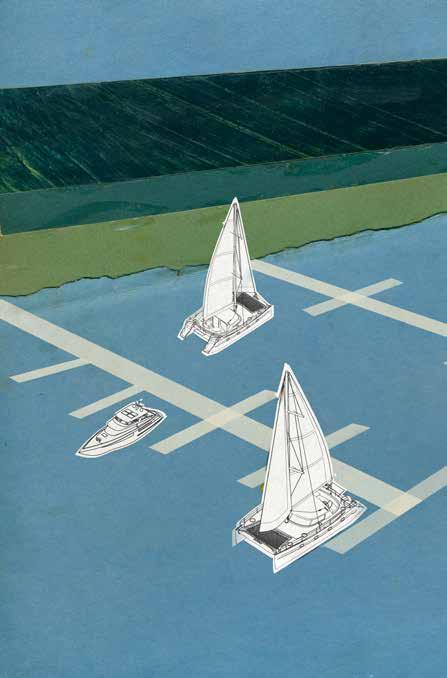
To the outside world, the level or quality of infrastructure is viewed as a measure of competitiveness and a place where foreign direct investment may find good landing spots. Foreign direct investment,
complementing local investment, is often critical to emerging economies.
It is helpful to define what indicates competitiveness to a potential investor. The Swiss non-profit foundation, the World Economic Forum, best known for its annual meeting in Davos, offers a useful definition of competitiveness. They describe it as “the attributes and qualities of an economy that allow for a more efficient use of factors of production.”. The Forum identified 12 pillars of economic competitiveness, but here we can look at the first two pillars:
1. Institutions. The WEF states that the “institutional environment” is determined by the legal and administrative framework within which individuals, firms, and governments interact to generate income and wealth in the economy. The importance of a sound and fair institutional environment has become even more apparent during the economic crisis, given the increasingly direct role played by the state in the economy of many countries.
2. Infrastructure. Extensive and efficient infrastructure is critical for ensuring the effective functioning of the economy, as it is an essential factor in determining the location of economic activity and the kinds of activities or sectors that can develop in a particular economy. Well-developed infrastructure reduces the effect of distance between regions, integrating the national market and connecting it at a low cost to markets in other countries and regions. In addition, the quality and extensiveness of infrastructure networks significantly impact economic growth and affect income inequalities and poverty in a variety of ways.
Many studies confirm that infrastructural development is viewed empirically as an indicator of the competitiveness of a country or region. Where components of infrastructure are either absent or present, only at low levels of repair or development, this will be interpreted as a measure of how uncompetitive an economy is, regarding its capacity to facilitate and sustain economic growth. This measurement is conducted both in the abstract and by comparison. We may confidently state that we have airports, seaports, roads, hospitals, transportation systems, a liberalized telecommunications environment, and most of the other essential infrastructure elements. However, when investment, particularly foreign direct investment, is looking for a home, we will be judged not only by whether we have these things, but how we compare to, say,
the United States Virgin Islands, Cayman, Bermuda, Jersey, the Isle of Man, not to mention Hong Kong and Singapore.
For several reasons, some related to setbacks caused by major hurricanes and flooding events, the BVI has not been able to build upon the base established in past decades and has not seen the level of investment in infrastructure development that has taken place regionally. Indeed, most of our competitors have invested more than we have. Our challenge will be how to narrow the gap to at least remove infrastructure as a potential negative determining factor in the competition for investment dollars.
We know that we must invest more in building or improving infrastructure to provide better services to our people and to increase competitiveness with the outside world. Also to continue to attract investment capital and the critical human capital that goes along with it. This is the “investment imperative.” When there is prolonged underinvestment in the building blocks and platforms upon which development is built, we inevitably fall behind. Yet all is not in vain as we have come to recognize this imperative. There is no serious debate about the fact that we must fully embrace the notion of upgrading infrastructure, to secure the future we seek through improving our competitiveness in an increasingly competitive and unpredictable global economic environment. We must remember that the BVI is a major player in international financial services and regional tourism. Maintaining our place against competitors will depend, at least in some measure, on our commitment to building infrastructure to meet the competitive challenge.
We will not get to where we need to be unless we work together. In a previous article in this publication, I advocated the establishment of a development consensus, based on a national vision derived from input across public and private stakeholders and political party lines. We must agree on what we want the BVI to look like and produce a plan to get there. Infrastructure is a long-term proposition that always
requires understanding future demand and trends, balanced with a realistic appraisal of available resources. We need to articulate the national vision and develop and implement an infrastructure plan to support it.
The exercise in developing such a consensus must be built on inclusiveness and participation. Critically, it must involve all sectors of business and civil society, ensuring broad consensus and buy-in to the plan. Development plans cannot be topdown, and business and civil society should not participate only in their endorsement of plans drawn up by others. Economies in free societies cannot be planned that way.
encourage investment in this area as a primary priority. Connectivity in the BVI has improved, but cost and reliability remain key concerns. The importance of connectivity was highlighted during the COVID-19 pandemic, which gave rise to the work-from-home and home-school phenomena, which has stayed with us even as the impact of the pandemic fades. The pandemic has created new workforce arrangements, for which broadband connectivity is paramount.
We also obviously need to rank and address healthcare facilities, airports, schools, roads, and other areas according to our critical needs, not what is glitzy or seems expedient.
We must obtain a commitment to have quality infrastructure across the board. This does not mean that we must be at the forefront in every area, or that all our facilities need to be “world-class.” The reality is that we cannot afford to take that approach, and, in many cases, “good enough” will suffice until we can do better. The commitment must manifest itself through prioritization of our needs through public and private sector consultation. There will be no buy-in and little chance for long-term economic success if the policy behind public investment fails to consider the needs of the private sector, the primary users of public investment.
A commitment articulated now, would come at an opportune time as planners mostly agree, that investment in infrastructure can play a vital part in the stimulus that will be required at the point in the business cycle, when the economy moves from recession to recovery. The question of where to start, will depend on a critical assessment of our needs – short-term and long-term.
Without offering a personal ranking of priorities, in the information age, where connectivity is critical and speed and bandwidth are essential, we need to
Finally, in this connection, we should resist the attraction of mega-projects which may consume financial resources at the expense of addressing a more comprehensive range of needs. We need to take a “Fix it First Approach.” We must upgrade what we have, if this is possible. Our immediate goal must be to get our infrastructure into a state of high functionality and then on par with regional Caribbean competitors before we aspire to “world-class” or “cutting edge.” We need works executed to established standards. Rather than seeking to reinvent the wheel, we should adopt the “tried and true.” For example, we could adopt the United Kingdom Design Manual for Roads and Bridges for our roads and take an approach where we set targets for road construction and reconstruction, starting with the main east-west and north-south primary roads. This would require careful planning of the carrying capacity for our road network. Roads built as secondary roads cannot be expected to carry conveyances such as concrete mixers weighing upwards of ten tons.
As much of the infrastructure serving the public is privately owned, it is crucial that the Government partner with private companies to ensure standards are put in place for placement and reinstatement
Infrastructure is a long-term proposition that always requires understanding future demand and trends, balanced with a realistic appraisal of available resources.
after construction. Much deterioration of public infrastructure, particularly roads, has been due to the unregulated excavation for underground infrastructure.
Increasing climate volatility demands that special attention needs to be attributed to resilience and sustainability. These have become buzzwords, though they have real and significant meanings. Our infrastructure must be built to the standards appropriate for the region. We live in an active hurricane, and seismic zone and our infrastructure design standards should be fit for purpose in such an environment. Regarding storms, we could adopt, codify, and modify the International Building Code with periodic updates mirroring sections of the Miami-Dade building code, which identifies that region as a High-Velocity Hurricane Zone. The same idea applies to seismic resilience, where the International Building Code could also provide construction guidelines. This move would enhance the protection of critical infrastructure – hospitals, ports, fire stations, etc.
Similarly, we must improve the resilience of our electrical grid by running main transmission lines underground, leaving only the distribution grid to homes and businesses above ground. Resilience would also be improved by building a second power station or recommissioning the retired power station. Finally, concerning power generation, the use of renewable energy needs to be incentivized through import duty waivers and assistance with gridtie for privately generated solar and wind power.
Funding major infrastructure is a complex proposition in the best of times. However, doing so in the context of large-scale recovery in the face of a looming global recession complicates matters considerably. Moreover, infrastructure funding will come at a far higher cost in 2023 when interest rates approach a ten-year high.
Currently, BVI financing options for infrastructure projects are limited, compared to the range of projects needed to address – roads, ports, schools, and more. This means that for officials and planners, the challenge will involve doing more with less—concentrating funds on essential repairs, executing projects that most affect future economic growth, and providing meaningful employment for our people.
Consideration of funding sources needs to be left to the experts, but here, it is worth recognizing that, unlike sovereign states, our ability
to raise funds in the capital markets is limited. We also have constraints on permitted debt levels. These limits make our task that much more difficult. However, we need to explore every avenue that is open to us. These may include public/ private partnerships (PPP), where the private partner is compensated by a revenue stream resulting from the use of the infrastructure. Other options may include Build Own Operate Transfer (BOOT) arrangements. We may also look at the issue of user fees more generally. For example, revenue for transportation and road works could be raised by fees on vehicles based on weight and a few cents per gallon gas tax could be dedicated to a road maintenance fund.

On the unreservedly positive side, there are areas in which the BVI has built considerable institutional capacity for delivering projects of higher quality than before. For example, establishing the Recovery Development Agency after the hurricane of 2017, provided the BVI with an agency equipped to manage complex projects from conceptualization, procurement, and final delivery. In addition, the Agency’s training and education activities, aimed at the construction and project management sector have resulted in valuable upskilling of the building trades at every level. The Safer Building Program at the H. Lavity Stoutt Community College has also done much to improve core competencies in the building trades, which will inevitably result in a higher quality product throughout the built environment and advancements in the professionalization of the construction industry in the BVI.
These initiatives, together with new rules governing the procurement of goods and services by the Government, will improve the value-for-money proposition in favor of the delivery of better projects. This bodes well for moving forward with our infrastructure improvements that are vital to supporting and spurring economic growth.
Infrastructure is critical to growth and development, but building infrastructure does not by itself signify development. Along with building infrastructure, the BVI must establish in the public consciousness the vital link between economic well-being and the enablers, of which improved infrastructure is but one. With rising standards in education and skills training to take advantage of current opportunities and facilitate the transition to new ways of working, the BVI can begin to meet the challenges of competing in a constantly changing global and regional economy. The enhanced capabilities afforded by our improved infrastructure will play an essential part. BB
Where there is no vision, the people perish” – a Proverbs bible verse, commonly recognized as the motto of the BVI’s first chief minister, the late Hamilton Lavity Stoutt. Today, some will say that the BVI’s success in international financial services was more luck than vision. The sustainability of that success, however, would prove naysayers wrong. It logically follows that in 2014, the BVI Government embarked on a collaborative exercise, facilitated by the global consulting firm McKinsey. With contributions from local and international thought leaders, on the financial services industry, “Building on a thriving and sustainable Financial Services Sector in the British Virgin Islands” was published. The McKinsey Report, as it is most often referred to, articulated the BVI’s financial services strategic vision.
The McKinsey Report segmented the vision into three fundamental areas –remain a world leader in the core business of company incorporations; expand into value-added services; and build best-in class enabling mechanisms. Firstly, despite having to cope with the myriad of global initiatives faced by the BVI financial services industry since the report’s publication, the BVI has maintained its global position as a leader of company incorporations. However, the greatest external threat to the BVI’s stature, remains publicly accessible registers of beneficial ownership (PARBOs). While the BVI Government has committed to PARBOs and recently, via amendments to the BVI Business Companies Act, 2004, introduced the legislative framework for a Register of Persons with Significant Control, further industry consultation is likely to occur in advance of the finalization of regulations required to bring these provisions into force.

Regarding the second area, the primary value-added service considered in the McKinsey Report, have not materialised to date. However, the advent of economic substance obligations and the industry’s embrace of virtual assets/FinTech related products, have created some traction in this space. Rounding out this element in the report, regardless of the limitations experienced during the pandemic, improvements relative to immigration and labour as well as infrastructure were observed.
The third theme – to build best-in class enabling mechanisms – was substantially accomplished through several means. To coordinate deliverables related to the McKinsey Report recommendations, the Delivery Unit within the BVI Government was established. This unit served its purpose as the hub for driving implementation and has since been disbanded. Additionally, the International Finance Centre was overhauled and “rebranded” BVI Finance Limited. BVI Finance, a legal entity owned by the BVI Government, with private sector members, serves as the marketing and promotion arm for the BVI financial services industry. BVI Finance remains internationally recognized for its role, having recently earned the World Commerce Review award for Best Provider International Financial Services.
Furthermore, population engagement, has been progressed through the various public campaigns to educate the BVI community at large, on the importance of financial services. Conversely, BVIslander knowledge and capabilities have expanded, due in part to the revamp of the Financial Services Institute, now the Robert Mathavious Financial Services Institute at the H. Lavity Stoutt Community College. This has been evidenced by the increase of graduates in financial services areas of study, such as law, compliance and accounting. Overall, the financial services strategic vision, developed in the McKinsey Report is being achieved, though now is the time for a comprehensive review.
It is conceivable that the cataclysmic events of Hurricanes Irma/Maria and the COVID-19 pandemic may have impacted the effectiveness of the McKinsey Report recommendations. During that time, however, the financial services sector, through the collective effect of transitioning, whether by retirement or otherwise, experienced changes in leadership in private and public sector, which also had ramifications.
Despite these challenges, financial services has demonstrated itself as the BVI’s dominant economic pillar providing the most direct (56%)1 and indirect government revenue (through 5,200 jobs direct and indirect)2 to the BVI’s economy. Further the BVI competent authorities have also adjusted; for example
1 2022 Budget Address Government of the Virgin Islands, 12 Nov 2021, https://bvi.gov.vg/media-centre/2022-budget-address.
2 Creating Value: The BVI’s Global Impact, Capital Economics, 21 Jun 2017, https://bviglobalimpact.com/economy.
the International Tax Authority has increased resources to cope with its growing responsibilities and the BVI Financial Services Commission has undergone operational restructuring to improve its regulatory oversight.
Going a step further however, the BVI Government should adapt. Substantial effort has been invested towards ensuring that the competent authorities are adequately resourced and structured. However, that same laser focus needs to be placed on the government’s internal framework to supplement and support the competent authorities. Therefore, the BVI Government should consider the following recommendations: (i) to establish a Ministry of Financial Services; and (ii) to lead the reestablishment of a small nation consortium, for the purpose of uniting to address the international initiatives affecting these jurisdictions. An Aha Moment?
Jurisdictions such as Mauritius and the Cayman Islands have established a Ministry of Financial Services, with the former expanding oversight to Good Governance and the latter including Commerce in that portfolio.
Furthermore, several thought leaders levelled observations in the McKinsey Report, that the major challenge encountered, following such exercises has historically been implementation. While the Delivery Unit served its purpose, what if a Ministry of Financial Services was also introduced to provide strategic oversight of financial services? This Ministry would be the responsible arm within the BVI Government for continuously driving the BVI’s financial services strategic vision. The Ministry would work in tandem with the BVI competent authorities, utilizing its assigned resources - human, technological and economic - to fulfil its financial services mandate.
Key benefits of a Ministry of Financial Services would be:
• To serve as the strategic focal point for financial services matters, locally and internationally, allowing the competent authorities to focus on their core objectives. For example, the Ministry would serve as the lead for any mutual evaluation exercise such, as the Caribbean Financial Action Task Force review slated for 2023. It is perceived
that too much reliance is placed on the competent authorities to lead such key initiatives, which should be vested with the Government. Potentially having a negative impact on each competent authority’s effectiveness.
• To lead timely reviews, in consultation with competent authorities and private sector, of the financial services strategic vision.
• To provide the requisite support to the competent authorities, regularly engaging with each body, together or separately on relevant financial services matters.
• The current Director of Financial Services post will serve within this Ministry as the main advisor to the Minister with staff resources allocated to support that critical role.
• To serve as the lead for informative sessions with BVI proponents in key markets, that have contributed to BVI’s position as a leading corporate domicile.
• Engagement with standard setting bodies becomes more streamlined, due to the BVI’s established philosophy/plan through a Ministry focused solely on all facets of the financial services industry.
• To enable the movement of the Registry of Companies and Non-Profit Organisations Registry to this Ministry’s oversight.
• To transition responsibility of the financial services industry from the Premier and Financial Secretary.
• To serve as the main advocate in Cabinet, the House of Assembly, and other highlevel sessions on financial services matters. Naturally, there will be concerns with this structure – whether government bureaucracy will limit the benefits to be gained, by implementing this Ministry, the ability to staff the Ministry with the “appropriate” team, whether such role will impact the apolitical nature of financial services, whether the constant shifting of international standards will impact its attractiveness and whether an appetite exists to bring such a Ministry on stream, considering governance concerns.
If correctly executed, however, the Ministry will provide necessary stability and certainty on strategic financial services affairs.
you will conquer”. When the BVI and other small international finance centres were under pressure from the Organization for Economic Cooperation and Development (OECD) harmful tax competition initiative, Dr. Robert Mathavious, OBE representing BVI along with other affected jurisdictions, joined forces to combat this initiative through the formation of the International Trade and Investment Organization (the “ITIO”). Dr. Mathavious recently, commented that “Once united, we knew it was a force to be reckoned with, (u) nfortunately, having placed the OECD on its backfoot, jurisdictions returned to their self-interests, leading to the demise of the ITIO.” It was recognized, at the time, that the ITIO’s efforts were key in pivoting the harmful tax practices initiative.
Most recently, Honourable Mia Amor Mottley, Barbados’ Prime Minister, on the issue of de-risking by US correspondent banks in the region, led the charge alongside other Caribbean nations before the US House of Representatives Committee on Financial Services. She highlighted the challenges and inconsistencies of de-risking tactics, affecting not only the jurisdiction where the correspondent banking relationship ceases, but also the resulting negative consequences for the US. Honourable Mottley proposed several solutions on the way forward. While the verdict is still out as to how this effort will impact the de-risking approach in the region, there are proven advantages to small nations uniting for a common familiar cause. An Aha Moment?
In the global financial services space, such examples are indicative of jurisdictions embracing the need to work together, to combat pressures on their economies. BVI can assume the mantle on establishing a formal organisation – whether by reinstating the ITIO, or through a new association. The key advantages to BVI towards encouraging unity with other small nations, would be that:
• Unified small countries can take advantage of economies of scale. Jurisdictions gain access to resources - human, technological, financial - where due to the complex issued involved, it would be difficult to address individually.
2. Small Nations Unite
Canada’s Acadia University’s motto declares “In pulvere vinces” – “By effort (lit. ‘in dust’),
• Strength in numbers. Small jurisdictions working together improve advocacy efforts, demonstrating consistency of thought.
• Ability to change the narrative and improve effectiveness. Small jurisdictions
working as a team stand a better chance of changing the position taken by standard setters on initiatives.
• Strengthen knowledge and expertise across jurisdictions. Eases the constraints to sharing knowledge and training opportunities for capacity building purposes.
The success of small nation collaboration, depends on managing the political will of each jurisdiction’s leadership. There must be the ability to focus on established, agreed organisational purpose, versus the differences that may exist between nations. There must be the commitment to put aside those differences to achieve shared goals, if the financial support required by each jurisdiction for such an organisation will be a priority. The barriers to develop such an organisation can be considerable, but the benefit of such collaboration among small nations
can certainly conquer what may seem insurmountable.
In these times of turbulence and uncertainty, change is inevitable. Strengthening the governance framework of financial services business within the BVI Government is necessary. Supported by new school methodologies, particularly FinTech and RegTech, the benefits of a Ministry of Finance and an “ITIO like partnership” to the BVI will be
substantial. Notwithstanding, such recommendations cannot be fulfilled in a vacuum and require other stars within our galaxy to align. Fictional character Colonel John “Hannibal” Smith from the popular eighties television series The A-Team, said it best “I love it when a plan comes together!” Just imagine, if the proverbial plan comes together, what the BVI can achieve when structure, strategy, execution, and teamwork align! That Aha Moment! BB
Our teams are client-focused, expert and responsive, working to reduce complexity in everything we do. Our clients are sophisticated, innovative and international, collaborating with us to build lasting partnerships. Our advice is targeted, pragmatic and commercial, and always delivered with absolute clarity.
To the point.
Therefore, the BVI Government should consider the following recommendations: (i) to establish a Ministry of Financial Services; and (ii) to lead the re-establishment of a small nation consortium, for the purpose of uniting to address the international initiatives affecting these jurisdictions.
 Jennifer Potter
Jennifer Potter
Ibelieve we find success at the intersection of hard work and taking chances. So in December 2021, I turned a sharp corner on my public service career of twenty years and re-entered the private sector. I hoped to find challenges, growth, and opportunities to embrace innovation and champion change.
The public sector is where I first encountered the financial services sector. It represented a pillar of the Virgin Islands’ economy. As an industry novice, there was so much to learn; nuance, jargon, jurisdictional friends and foes, and direction. The learning curve excited my need for growth, and the geopolitics was intriguing and well-- worldly, satiating my interest in international relations.
Training, exposure, and focus helped me develop a regulator’s mind over the years. Trust but verify, anticipate challenges; nothing lasts forever, and try to outthink the bad guys (and gals). Consistently mentored by public sector greats, I developed a desire to change the status quo and the landscape. My visions were to trump our competition, defy the odds of the David and Goliath-esque battles, and dispel the one-trick pony label others wanted us to carry.
An opportunity presented itself in a turn of events that was so ordinary as to be extraordinary, and I chose the challenge. Remaining with the Commission would have been safe, predictable, and familiar. But, professionally, I am an admitted neophiliac. The same type of opportunity saw me jumping onto a small transition team whose job was to establish the Commission and give it its legs. Builders build, so I have moved on, eager to innovate faster, chart new courses, and make more considerable impacts.
My current professional home is still young enough to be considered a startup. However, it is a powerhouse of talent, experience, and promise. The offer felt like the embodiment of Sheryl Sandberg’s advice that when you’re offered a ride on a rocket ship, don’t ask what seat; get on! For the five years leading up to this transition, I had voraciously expanded my professional skills. I was confident that strategic thinking, paired with an innovation mindset would take me to the projects I wanted. My career was coming full circle. My dad bought me my first computer (a Commodore 128 made by Apple) in 1986. I have spent my professional tenure making strategic connections between available technology and solving complex business challenges. Technology is my choice of genius, for bringing innovation to leadership. When I learned the term ‘design thinking,’ it seemed like the phrase I hadn’t known for the dreams I’d always had. However, I found my stride once I got comfortable with rejecting the status quo to pursue growth.
Transitions are naturally reflective, and I’ve thought about purpose and impact. Mine involves problem-solving and strategy. I see the BVI’s place in the world, and our geopolitical relationships, as being ready for a transformation. It is a value I can offer simultaneously to the industry and the Territory. The professional services industry is fascinating. It also perplexes, intrigues, and concerns many, novice and expert alike. Looking for how we can use our size as an advantage, I examine our competitors and dissect their offerings’ technical, management, and environmental components.
On a priority list, I would include a probusiness climate, modern infrastructure (physical and digital), skilled workforce, broadband penetration, sustainable development policy frameworks, and access to global markets.
uoy a r e not
, you can
e on th e s gat .e
As an international business centre, BVI financial services remains exceptionally important to the Territory’s medium-term economic performance. Our domestic focus should be on preserving and increasing the industry’s value. To do this, includes convincingly conveying why the financial services dollars matter and developing our people to take more significant roles in serving our clients. I aim to advance interdisciplinary solutions across intra and intereconomic sectors. The different sectors of our economy must perform in synergy for our total benefit. Re-entering the private sector affords me the latitude to apply my expertise to design solutions that expand the business model and reach the resultant opportunities. It also broadens my ability to engage regionally and internationally, sharing and searching for favorable circumstances to expand our domain. Blessing or curse, we already live in interesting times. It is a transformative time for global trade and commerce. Still, BVI can only revel in the transition if we are committed to embracing change. Not superfluous change, but transformative change that includes the business models and re-engineered value propositions. Transformation can be messy; there’s no avoiding that. The alternative is to remain as we are, while the foundations of work, business, and life change rapidly around us. That, I would argue, is far riskier for our future. We learn every day of underestimated companies and markets disrupting established players. And we have watched as new sectors emerged from idea to implementation. Quite simply, it is time. There’s no time like the present to work on broadening our appeal, exploring additional markets and sectors, and finding different ways to leverage our expertise.
I choose to pursue growth, because growth fuels sustainability. It is time for our timidity as a Territory to fall away. A quest to generate expanded value should start at the beginning. It calls for discovery, and questioning is my preferred approach. Unfortunately, we are prone to solve the wrong problem, when we don’t begin with the right questions. A colleague recently complimented my ability to ask good questions, and I agree that posing good questions and observing serve me well. A tremendous amount of learning happens when you observe longer than you speak. Questions help me explore what could be, without being constrained by what is. I’ve learned that focusing on constraints can
dull a growth mindset and, eventually, the imagination. It is time we moved away from the fixed perspective. We can view uncertainty as a challenge, or we can view it as an opportunity to prepare for a new adventure. I understand some fear of the unknown, but I have a more challenging time accepting paralysis and inaction to avoid discomfort. Of course, we are capable of creating new value. We must encourage new thinking and ways. Like plants, mature sectors require different attention than growing ones.
BVI must pay keen attention to the factors of transformation and modern production, which are shaping our future: the rate of technology adoption, the agility to pivot our focus, policies and legislation, the shrinking of geographic distance through remote work and learning, simpler access to global markets and the ability to upskill the workforce rapidly and to acquire modern infrastructure. These are the factors that will boost competitiveness.
Are we courageous enough to venture out to sea again, or are we content to sit near the shore? BVI cannot ignore the prevalence of innovation in business and the dominance of technology in enabling superior business performance. It has necessitated a shift in focus and required skill sets for leaders. As the fourth industrial revolution continues, chief executives, boards of directors, and legislators have to upgrade. We must appreciate and understand the new signals of success: digital transformation, innovation, and rapid disruption. The skills required for leadership success have undeniably moved beyond finance, economics, and general management. And so it reasons even keeping pace in financial services requires prioritizing agility and rejecting indecision and complacency.
Whether the subject of growth is a business sector or the Territory’s economy if everyone is focused on the threats, who explores the opportunities? There’s a reason that the popular SWOT business strategy model has four quadrants (strengths, weaknesses, opportunities, and threats)-examining each is critical to orchestrating success.
Nearly twenty years ago, my first of four
visits to Singapore started a love affair with that country’s commitment to efficiency, accountability, and standards. Efficiency was visible everywhere: entry to the country, delivery of government services to the public, and communications. Several literary works recount Singapore’s Lee Kuan Yew’s leadership and intentionality in developing the island nation. He strategically engineered its rise amid challenges similar to the ones faced by BVI. If we have a fighting chance, let’s reduce the time and value we squander on indecision (and inefficient decisions) and be intentional about standards and sustainable development. Success will require pragmatic leadership that can reject conventional wisdom when it doesn’t align with our goals. We must champion and support sensible economic policies and not dogmatic speeches. We must know the results we desire to evaluate any offer that promises to get us there. Global inspiration aside, this doesn’t have to be a solo trek. As successful as Singapore is, it has partnered in recent years with leaders in academia (from outside Singapore) to develop its thriving FinTech landscape successfully. We shouldn’t shy away from assessing suitable partners.
I admit to having a crush on Singapore (and Estonia) and what I call its superpowers: education and economy. Entwined as they are, education and economy are twin towers. To conquer these towers, we must embrace an attitude of capability and focus on accountability, beginning with education. The BVI population must insist that education receives the enthusiasm and national attention routinely allocated to physical capital projects. We must treat the advancement of Virgin Islanders as a priority. We will prepare ourselves in exposure, experience, attitude, and intellect. To do this, public policy has to promote and incentivize lifelong learning aggressively. Education (not to be confused with schooling) can’t be over at the secondary level or limited to traditional academics. Success on the world stage will not benefit us if topics like civics and the responsibilities of global citizenship are absent. In today’s environment, effective education must include understanding regional and world economies, geopolitics, the effects of globalization, diversity, equality, and inclusion, and environmental,

social, and governance obligations. The world is our marketplace, and we must dispel any attitude that the world is this set of islands and cays. Exports are no longer limited to physical products; geography and transportation do not define markets. Exports and transportation, like almost everything else, can be digital.
Unfortunately, we are playing catchup. Because we have spent too much time as consumers rather than on our potential as producers. It is time that our education pursuits match our aims, and we need bigger dreams. We must be comfortable thinking far beyond last year’s achievements.
Whose focus is innovation? Whose mandate is the re-skilling of the workforce? To quote Drucker, “you can’t manage what you don’t measure” (or assign). Suppose we desire for our children and us to reside here peacefully, be satisfied with our contributions, and earn a living where we feel successful. In that case, we must facilitate the actions likely to deliver the best in leadership, decision-making, and planning. Suppose we encourage our citizens to take an interest in economic indicators. Each resident understands and knows GDP and year-on-year government spending on education. In that case, they will cheer and support sensible leadership decisions. If we lead well, our people will be with us.
Every economic sector is measured to assess performance. Experts can describe these measures as lagging or leading, and the mix is essential. Lagging indicators look behind and therefore have limited future value. Leading indicators help us understand how to predict future success and are assets for leading change. Giving unbalanced attention to lagging indicators is like a dog chasing its tail- using lots of energy with little satisfaction.
Leading indicators take more time to identify and develop, but they deliver excellent comparative value about where we are headed. Unfortunately, we’ve historically given lagging indicators much of our attention. To enable our economic pillars to continue to sustain livelihoods, we should include studying predictive measures. Careful not to restrict ourselves to the traditional reports on revenue and volume. Leading indicators, simple ones like GDP, targeted growth, and
underemployment, would help us chart a course and navigate. Then, we would be able to evaluate initiatives, outreach, and efforts towards measurable targets. And a step closer to efficient utilization of valuable resources.
Resilience in business and economies attracts a lot of attention. Resilience is not only the ability to respond to threats; it is also the ability to thrive in new circumstances. At the risk of oversimplification, the entire world is a new circumstance. We should be careful not to be lulled back into complacency when results (those lagging indicators) appear to improve. If history teaches us anything, the next test is just around the corner. What if we are granted our current wishes and geopolitical threats fall away? Do we then turn our attention to opportunities? Getting that cold engine started would be a new threat.
BVI should employ global standards to assess its development, as part of our quest to improve economic performance. Take the World Bank’s Ease of Doing Business survey as an easy example, (ignoring for a minute its recent ethics challenges). While BVI is not ranked, the criteria allow us to self-evaluate and compare against clients’ and potential investors’ options. Our policy developers and administrators should routinely use measures like this to reduce reliance on decision-making that is not data-informed. In addition, it would help reassure citizens and convey the value of the paths we are expected to support. Similarly, there is an accepted measure for the indicator of government effectiveness, another parameter managed by the World Bank; there are other examples. While we haven’t traditionally used these measures, if we want to remain on the world stage, we should be able to assert our suitability to be included.
Benchmarking requires suitable measures, jurisdictions for comparison, and generating the data to complete the exercises. It is also following through promptly for the activity to be helpful. Effective teams remain essential because shared value and effort deliver better outcomes. However, encouraging a team approach, leaders must be cautious not to focus on what was traditionally important, versus what may be systemically important moving ahead. Embracing individuality
in thought and the ability to express and pursue different ideas will help us to land innovative wins.
When we examine the intentionality of consistently successful brands, leaders, and countries, a common thread is a clear intention for what they are pursuing. There’s little challenge in generic statements of wanting to be the best. Enviable success requires being intentional and focused.
We accept that over the last decade, the world’s economies have undergone significant change and evolution. In financial services, the degree and speed of change have been astronomical: The global financial crisis, the torrential increase in regulatory rules and obligations, the emergence of expanding standards related to anti-money laundering, the advent of financial technology and disruptors, the global health pandemic and changing attitudes to work and work environments. It would be short-sighted to drag our feet on the effect these changes bring to businesses.
A fragmented approach to development will do the Territory more harm than good. Harmony to afford our citizens their desired quality of life is not impossible or impractical. Whatever avenues we pursue must prioritize many’s needs over a few’s desires. We must commit to action on information and communications technology (ICT) development for the majority’s benefit. ICT is a cornerstone of every currently expanding economy. Lagging in this area continues to impact our development potential negatively. It reduces our access to markets, prolongs our students’ ability to excel, denies our ability to rapidly re-skill our workforce, and renders our products and services less competitive.
Realizing effective ICT is a national emergency, because it is the backbone of serving international markets and the conduit by which we will develop our people’s talents. This requires policies, programs, and incentives to build competencies and capacity in ICT fields. My favorite takeaway from the book “The Richest Man in Babylon” is: to go to people who are experts in a subject if you need expert advice. True leapfrogging in ICT would afford us the potential to lead, drawing on our relationships and
experience in international communities. But timidity won’t serve us; our advantages won’t come via partners that are a step or two ahead of us on the journey. We must continue to be bold in our quest for excellence. We must not limit our Territory’s potential by thinking small. So when we look for leadership in education, ICT, energy, and transformation, it ought to be to those well ahead of us with relatable environments and demonstrated results.
Under-developed ICT significantly detracts from our ability to pursue opportunities in the digital, data, and knowledge economies. For these ventures, the labor market and economic changes need to be managed to reduce displacement and loss of employment. Workforce development is critical to any gains we attempt in financial services (or any other sector). However, the commitment to prioritize digital skills development in educational institutions and workforce development units is lagging. Our citizens must see participation in the global knowledge and data economies as possible and are likely to have an incentive to acquire the skills that will result in satisfying work.
In addition to skills acquisition, we need access to data. We need timely data in practical decision-making formats to aid policy development, rate economic progress, and assess investment opportunities. Reliable data will improve our internal governance and ability to be regionally and internationally competitive. Data is necessary for transporting the goals and ideas that we have around attracting investors and the development of trade initiatives. Finally, we must be able to answer questions about our current status and development potential. For example, where is BVI in the digital divide? We wax poetic on national development topics; however, quantitative and qualitative data are necessary for productive conversations.
Digitalization in the public sector, including regulatory environments, is required to encourage and support broader digital innovation. Faster access to e-government solutions would assist the private sector with adoption and realizing greater returns on its investments in digital transformation. Moreover, traction by the public sector will stimulate further private sector investment. It’s a shift we should have already made, but that aside we need to move now. The transformation also requires supporting policies and an entrepreneur-friendly approach to business.
The advent of pairing every economic sector with the word technology is elementary evidence that this phase of industrialization is about more than information technology or computers. PropertyTech, InsurTech, LegalTech, EduTech, FinTech, MedTech, FemTech. These terms tell the story of the importance and rate of technology disruption and adoption. That we don’t have examples deployed in this economy is a travesty.
We are a comparatively small market with a high volume of global visitors, using tourism and financial services products. Being innovation-led means thinking about how we could facilitate
sector is that there isn’t enough focus on growth. Innovation and sustainability require consistent, focused approaches, resources, and commitment. Strategic direction must be a year-round priority.
In the public sector, tenure is routinely seen as a predictive measure of success. It is time to refresh that approach and put together teams willing to challenge old assumptions, to lead us to new results and efficiencies. Strengthening predictable, consistently applied systems are what makes for good business.
market research, go-to-market strategies, and other avenues for market participation. It’s not a secret that digital transformation changes job availability, typically phasing out unskilled labor for mid-skilled. Since it is no longer a surprise and can not be slowed or stopped, what trajectory will we take? Preparing the workforce is not optional. It is do-or-die for the public and private sectors.
Building more robust digital capability would support expanded service offerings and allow us to use our human resources to serve parallel product markets. At the moment, there isn’t a regional leader. So why aren’t we prepared to fill the gaps? I would love it if we could secure a trade partner who agrees to honor our expertise in international business as leverage to make itself more competitive. Maybe it is wishful thinking, but we should seek out other external relationships, based on symbiotic benefits rather than get pummeled by pure competition.
The challenge is not to let the unfamiliar become the rejected. My experience in the public
My competencies include problemsolving and creative alignment. They involve how to approach problems and identify and develop solutions optimized across stakeholder groups. Connecting to different areas of the business and seeing beyond the current environment is most potent in leading change. I lead by thinking, questioning, designing, and doing. It’s my continued approach in the private sector. I am enthusiastic about solving challenges so that opportunities don’t elude us.
The development of financial services and the BVI’s importance in the international business sector begs for acknowledgment of the rising knowledge economy. We have access to the factors necessary for success. Our next move could be a hit if we are aggressive, committed, and focused.
I like this definition of intelligence: ‘the ability to challenge everything you know.’To change and grow is our challenge, and there is no time for small dreams. But, if we want to remain global players, we must demonstrate agility. There are several ways to do that: assembling more efficient public services, making meaningful investments in education (not just schooling), developing sound policies, choosing partners carefully, prioritizing the needs of the majority over the few, modernizing the infrastructure, embracing innovation and believing that we are capable of what we desire for this Territory. BB
Intelligence is the ability to challenge everything you know.
Aquestion sadly, often asked in some form in these Virgin Islands is: “What happened to the billions of dollars that have passed through Government coffers over the last thirty-five years?”
Of course, part of the answer is obvious: Over the last thirty-five years, airports, seaports, bridges and administrative buildings have been built; schools and hospitals have been constructed and reconstructed; education, health, security and other regulatory services have been delivered; civil servants have been paid; and students have received scholarships to study abroad, successfully furthering their education. These, among a myriad of other goods and services Government provides in this economy, within the context of economic downturns, catastrophic storms, and a global pandemic. Still, that answer is not satisfying enough. We all know that we should have much more to show.
Alongside the very obvious physical infrastructural deficits of our Territory, there is another looming deficit present in these Virgin Islands that should not go unattended: the Virgin Islands is not secure enough. A Sovereign Wealth Fund (SWF), which by definition is a Government-owned investment fund comprised of money generated by the Government, often derived from a country’s surplus reserves (Investopedia, 2022), can boost our security in this increasingly uncertain global climate.
Let us travel back in time to 1988. This year marks a decade since the Virgin Islands is no longer reliant on grant-in-aid from the United Kingdom. We are financially self-sufficient and have been so for ten years. The Virgin Islands is beginning to see bountiful fruits in the form of increased revenue from passage of the International Business Companies Act in 1984. From 1984 to 1989, Government revenue has more than doubled, increasing from $19 million in 1984 to almost $42 million in 1989. In this time of plenty, let us make a decision now for our future. Let’s say from 1988, we invest an average of $5 million annually to an SWF. Thirty-five years later, in 2023, at a moderate average annual rate of return of 4.5%, the value of our SWF has increased to almost $400 million or over $10,000 per person. This is $400 million worth of added security for the Government, and by extension, security for the people of the Virgin Islands.
In our historical revision, investing in a Sovereign Wealth Fund has advanced our Government’s overall risk management by providing:
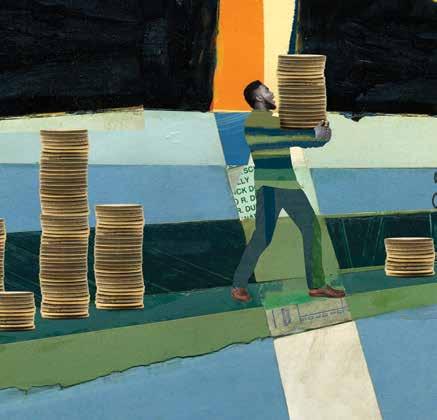
1. Funding for much needed investment in infrastructure and other requirements;
2. Leverage creating a stronger negotiating position, including for borrowing; and
3. Increased certainty assisting us to exercise a higher level of autonomy over our affairs.
Back to our reality in present day 2023, the largest SWF in the world belongs to Norway, through its Government Pension Fund Global, which has an estimated total value of $1.1 trillion, translating to approximately $205,000 per person given that Norway has a population of 5.4 million persons. In the context of the Virgin Islands, this would translate to an SWF of $7.2 billion.
The China Investment Corporation, the second largest SWF, has a value of approximately $940 billion for China’s massive population of 1.4 billion persons, translating to $671 per person. In VI terms, that would mean an SWF value of $23.5 million.
Closer to home within the Caribbean region, Guyana’s recently established SWF, the Natural Resource Fund, built from oil revenues, is currently valued at approximately $753 million for Guyana’s 787,000 population. This translates to $957 per person which in the context of the VI would mean an SWF value of $28.7 million.
While the per capita value, structure, uses, risk tolerances and liquidity concerns of SWFs vary greatly around the world, and run a wide gamut, they all have one thing in common: they represent a
recognition by country Governments of the importance of saving and investment for the future benefit of their people.
One laudable area in which our Government has been forward-thinking is in the formation of the Social Security Board (SSB) Fund in 1980. The SSB provides coverage for eligible contributors in case of sickness, pregnancy, employment injury, permanent disability, old age, funeral, and survivorship. The SSB Fund regularly undergoes actuarial analyses to determine its sustainability, and these analyses may also suggest policy changes to ensure the Fund’s successful continuity. While the Fund has faced challenges, including economic downturns (such as significant ones with the global economic crisis in 2007/8 and impacts of COVID-19 in 2020/21), and locally, the failure of employers to be compliant in their contributions, the SSB Fund continues to be an important bulwark of security and protection for the people of the Territory. We must ensure that we jealously guard this Fund going forward, such that it continues to be able to provide for us at particularly vulnerable periods in our lives.
Following the onset of COVID-19, the then Government Administration used $40 million of funds from the Social Security Board Fund for several initiatives. Many of these are now subject to audit and investigations on misuse, following the Commission of Inquiry. This underlines the importance of providing adequate safeguards and protections to guard use of public investment funds, to ensure that these are not abused and are only strictly used in accordance with these safeguards. While investment rules for the Fund should allow for some flexibility such that returns can be maximised, within the context of its risk appetite, disbursement rules must be robust enough to ensure adequate protections.
The Protocols for Effective Financial Management, signed with the UK Government in April 2012, as well as the Borrowing Guidelines which preceded them, require the Government of the Virgin Islands to maintain unencumbered liquidity in the amount of at least 25% of annual recurrent expenditure. In 2022, this amounted to approximately $85 million. The Reserve Fund provides Government with a ready source of funding in case of emergencies and provides greater certainty that GoVI will be able to meet its obligations, regardless of crystallisation of external risks. Indeed, the Government’s Reserve Fund has come in handy in the wake of both Hurricanes Irma and Maria, and the COVID-19 pandemic, as a source of funds for the Government’s response to these events.
Similarly, as with the SSB Fund, adequate protections of our Reserve Fund should prohibit its frivolous use, given its importance as a bulwark against fiscal and economic risks. Following intense efforts to grow the Reserve Fund to a height of over $100 million, by the end of 2022, the Reserve Fund is likely to have decreased to around $85 million on its downward trajectory since 2020, as Government Administrations use the Fund to meet a myriad of funding demands, absent securing additional development loans or other sources of funding. Depleting the Reserve Fund means depleting our protection and preparation to face challenges.
China uses its SWF to invest in capital projects across the globe, advancing its international political interests through funding. For the Virgin Islands, our SWF, once established and grown, can be used to invest in projects within the Territory. A precedent for this has been set by the limited use of the Social Security Board Fund, which has loaned money to Central Government for instance, for building the hospital and roads over the years. An SWF in the Territory would likely be able to maintain a slightly higher risk profile, allowing for greater levels of investment in the Territory’s infrastructure.
Norway has used its SWF to help fund its national budget annually. Its structure dictates that up to 4% of the SWF can be used to fund the Government’s annual budget. The underlying logic is that where the Fund is able to gain an annual return of more than 4%, any 4% deduction to fund the annual budget would be more than compensated for by the amount gained in the Fund’s annual return, ensuring continued growth of the Fund, whether or not the Government is able to otherwise contribute.
For the Virgin Islands, our Social Security Board Fund targets an average annual return of 6% over its lifetime. The SSB Fund rightly takes a generally conservative investment approach and must ensure that it maintains sufficient liquidity to pay out required benefits to beneficiaries as these come due. Where an established SWF for the VI aims to achieve an annual return of at least 4.5%, we could, as Norway does, similarly dictate for instance, that the Fund can be used to fund Government’s budget up to a lower amount, for example setting this cap at 3%, thereby guaranteeing the Fund’s future growth.
Too often, the Government of the Virgin Islands seems to have a weak hand in negotiations. Whether it be dialogue with our “modern partner” United Kingdom representatives, local and international lending institutions, or potential investors, we need to strengthen our hand. Ask any seasoned negotiator and they will tell you one of the keys to obtaining a successful outcome from a negotiation is your starting position: what leverage do you hold in comparison to the other party or parties? An SWF would strengthen the Virgin Islands’ hand by ensuring that we have more options, and that crucially, our opposite parties are aware.
An SWF can be another tool in our arsenal as a Territory to protect us from the uncertainties and risks inherent in having a small, open island economy. An SWF can offer the Virgin Islands protection from devastating effects of natural disasters and pandemics, from global economic fluctuations, and from challenges related to an ageing population.
Natural disasters. The passage of hurricanes Irma and Maria in 2017 dealt a painful blow to the Virgin Islands, damaging or destroying some 80% of buildings across the Territory, and devastating public and private infrastructure alike. The level of public investment that has been necessary to recover our infrastructure has been significant. And it is clear to see, that while already close to $100 million has been expended, there is still a whole lot more to be done.
It is imperative that the right balance is found between meeting today’s needs and planning for tomorrow’s future challenges.
The demand for such a high level of capital investment in a relatively short period of time has placed a fiscal burden on the Territory. To help manage this burden, we have turned to the Caribbean Development Bank in particular, from which we have taken two significant loans, namely the $65.29 million Rehabilitation and Reconstruction Loan (signed in late 2017), and the $50 million Policy-Based Loan (signed in 2018). With a long and still growing todo-list ahead of us, it is clear that we will need to borrow more in the short-term to fund existing and emerging demands. Interest rates are on the rise, and risks of stronger storms loom. It sure would be nice to have another source to finance our development and help us to adapt to climate change. If we start to contribute now, though belatedly, our own Sovereign Wealth Fund can help us to finance future projects and provide a finance buffer for natural disasters almost certain to visit our shores in the future.
Economic fluctuations. And then there is the volatile global economy. The world has seemingly hurtled from crisis to crisis over the last few decades, with crises indeed seeming to have become a new normal. This, coupled with the increasingly interconnected nature of our economies and societies, has meant increased instability. An SWF can provide more stability by offering a source of funding to meet crisis demands, reassuring creditors and investors of our ability to meet obligations.
Ageing population and Intergenerational equity. The Virgin Islands, like other places in the world, has an ageing population. As medical technology has advanced, people are generally living longer. And the longer people live, the more resources are required to ensure their standard of living throughout life. For this reason, pension funds face pressures, as growing older populations may not be adequately provided for by a shrinking younger group of contributors. An SWF can help to promote intergenerational equity by ensuring that current gains are shared across generations. Subsequent generations should be able to benefit from past and present gains, even where there are economic challenges on the horizon and downturns eventuate. A well-structured SWF helps to guarantee this.
Prudent regulation of our proposed SWF, will be required to cover: the value of minimum contributions to the SWF, how money from the SWF should be administered and invested, and for what any distributions or grants from the SWF can be used. As with the SSB and Reserve Funds, our SWF must be protected, given its importance as a stability and protective mechanism.
Minimum contributions Given the current economic situation in our Territory and the development deficits glaringly visible in our infrastructure and systems, the Virgin Islands is not currently in as comfortable a position as we have been in the past, in terms of having excess funds for investment. That said, setting a minimum annual contribution to an SWF recognises that regardless of our position in the economic cycle, a level of priority is placed on putting some portion of earned revenues aside. This portion may be in absolute value or percentage terms. An annual contribution of five million ($5,000,000) was used in our example above and may be a good starting point right now. Interest earned from investments, combined with annual minimum contributions will see our SWF accrue over time. Where there are windfall inflows, Government Administrations will be able to allocate a larger sum to the SWF, and the set minimum amount will ensure that some amount is earmarked for contribution each year.
Administering and Investing the SWF. In terms of administration, it would be prudent to keep annual administrative costs under 1% of the
value of the Fund, targeting around 85 basis points, noting that more money paid out for administration expenses equates to less money available to build the Fund, and to use for required distributions. The investment strategy for the SWF should direct a balanced portfolio, designed to provide growth as well as a modest level of current income. This investment strategy would be moderately conservative, given the purpose of the Fund. The Fund must also maintain a level of liquidity in case of sudden demands to draw down, for instance in the case of serious natural disaster impacts. That said, the investment strategy may be able to stand higher risk than our current SSB fund is. An appropriate level of return to target for the fund is 4.5% annually, noting that the actual return may be higher or lower than this on an annual basis, depending on prevailing market conditions.
The SWF can invest in public infrastructure projects in the Territory, providing financing for example for roads, water and sewerage, schools and other needs. These investments will necessarily be through loans to the Government, but may be able to be offered at rates lower than offered by commercial lenders. Distributions and Grants from the SWF. Like the SSB Fund, the SWF should be able to give grants towards the socioeconomic development of the Territory. Distributions from the SWF must consider the level of income the Fund will be able to generate on an annual basis, and be considerably lower than this in order to guarantee growth of the Fund. One proposal is to have distributions from the Fund capped at a percentage of the Fund’s income, perhaps at around 80%. Additionally, the value and purpose of distributions and grants must be closely regulated to prevent misuse and undue depletion of the Fund. One proposal is to ensure that the value of grants that can be issued from the Fund annually be below the targeted rate of return (4.5%), capped for instance at 3%, thereby ensuring the continual growth of the Fund into the future. This figure should also consider the requirement for there to be a provision for administrative costs for the Fund, targeted to be at or below 0.85% annually.
A question may be posed about the timing of this proposal. With all the challenges in front of our Government, including looming proposed suspension of our Constitution, elections on the horizon, crumbling infrastructure, and a cost-of-living crisis, how can saving money at a time like this possibly be on the agenda? The answer is that having an eye on our future must always be on our agenda. The Vigilate on our flag reminds us: We must find the right balance between addressing today’s needs and preparing for tomorrow’s. Modest annual contributions to an established SWF is an important first step. There are certainly other steps that must be part of us strengthening stability, including implementing deposit insurance and considering unemployment insurance. Regarding stabilising our way forward, I for one do not want to be right here, thirty-five years from now, asking the same question. Establishing an SWF now will help to better answer then: “What happened to the billions of dollars…” BB
An SWF can offer the Virgin Islands protection from devastating effects of natural disasters and pandemics, from global economic fluctuations, and from challenges related to an ageing population.

company’s effective tax rate, company registrations in various countries outside their own are also widely accepted as vehicles for ensuring a globally efficient tax rate.
This is profitable, by making use of the tax arbitrage provisions when comparing the tax rule that exists from one jurisdiction to another. This approach to the management of taxes, is generally accepted as both legal and moral in most free societies. The effect of lower corporate taxes, especially in western societies, is that the cost of many products and services can be reduced. It is this greater affordability of products and services, that the BVI and other jurisdictions like it have contributed to the world.
Undeniably, being a jurisdiction that offers companies a lower tax rate is a good thing for the local economy. Beyond the pilferage that will undeniably occur at an individual, corporate, and even the government level, the BVI has contributed to the well-being and higher standard of living of millions of people around the world. Unfortunately, this service has been marred by the unscrupulous actions of many. The mechanisms available to wellmeaning companies have been used by some to do less than honourable things, and in the process, the reputations of the BVI and many of its counterparts have suffered gravely. These jurisdictions have often been branded as primary facilitators of financial crime and even as a jurisdiction that facilitates the financing of terrorism; an unfair association, considering the role that the major financial centres of the world have played in these activities over the years. Furthermore, and perhaps not unreasonably so, the BVI and like jurisdictions have been accused of undermining the tax revenues that would otherwise be available to some high tax jurisdictions. Also, as facilitating vehicles that allow the citizens of other countries to reduce their contributions to the necessary public services that must nonetheless be carried by their respective governments.
In no other facet of BVI society is this such a potent truism - than in the financial services and tourism sectors. They are sectors that have built on and further expanded the efforts of only a few pioneers. The standard of living for many people, both within and outside the boundaries of the BVI, have been enhanced by the decisions and efforts that were made several decades ago. Today, we are challenged to further define and clarify the role that our beloved BVI should play in the global landscape. To do so, however, it is important that we first understand the role that it currently plays in this larger environment.
Simply put, and as it pertains to the financial services sector, the affordability of products and services is what the BVI and other like jurisdictions have made possible throughout much of the world. This is because, such jurisdictions enable companies to legitimately reduce the tax burdens that would otherwise be required of them by their home countries. Beyond the creative reporting practices that might reduce a
In response to many of these criticisms, the BVI has always shown empathy towards many of these claims. It has also consistently indicated that the affected countries would do well to modify their own tax laws, and to practice more stringent means for supervising their implementation. This stance on the part of the BVI has allowed it to willingly participate in all the global initiatives that have placed the same obligations on all countries. It has also participated, consistently, in global cooperative efforts to share tax information. What the BVI has refused to do, however, is to accept any obligation that the supervision of another country’s tax system rests with the BVI. It has maintained its position, that obligations placed on it to be cooperative in combatting financial crime, must be the responsibility of all other countries as well – by applying the ethos of a level playing field. In this spirit of acceptance as a citizen of
Neil Smith
“Our progress did not come without effort, nor did it come by chance. We earned it. We had to overcome innumerable challenges and obstacles along the way.”
— Dr. Robert Mathavious
the global metropolis, and in its good faith effort to cooperate in addressing such challenges, the BVI has always responded to the chinks in its own financial services armour, whether these are identified by global standard setters or when they are identified internally. The BVI has continued to do so by developing and implementing increasingly more stringent regulations on itself and its customers. This is done both to maintain its relevance to the global financial services sector, as well as to continue to be a jurisdiction where companies would want to be registered for their legitimate business purposes. It should be expected that the BVI will continue to evolve in a manner that allows it to continue to be player, but clearly it will require wisdom to manoeuvre the environment in the present, while still being very clear on what will be required to serve the best interest of the BVI over the long term.
The other important sector for which the BVI is known worldwide is that of its position as a yachting mecca, a diving paradise, and a safe and stable environment for visitors. The combination of its natural endowment of protected and pristine waters, as well as its fair trade-winds and attractive government policies related to the maritime industry, has allowed its tourism sector to flourish. For the most part, the BVI has been able to sit passively and welcome visitors. In addition, the BVI Tourist Board has done well in keeping the BVI tourism product as a viable choice in the international marketplace. The potential for high value tourism in the BVI continues to be in the concept of adding value to the existing endowments of the territory, especially that of its environment, unique culture, and climate. This means, that contrary to any perception that may exist, that the environment must be harmed in the process of tourism development, the author is of the strong view that the environment should be protected and utilized in its natural state to catapult the tourism product to levels that are high yield, provide more opportunities for employment and local investment and protects the natural environment of the BVI for future generations.
Both sectors – financial services and tourism - have been crucial in shaping the BVI as a society; and in accomplishing the standard of living that its people now enjoy. To remain successful in both these and other business sectors in which it wishes to participate, the country cannot allow itself to become fossilised -- whether in
its practices or in its analysis of the world around it. Instead, it must be quick to adapt, while ensuring that it protects its own interests. In recent times, this requirement to be adaptable and nimble, while doing what is in the best interests of the BVI, has appeared to be more difficult than in the past decade. There can be several reasons for this. Perhaps the three most significant of these is that the country now exists in a more complex environment, that more persons are involved in the relevant decision-making processes; and that there is a lack of consensus concerning clear goals for development of the BVI – in particular, what should be treated as the short-, medium- and long-term goals of the country. The first of these challenges – that the country exists in a more complex environment - has at its core that the BVI people now recognise that their homeland is not simply a group of isolated islands. Rather, the islands that comprise it exist as part of a global landscape. Furthermore, they recognise that the country has an influence on, and is very much influenced by the ebbs and flows of international business trends. The extent to which participation in the global village stands to be of benefit to the country, is its own responsibility and is determined by its own actions to accomplish the same. As it now stands, only a select few and privileged individuals participate meaningfully in the high-profile sector of financial services. While the sector provides a robust stream of revenues to the central government, the economic benefits to a wider cross section of the population primarily comes not from this source, but from the tourism sector. It is also important to recognise that it will be difficult for the BVI to participate effectively in any global arena in which it is confrontational in its attempt to modify the status quo, or to resist a status quo that is developing in that broader arena. It is more likely the case that it will be dragged along with the tide, if it chooses to be confrontational in its approach. While it is certainly right to search for opportunities where the country might be able to change a developing global business trend, it is more likely to be able to do so only when economically powerful influencers share its position on a subject. In the meantime, it becomes necessary to figure out just how the BVI will thrive in that emerging environment. This carries us to the next point – that of the decisionmaking processes that are relevant to our future.
The BVI policy-making environment is
staffed by a multitude of disciples and influencers. They come with varying skills, capacities and even the level of their influence. The elected leadership responsible for decisions concerning policy, are often faced with divergent views that make it very difficult for them to make definitive decisions in an expeditious manner. Some of their advisors are seeking, for various reasons, to influence them to maintain the status quo. The most common reason for this is because they have no desire to adapt to changes, or because it is felt that little BVI can prevent developing global trends and standards from occurring. On the other hand, decision-makers are also being advised to adapt to changes that are taking place globally, as a means by which to maintain the success of the BVI. Unlike before when advisors to the Government appeared to have held more homogeneous views on how best to respond to threats from outside our shores, today influencers on BVI directions and development come from all corners of the globe. As such, they are vastly different priorities in mind and a multitude of opinions for our decisionmakers to consider.
Finally, there is the absence of consensus concerning what the future of the BVI should look like, or who should weigh in to determine that future. The view of the author is that those who should be inheriting the BVI, should be the ones that should determine its future. It is also the opinion of those who will inherit the country, that they should be given the highest priority in determining its future. Though it may be generally accepted that minds not yet sufficiently matured or sensitized to the realities of what is required in the exigencies of life can only offer limited input, one should nonetheless accept that the coming generation to whom the country will shortly belong do possess views. They may also see possibilities that may be less evident to the current generation. This consideration identifies the benefits, if not the requirement of close collaboration between various generations of BVIslanders when it comes to developing a road map for the future of the country.
As this discussion continues, we may also wish to examine the often-held notion that, as a part of the global community, the BVI is often described as wealthy. The Miriam-Webster dictionary defines wealth as “abundant supply.” For the purposes of this discussion, it is worthwhile to note that the wealth to which we will be referring is monetary wealth. The BVI has a relatively
high gross per capita development product (GDP), but it is notable that the cost of living is not low in the BVI, so in real terms that notion that BVI is wealthy may be less than what the GDP per capita proposes. This measure has been used by multinationals the world over to determine the prosperity of the BVI. However, we also recognize that being wealthy is closely related to one’s perspective or mindset. In this instance, that mindset can be multigenerational. It can either set a group on a path of perpetual poverty or on a path to continual success. Do the people of the BVI possess a mindset of wealth, or one of poverty (listenmoneymatters.com)? A wealth mindset requires resourcefulness and the active development of surpluses to create momentum to make investments. A wealth mindset makes investments that do not immediately pay off, but that promises huge gains in the future. A wealth mind set also nurtures meaningful relationships that are grounded in shared values, mutual respect, and trust. These relationships understand and value the reputation of the participants, understands that the world owes one nothing, and that the default position of doing nothing precludes failure. A wealth mindset celebrates others, easily absorbs knowledge, and mentors others. It understands and appreciates the need for collaboration, understands the tremendous value of competition, knows how to fight for the long game, knows that there is always room for improvement and knows when to quit. It is safe to say that the wealth mindset was, most likely, a major factor in achieving the success of the BVI in the past. During such time and at the risk of romanticizing the past, boundaries, and limitations to arguments between parties were clearly understood and accepted for example. It was far more important that the argument resulted in the best results than who won the argument. Does the BVI currently possess a mindset that nurtures the likelihood of its continuing wealth?
The poverty mindset (listenmoneymatters. com) on the other hand, is at the opposite end of that of wealth. It is dominated by dependency; by thinking only about the here and now; and by not developing meaningful and trust-based relationships. The poverty mindset makes use of intimidation, reciprocity, and dependency as the basis for relationships. It compromises reputation for immediate personal benefit, feels that the world owes the individual something, is bitter about the success of others, assumes it knows everything, is resistant to differing points of view, and abhors competition.
Strangely enough, the poverty mindset appears to be the pattern of thinking that is promoted by the politics of the day – not only locally, but globally. This is evidenced, for example, by the vicious attacks on political rivals, and on the proponents of self-reliance and resourcefulness. It is evidenced in elections that are scarred by tribalism, cronyism, and the promotion of financial handouts under the cloak of helping the people. Such actions are often taken while side stepping systems that were designed to assist the demographic that most requires help. While accepting that one must be in a position of influence to make changes that are necessary, there should also be a reasoned limit to what is acceptable in such pursuits.
The extent to which incentives for a poverty mindset, together with a less than effective bureaucracy, are to be blamed for the moral degradation of what becomes acceptable in government leadership (or the quest for leadership) is arguable. It is certainly the case that wherever established systems of government are not meeting the needs for which they were intended, leaders will - if the systems do not correct themselves - be left with no choice but to find alternate means of meeting the needs of the people. When political leaders find themselves in such a quandary, the pressures from their constituents to produce results can result in self-compromise. Their moral compass, or failure thereof, is likely to determine the extent to which such an opportunity will be abused, or whether the leader will find him or herself at the mercy of the ineffective system that should be supporting them. Further, the age of the internet and the media has allowed for aggressive and largely successful campaigns of online smearing and the presentation of false or out of context information that is intentionally false. The intent of these is often to deceive and mislead the listener. Such disinformation has been used as weapons of war by the malevolent or the single-minded attitude of others. These campaigns may also result in significant collateral cost to the society in which their targets reside. They are also likely to be a major contributing factor to the type of lives people in that society will experience in the future. A wealth mindset is not consistent with such practice. Deliberately misinforming and disinforming societies will eventually be detrimental to the population and can only be associated with the development or reinforcement of its poverty mindset.
The big question for the people of the BVI
is whether we possess a wealth mindset, whether we are pursuing a progressive approach to creating a better society, or whether the realities of our circumstances have caused us to be preoccupied with survival of self. Are we currently focused primarily on satisfying our immediate needs, to the detriment of longer-term investment practices that are associated with sustained wealth and continuous improvement of the society in which we live?
The BVI and its people have the potential and capacity to do great things. A conversation with any group of individuals who have determined that the BVI is their place of permanent abode, while away from cameras and value judgements, shows a collective thinking that is both analytical and insightful. These conversations reveal a desire to see everyone in the territory, both now and in coming generations, do well; and for those who live here to respect one another and live-in harmony. Such persons want their children to enjoy stable and happy lives. They want them to be well educated and to enjoy successful careers. They want them to be healthy – physically and mentally. However, as we witness the lives of many of these same citizens, life gets in the way. In their quest to survive and to provide for themselves and their families, their ideological aspirations become casualties of the need to survive in the present. Perhaps then, one of the ways by which to promote a more benevolent, community-minded, and wealth-minded society is to reduce the urgency of their survival. This can be accomplished if the Government chooses to adopt and implement approaches that reduce the desperation that its people currently feel. The ways and means of doing this are boundless, and lie in the development of a carefully developed, and economically and sociologically sound national agenda that transcends personal and national political aspirations. The question of whether this is realistic or possible is not even worth a debate; there have been several countries around the world that have adopted this approach with inevitable levels of success. Instead, the question for BVI is do we care enough about the future of this territory, and the circumstances with which future generations will be faced, to set aside selfcentered agendas, and instead to work together as a society to build a better future. Is this possible? Yes it is, but it requires selfless leadership, determination, and the intestinal fortitude to face down and defeat the green eyed monster. BB
For the past year, the term “COI” has resounded throughout the Virgin Islands. It’s been talked around ad infinitum, with fingers pointed, staff reshuffled and, unfortunately, handcuffs applied. But what really is the COI? What does it mean for us? How can we use this as an opportunity to develop and improve our Territory?
A Commission of Inquiry (COI) is an investigation conducted independently after concerns about public policy or conduct have been raised. “What are the facts pertaining to a certain topic? Was there any wrongdoing and who is responsible? Could the process have been conducted better? What preventative measures can be recommended to strengthen these processes in the future?” These are generally the questions that are intended to be answered throughout a public inquiry.
Locally, there has been one previous COI, spurred on from the Positive Action Movement in 1968. By comparison, in larger jurisdictions public inquiries are regular and healthy tests of governance. In the UK, for example, according to the Institute for Government, there were 68 public inquiries launched from 1990 to 2017.1 However, public perception of these inquiries is often that they are time and money wasters, with ultimately little consequence to those taking advantage of failing bureaucratic systems. Of the 68, only 6 inquiries have had follow up by a select committee to guarantee changes have been made. If persons in larger jurisdictions fail to see the value in such investigations into governance, how can our small democracy truly benefit from such a fundamental aspect of self-governance?
Within the BVI, it’s no secret that we have overloaded systems that cannot support the desired volume of business, slowing down every step of development in the process. Past months have revealed backlogs at the Labour Department, in part brought on by a 19-man department responsible for a 19,000-strong workforce.2 These inefficiencies reduce trust and erode the confidence of investors. The failing grade from the COI laid these and other faults bare.
Now is the opportune time to address these barriers and improve our platforms for business. How do we ensure that investors have a measure of certainty as to how the trade licensing process will be managed and regulated? How can we ensure tenders are not granted to the few? How transparent are the tender processes?
If the opportunity for tender waivers must exist, what checks and balances are put in place to ensure this option is not abused? If the public cannot see the work of government changing for the better, it cannot regain their trust, bring investors into the Territory, and collectively grow past these fumbles.
1 https://www.instituteforgovernment.org.uk/explainers/public-inquiries
2 https://bvinews.com/round-pegs-in-square-holes-at-labour-some-people-need-to-bemoved/

To attract new investors, we must work to better business and labor freedom. Public service reform means a review of policies, processes and procedures across the public sector must be conducted, with a deliberate effort to provide clarity to the public. With public services recommitting to work in accordance with the law, backed by practices and systems which improve transparency, accountability and trust, the true value of public inquiries shines through. We can only see the benefits of the COI in the long-term by improving our systems, not as we focus on the adverse effects in the present. A sorely needed injection into our economy after COVID-19 would reframe the COI from a “final nail in the coffin”, to one of a business animator, resuscitating our economy.
Robust democratic governance, with functioning checks and balances, is the best system we have to deliver business freedom and economic prosperity. Examination of governance in the Territory is an opportunity to review and address the challenges we face as a small democracy. An overhanging sense of dread, anger and shame formed as we were made to confront the flaws in our governance exposed by COI hearings and the subsequent report. The inquiry exposed an elephant in the room we needed to face, though we might have preferred to leave it unaddressed. Assessing the reasons for the failings identified by the COI, we can look to each other, and to other democracies and seek solutions for the very real and immediate issues that have been brought to light.
Our democracy is worth fighting for. As of now, the early stages of restructuring have begun. Recommendations from the COI, along with a stringent timeline, agreed to by the newly formed Unity Government have forced examination and course correction. Various steps are being taken to affect the systems of governance in the Territory, including a transformation of the Public Service, audits of contracts awarded by Government, a review of all Statutory Boards, and of the discretionary powers of Ministers. Are these individually gargantuan tasks? There is no doubt. However, the only way out is through. We must all do our part to ensure these reforms happen. And they will happen, in one form or another. What we must hope and see to is that the reforms that do occur bring the changes needed to support business and the Territory’s economy. BB
 Noni M. Georges
Noni M. Georges
The path to organisational excellence, demands continual review and improvement. Excoriating though it was, the recent Commission of Inquiry into Governance in the BVI, flaws included, was a normal and necessary exercise in the quest to secure a stronger democracy. A process we should plan to repeat many times in the future.
Governance is governance, but it is also a business. The business of providing the infrastructure, and the legal and regulatory playing field where citizens and businesses can live, work, trade, execute and enforce contracts and prosper. Governance thus provides the undergird of the BVI business platform. Failures in governance affect citizens in both their personal and business/professional capacities.
Outside of the rare benevolent dictatorship, democratic governance has been the best system so far for enabling business freedom and economic prosperity.1 The inaugural 2022 Freedom and Prosperity Indexes Report, debuted by the Atlantic Council’s Freedom and Prosperity Centre declares, that, “democracies do indeed deliver… citizens in countries ranked as “free” are thirteen times as wealthy as those in “unfree” countries.”2 It has been argued that the connection is not linear but that “both well-functioning democracies and market economies require institutions that create transparency, hold those in power accountable and enable broad participation in day-today decision making.”3
The BVI benefitted from a reasonably well-functioning democracy for many decades. However, a growing number of persons and businesses required to interface with government agencies and departments have experienced an increasing level of friction in obtaining government services. Some of this is the result of additional compliance to meet international standards, but much of it is systemic delay. This assertion of course is anecdotal, because without freedom of information, there is little public data on the length of time government processes take. Nor on those for whom times are shorter instead of longer. Presently no right to obtain such information exists.
It is every-day, routine decision-making and service delivery which has the greatest impact on the business sector overall. Uncertainty about public processes, timelines and outcomes, creates a more challenging atmosphere for business. Overseas clients of the international financial services sector may be somewhat insulated from the public sector by a cadre of capable service providers, but persons who invest directly into the Territory are not. Routine applications and renewals affect businesses abilities to receive and transport clients, employ workers, maintain assets, provide services and secure further investment. Inefficiencies in government produce barriers to economic activity, reduce trust, erode confidence in the BVI brand, slow things down and drive costs up.
The 14-month Commission of Inquiry (COI) investigation into Governance in the Virgin Islands has established that there is a degree of substance to these hitherto unquantified concerns. Prefacing his finding that serious dishonesty is highly likely to have taken
1 Douglas Connor. “Vision for Democracy.” TedXRoadTown, 15 October 2022.
2 Ratiu, Andrea. “The Freedom and Prosperity Indexes: How Nations Create Prosperity That Lasts.” Atlantic Council, 17 Oct. 2022, https://www.atlanticcouncil.org/content-series/the-big-story/the-freedom-and-prosperity-indexes-hownations-create-prosperity-that-lasts/
3 https://www.cipe.org/blog/2012/06/05/democracy-and-prosperity-the-inevitable-link/
place by public officials, the Commissioner, the Rt Hon. Sir Gary Hickinbottom, summarized that,
The parlous failings in governance identified have not only been allowed by successive informed BVI Governments, but there is evidence that they have been positively endorsed and even encouraged. I have concluded that the elected BVI Government, in successive administrations (including the current administration), has deliberately sought to avoid good governance by not putting processes in place and, where such processes are in place, by bypassing or ignoring them as and when they wish – which is regrettably often.
Debate may rage on about the validity of the Commission and the veracity of its findings, but even without delving too deeply in the controversies, we can extrapolate a few beneficial conclusions from the experience of the live-streamed hearings, and the subsequently published 900-page report.
Whether ‘corruption’ in terms of bribery occurred will be for the courts to determine, but the COI definitely identified ‘corrosion.’ The machinery of government is not functioning as well as it should. Citizens deserve better.
BVI has not been immune to the effects of forces which have resulted in a regression of democratic governance around the world: shortelectoral cycles, short-term thinking, and the influence of special interests. When viewed through the lens of dissatisfaction with the standard of roads, healthcare, education, infrastructure and services provided by successive governments, it adds up to a declining quality of experience of national life and an increasing lack of trust in political leaders.
More and more often, global electorates are turning to individual politicians and “strongmen” who claim they can “fix it”. But this is a false expectation. No one person can fix the work of so many (For example, in BVI three thousand officers provide public services). As an aside, one thing strongmen usually ‘fix’ is the capacity for public scrutiny, because as we know all too well, “democracy dies in darkness”.
Small democracies, with their close relationships, often produce concerns around freedom of expression, openness and transparency. As far back as two decades ago, the risk of developing a ‘culture of fear’ was identified in the BVI:
Whilst there are no legal restrictions to freedom of speech anywhere in the UKOTs, a number of factors were reported to have a restraining effect on the general population, creating `a culture of fear’ against speaking out: [the constraining effect of unnecessarily restrictive General Orders on large parts of the population who work as civil servants]; the small size of the population and the resulting lack of anonymity and potential for ‘punishment’ (e.g. being branded a trouble-maker and being discriminated against); and `a culture of impunity’, affecting the Caribbean OTs in particular. What is evident is that regardless of the fact, people’s perceptions count. Whether or not they would actually be punished for speaking out against prevailing norms and or policies, seems less important than the feeling that they should not, or if they did, that they would face punishment.4
This type of culture, reduces openness and transparency and insulates a public sector from effective scrutiny and criticism.
Yet, self-examination, audit or inspection is a mandatory component of any quality management system. To counteract the accretion of a culture of fear, to reinvigorate and sustain a reputation for excellence
4 https://www.humanrightscommission.ky/upimages/educationdoc/ RealisationofHumanRightsintheUKOverseasTerritories_SynthesisReport_ January2003_1534437595_1534437595.pdf
and high-quality, BVI needs to cultivate a culture of inquiry into the delivery of public services, followed by action and improvement. BVI democracy simply will not improve without it. That is why an inquiry was both necessary and helpful.
Successful democracy, prosperous democracy, is a collaborative endeavour. It requires wide participation, and collective scrutiny to operate well.
From a business perspective, the hope of the COI centres around public sector reform. Improvements to the routine implementation of policies and service, which enable citizens and businesses to enjoy freedom and create prosperity. Such reform would see, for example, the new trade and investment legislation implemented with clearly articulated, well-designed procedures, administered in an objective and timely manner. There would develop a sense of certainty for all applicants about how the licensing process would proceed, and a reliably reasonable timeline for decisions measured in days and weeks, instead of months and years.
To date, progress has yet to be felt on the frontlines in terms of a higher degree of satisfaction with the provision of public services. But these are early days yet. The BVI Government is just in the third quarter of a proposed 2-year COI reform implementation framework.5 So far, further investigations have been announced into constitutional review, statutory boards, crown lands, and discretionary powers of the Ministers. A recent announcement inviting feedback on public service transformation is also timely.
According to the Commission of Inquiry Implementation Unit established by the Government, as of November 30, 2022,
“The 50 Recommendations are currently split into 132 Actions. Of these, 45 (34%) are completed, 39 (30%) are in progress and on track, 21 (16%) are in progress but experiencing challenges and 27 (20%) have not been started as yet. … During the month of November the work on the Public Service Transformation Programme was completed and a system put in place to track implementation.”
The test for the business community will be two-fold: First, whether the actual experience of obtaining government services improves over the next two years; But perhaps more importantly, whether useful quantitative evidence on the delivery of government services becomes publicly available. The creation and publication of indicators documenting the actual status of services, will demonstrate that BVI Government has appreciated a need for real transparency and openness to counteract narratives alleging corruption. A final indictor will be whether inquiry, accountability and improvement become a normal part of the annual governance cycle.
Despite the threat of a discretionary Order to suspend the Constitution, at the customer window, there is still a general feeling of business as usual, but with an underlying awareness change must come. Time will tell, but, if in fact no improvement results, then that would be a tragic waste of what was otherwise a perfectly useful crisis.
Democracy dies in darkness, but we hope it survives, and even thrives, after inquiry. BB
5 https://bvi.gov.vg/content/proposal-framework-implementation-recommendationscommission-inquiry-report-and-other
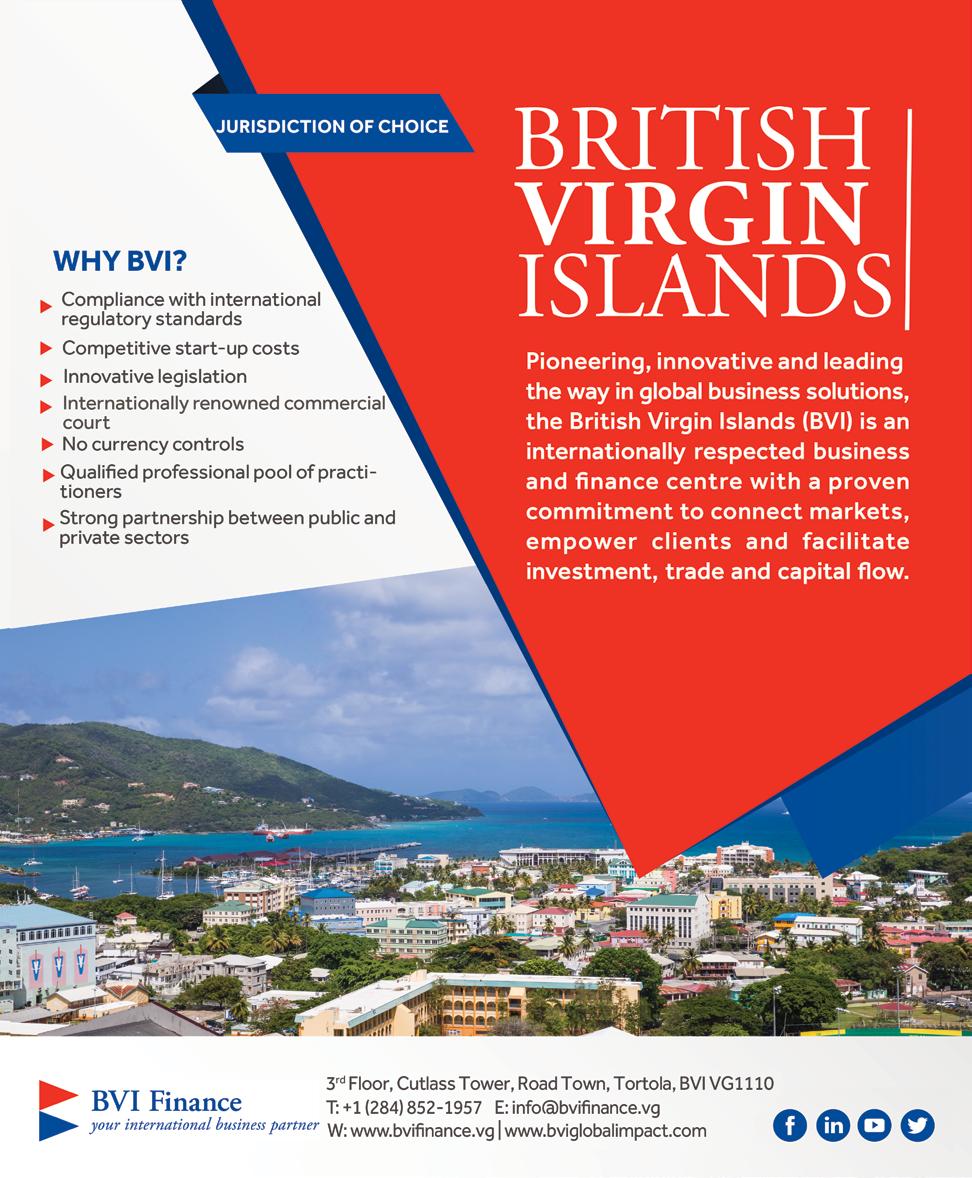
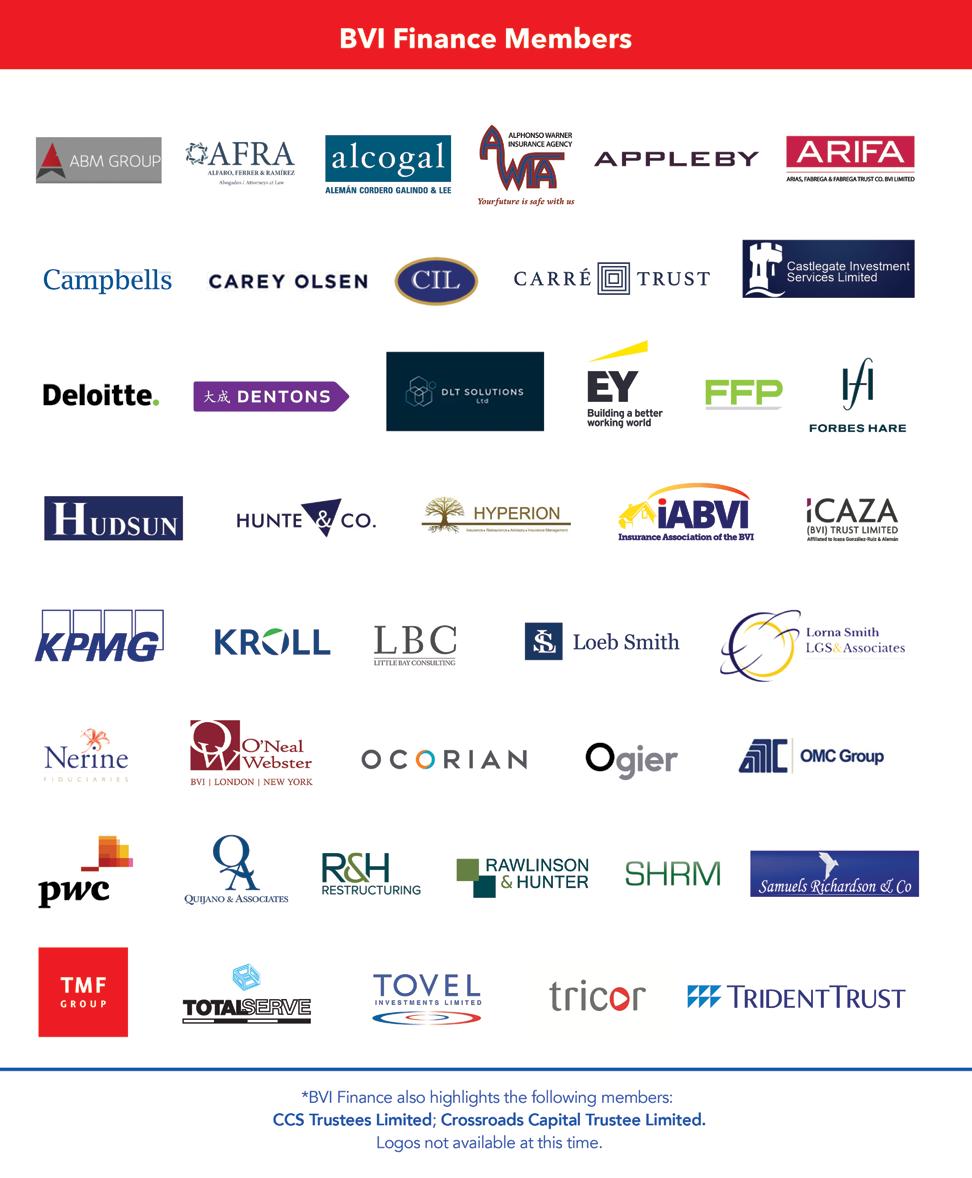
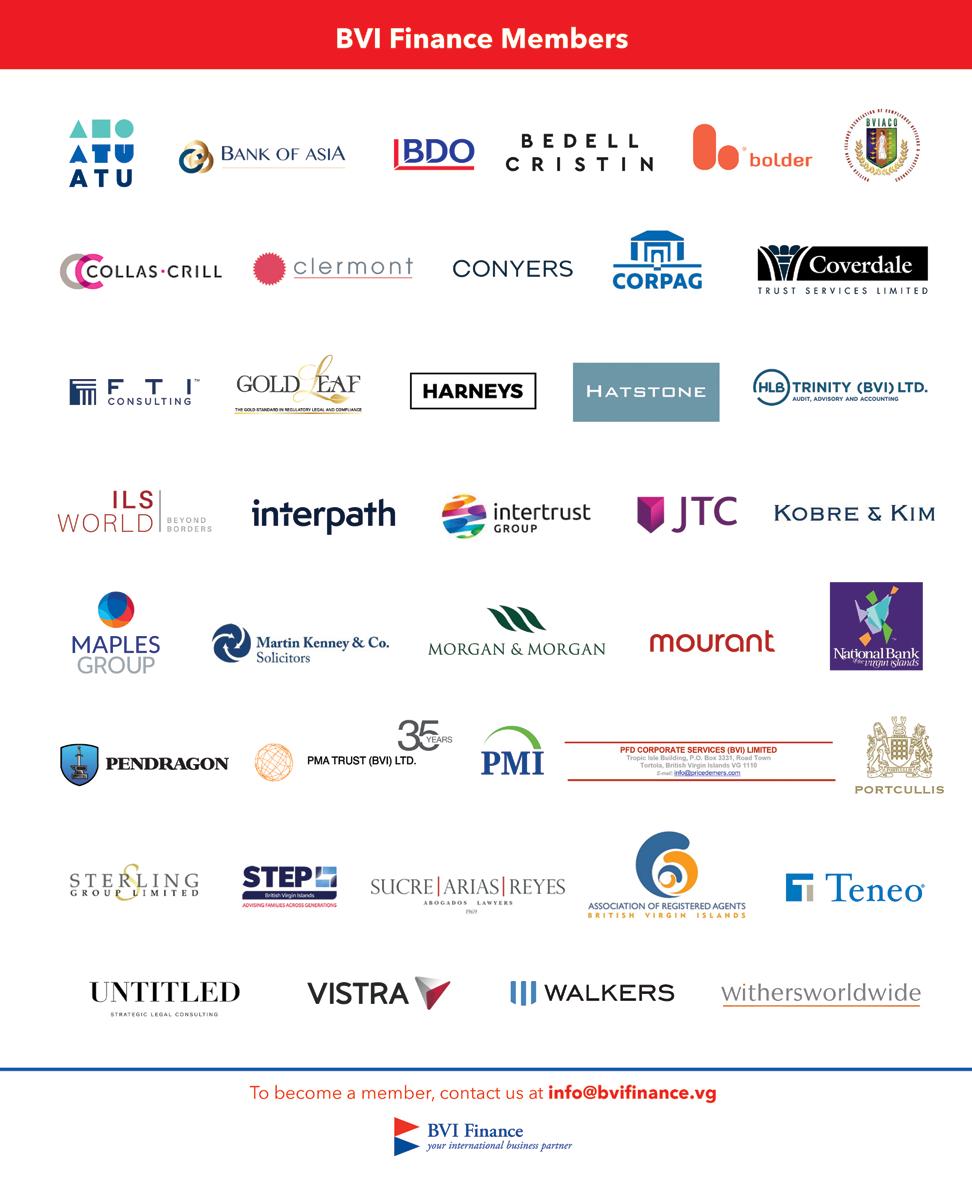
A deep and informative dive into the current state of doing business in the BVI and the global challenges and trends that are impacting the jurisdiction in what is clearly a sustained period of global uncertainty economically and geopolitically.
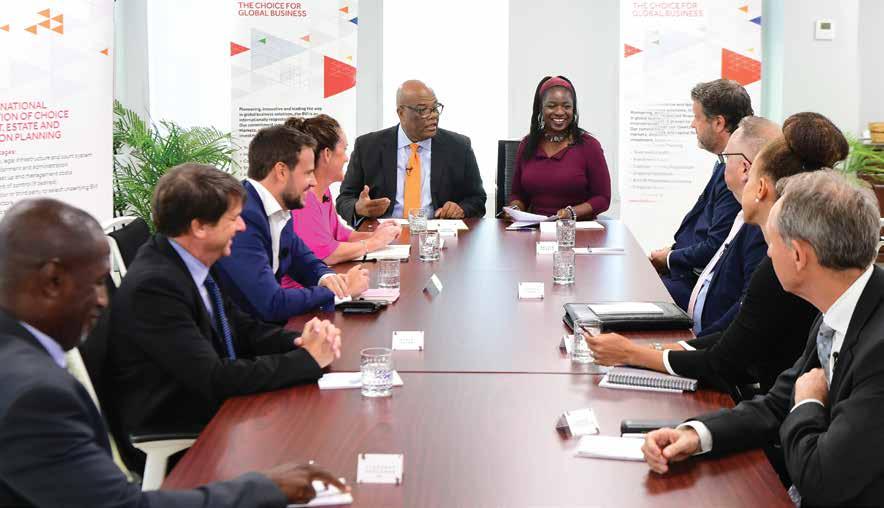
For our focus group on financial services, we partnered with BVI Finance and its CEO Elise Donovan, with whom we have done similar roundtables, while she served as Director of BVI House Asia in Hong Kong. Together, we were able to gather an eminent panel of the leading senior minds in the sector, who looked into their impressive crystal balls and helped us to suss out what they see as the key challenges, areas of opportunity and trends facing the jurisdiction in 2023 and beyond. What is projected to be a sustained period of global uncertainty economically and geopolitically.
As a guide to steering and managing the conversation, while ensuring that we covered the dominant areas most worthy of inclusion in the focus group, we structured the conversation with the 9 following broad areas in mind:
i. The future of globalisation
iii. The new cold war alignment
iii. What does the BVI Government need to do
iv. Market drivers
v. BVI strengths
vii. Our digital assets sweet spot
viii. The sector’s biggest threats
ix. Pivoting to opportunities and what’s next.
As you will see, this was a most engaging and serious discussion about what will be, another most trying and testing period for the financial services sector in the BVI. A period where globalisation is clearly on an evolutionary retreat of sorts with real implications for the BVI, a jurisdiction which has been at the forefront of its facilitation and which for its labour in the process, accrued significant economic growth. We at Business BVI believe that this period will be defined by a significant decoupling of the US and China, Europe and Russia as they seek to secure better control of supply chains, significantly driven by national security concerns. This process has been burning high octane over the last year, a result of Putin’s attempted Putsch in the Ukraine.
Without venturing too deep into the weeds, what follows is a glimpse into some of the highlights of the issues flagged up in the discussion:
• The cold war response to the deepening China/Russia alliance and the implications for the BVI
• The introduction of the concept of a Registered Agent in the UK - is this and opportunity for the BVI to monetise its deep knowhow in the area
• What will be the impact on the BVI financial services sector should China cross the Taiwan Strait
• The need for a strategic alignment between the public and private sectors in the BVI
• The need for the client facing private sector to drive idea generation in the space
• Does the government have the capacity bandwidth to drive innovation
• The need to focus on an economic growth strategy for the territory
• Is it now time for the separation of the Registry from the regulator with the registry focused on selling companies
• Time for satellite driven high speed internet services in the territory
• Time to move up the value food chain
• The need to grapple with having a smaller portfolio of registered companies offering a broader range of more sophisticated services
• Time to pivot to quality over quantity
• The need for a government revenue model based on quality instead of quantity
• A recent area of growth for the BVI has been digital assets
• The FSC deserves credit for the way they have handled digital assets
• And the need for a dynamic banking sector and the need to make it easy to build substance in the jurisdiction.
Q1. Elise Donovan : One of the hot topics at the 2022 World Economic Forum was the future of globalisation. The pandemic, the war in Ukraine, the rise in energy prices, food prices, supply chain disruptions, and the various challenges, that will destabilise globalisation. In your view, what does the future look like for globalisation, and where do International Finance Centres (IFCs) like the BVI fit?
Vanessa King: The uncertainty in the world we’ve seen in the past two years, has created a greater interest in people protecting their affairs. In the private client trust arena, we’ve seen more people than usual interested in creating succession planning tools in structures that protect their interests and the interests of future generations. So, we’ve seen a peak in that as a result of the uncertainty in the world.
Robert Briant: I can offer a less optimistic view. I do so reluctantly, however. If the world divides into different zones or areas, we’ll have a new cold war, particularly with Russia and China. We’ve seen what’s happened with Russia, the freezing of assets, including those owned by BVI companies. I fear that the use of BVI companies by people in Russia and China (China is watching this as well and is becoming more hostile to the West), I’m querying whether the BVI, and overseas territories generally, will be as desirable for people in those jurisdictions. Russia is relatively small; China is not, in terms of consumers of BVI companies. That’s my fear. And where that takes us, in my view, is diversification.
Matthew Cowman: There is a trust issue there. Can I trust my assets to a BVI vehicle in the future, in an environment where I don’t trust my government and how it’s going to behave on a world stage?
Jeffrey Kirk: That is also leading to greater competition for the BVI as an IFC. Russia, we’ve seen it launch its own international financial centre. We will see more of the competing jurisdictions.
Robert Briant: There is the DIFC, Dubai, and whether that will become more competitive, or whether there’ll be more users of those products from Russia than would otherwise be the case. China is less clear, frankly, where they would go. Hong Kong, perhaps that’s a fear. It’s not scary times, but it’s a good time to have this conversation.
Q2. Russell Harrigan: Does anyone else wish to weigh in at this point? Well, what does globalisation look like? Is there globalisation 2.0?
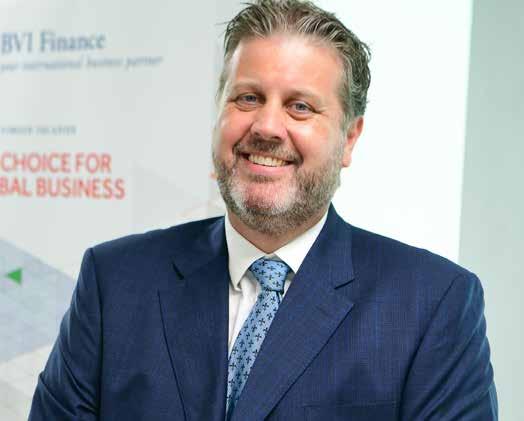
George Weston: You can’t put the cork back in the bottle on globalisation. The level of interconnectedness within the world economy and politically as well, you’re going to see a partial reversal of that. You will probably see governments looking much more at supply chain issues and political, neo-protectionist policies to ensure that strategically, in relation to the key sectors of the economy, they’re not as dependent on other places, in other parts of the world. One of the interesting things for the BVI is, that in a world that is becoming slightly more difficult to trade globally, the role of the BVI as a facilitator and not as a way around boundaries, but as a place that’s more open than other places to doing things internationally.
Q3. Russell Harrigan: What do we need to do to move in that direction?
Jeffrey Kirk: Ease of operation is crucial. We need to make it as attractive as possible for businesses. We’ve spoken about these and geopolitical challenges, a lot of which are driven by the governments. Those in finance, corporate and the business world are still looking at opportunities around the world. Those are the entities and the individuals we want to try and attract, because those are the ones that will drive that international trade.
Elizabeth Killeen: We might also see the world split in a Cold War, and to some extent; we might need to assess and decide which side we would like to be on. It’s going to be fairly clear what side the BVI should be on and will be on.
Jeroen Hoogendijk: The proposition of the BVI is still very strong. We offer a less complex structure of legalisation than almost any other country. At least, that’s what comes from our research. So, I’m pretty optimistic that the BVI still has a solution for a lot of people in the world.
Clarence Faulkner: The one word that you mentioned is ‘research’. In our ability to get meaningful information and data, at PMI we started looking at what’s going on with the Belt and Road Initiative, in terms of the impact. We recognise that there’s a huge issue right now, as a result of the financing that the Chinese have done. Twenty three percent of the countries acquiring loans from China don’t even have a credit rating. We want to find out what’s happening with the Belt and Road Initiative; is it reaching economies and facilitating global trade the way we thought it would? So some analysis in terms of where that is and the appetite for vehicles to facilitate global trade is where the BVI can position itself.
Q4. Elise Donovan: Interesting Clarence and Liz, Liz you said that it’s clear that if there’s a Cold War, with whom will the BVI have to align? Can you amplify? Because if a Cold War ends up with China and Russia on one side, that’s over 35 per cent of BVI business. Clarence was talking about the change in China’s Belt and Road initiative and what’s happening with that. So, where would the BVI align?
Elizabeth Killeen: I want to think it wouldn’t be on the same side as Russia. It depends on what happens with China. Many people in China will want to secure their assets. And if they’re concerned about what the government’s doing, they may be less concerned that the BVI might disclose some information or temporarily hold those assets. Whereas if you keep those assets in China and the government needs to obtain funds, what will they do? They have a history of just taking assets from individuals. It might be that, like, when Hong Kong was handed over, there was a fright in China that we needed to get assets out to somewhere that is trusted and independent. There will still be that drive, because it won’t be everybody wanting to go along with whatever the government’s doing. Some people disagree with them. Some people are just frightened of what’s going to happen. And if their assets are frozen temporarily, that’s better than just being handed over to a government they may not trust.
The fact is that we’ve got 30 years plus of trust from Hong Kong and China, particularly Hong Kong, as an established route. People are familiar with the BVI, and there are many service providers still pushing it in Asia. It’d be a hard sell to start a brand new trust company in another jurisdiction and have that faith and that trust. China is still so dependent on exports. People like buying their products. There’s no point in having all these factories in China, and no one can buy their products. Russia was confident because of its oil; they knew people wanted oil, so they thought it would be a temporary restriction on people buying that commodity. And it’s getting out through India, and there are other means of getting it out. If you’re selling circuit boards and no one’s buying them, that’s more of a threat to the Chinese economy.
Q5. Russell Harrigan: Well, let’s complicate things a bit. Assume that the Chinese decide to go across the Taiwan Strait. What does the BVI do? And also assume that the Ukraine model, sanction-wise, is the model that the West decides to use as it relates to China.
Elizabeth Killeen: Most of the people with a BVI company who have got Chinese names won’t be sanctioned. Hopefully, most of the business here won’t be subject to sanctions. It’s only going to be the high-end, very rich, politically exposed Chinese individuals who would be subject to sanctions, which would impact our business. I’m sure there are also registered agents with Russian individuals who aren’t sanctioned.
Robert Briant: Most wealthy Russians are sanctioned. In your example, Russell, the West would be sanctioning the power brokers in China, probably not those, who have created that wealth themselves, as opposed to Russia. But to what extent will there be pressure from the Chinese government to stop using Western vehicles? I mean, all Western vehicles stop entering contracts; stop dealing with the West. If that happens, then that will have a significant chilling effect on our business. Again, it will be so pessimistic, but I think we are on the possible cusp, of change to be determined by the scenario you provided. If that happens, that would be very bad for BVI business, frankly.
George Weston: If that happens, that’s very bad for everyone.
Matthew Cowman: That’s the doomsday scenario, though. Until that point, the BVI continues to walk the tightrope, and the larger nations can have angry words with each other, and we can continue to do business with all of them.
Robert Briant: I have a fairly provocative suggestion following on from that, which is, if the world does divide into China and Russia and the West, for lack of a better word, should we diversify to Africa, South America, the rest of Asia, Malaysia, Vietnam, et cetera? But at the end of the day, we are aligned with the West. You asked whether we should, but I don’t think we have a question on that. We’re a UK territory. But do we start to embrace some of these initiatives that were already far down the road, pushed by the West, by the EU (European Union) in particular, on transparency? We’re getting financial records here. We have a framework now for transparency of UBOs (ultimate beneficial
ownership). There’s not a lot left. The only thing left will be transparency of the financials. We should fight it all the way, don’t get me wrong. We have done everything right. We continue fighting but also planning for when we say, hey, we’re your buddies. Use us when you have people from different countries to structure your affairs. Heresy, I recognise that, but there’s a point where you have to adopt it and then become more efficient. Get rid of some of these regulations. We have to verify the KYC (know your customer) that’s provided in the UBOs at a 25 per cent level, but get rid of so much more that exists and is hamstringing the competitiveness of the BVI.
Elizabeth Killeen: One thing that we can look at, is the Economic Crime Bill that the UK has passed. Companies House is creating the concept of the registered agent for the first time. This is a brand-new concept in the UK. They’re going to need help figuring out what to do. So, firms like TMF should be going there saying, we have systems ready to go. We have the expertise on whether or not the BVI can offer an equivalent model. The BVI is (perceived as) difficult because we have a registered agent. Companies House is going to be as difficult. Can we create a model which would compete with the UK? At the moment, in the UK, you go online (to incorporate a company), but you don’t have to worry about KYC. You’ve got your companies registered in the UK, and the UK becomes as difficult. We’re streamlined, we’ve been doing this for 20 years, and we know what we’re doing. Is it something we can push in the UK?
Clarence Faulkner: Timing of it is critical, because right now in Europe, many will argue that Europe will probably experience an energy crisis, and what will happen there. Discussions like this can fly under the radar, because right now everyone is going to be so consumed by the whole matter of energy prices.
Jeffrey Kirk: To a large extent, the BVI is limited in its options, because of where it is in our structure. We use the US dollar as our currency of choice because of that, with the US, with the Green Back being the base currency of trade. In one sense, our hands are tied as to whom we align. It would be so difficult to look to change currencies. Do we look to digital currencies in the future and operate on that? That could be a possible route, but we need to tread very carefully, and I don’t think necessarily we want to jump at taking sides. Obviously, the
territory should, and no doubt would, be on the side of democracy and human rights, and I think that would be an important part of it. But on the other side, we’re talking about China invading Taiwan. Having lived in China for years, I’m optimistic that the Chinese Government would be very reluctant to do something like that. They would certainly take the long run to jump into that situation, which would cause chaos globally.
Jeroen Hoogendijk: Jeffrey, should we set up a central bank to become more flexible on currencies?
Jeffrey Kirk: Well, probably in the future, there won’t be any central banks.
Jeroen Hoogendijk: I see Cayman and Curacao, and most jurisdictions have done it, and it gives flexibility. If you cut off the corresponding system in the US, then you have here a big problem.
Q6. Russell Harrigan: Are there some specific things that you think that the government of the BVI needs to be doing or to be at least thinking about at this point, other than just hoping for the best? Clearly, China and the rest of Asia have a significant pull on our quality of life. What is it that the government should be doing other than asking the FSC (Financial Services Commission) are we going to get $150 million next year?
Vanessa King: It has to become more business-friendly. It takes a lot of work to do business here on many different levels. If you need a trade license and work permit, the process is too difficult, and it becomes unattractive to someone looking to the BVI. That’s on a very basic level. As you just discussed, the quality of life, and the basic infrastructure that supports society would need to be improved, from telecoms to the level of the internet that we have now, to basic infrastructure. Those things would need to be fixed on a very basic- foundation level.
Elizabeth Killeen: The next generation will come in and support the financial services sector. The schools need to be a priority, and scholarships for bright kids who want to study accounting or whatever should be free and available. They’ll pay those scholarships back in five years of tax.
It’s money for nothing for the BVI Government, and they get successful BV-Islanders in the right industries.
Clarence Faulkner: There must be a strategic alignment between the private and public sectors. You can speak to any developed private outfit, and they can tell you the amount of work they’ve done to determine if the BVI is an opportunity for them, a base for their business. What seems to be lacking is that from the Government’s perspective, it needs to be aligned with the collective voices from the private sector. And we talk about education; we talk about infrastructure. We need an informed databank that basically produces the information that supports the recommendations coming from the private sector that says if we’re going to approach these different areas around the world for economic opportunities for the BVI, this data supports it. What is happening right now is that the private sector is simply driving the bus. And as a reaction supported obviously by the likes of BVI Finance, the Government begins to see the rewards. So it’s a reactive versus a proactive approach, as it relates to targeted, specific areas around the world.
Q7. Elise Donovan: Based on my conversations with all of you, business is doing well. What are the market drivers? What makes your business and, specifically, what structures make you attractive in the global markets?
Clarence Faulkner: The ability to respond - markets move, economies move, and there are dynamic shifts. Are you in a situation to make amendments and to be flexible within your product offering to capitalise on that opportunity? If you’re waiting to say, all right, we’re waiting on the government, waiting on that, you would miss the boat. So how flexible are we? How nimble are we to adjust to the environment to say, all right, we need to do this, we need to shift, we need to tweak to be able to capitalise in terms of what’s going on around the world.
Robert Briant: Most of what we sell around the table is the BVI company and the legal rights around it. And frankly, that is by far the most efficient vehicle amongst our competitors and even, frankly, amongst most, if not all, onshore operations. Any changes to make it more efficient should be adopted. The FSC has focused, for good reason, the last ten years on regulation and making it more difficult, the KYC, all that good stuff, but maybe it’s time that we look for opportunities for the private sector and the FSC and the Government to work more closely together, to think of how to introduce more efficiencies where they may exist. Again, FSC has done a good job. A four-hour turnaround on filings for $500; Brilliant. But we need to see more of that to make our products even better.
Q8. Russell Harrigan: Who’s that burden on? Is it FSC, or is it Government? Does the government have the wherewithal capacity-wise within its structures and systems to know what is required and to focus on that for its obvious benefits?
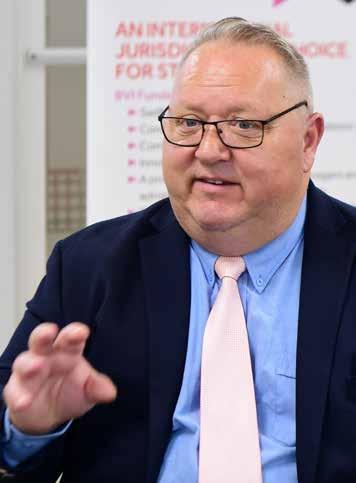
Robert Briant: It starts from the private sector with ideas. We’re the client-facing ones; we see what the frustrations are and should be leading the ideas, then working closely with the FSC and the Government, which does the actual enactment and legislative process. We would certainly welcome the AG’s (Attorney General) participation, as well as the actual drafting, whether it’s a private sector or the FSC.
George Weston: Those three parts work together; it is with the private sector to come up with ideas to shout out what isn’t working or what we think we need. We need the FSC to engage as they have done proactively. And there are, of course, real reasons why regulator needs to be independent and critical in terms of how they look at things from industry perspective. And we’re not talking about them consulting with us and enforcement actions or anything else, but in terms of their legislative and policy roles, it’s right. There is consultation there, and then fundamentally, a lot of this will require legislation, and some of it will require a budget. And ultimately, that comes from the Government as well. So that’s why we need their buy-in for all of this.
Jeffrey Kirk: My experience has been over the last couple of years, those three different bodies or sectors have been working more productively together, and that’s certainly development in the right direction. And likewise, Russell, you asked which has to push that agenda forward. Each comes with its own targets and aims, and therefore bodies like BVI Finance, where it’s an organisation that both government and private sector support, and it’s not seen to necessarily have that pure selfish viewpoint. So that’s crucial. But as long as the three sectors can communicate with one another, the better for the jurisdiction, the more competitive we’ll be.
Matthew Cowman: Does the government have the bandwidth to concentrate on innovation at the moment now, though? Because it doesn’t feel like they do, because there’s already a very big agenda. There are opportunities in the market where we could innovate around products. The government’s got its hands full with other things, with other legislature changes. Are other opportunities there to carve out a niche that focuses on growth and innovation, that don’t get caught up with implementing international standards and things like that?
Robert Briant: Another controversial suggestion – is whether the Registry should
be separated from the Regulator. Objectively, the answer is clear. Practically, it’s more nuanced, I understand that, but are we not now more mature in the jurisdiction? Can we set up structures to make it independent? So the Registry sells companies, that’s all they do, and that’s all they think about, and they’re measured by their success.
Clarence Faulkner: Robert, I had a conversation with TRC (Telecommunications Regulatory Commission), and my question to them was, are you a regulator or service provider? Because we run an international trading floor here, and we are currently utilising bandwidth from all providers simply because we can’t afford for it to be down. If one’s down, the next provider needs to take it seamlessly. We require that bandwidth. I started reviewing satellite and what’s stopping us from having a satellite feed over the BVI, which has become a big issue. Who’s going to issue it, TRC? Who’s going to regulate, TRC? So, what are we, a regulator or a service provider? Once you determine which hat you’re wearing, it provides the impetus to push it for the significance of the jurisdiction. Other than that, you’re simply wearing a hat that suits the environment for the moment.
Q9. Elise Donovan: Let’s move the conversation back to the value of the BVI. Why is the BVI at the forefront of these multibillion-dollar, high-value, complex transactions? Is the BVI moving up the value chain from just being a holding company to a listing company?
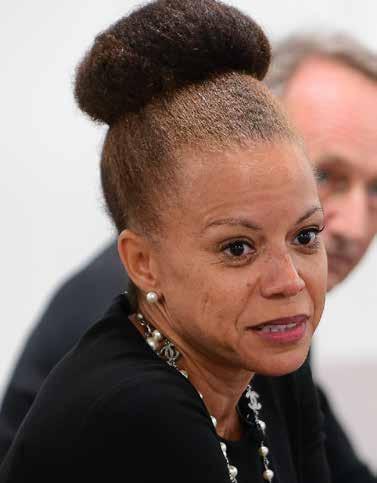
George Weston: The fundamental strengths of the BVI and the corporate vehicle have mostly stayed the same over the years. It’s still a flexible corporate law that Robert and others have been talking about. It’s still the quality of the judges and the courts here. It’s the quality of the service providers, generally a business-friendly attitude, even though there are obviously things we can do to improve ease of business. One of the reasons why you see transactional values consistently improve, is simply that the BVI companies themselves are growing up. Many of them were formed years ago and weren’t worth very much to start with, but the companies themselves are growing. They do bigger transactions; they get involved in more interesting things. And the BVI’s jurisdiction has grown with and has to grow with the companies.
Jeroen Hoogendijk: But that’s a danger to the jurisdiction because the portfolio will get smaller. That’s what you see at the moment, that the volume of BVI companies is what drives the income of the local government. We have to look at that and maybe against extreme price increases and do it with a smaller portfolio where we do more complicated services.
Jeffrey Kirk: There’s a risk aspect as well. You’re absolutely right; 375,000 active companies that are declining, and it’s without a shadow of a doubt will continue to decline. Liz has mentioned the Channel Islands, but equally, you look at Cayman and Bermuda, numbers-wise, far less. If we become fixated on pure numbers, we don’t necessarily recognise the risks. One of those individual asset-holding companies where the Government gets $450 a year could theoretically contain or cause the risk that causes the whole system to collapse. So why are we so worried about the pure volume of companies when that increases our risks much more than if we have fewer companies, corporate governance over each is far stricter and better, reducing our risks.
Elizabeth Killeen: You look at Jersey and Guernsey; they’ve got 20,000 companies and have a perfectly operational financial services sector booming. We can get rid of like 80 per cent of our book of business and still have a profitable financial services sector here. A lot of the work we did initially was lots of smaller companies and individuals running it. They’re not high-net-worth individuals; they’re not big companies. Whereas if you look at the Channel Islands, 20,000 entities, and they’ve got two very successful jurisdictions. So we don’t necessarily have to keep punching for 300/400,000 companies.
Robert Briant: The corollary to that comment is, what percentage of companies do you think the UBOs care about privacy and confidentiality? I know there are wealthy kidnapping victims, and there are other reasons, but what percentage do you think care? This is a slightly different question from what percentage we would lose if we had publicly accessible registers of beneficial ownership.
George Weston: But there’s another question, which is a good one. But the other question is if you say X per cent cares about privacy confidentiality, but if you also say X per cent is the high-value piece Jeff is talking about, to what extent are they in the same Venn diagram?
Q10. Elise Donovan: George, you said that companies have grown and that the BVI has grown with them. We take companies through the whole life cycle from birth (incorporation) to insolvency. What are we seeing in terms of all of these life cycles of a company? What is happening that places the BVI on the map?
Clarence Faulkner: If you go back to the opening comment, what’s number one in terms of meaningful data, whether there’s some cost-benefit analysis to determine
the value of our book of business, that’s one thing. The Belt and Road Initiative, China’s policy in the embryonic stages of any development is that we will fund it and recognise that in five to seven years, we’ll see something coming out of it. In 35 countries, 17 new ports have been built by them. What are they hoping to gain? More importantly, from which sectors? How many of those companies own these facilities which they started with literally nothing, and they’re now beginning to blossom? They’re now beginning to reap the rewards from the avenues open for global trade. That’s what we need to know to be able to capitalise on how many of those companies are there; how many more are likely to develop, based on the channels that have been opened for global trade?
Robert Briant: The analysis has stayed the same. Companies are the most efficient vehicle to set up businesses. BVI is one of the most efficient jurisdictions for setting up vehicles. Particularly when you have people from different jurisdictions, they will use the BVI for that or if the rule of law is weak. The BVI has been remarkably successful because of the incredibly efficient, innovative IBC Act (International Business Companies) in 1984 and continues to keep up-to-date with its legislative changes in the IBC Act and the BVI BC Act. It has very effectively, and Robert Mathavious played a huge role in this, been rolling out the regulatory regime in a relatively smooth and balanced way that didn’t have to jump too much at any one time. People who went through it may object or disagree, but looking back now, after 20-odd years, it’s a very smooth process, and there’s no reason for that to change in the future. So BVI companies are incredible, and the BVI is very good at selling that.
Elizabeth Killeen: One of the other things is that it doesn’t have to necessarily come from the BVI. So when I got here 15 years ago, there were not as many law firms, and the law firms were making money here. All the other law firms in the offshore world were looking around, saying, oh, we’ll have a piece of that pie. And so everyone’s gone to expand their BVI book of business. So it’s more than just BVI necessarily changing things. It’s lots of people acknowledging that this is a good model. And Carey Olsen was a Channel Islands firm, and it came to the BVI like Mourant and Ogier did, under ten years ago. Before, the Caribbean law firms were here, and now the Channel Islands ones have moved in, and we’re even getting the onshore ones here with Dentons, Withers, et cetera. So it’s also that natural marketing of people in the private sector saying, this is a good model; we can make money on it. And that’s what I have to sell it as well. There’s organic growth.
Q11. Elise Donovan: Is the pie getting bigger? Is it providing more business opportunities? Most of you are doing transactions that are doing relatively well. So what is it that you’re doing in terms of business? How is the pie growing?
Jeffrey Kirk: The big growth area of the BVI has been digital assets. And as much as we as service providers would like to claim some credit for that, I don’t think we can. That has been driven by the entrepreneurs and pioneers in the sector. And they’ve done their homework looking at various jurisdictions, and to a large extent, they’ve identified the BVI as a jurisdiction they can work with. And for the last five years, we’ve seen that growth. So then the question is, how do we facilitate that, and how do we grow that part? As Vanessa said, it’s creating a better environment. It’s the trade licenses, the work permits, the accommodation, the transportation, and very much infrastructure. And what we could do there is build the business, build the international business, but at the same time look to transform the jurisdiction so that we have those entities, where beforehand they would never open offices in the BVI. Now they’re looking to do so.
Matthew Cowman: They do actually want to come. We have those conversations all the time. And the experience for them, the BVI as an international product versus the BVI as a domestic product, is quite different and jarring.
Q12. Elise Donovan: You said the digital asset space is one of the growth areas; we’ve heard that the BVI is in a sweet spot. How long is that going to remain? And what will it take for us to remain in this position, other than growing the internet infrastructure? Why are we in the sweet spot?
Elizabeth Killeen: We are in the sweet spot because we don’t have VASP (virtual assets service provider). We won’t be in a sweet spot at the beginning of December. But, equally, we need to be seen to be regulating it. We need to be seen as a jurisdiction at the forefront of virtual assets, not just building a business because we’re the only one that isn’t regulated. That is going to have an impact.
Q13. Elise Donovan: But have you been preparing your clients for the coming regulation? Have you been telling them to put measures in place to anticipate what will be in the virtual asset service providers’ legislation?
Jeffrey Kirk: One of the shining lights of the BVI service providers, is that they were doing this five years ago. They recognise the need for KYC might not have been formalistic legal requirements at the time, but where do you go where there is no KYC?
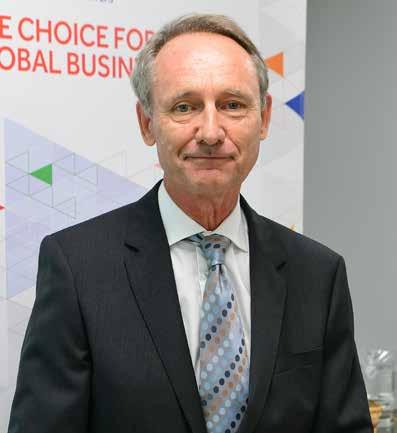
And failure to raise that with your clients, we knew would leave them in a very difficult position once that law and regulation came into play. They would then be in a position where it would be impossible for them to comply. To be fair to the clients, they accepted that and agreed with it. The will is there in terms of other aspects. For digital assets, it’s a competitive world out there, not just in the larger financial centres but also here in the Caribbean. We have to make it easier for the business. The Bahamas has a number of banks that trade and work in digital assets. That’s an area that we can improve. There are exchanges as well; there’s much debate about that. But strictly speaking, if we want to become a real hub for that in the long run, we need exchanges.
Matthew Cowman: There are gaps in our products right now. So often, you’ll get somebody who will come to the BVI who wants a BVI company as a token issue. They also want a foundation to go with it, and we don’t offer a foundation, so often, they’ll go elsewhere for that aspect.
George Weston: I think that there is a sweet spot that you can have as a jurisdiction that has sensible regulation. Regulation, that’s as light as can be justified by reference to the risks. With a regulator that understands these products, with the government and an industry that’s not hostile to the same. And it might be a smaller sweet spot than the open-the-floodgates approach. As Jeffrey says, that’s never really been where we are. That will be a difficult sweet spot to find from 1 January 2023, but we can hopefully find it.
Elizabeth Killeen: We need to make sure we don’t make the same mistake that Cayman did when it introduced VASP, and regulators were very uncomfortable with virtual assets. It was taking a year for things to get approved. When it is introduced, it’s important that the people who are processing the applications are familiar with the terminology. But just knowing what that is and getting those smooth applications in quickly, because we’ve got so much business from, even referred from our Cayman office. Clients are prepared to be regulated, and they’re happy to move to us knowing that VASP is coming in, but they can’t get it done in Cayman because the last year has just been a complete handbrake. We need to make sure we don’t go down that same route. That brought business to us because they’ve seen the Guidance Notes and said, you’re a jurisdiction that knows about virtual assets. Just the fact that the BVI produced those, has brought in work.
Robert Briant: That’s a great light, though, that my experience as the regulators here at the FSC do want to know and are learning and are keen to learn and understand it. They’re cautious, no doubt, as they should be, but they’re not cautious through lack of knowledge, but cautious because it’s an industry where it is necessary.
Jeffrey Kirk: The FSC deserves credit for the way they’ve dealt with digital assets. They’ve been careful, they’ve been watchful, they’ve gathered information where they can, they haven’t been reactionary, they’ve been proactive to it. That is a credit to their approach.
Clarence Faulkner: That’s the essence of the precautionary approach, because if you look on the global scale, there’s a big argument in terms of whether or not what’s going on with virtual currencies and cryptos is in the bank right now. It’s the modern-day version of the dot.com era, from 2001/2002 when that bubble burst. What happened is that the quality companies stuck around, generated cash flow, and became viable business models. They’re now the largest companies around the world. What you’re beginning to see now is that jurisdictions, such as the BVI, are being that much more cautious. I mean, we see what’s going on in the markets right now. $10 trillion was wiped off the crypto market. So people have been very cautious. They are aware of what’s going on. Many questions are being asked, especially from a regulatory perspective, because the last thing a jurisdiction wants to be painted as, is the jurisdiction where many of the frauds have been committed. It is not what we want.
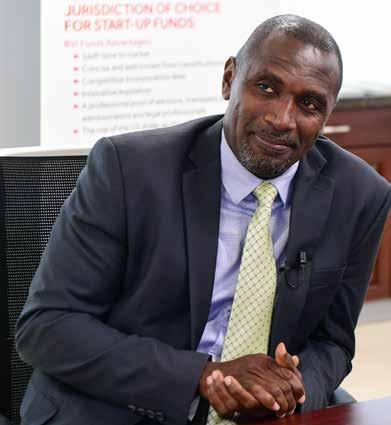
Q14. Russell Harrigan: What are the biggest threats? What’s keeping you up at night?
Robert Briant: Two things. China is very cautious; they see what’s happening to Russia and recognise it could happen to them. And then, two, I totally agree that it’s a very different model. The rich wealthy there, and the users are very different, but many users are state-owned companies. But even beyond that, the chilling effect of the Chinese Government, if they choose not to use the BVI, that would wipe off 50 per cent of our business within months. So that’s what keeps me up at night.
Jeroen Hoogendijk: You’re probably right; in a number of entities, China is really big. If I look more at the monetary side and revenues, et cetera, it’s less big. People are always surprised if I tell them within our company that we’re doing pretty well in Europe because everyone expects Europe to be so much more regulated, that the BVI company can’t survive there. It is, of course, a lot through law firms and vehicles that service out of Europe. I appreciate that, but still, it’s an important place to be. So, yes, China falling away will hit us. There’s no doubt about that. But how big it is, I don’t know yet. And what I also see Clarence Faulkner. Clarence is the managing director of the PMI Group of Companies, focusing specifically on investment management, pensions and private wealth management.
is that there are a lot of state-owned companies that use our products. I’m interested to see what they’re going to do with those. They’re not going to liquidate them immediately because that’s just assets, and in the world they have to deal with, which is us, it’s a bit difficult to start liquidating, so it might not be that bad. I don’t see that happening. I think the Chinese are too clever to do so.
Clarence Faulkner: The big concern for me is two-fold: Debt crisis - the Chinese have put out quite a bit of money into infrastructure development with the Belt and Road Initiative because quite a few governments do not have good financials. And what is happening is you have to now lease the very asset back to China, which leads to the next problem, which is national security. We’ve seen in the US that they passed the CHIPS ACT, and we all know that’s a direct linkage with Taiwan in terms of the development of chips in the US versus relying on Taiwan’s semiconductors. The reality is that if many of these countries do not have the wherewithal and have to give these assets or sell them back to the Chinese, then it’s going to become a national security issue with the US and its allies. And that’s where we have to be very cautious, because the reality is that the US will continue to support its interests, but China is going to do the same.
George Weston: Although I’d agree, the US-Chinese relationship is probably the biggest thing that keeps me up at night. In the interest of variety, I would say the global minimum tax.
Robert Briant: Jeroen was saying how much business he does out of Europe. Europe has been hostile to the BVI. The opportunity is, can we pivot that relationship?
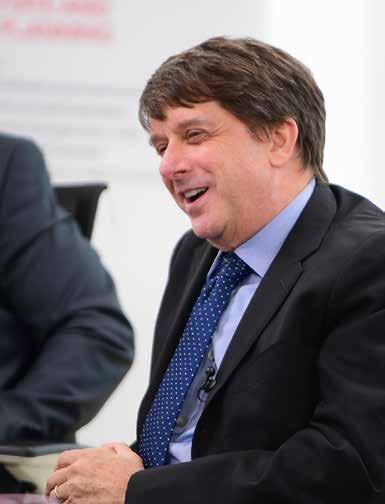
Q15. Elise Donovan: We’re still determining where we will stand with the OECD and the EU initiatives. Can we pivot that relationship? Can we transform it from what it is now?
Jeroen Hoogendijk: Our good initiative for the economic substance has yet to really take off here. And that is partly because maybe more fines have to be issued, so we have to scare off the clients a bit. But it’s also an opportunity for the Government to open up society a bit more. Because for substance, you would need specialists coming into the island, living here, probably spending a lot of money and making this a very good place to be. And I don’t want to compare constantly to other jurisdictions, but that would help a lot. I saw this with Elizabeth Killeen, interestingly enough, a Dutch company coming in. In Holland, it’s been a big business substance for years and years and years, but it’s getting more and more difficult because of the public opinions against it. So you see a movement, and it would be nice if the movement were to the BVI. There might be more jurisdictions, but we’re getting better and better. We’re getting more sophisticated. That’s exactly what these clients are looking for. But you have to receive them with open arms. Otherwise, they go somewhere else. That has the best system around it. Can we really compare ourselves to a jurisdiction like Luxembourg? I think we have to. If I look at the table, we’re all very eloquent lawyers and practitioners. We have to be proud of ourselves. This is a really solid jurisdiction. It’s a solid product, better than many other places in the world.
Q16. Elise Donovan: How do we pivot to Europe? Why do your European clients pick the BVI?
Jeroen Hoogendijk: It has a lot to do with our network. We are in 80 countries and have even more offices. This business comes to us through our global sales network and our relationship with law firms, tax advisors, and auditors.
Clarence Faulkner: The whole matter of economic substance, especially on the investment side, is why we have the trading floor here. And I can tell you that when we ran the advertisement for equity analysts to move to the BVI, we got 78
applications from London, Wall Street, you name it, we got it. And to now have a fullfledged trading floor here, with real equity analysts, people are like, well, is that really in the BVI? And when you really start promoting economic substance in terms of yes, we sell the companies with this product. But then what is that client utilising that product for? And how much of that business can we continue to manufacture here in the BVI? They offer that exact service. And I can say to you it’s been well-received. We’re still positioned out there, but the reality is that you’re absolutely right. Persons want to know what additional services can be added to that product offering for us. We look at someone’s wallet and determine how much of that we can manage and go after it. And I think to be a bit more proactive, that’s what we need to do as a jurisdiction, supported by the government that says yes, we’ve done well with this sort of business for the last 25 years. What do we need to do now to build and leverage on top of what we have, that provides better opportunities?
Q17. Elise Donovan: Investment business is growing; why is that, and where are the opportunities there?
Clarence Faulkner: When we look at the Asia, that’s where we started building our database, and you recognise how many millennials have generated wealth over the last 10/15 years; what are they doing with their assets? How are they securing their assets? Then you begin to find out exactly how you can help manage those assets. Because many of them will tell you “ we’re not putting our money in the US.” Go around the world. And if there is an opportunity to continue utilising a BVI Business Company looking for economic substance and the BVI now offers the service, the chances are they will register, and they will do the management administration here as well.
Robert Briant: What’s so remarkable, is these types of conversations I’ve sat around these tables for years, and lawyers have always had to see the table. We’ve been pushing lawyer products because that’s all we know, frankly. But it has something like this, an equity trading platform; I would never
offer that; I don’t know anything about it. But that shows me, that you need a variety of diversification beyond legal products and the BVI BC Act. But the add-ons to that, that I can’t talk about, not even people on the table can talk about, because that’s not in our bailiwick.
Jeffrey Kirk: The location of the assets is a big part of it. And this is about getting back to the point that we discussed continuously year after year, but as controversial as ever. And it’s what we need. It’s the banking sector. We need a dynamic banking sector with the appetite to take these assets.
Q18. Elise Donovan: Is it going to be traditional banking? Isn’t traditional banking on the way out?
Clarence Faulkner: I think we have gone away from that, to be honest with you. We said to the client; we’ll connect you with a platform, you retain the ownership of your assets and eliminate most KYC and AML issues, because they continue to hold their assets. We’re doing a fundamental equity analysis, with a recommendation on where they will buy or sell. So you’ve basically moved the administration from where they’re located and brought it to the jurisdiction where they’re not only registered, but also managed and administered. And instead of you simply signing a declaration in the BVI as the director of this fund or these assets, they’re doing that, but you’re doing the work. What you’ve done, is you’ve swung the pendulum as it relates to what is the incremental value of the services that you’re being offered. Do you want a director fee of $5,000 or a management administration fee of $150,000? That’s what it’s going to boil down to.
Vanessa King: The banking service still has to come in. This is a major part of the equation; that’s always a huge missing piece of the puzzle.
Clarence Faulkner: You need the banking service, but it’s not the end-all and be-all. That’s been there. For them, historically, that’s always been there. And that’s why I’m saying we’re going to move. We have to move in such a way that the world knows there is more substance in the BVI than legal services and setting up companies.
Jeffrey Kirk: Right. It’s not the end-all and be-all, but the one thing that does strike me in terms of jurisdictions that have grown and some of the leading jurisdictions, is that they have a very strong banking sector. The form of that will probably be very different. It won’t be the traditional model, but I think any sort of future model that facilitates our clients, facilitates the jurisdiction, will be welcome.
George Weston: When you come across a client with a potential economic substance issue, or a requirement for economic substance in the BVI, you basically have three things you look at. First, can you structure around this so that the issue doesn’t arise? The second is, do they abandon BVI in the structure, that is not what we want, or third, do they build substance here? We have to make the third piece of that easy and attractive relative to those other two options.
Jeroen Hoogendijk: Absolutely. You need specialists on each and every type of business that we carry here, and you have to be realistic with a population of 30,000.
Clarence Faulkner: I may add a fourth one to that, George, as it relates to regulatory adherence. Not only in the BVI jurisdiction, because once they come out of Hong Kong, their regulator will also want to ensure that that company has genuine substance in this jurisdiction. For your regulator, we stand that as proof and that’s economic substance, but does it also meet the test on that side as well?
George Weston: I’ve seen an increasing number of clients who don’t need substance from a BVI economic substance perspective, but want to create it for another reason.
Jeroen Hoogendijk: It took me a lot of effort here to explain to people that if the ultimate beneficial owner lives in Egypt, you have to understand what his situation is there. We can become really good at that and take pieces of the cake from Europe.
Vanessa King: On that point, though, what Matthew mentioned previously is what’s
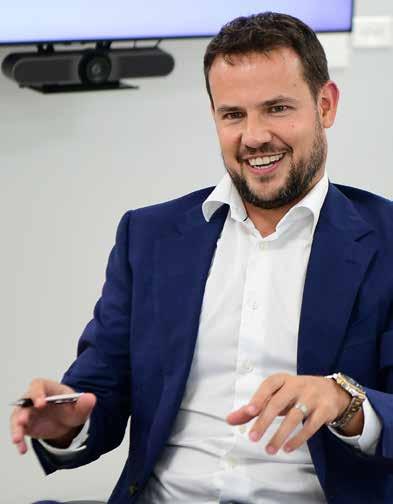
important. That part of government that is focused on that and facilitating that kind of enterprise and initiative.
Jeffrey Kirk: Government has a lot on its plate and operates with restricted resources; how can we work with the government and the regulator to help them? What assistance can we, the private sector, give?
Robert Briant: I don’t think the EU passes these regulations just to hurt the BVI or the Overseas Territories. It’s because they perceive the Overseas Territories and the BVI in particular, as tools to hide assets and evade taxes or aggressively avoid taxestheir buzzword now. How to become allies of the EU, is to say we’re not about that. Say more than we’ve said before; we are going to have transparency and we’re your allies. Then they’ll stop passing legislation to punish us, because I don’t think that’s their intention.
Q19. Elise Donovan: But will they? Because we’ve been going through the transparency initiatives for 20 years. We signed onto the OECD Global Forum in 2002, and there have been so many tax initiatives, the CRS, the BEPS, we’ve all signed up to all of these initiatives, tax information exchange agreements but the goalpost keeps shifting.
Jeroen Hoogendijk: In the Netherlands, you see already movement back. There’s a public register, finances are public, but you can nowadays ask for all kinds of exceptions, because the criminal part of a society, with a couple of bits of brains, can look into the systems, and everyone starts to understand how that can be quite dangerous. So, you can apply for exceptions. I think the movement is already back, so they’ll be closing.
Jeffrey Kirk: Robert, you ask, what’s the final hurdle there? And I suppose there would be a global minimum tax record being introduced. But then again, we’re talking about what’s being introduced, and all these measures are invariably being introduced and driven by governments. And we need to recognise that our clients are not European governments or the EU. They’re the business people and individuals within the EU. And likewise, I’m sure we’ve had conversations with individuals in Canada, the UK, and elsewhere where they say, I’m tired of this; I’m tired of the tax situation. ‘Yeah, I’m being taxed to death; what can I do to structure something to deal with it?’
Elizabeth Killeen: The global tax plan, I mean the 15% proposed, is not going to come in quickly. There are problems within Europe and problems with the Republicans in America. So even if it could be agreed at the moment, it’s not everyone, it’s only like mega rich, and that’s really what Europe is focusing on. They don’t want Amazon to operate and make billions and billions and not pay taxes, and I don’t think anyone around the table disagrees with that. They’re not trying to get your average Joe Blog, who’s effectively managing their assets. But what they do want to stop, is the big entities which are profit-shifting, so they close the economic substance gap to close down IP. And there wasn’t a huge amount of that’s in the BVI anyway, so it didn’t really affect us. It was just an admin version for us. So what they’re trying to do is go after the big end, the big ones who are dodging taxes. There’s no question that’s what they’re trying to focus on and they’re going to keep chasing their tails because these guys have got the best minds behind them.
George Weston: Is there a future for the BVI as a regime whatever the global minimum is? That’s where we’re going to be. But if we’re at that global minimum and then we’re offering a pro-business environment, if we’re offering low regulation and the most flexible corporate law anywhere in the world, there’s still a future for us in that space.
Robert Briant: There’s also the extent to which the global minimum tax will affect the BVI. What I mean by that is, you have obtained 15% at that level. BVI companies in the middle and top companies are just paying 10%. Top companies pay the extra five. So BVI companies within a holding structure, wholly-owned or whatever. I never say never, but not affected. A BVI company owned by a Chinese guy carrying
out business somewhere in the world that’s not paying tax. We have to pay tax, but that’s a fairly narrow taxpayer.
Q20. Elise Donovan: Where do Asia, Latin America and all our markets stand on public registers?

Matthew Cowman: It’s been discussed for so long; it’s probably shaken out already. I don’t feel our clients are here for privacy necessarily. There is probably a real segment in the BVI market that is, but our client base is becoming more institutional. They’re not here for that reason.
Jeffrey Kirk: I agree with Matthew. It’s becoming less material. However, I think it is somewhat grating that we are being forced into a system, where we will have to apply gold-plating where many jurisdictions don’t.
Jeroen Hoogendijk: Except for Hong Kong -- my feedback is that clients there find it really good that there’s not a public register here (in the BVI). It will be less of an issue than we saw a couple of years ago. And also because all the jurisdictions where the UBOs are located have it already. So you
start to get used to it, that everyone knows everything about everybody. That’s how it is. It’s social media. What kind of privacy do you have anyway? And the younger generation, certainly, that’s to be proven.
Q21. Elise Donovan: Can we attract the banks that you were talking about earlier? As you said, how we attracted the other firms from the Channel Islands, etc.
Clarence Faulkner: I spent five years trying to get a correspondent bank and got Bank of America here. They left it two years for any other major international bank that wanted to come into the Caribbean region. Not just that, you’re talking about a $5 billion minimum, and there were only two companies in the entire Caribbean, one in Jamaica, and one in Trinidad that were able to foot that bill. The governments across the Caribbean have been lobbying with Washington even to consider making ECCB (Eastern Caribbean Central Bank), the Caribbean regional correspondent bank from Washington. And that discussion is ongoing, but it will come down to an analysis of whether it’s worth the risks in that jurisdiction. And the one thing American banks are very aware of right now is headline risks. No one wants to think of the Wall Street Journal and see that this company was involved with this bank in the Virgin Islands. That’s one of the biggest risks.
Elizabeth Killeen: Jeffrey also said earlier that it might be different from the traditional banks we want going forward. That might not be the model that people are using. So it might be better to start looking at more modern banking methods with the idea that in a few years, that’s what we would have. Rather than traditional banking methods, it might be, let’s be innovative, let’s go talk to people. Let’s look at having cryptocurrency and digital banking here. Look at that side of things rather than the traditional banking model. Be one of the first that can do that. If we can have a focus group on that, that would be brilliant for this jurisdiction.
Q22. Russell Harrigan: Okay, final word. What’s next?
Robert Briant: The BVI is on the cusp of the rest of its future. All I mean by that is we’ve changed so much from 20 years ago.
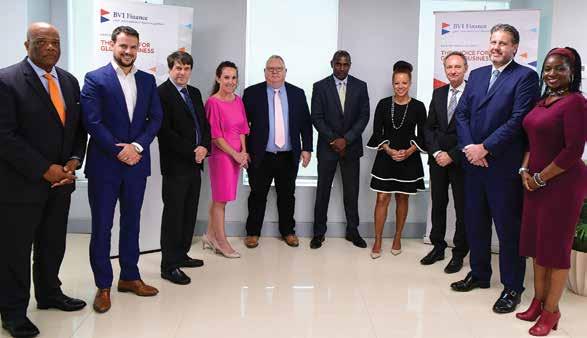
The changes will stop soon and allow us to focus on the product and no longer on the regulation. Because I think we are at the end of the regulatory burdens, let’s get back to being more efficient and just focus on the positivity of the product and sell that. So the next 20 years are fantastic for the BVI.
Clarence Faulkner: We’ve done well for the last 30 years. We need to leverage that and add substance to what we’ve done well. That’s where the next drive is for the BVI because it feeds into everything. It feeds into genuine substance, education and advancement. It feeds into the government recognising that the BVI can in fact do a lot more. Technology as well. And if we can at least move somewhat in that direction, we will begin to see the benefit.
Vanessa King: I agree. We talked about the companies that mature in the jurisdiction. We’ve kind of packaged ourselves for a long time as being a company incorporation jurisdiction. We could be so much more. It’s the next stage in development that we’re at.
Jeffrey Kirk: It’s almost a unique point in development where I suppose, in the past, it’s always been sort of international business versus the domestic situation, and they’ve been two very different things. Everybody’s been focused on international business. It’s now those two areas are emerging, and they’re going to drive one another. All of a sudden the domestic situation, building infrastructure, building bandwidth, building roads, building airports, that sort of thing, will help drive international business. So those interests are combined.
Jeroen Hoogendijk: As a sector, it’s
extremely important that we get buyin from the full population here. That’s probably preaching to the converted, but I was wondering if the immigration officials that let me into this island really understand what this business contributes to society, and they don’t have to be thankful for it. Still, everyone here must understand it. And that also, you know, what comes out of the business is channelled back, at least partly to society, and we start to appreciate it all.
Vanessa King: That was one of the recommendations from the McKinsey Report, that we did a lot of work on.
Elizabeth Killeen: The BVI has changed so much in the last 20 years. We haven’t had a stagnant industry, where we’re just used to turning things out. We are used to adapting, so when things do change, the BVI is pretty quick. But I think some of the other jurisdictions have had the fortune of being able to just plod on and do what they’re doing. And the ability to change is quite the same with the BVI.
Q23. Your one word to close.
Elizabeth Killeen: Banks
Matthew Cowman: Service
Robert Briant: Diversify
Jeffrey Kirk: Infrastructure
Jeroen Hoogendijk: Optimistic
George Weston: Innovation
Clarence Faulkner: Substance
Vanessa King: Optimistic wins. BB
A wide ranging, deep and immersive dive into the current state of tourism in the BVI, informed by a back drop of a destination emerging from the disastrous hurricanes of 2017, the lingering pandemic overhang, a very competitive global tourism space and the ghostly figure on the horizon of recession in our key markets. A worthy read for anyone, in or out of the space, given tourism’s significant directional pull on the local economy.

As outlined in the introduction to this Special Section, the BVI economic space is in dire need of steady and incremental attention, aimed at a fundamental repositioning to face the global economic outlook that is most uncertain, turbulent, fiercely competitive and dogged by supply chain issues, inflation and the nightmare of finding talent. All of this, at a time when the need for economic diversity should be the Canary in the coal mine, keeping us awake at night. We need a plan for growth. No economic sector in the territory is in greater need of attention than the Tyrannosaurus-rex in the space: Tourism. A failure to refocus our tourism, has the potential in the near term to impair and hollow out the local economy with real consequences.
For our focus group discussion on tourism, we wanted to ensure and encourage an unvarnished conversation about the sector; where it is, its key strategic challenges, and top level - what is required to move it forward out of the current doldrums. To ensure mission success, we decided to conduct this focus group in two parts; a discussion about tourism here on the ground in the destination and a second discussion about - Luxury Travel globally and the trends shaping that market segment, given our decision to cast our tourism net in that pond.
For both panels, we sought to assemble persons, industry notables who are seasoned tourism professionals with a deep understanding of the sector locally and who are actively engaged daily in the space. We had no interest in, nor wanted to engage in theoretical discussions. We wanted practical solutions and got that with a deep back to basics coloration. The discussion needless to say was vigorous, stimulating and highlighted the varied nature of the issues confronting the local industry which included:
I. Trends in the luxury space at the global level
iii. Millennials versus Baby Boomers and their travel idiosyncrasies
iii. What the BVI Government needs to do
iv. Impact of the Commission of Inquiry ,on tourism response
v. The need for a dedicated Ministry of Tourism
vii. What past effective tourism leadership looked like
viii. The visitor entry experience
ix. The investor climate
x. Are we losing our dominance in the global yachting space
xi. Labour and the HR needs of the sector
xii. The need for ownership of the industry at the public sector level
xiii. Taking aim at new markets.
The following pull quotes provide a flavour of the discussion:
“I’m optimistic. The war in Ukraine obviously was a curveball that none of us expected after coming out of the pandemic.”
“Yes, our arrival numbers have gotten better. But if we do a deep dive into what our numbers were, even 2019 pre-pandemic and 2016 as opposed to 2019, we’re still 50 percent down on overall overnight arrivals.”
They just question, “Do we want to do business in a place with that much governance issues?”
“There’s a lot of emphasis on wellness. That’s something that we can do very well here given the natural make up of the BVI. We should look more into capitalising on that.”
“What we’re seeing is a younger visitor. Not only younger, they have money and spending power, they want services, as Sharon is saying. But they also view time differently. So we need to be a lot more efficient about getting them to the destination.”
“We’ve got to make it more efficient. Especially for younger travellers: They’re used to everything happening instantly. Nobody wants to be standing in a Customs and Immigration line for an hour in this day and age with advanced technology being what it is.”
“Nobody’s taken the time in many, many years to step back and look at tourism and say, “What are we doing and how do we enable what we’re doing? Where do we want to go? Where do we want to be in 20 years, and how do we build for that now?”
“We’re just sort of going where the wind takes us and being entirely reactive. We need to start getting proactive, and that takes the public sector and the private sector.”
“When financial services has a problem, I’ve seen governments throw everything behind it to shore it up. That does not happen with tourism. For tourism, it seems as if all of a sudden everybody becomes a subject-matter
expert. I can say that I have reached across to all the [House of Assembly] members, and there’s a disdain - a lack of will.”
“We had a 13-point plan for tourism coming out of the hurricanes. Where is the plan for tourism as it relates to coming out of the pandemic? Where is the national strategic plan for tourism?”
“But [we need] leadership that says, “Tourism is our number-one priority.” We have [to have] all of the departments working towards a common goal that is set by leadership: “Tourism is our business. Anything that affects tourism needs to be dealt with in consultation with the industry.”
“You need a premier that is interested in tourism. You need a strong [permanent secretary] that is tourism-focused; that can bring all the players together: somebody who’s empowered to tell Customs or Immigration — whoever is acting up or doing things that are not in the best national interest of tourism — “You need to pump the brakes. This affects all of us.”
“Again, I think it’s really an issue of an understanding between the public and private sectors. The two sides are almost speaking two different languages. There seems to be an unwillingness to build a bridge, at least on one side.”
“A brand-new boat that goes into the charter fleet sits on the dock for about 45 to 60 days — not producing revenue — to go through all the hoops, to get all the paperwork. Of course, we always do the paperwork; we do everything by the rules. It’s becoming more and more difficult to do that.
“The college has done a great job with that on the marine side. They actually took the time to design that programme based on what the industry told them they needed. That’s starting to pay dividends now.”
“It needs to be ongoing, the same way they do it in financial services: Every step you make, you consult the industry. Every change in policy should be discussed with the industry, so that you get the full perspective of how it’s going to affect things.”
NOTE: This focus group took place before the announcement about the American Airlines direct flight from Miami to the BVI effective next June. Raul and Lauren joined the focus group via zoom.
Russell Harrigan: At the global level, we’ve entered what is undoubtedly a sustained period of significant turbulence and uncertainty — what is billed by some as the end of globalisation and de-globalisation by others. We have the war in Ukraine and the related sanctions against Russia. There’s a deepening schism between the United States and China. We are experiencing a steep rise in global inflation to levels we’ve not seen since the early eighties. Massive supply-chain disruptions. We can’t forget the steep cost of energy and the deepening climate challenges. Most importantly, the global business consensus is that there’s a global economic slowdown on the horizon. My first question is against that backdrop, what do you see as the outlook for the BVI’s tourism in the short- and medium-term?
Julien Johnson: In my business, sometimes you don’t have the luxury of taking the long view, because we’re just trying to focus on what’s happening in front of us given what we’ve been through over the past five years: a major hurricane in 2017 — despite missteps and challenges, I would say [there was] a pretty strong comeback from that — followed shortly after by a global pandemic. A significant comeback from that also, I would say. Certainly, from where I sit, the last year has been one of our best years, at least in terms of business activity and revenue. So I think we have done a good job generally, despite our challenges, of maintaining where we are and a strong product. [But] we seem to have a number of strategic areas that are in need of serious attention. Certainly airlift is something that we’ve been talking about for decades that we don’t seem to be making progress on. And other tourism-related issues — the entry experience, the infrastructure, and all the other things that support tourism — I think are our biggest challenges going forward, and the lack of progress in those areas. Our future is going to be dependent on us setting a lot of those things right.
Russell Harrigan: We will get to a number of those things. But you’re saying from where you sit, notwithstanding some of the challenges at the global level, you are reasonably optimistic?
Julien Johnson: I’m optimistic. The war in Ukraine obviously was a curveball that none of us expected after coming out of the pandemic. The related gas prices obviously have affected my business significantly. But even with that, visitors continue to come. It’s been a busy year, and the winter season is looking like it’s going to be busy as well. There’s some key things in the balance right now that will affect the marine side. But the outlook is good if we can stay the course and set some of those things right.
Clyde Lettsome: After the pandemic, travellers are desperate to travel. To just get out. It hurts us all that the cost of doing business in the BVI is so high. You almost wouldn’t mind the costs being high if you had efficient services coming out of government. I think government has to understand that it is in place to facilitate the private sector, and the private sector is in place to generate the revenues of government and ourselves — what we need in order to operate and to employ people. Whatever is happening at the global level will impact us. The price of fuel: Look, I’m paying more on the
surcharge than I’m paying for actual my electricity consumption. The price of shipping things has gone up hundreds of percent. [At Oil Nut Bay], we are in the business of building luxury homes. The cost per square foot is now almost prohibitive when you add in all the transportation and other issues. And on the back of it, we don’t have a balance with efficient services coming out of the system. That is really a deterrent to tourism. Tourism has been hurt going and coming by those who pretend that they’re there to protect her.
Sharon Flax-Brutus: I essentially have to echo the sentiments of where BVI is and where we’re positioned. As long as the BVI continues to sit as a luxury destination, we have quite a bit of positivity and hope for the industry to move forward. It’s almost like it can’t really get any worse than it is now. Yes, our arrival numbers have gotten better. But if we do a deep dive into what our numbers were even 2019 pre-pandemic and 2016 as opposed to 2019, we’re still 50 percent down on overall overnight arrivals. Yes, the land base is pretty much back — we’re seeing lots of bookings and projections for ’23 — but the marine sector is a major challenge. What’s going on worldwide? Is it affecting us? Of course it is. What’s also affecting us is the challenges we’re having with our market positioning vis-a-vis our competitive set not only in the Caribbean but worldwide. And we have a challenge moving forward in terms of human capital that reflects the industry demands. I see that as a major challenge going forward. But having said that, the BVI is a very resilient product. I always say that the Lord has blessed us by geographically and strategically positioning us where we are, and to be as beautiful as we are. That helps us to overcome some of the battles that we’re seeing. But if we don’t change how government looks at and interfaces with our industry, we’re in for a whole lot of operational headaches.
Raul Bermudez: I think the forecast for 2023 is bright. I think there are a lot of reasons for that. Basically, we were shut down for two years. Prior to that, there was a hurricane. So we have three years’ worth of demand that’s all wanting to come back. I think that the biggest challenge is going to be, like Sharon said, to maintain that luxury status for the BVI. Something’s got to change from a training-and-human-capital point of view. Start from the arrival experience at the airports and the ferry docks. A lot of the people who process our visitors are not friendly. If that continues, eventually people are going to get tired of it. They may love the BVI as much as I do, but eventually you’re like, “Oh, man, do I really want to stand in line for an hour in the heat at a ferry dock after traveling 12 to 14 hours?” So there are a couple of things that need to be improved for the future, when you don’t have that three years of demand pent up to keep the BVI where it needs to be: customer service training and then the whole process of being able to get work permits for employees. I mean specific stuff like technicians: The talent in the islands that can fix stuff is limited, and it’s impossible to get properly trained folks on a work permit. That takes forever. Then from a government point of view, what happened last year with the COI and what happened to the charter companies was a big setback, especially for public companies like MarineMax. They just question, “Do we want to do business in a place with that much governance issues?”
Maritha Keil: Everyone’s had a different point, and it’s been very broad what we’re talking about. I think what we also have to look at is, what resources the BVI have and maximise our resources to bring people back. We do have a beautiful country, and we have to protect the country. We have to protect the resources that attract visitors here. Our biggest issue that I see from a rental and a sales point of view, is that we have people that have been wanting to come back since hurricane Irma. Because they couldn’t come back — because the restaurants, the buildings weren’t here; nothing was here — they started finding other places to go that were easier to get to; and that were also cheaper to get to. We had repeat clientele: The only reason they are now wanting to come back is because this is a beautiful place. The people here are also wonderful, but not always in some of the places when they’re met and greeted. The taxi drivers are great to visitors. The restaurants are going through training so that we can be “BVI Love.” That was what the Tourist Board wanted
to promote, and it has made a difference. I will compliment that. But you’ll be surprised how many people have called me and said, “That’s a joke.” We need to be honestly welcoming in all departments and all areas. And we also have to preserve our resources. We have incredible snorkelling and diving that was horribly affected by the coral diseases. They are coming back. There’s been a lot of efforts to try to protect the corals and the islands. We have to really focus on why did people find other places to go? How do we get those people back? We cannot make it so expensive that they don’t want to come. I hear that we were a luxury destination. But we have some very wealthy people that say, “No, Maritha, I don’t want to come back this year, because the rates are double and triple to get to you. And I can go to other islands that want me and are charging me less.”
Russell Harrigan: Are there some changes at the global level — trends in the luxury travel space — that as a destination we should be keeping an eye on? One of the those changes that I saw which emanated from the pandemic is that people realised the value of privacy, quiet and natural space. People don’t want to be in crowded environments anymore. In the US you notice the migration from places like New York City to the suburbs and beyond across the country. To me, that’s an asset for the BVI, because it speaks to our natural strengths. What trends do you see in the global space that the BVI as a small luxury destination should be keeping a very close eye on?
Sharon Flax-Brutus: There’s a lot of emphasis on wellness. That’s something that we can do very well here given the natural make up of the BVI. We should look more into capitalising on that. The spas; more holistic treatments: I’m seeing an uptick of that now in other destinations — and here as well with a few of the spas. As you mentioned, persons are looking for privacy. They’re looking for small groups. That augurs well for villas and the fact that all our properties are less than 100 rooms, it’s an area of branding opportunity. I’m also seeing, a focus as well on boutique cruise ships. When I say boutique, I’m looking at the smaller ships which are going to smaller islands with a less damaging environmental footprint. To me, those guests are who I see as an option for a return visit to the destination for an overnight stay. One other thing I’m seeing is a thrust towards a more personalised type of guest experience. Yes, we have the technology, but how do we marry that technology so we don’t lose that personal interaction with the guest? I’m seeing a lot more handholding from the travel agents and the tour operators who want somebody in the destination to hand off their guests to from the beginning of the process, which for us at times starts in St. Thomas, Puerto Rico, Antigua. Yes, we have the online travel agencies, but I’m still seeing a lot of movement towards the personalisation of service.
Clyde Lettsome: What we’re seeing is a younger visitor. Not only younger, they have money and spending power, they want services, as Sharon is saying. But they also view time differently. So we need to be a lot more efficient about getting them to the destination. Again, these are services that the government must address.

Julien Johnson: I was going to speak to the issue of time. As a traveler myself, you don’t have time to waste. The entry process that Clyde talked about is a major issue that we need to fix. It’s too difficult to get here. It’s too slow to get here. We have guests that are departing Oil Nut Bay, and they want to be picked up as late as possible so that they can enjoy a nice breakfast or a last-minute spa. But we have to say to them, “No, we have to pick you up at eight o’clock, because we need to give ourselves enough time to get through the process to get you to St. Thomas, because we don’t know how long our Customs and Immigration is going to take today. We don’t know if we’re going to clash with a ferry schedule.” This is not a knock on Customs and Immigration. It’s customer reality. We’ve got to make it more efficient. Especially for younger travellers: They’re used to everything happening instantly. Nobody wants to be sitting in a Customs and Immigration line for an hour in this day and age with advanced technology being what it is.
Russell Harrigan: We have to see it in a competitive sense. I’m glad Clyde raised that, because the challenge we face at that level is that the baby boomers who built the destination are moving on in age. They’re moving on in life. They’re not traveling as much, notwithstanding that they are the ones with the real money. The younger millennials and beyond are not going to put up with what their parents put up with in coming to see this beautiful place. So it becomes a competitive challenge for us, particularly vis-a-vis other destinations; places where you couldn’t heretofore fly directly — St. Vincent, Anguilla, Dominica. Not to mention other destinations in our competitive set regionally and globally.
Lauren Creque: Pertaining to Anegada, we don’t have a ferry service that guests can connect to and catch the ferry to St. Thomas. We basically have to overnight in Tortola or St. Thomas in order to try to catch the connecting ferry to Anegada. That is one. Two, according to what they say, we have an international airport [on Anegada]. [But] we don’t have international flights coming to Anegada. I have guests that come every year from Boston to San Juan or St. Thomas and are willing to come straight to Anegada. But they cannot do that, they have to either go to Beef Island or Virgin Gorda before they get to Anegada. That is something that the government or the BVI and the Tourist Board need to look into. Because you’re wasting in the order of two days of your vacation: one to get here and one to home. Visitors want to reach Anegada the same day and leave Anegada as late as possible.
Andrew Ball: I think what we’re missing is coordination. We’re missing the ability to step back and look at the bigger picture and how it pieces together. Nobody’s taken the time in many, many years to step back and look at tourism and say, “What are we doing and how do we enable what we’re doing? Where do we want to go? Where do we want to be in 20 years, and how do we build for that now?” We’ve talked about how this place is small, and that an intimate experience is such a big part of what we’re selling. Well, because it’s small, we have a limited capacity. If you look on the water in 2016, you probably couldn’t really get a mooring ball after about 2:30 in the afternoon. Arguably, we had too many boats on the water. So how do we capitalise on that? Okay, let’s think about a higher-end product and maybe limiting that number so we can sell the same product. Or maybe we want to do something different entirely. If we’re just sort of going where the wind takes us, do we really expect to get anywhere? We talk about things like access to Anegada, getting through Customs, where the markets are heading, and how we support that market. But nobody’s actually asked the question publicly. There’s been no national discussion on what we actually want out of this place. Until we have that conversation, we’re not really going to get anywhere. We’re just sort of going where the wind takes us and being entirely reactive. We need to start getting proactive, and that takes the public sector and the private sector. But right now, as much as we claim to be working together, it feels like two very different machines — not two different cylinders in the same machine. At some point, that bridge has to happen. There has to be some trust. There has to be some collaborative effort.
Maritha Keil: Every day, I get hundreds of emails. I would say fifty percent of them are clients that are asking about tourism; something about coming here; something about wanting to return to their homes — and why is it so difficult? Why is this happening? And why is my house that I’m trying to sell or I’m trying to buy — taking so long. I hate to bring this up, but government’s preoccupied right now, because we’ve had issues with the [Commission of Inquiry]. The whole government is focused on those issues and not on tourism.
Russell Harrigan: But they have to walk and chew gum at the same time.
Maritha Keil: But I’m just saying they’ve forgotten tourism.
Julien Johnson: These issues pre-date the COI.
Sharon Flax-Brutus: Yeah, they pre-date the COI. I think in general we need to have a mindset change. I’ve been on both sides of the aisle. And I will say it’s not for lack of trying with the private sector. But there just seems to be disdain for tourism from the public sector. That is across administrations and within the civil service. When financial services has a problem, I’ve seen governments throw everything behind it to shore it up. That does not happen with tourism. For tourism, it seems as if all of a sudden everybody becomes a subject-matter expert. I can say that I have reached across to all the [House of Assembly] members, and there’s a disdain, a lack of will. They don’t even respond to messages. They, as well, practice what I keep calling silo management. One sector of government will create policy, etcetera, and then the other sectors have absolutely no idea. There’s an intrinsic problem across the years in terms of budgeting. We had a 13-point plan for tourism coming out of the hurricanes. Where is the plan for tourism as it relates to coming out of the pandemic? Where is the national strategic plan for tourism? Yes, you have certain entities: Town and Country, they’re doing their planning as it relates to tourism building and where things should be, but who are they speaking to? They are not speaking to the industry or stakeholders. I’m not patting myself on the back: I consider myself one of the foremost home-grown, globally exposed and trained tourism experts on the BVI, and they do not have the conversations with me. And I am not alone, there are others around this very table. So who are they really having the conversations with? I think that’s one of the things we need to urgently deal with in terms of outlook moving forward.
Russell Harrigan: Clearly, from the conversation so far, one of the things that’s creating a challenge for us is that there seems to be the absence of a laser focus on tourism at the national level. What should the country be doing in that regard? Has the time come for a dedicated minister of tourism and a dedicated Ministry of Tourism — as you’ll find in many other countries, our competitors — for a sector that is so dominant in our lives, economically and otherwise?
Julien Johnson: In principle it’s a good idea. But unless the focus has changed, it doesn’t matter what you call it or where it sits unless you have a government at the very highest levels that is focused on tourism and cares about tourism. I mean, they say it, right? Every time there’s a tourism meeting, there’s a long preamble about how we support that and how financial services is fickle. You hear it every time. But [we need] leadership that says, “Tourism is our numberone priority.” We have [to have] all of the departments working towards a common goal that is set by leadership: “Tourism is our business. Anything that affects tourism needs to be dealt with in consultation with the industry.” The industry is a key driver of the economy, right? The success that we’ve had so far is despite the government and because our livelihoods depend on it. At the end of the day, we must wake up and do what we have to do.
Russell Harrigan: I hear some hesitancy in your voice about the standalone ministry. But if you don’t have that focus around the Cabinet table, how do you
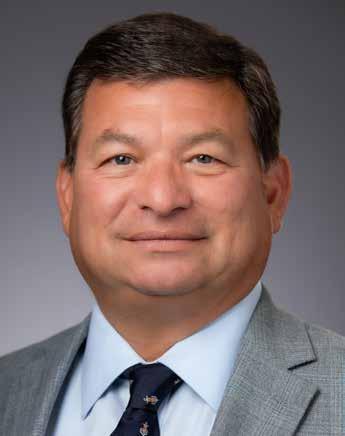
cut through? How do you get the other ministries to focus on the subject?
Julien Johnson: I guess I feel like we’ve had that.
Sharon Flax-Brutus: It seems that the only way that you can get there is to have someone at the highest level, which is the premier, be somebody who knows the industry. To me, that’s about the only way.
Julien Johnson: Well, know the industry but also accepts what he or she doesn’t know, but understands the importance of the industry.
Sharon Flax-Brutus: Exactly. But again, we can’t seem to find the answer.
Clyde Lettsome: Tourism is located in the highest office of government: in the Premier’s Office. The premier is the minister with responsibility for tourism. What does the premier understand? The premier says he understands financial services — but he doesn’t understand it. But it brings some money, and so whenever it catches a cold, you rush to make sure it’s all right because you want the money to come. What else do they understand? They understand cruise tourism. It brings a point source of funds; it pays for something out here somewhere. So if something goes wrong, we have to protect that. So they rush. And we saw them do some wonderful things for the cruise sector during the pandemic that only barely trickled down to the overnight sector. We have to get to the point. It’s not necessarily a Ministry of Tourism. We already have that. You have a Ministry of Tourism, and the premier is that minister of tourism. Granted, he has other subjects: It’s true. We have to get to the point where we are able to show the point source of funding — not to the premier necessarily, but to the public. I don’t think the public understand what tourism does for the public. Perhaps what we need is a campaign in the public, and then they will push their representative and the minister.
Russell Harrigan: I am old enough to have worked with several ministers of tourism. [Late former Chief Minister H. Lavity] Stoutt comes to mind. It functioned when he was there. Why is it not functioning now? It’s not like we’ve not had ministers of tourism that knew what to do. And I’m going to go back to Mr. Stoutt because he’s less controversial. He knew what to do. He got it done. The charter yacht strategy: He recognised that yachting was of huge importance to us. And he recognised there were lots of problems. He got up and said, “Look, we need to find a way to create an advantage and make the BVI yachtsmenfriendly for years to come.” He did it. He understood that we needed some investors into the country. He said, “Go out and find them; bring them in. Let’s talk to them. Let’s see how we can get things done.” So why is it that we have lost that?
Maritha Keil: I just think that there’s been a huge need for BVIslanders and their families to deepen their ownership of vacation villas. And politicians are supported by their constituents. They’re saying, “Look, help us get our homes rented; help us to get our properties managed; and help us to expand our share of the pie as stakeholders and not have it all be expatriated to other places or other peoples.” It’s been a big push, I feel, in the last 10 years the push to create Tortola self-run and self-governed and self-owned, which is good. Though I don’t understand why the marine industry was treated so horribly. Yes, they needed to follow the rules like everyone else. Maybe it was about bringing money into the treasury. But the slowness of processing things really hurt our marine industry. [The industry] was a big pull. In the vacation villa rentals, we have a lot of people that want to come for a few days and then go sailing — or go back to a house and then go back on a boat. When I came here some forty years ago, I didn’t know anything. I lived in Los Angeles and there was no Google; there was no internet. So I went to the library. I said, “What is the British Virgin Islands?” And I found a little book. In that book — I still have it — the BVI was the marine place to go. If you were a sailor, if you were a boater, this was the place to come. Last year, I had a client come up to me and say, “You know, I found the BVI for sailing, and it was the top-kept secret of all the top sailing destinations of the world.” This was the second sailing capital of the world
besides the Mediterranean. We need to keep that and still protect our marine resources and not have so many boats. We did get overkill with the boats. So it would be nice to control it. It would be nice to build it back up again. But we’ve got to make it easy for the boaters to come back here. And I want to say something for the island of Jost Van Dyke. That island depends on people coming and going from St. John and the wider USVI. They live off the people that come to the USVI and come over as day-trippers. I heard from someone recently that they’re tacking on a new charge on to the people that want to come to go to Jost Van Dyke. And they’re going to stop going.
Russell Harrigan: I hope it’s dead on arrival.
Sharon Flax-Brutus: When we were at the Tourist Board, I think they’ve used, Russell, our idea of having a one-stop shop. They’ve taken that and they’ve put a very interesting spin on it to charge the day-trippers. So instead of it being $16 per passenger per day, it purportedly is now to be anywhere between $60 and $90 added to someone coming in for the day. What does that do to the day-tripper market into Jost Van Dyke and their economy? What does it do to the daytripper market in Virgin Gorda? And to the day-tripper market once a week that used to go to Anegada? I don’t know where the questions were asked or if anyone did a deep-dive analysis to see, “Okay, you may be getting an extra $50, but what is the spend in the local economy in terms of taxis, tours and restaurants and T-shirt sales, etcetera?” It adds up plus it supports employment.
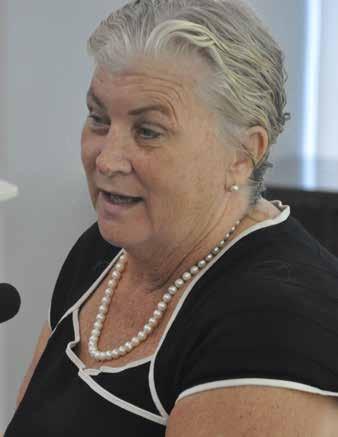
Clyde Lettsome: We’re pricing ourselves out of the market.
Raul Bermudez: I have a different opinion on the daytrippers. Two questions. What are they providing except [business] for the restaurants and the bars? When I go to Jost Van Dyke, I try to avoid that. That’s the one thing I hate. When the pandemic happened, it was beautiful not to see all these powerboats with all the ill behaved disrupting our beautiful quiet sailing vacation. I think many years ago, there were numbers put together detailing what an average visitor produces for the country. Think about yachting: the taxi drivers, the provisioning store, the liquor sales, plus all the cruising taxes and all those other things. I think that customer produces a lot more of the revenue and improvement for the people in the territory than any daytripper any day. So I’m not a big fan of day-trippers.
Sharon Flax-Brutus: But I think what we need to recognise as well — and I tend to try to take a full view — is that we tend to be very Tortola-centric in our thinking at the government level and sometimes even at the tourism level if there’s not somebody from Virgin Gorda, Jost Van Dyke or Anegada in the conversation. While the day-tripper may be a challenge to a certain tourism sector, [losing them] can spell the death of a particular island and their economy. What really needs to happen is that we need to be able to find a balance in our decision-making. It also involves looking at infrastructure to support the different sectors of tourism. We must find the money to sort out what would make the vacation experience for the overnight visitor: their arrival at the dock or their arrival at the airport. I spoke to a lady yesterday: The boat had less than a hundred people on it, and it took her an hour
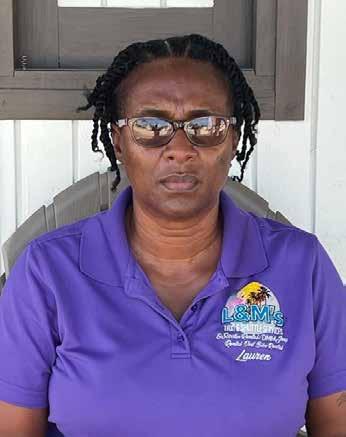
and forty minutes at Road Town from the time the boat docked to her getting on the outside.
Russell Harrigan: Why should that happen? They process arriving visitors and nationals every day.
Julien Johnson: But Russell, just to come back to your initial point about the Ministry of Tourism: All of this boils down to leadership. The reason why we’re still having these discussions twenty, thirty years on all boils down to leadership. The Customs does not report to themselves: Customs reports to somebody. Immigration reports to somebody. Shipping Registry reports to somebody. Everybody has a boss. Yes, somebody loves the day-trippers, but they’re somebody’s thorn in the side. All these things need to be discussed. It takes leadership to set those things up. You need a premier that is interested in tourism. You need a strong [permanent secretary] that is tourism-focused; that can bring all the players together: somebody who’s empowered to tell Customs or Immigration — whoever is acting up or doing things that are not in the best national interest of tourism — “You need to pump the brakes. This affects all of us.”
Raul Bermudez: A group like this was put together and put under the premier.
Julien Johnson: It happens every other week.
Sharon Flax-Brutus: It happened less than two months ago, and we have yet to even see the minutes.
Julien Johnson: Because there’s nobody in government driving these issues. We all have good meetings and everybody shares thoughts, but nothing happens after that.
Andrew Ball: This is the thing. It doesn’t have to be the premier. It doesn’t have to be the Permanent Secretary. They have to do the driving, but there has to be somebody or some department within that office at the highest level that is analysing this and giving advice to the benefit of the Premier’s Office, not to the benefit of a different department or a specific sub-sector. An entity that is looking at this general picture as a whole and saying, “Look, this is my area; you have to weigh this in with all these other economic areas and what you’ve got to do, but in terms of tourism, this is where you need to go.” And the Premier’s Office needs to trust that advice and act on it once it’s weighed in with everything else. That’s the thing I see that’s missing.
Julien Johnson: And they need to have teeth. They need to have teeth to tell other agencies, “We understand you have a job to do; we understand that you’re trying to follow the letter of the law, but this has big implications that need to be addressed at our level.”
Andrew Ball: The hardest part for that here, I think, is although our tourism industry mirrors a lot of other tourism industries, it’s unique in a lot of ways as well. To find entities that can understand all those pieces and put them together — and then find somebody that’s actually willing to do that job with that skill — is incredibly difficult.
Russell Harrigan: I want to say, though, it’s not brain surgery. We’ve done it before repeatedly. We seem to have gotten to a place now where we are seem to be incapable of doing it. We’re not trying to put a man on Mars here. We’re trying to run an industry that is critical to our livelihood. I want to segue a little bit. We talked about access a while ago. If you noticed over the pandemic period in particular, there was substantial investment in other islands: properties being built; new additions to their infrastructure. Have we as a territory lost our attractiveness in terms of attracting investors to the BVI? The last major properties that were built here were Oil Nut Bay, Scrub Island Resort, The
Moorings expansion, and MarineMax coming to the destination. And they were all probably [started about] 15 to 20 years ago. Is it that we don’t need investors? Or is it that we’ve become unattractive to investors?
Andrew Ball: I think we’re in an entirely reactive state. We talked about a plan earlier, right? In the absence of knowing where we want to go, how can we possibly tell people where we intend to go? If you’re going to invest in something, you want to know what you’re buying. Otherwise, it’s just a guess.
Clyde Lettsome: We have become very anti-investor here in the BVI. I’ve come to this same room with all of the major investors in the BVI in the recent past during the pandemic to meet with the then premier. First of all, the disrespect was so off-putting. We sat here for two and a half hours waiting for him when he chose to show up. He set the time for the meeting. You had major investors begging for basic services to allow them to run their business, to allow them to continue to keep the staff that have become more a family than just staff. And the government did not show any particular concern. In fact, it was more, “We really don’t want to see you. Why are you here? You’re wasting my time. I have other things to do.” So, first of all, we have to decide: Do we really want investors in the BVI? We have to understand that whatever status we decide we want to eventually move to, we’re still going to need foreign direct investment to help our economy along if we care about having a thriving economy and the quality of life of the people of the territory. We have to be far more investor friendly.
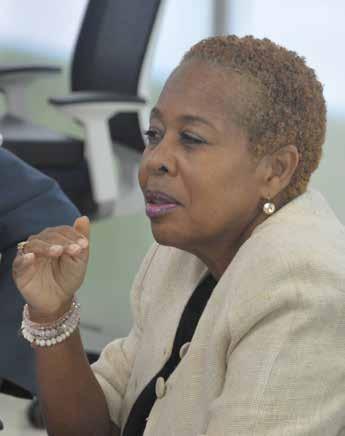
Russell Harrigan: Why is this so difficult?
Clyde Lettsome: What is difficult is the way the government thinks of investors. They want their money, but they don’t want them here. That is the problem. Unless you address that, we are always going to be in the position we’re in, because let’s face the fact: As I said, we need the foreign direct investment. We do. Whether you like the individuals or not, they’re your investors. They’re bringing something significant to your economic table. We have to respect that.
Julien Johnson: I think there’s so many opportunities that are lost beyond the investment. We struggle with so many things in this country: Education is a massive one; health; solid waste. I drive past Manuel Reef every day. You’d think the hurricane was last month given the number of abandon vessels. We do a jeep tour, and every time I drive by I feel that I need to explain what’s going on here. And at the dump, I’m still saying, “Well, we had a hurricane.” I’m not saying you have to give the country away or you have to bend over backward. But build stronger relationships, because there’s so much synergies. There’s so much assistance that a lot of these people would [provide] if you had a proper plan for education and said, “We know we have challenges in this area.” It leads back to all the things that we’re talking about: customer services, hiring, work permits. All these things are issues because our local population pool is not sufficient. If you laid out proper plans for all these areas and went to investors and said, “This is where we need your help, whether it’s money, whether it’s access to teacher programmes to help us build up our teachers, help us to build up on whatever.” There’s so many opportunities that are being wasted because [of] these [poor] relationships with these people who are wealthy and care about things: care about the environment, care about young people. If those relationships were better, it could be such a better working relationship,
Maritha Keil: I think it’s a fear of losing control.
Julien Johnson: Yeah, but to me, that is an immaturity of leadership if you’re worried about losing control of your country. It’s your country. You’re the boss.
Sharon Flax-Brutus: At the end of the day, if you’re saying that you really want to help your people, there are different ways to help. Sometimes helping means getting out of your own way. That’s what I’m seeing. For example I understand that during the pandemic a philanthropist was willing to put a million dollars into Virgin Gorda, and our government said, “Give us the money and we will
sort it out.” And the philanthropist said, “I will bring in people to train. Tell me what equipment you need; I would put it in.” And we never got from point A to point B. We still have a [healthcare] facility [on Virgin Gorda] that affects tourism as well. If you have a challenge and somebody’s having a heart problem or whatever, they still can’t be serviced on Virgin Gorda. You have to try to find a way to get them over to Tortola.
Russell Harrigan: On the yachting side, a key driver of our tourism, we seem to have lost our way. Are we losing our dominance in the yachting space that has been known as one of the BVI’s differential advantages in tourism? And what needs to be done to regain our footing?
Andrew Ball: Again, I think it’s really an issue of an understanding between the public and private sectors. The two sides are almost speaking two different languages. There seems to be an unwillingness to build a bridge, at least on one side. I think we are in some ways losing our competitive edge. We still have a robust product here, but it’s not what it used to be. Anybody that would argue with that, I would say, “Go Google ‘yachting capital of the world.’” That’s something that we’ve actually been fairly proactive in marketing, but you have to come to the third or fourth page in Google, which is a fairly simple measure. Some of that just comes down to more effective marketing and understanding what we’re actually selling. But the other side is the competitive edge. It feels like the industry has just been left to run free, but with no real oversight or direction as to where we want to go. Each
of the sub-sectors has built its own product, but there’s been no sort of national thought about what we want to grow, what we don’t want to grow, how that all fits together, and how we want to direct things. Again, I think what we really need is a bit more of a helicopter view, and just to be able to sit back and look and say, “Okay, hang on. Here are all the seeds we have. What do we want to water? What do we want to trim back? How do we want to arrange things?”
Russell Harrigan: Raul any additional thoughts on this question?
Raul Bermudez: I think Andrew’s right about the marketing piece of it: marketing the BVI as a sailing capital of the world. Access to the BVI is not easy at all. Most people have to spend their money in Puerto Rico or St. Thomas. It’s gotten very expensive to fly to the BVI. Plus all of the government imposed restrictions. I think Andrew’s right: No one’s really listening, so everybody’s out on their own doing whatever they can to survive. There are other alternatives. There is a bunch of charter companies that operate from the USVI. Other destinations are also growing. The Bahamas has started to expand and if it wasn’t for the hurricane, that place would probably explode, because it’s easier to get to and at a lower cost. I think these are probably the three biggest areas of challenge: marketing, access, costs. And yes coupled with all the regulations. I’ll give you an example. A brand-new boat that goes into the charter fleet sits on the dock for about 45
to 60 days — not producing revenue — to go through all the hoops, to get all the paperwork. Of course, we always do the paperwork; we do everything by the rules. It’s becoming more and more difficult to do that. Then the other thing that I mentioned earlier: having the right support. These boats are getting a little more complicated with every build, and we’re actually training people: We bring them up here to Florida to make sure they know how to deal with all these new systems. But the labour force and training is another big issue.
Russell Harrigan: I want to segue to labour and the human-resource element of our tourism, because I think it’s perhaps one of the largest impediments to us reclaiming a top tier position. We have a new minister of labour. What pearls of wisdom would you like to share with him in terms of the top three moves he should be making specific to tourism?
Andrew Ball: Simplify the process internally and externally. Our big issue is processing applications in a timely manner. I think the safeguards that we’re looking for are fairly basic. On the immigration side, we don’t want to import criminals. On the labour side, we don’t want people taking away jobs from the people of the territory; that could otherwise be employed in their own home. That doesn’t seem that difficult to satisfy. I’m sure digitizing the process could help too. I know there are some concerns about keeping [public officers] employed, but perhaps if we went from administrating to regulating, those people could be more effective in their purpose. It seems right now we’re very focused on just pushing paper around. But if you look at that process from beginning to end, how long does it really take to satisfy the objectives of getting a permit approved? The other side is we need to focus a little bit more on capacity-building. The college has done a great job with that on the marine side. They actually took the time to design that programme based on what the industry told them they needed. That’s starting to pay dividends now. But they’ve had various hurdles in terms of funding and being able to continue to run the programme. I don’t think that the tourism industry should be asking to cut the [work-permit] line. I think this is an issue that goes beyond tourism. It hits all the other sectors as well, although I know there are some sectors that somehow managed to have an expedited process. Over the years, we’ve had problems, and we’ve addressed those problems — and this applies to all levels of bureaucracy — by putting band-aids on top of things. But no-one has taken the time in a lot of these processes to step back and say, “Okay, what are we actually trying to achieve? What have we learned? Let’s reform the process so it is a simple ABC process instead of A to Z.” The underlying structure is just so covered in band-aids that it’s just not effective anymore. It’s too bulky.
Russell Harrigan: Other thoughts?
Julien Johnson: As with everything else, it’s all about efficiency. We’ve been doing things the same way for far too long — with all the innovations and technology and new ways to pay for things and ways to do things online and ways to do things instantly. Even just renewals of permits, there’s so much productivity lost. I only have one person on a work permit, but I can only imagine companies that have several employees that have to go into Immigration and Labour and spend a whole day there waiting. A lot of productivity is lost. There’s no reason why in this day and age after doing it for so long, it shouldn’t be a more efficient process.
Raul Bermudez: I go through that process every year, because we follow the rules. It drives me insane to waste that time for a renewal. It’s nuts. It’s absolutely crazy.
Russell Harrigan: Andrew mentioned an expedited system that’s used on the financial services side. Why can’t the same apply to the tourism side? It’s expedited, yes, and they pay for getting it quickly. So why can’t that lesson be used?
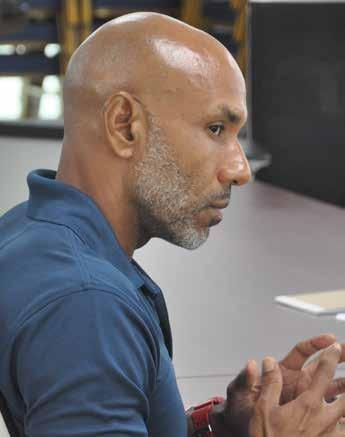
Andrew Ball: The other side is: For that expedited process, are we skipping steps in the regular process? In which case, why do we need those steps to begin with? And if we’re not, then that’s just cutting people to the front of the line, which still slows everything down. There’s still a capacity issue.
Clyde Lettsome: In my view, part of the issue is it is just paper moving across a desk. They have no idea the suffering they’re causing. We have to get to the point where we realise we’re dealing with people, we’re dealing with families, we’re dealing with people’s livelihood, we are dealing with our economy, etcetera. There must be a mechanism where some things could be more efficiently managed in the process. On Virgin Gorda, the whole system is now a nightmare because for the last two, three years, nobody has thought to replace the senior officer on Virgin Gorda who used to sign for Virgin Gorda and Anegada.
Maritha Keil: It sounds like we’re saying it’s a lot of inefficiency. Is there a department that could maybe be created that’s an efficiency department that goes around and analyses these different things to help them become more efficient? Could we maybe push for something like that in government?
Sharon Flax-Brutus: To just put it bluntly, who is really responsible for these departments and the civil service? Who’s really responsible for them? It is not, in my opinion, supposed to be the minister. The deputy governor, in my opinion, needs to do his job as well. There are things happening in certain government departments about which he doesn’t have a clue. When you call about something, he bounces it to the minister. Then when you call the minister, the minister tells you, “Well, I’m not responsible for that: That’s the deputy governor.” When it comes to Labour, I honestly believe that we need to have specialised staff dealing with tourism matters. Again, we’re only talking about Tortola and Virgin Gorda. You have somebody from Anegada or Jost Van Dyke needing to sort out a permit — or even something as simple as a liquor licence or whatever — they have to get on a boat, they come over, and then if somebody’s sick or late they go back to their islands with nothing happening.
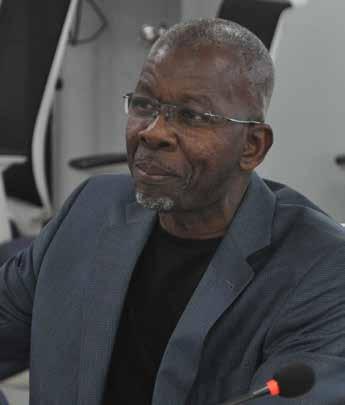
Lauren Creque: I’m glad you said that, Sharon, because many days a lot of us have to go through that problem. You go to Tortola to do government business, and you have to come right back to Anegada and have to try to make a next appointment to go back. That is a fact, a sad fact.
Sharon Flax-Brutus: I think that the persons working in the civil service really must be more engaged, concerned and caring about what happens to tourism in the territory, which accounts for more than half our the local economy. For those of us in the industry, if our yachts doesn’t go out, you don’t get paid. If that room doesn’t get filled, either you don’t get a commission, your housekeepers don’t work, car rental agencies have no business and restaurant see no customers. Local investors are also left without incomes. There is no backup public system to help those people. Let’s face it: We went through the pandemic, and who got the stimulus? The hospitality workers and the hospitality businesses, for the most part, didn’t get and they were the ones who really, really needed it. So our people who are running government and department heads need to come out and see what’s happening with the industry. We need to put them in the line in Immigration, rather than they call ahead and say, “I’m coming,” and they are pulled to the front of the line and leave our guests and others are waiting. The days of sitting in offices making decisions for an industry without any idea of what’s going on the ground are over.
Clyde Lettsome: I want to just go back to something Sharon said about the minister, deputy governor, what have you. The deputy governor is supposed to be responsible for the civil service. In the last Constitution we negotiated, somehow there’s a line in there that says the minister is responsible for the administration of his ministry. Because that is there, suddenly we see the governor’s side kind of pulling away from being as involved as they used to be. They used to be involved at one point in time, but now they just don’t feel
that the Constitution empowers them. I just wanted to clarify that. But the other side is: The ministry sets the policy, and a lot of these procedures are just because of policy. So it’s not necessarily just a case of the public servant being efficient or inefficient. It’s a case of the process being inefficient, which is set by the minister.
Lauren Creque: I’ve always asked [the ministers] when they come to Anegada, “Don’t go with the district officers; get a taxi driver.” I’ve had many opportunities to carry them around. When I tell them that we are going on the backroad — Sharon, you know that backroad ain’t easy — they just say, “No, no, no, no, we don’t want to go there, because we have to go back.” But I say, “This is the experience that guests have to go through on a daily basis.” And I say, “When it rains, it’s the worst part of the road. I need to carry you there.” They say no, they don’t want to do that. But they’re quick to tell us what to do and what not to do.
Julien Johnson: Under the matter of government efficiency and processes: To me, it all boils down to leadership. If the government leadership doesn’t think it’s an issue, it’ll never get fixed. If the government leadership accepts that the public service is inefficient, then the next step is you need somebody external to look at these things. The department heads that have been doing this for years are too close to the elephant; they’re not going to see the wrinkles. They’re not going to see the big picture. You need an external agency: That’s what they do. They look at processes, they understand what you’re trying to get to and ask the questions: “Well, why are you doing this? Why is this step necessary? Why we still doing this? Bring in technology.” That needs to be done by an external consultant that is trained to look at those things — and a consultant that
has the teeth to say, “This is the new way; this is how we’re doing it.”
Russell Harrigan: One of the things I find on the tourism side is that there seems to be no ownership. I cannot sit here and let the conversation go on and not recall when I was directly involved in tourism. If the garbage didn’t get collected, “Call Tourist Board.” You as Tourist Board had to figure out why the garbage wasn’t moved. You call the minister of health or you call somebody and ask them, “Well, why is garbage in Cane Garden Bay overflowing?” But now it seems like there’s nobody to call. There’s no ownership.
Julien Johnson: I know you probably just used that as an example, but it’s a true example. Isn’t it sad that we’re in that state, where something as simple as garbage being picked up is still an issue? Something as simple as the side of the roads being kept clean and trimmed, so that when you’re driving you’re not scratching up your car or getting into dangerous situations. Something as simple as that just doesn’t happen.
Sharon Flax-Brutus: It’s ownership, and it comes down as well to pride. Also, we have a lot of persons who are in management and supposedly leadership positions who are afraid of their own shadows. They will second-guess themselves all day and not make a decision. I tend to hear a lot, “Well, it’s not really my job, and you need to leave people to do their jobs.” And I said, “What happens when persons are not doing their jobs? What happens then?”
Julien Johnson: We’ve had instances at West End, for example, where Customs or Immigration — somebody simply hasn’t shown up for work or somebody has gone for lunch. And because that one person isn’t there, effectively the border is closed. Because no one from Immigration is there to do their job, nobody can come in or come out. And nothing happens. Yes, you call the chief immigration officer, and he says, “Oh, that shouldn’t be,” and he makes a few calls. But next week, that person isn’t there again.
Sharon Flax-Brutus: And nothing happens. Unfortunately, that is the challenge that we have with a lot of things. When I have to have the garbage guy in Virgin Gorda say, “Sharon, you know, I really miss you. I didn’t know a ship were coming today.” So what do I do now? I send them the cruise ship schedule when I get it every month, so he makes sure and picks up the garbage. Or I still send a message to the police station to say, “Look, there are three ships in today; the schoolchildren are there: You need to have your guys on the road.”
Clyde Lettsome: We used to do that, Sharon, until we got burnt. You send people out when you are the head of the agency and you say, “Clean up” and what-not. Then we came to the formality of “Nobody moves without a purchase order.” We have shot ourselves in the foot. Things that worked very well at the basic community level can’t work anymore because we’ve formalised the system.
Russell Harrigan: Globally, are there spaces that as a destination we need to be looking at in terms of finding new customers? Are there any markets in the world that where there’s potential opportunity? I think the last time we did anything in terms of expansion of our marketplace presence was in Brazil, which was probably 10 or 15 years ago.
Raul Bermudez: On the yachting side, it’s really, first of all, make sure you deliver what you say you’re going to deliver. But it’s got to be easier to get here. There’s so many other beautiful destinations. You look at the number of Americans going to the Mediterranean. It’s a long trip. How do we get more Americans here?
Maritha Keil: I think right now, because we’ve just gone through Irma and the pandemic and everything else, we have to really promote the resources that we have, which are these beautiful islands and beautiful beaches — and the ease of travel between island to island. But we have to make it easy, like everyone’s saying, to get here. It sounds like that’s a number-one goal. I’m listening to this whole conversation. We’ve got to make it easy to get in, and then welcoming
Andrew Ball: We’ve got to improve the access, and then we’ve got some serious public relations work to do. We’ve got to get out there and tell the market, “Hey, actually, we are tourism friendly. Look at the changes we’ve made. This demonstrates our change in attitude rather than us just throwing hot air at you. Come and see what we have to offer. We’re back to basics.”
Sharon Flax-Brutus: I still think there’s untapped potential in the Canadian market. Right now, I don’t think we do enough marketing in the Canadian market. At the end of the day, yes, it’s tough to get here. I hear all the arguments about air access. But we still have to do something in the interim. We still have to work with what we have in a targeted way. Are we having conversations with the existing air carriers that come into the destination? Are we having the conversations with the carriers that are going into St. Thomas and St. Maarten, etcetera? Maybe those conversations are being had, but I know that the majority of the industry who are bringing the guests into the destination are not necessarily privy to these conversations. So while we may not want to look at new markets, it bears having the conversation. Trust me: The other destinations in our competitive set are going to beat us to those markets. In fact, they’re doing so now. A few months ago, I was quite devastated when the former partner who did our marketing and public relations for the BVI in France sent me a note to say, “I’ll always be committed to the BVI, but, Sharon, I thought you should know that I’m now representing Antigua.” I got a note from Dominica saying, “One of the agencies that worked with BVI in the past, they’re now doing our public relations.” So as a destination we have been the trendsetter and the pacesetter. [Now other destinations are] beating us at our game with our marketing plans, and whose clients are they going after? Yes, they’re going after new clients. But they’re also going after our clients. You also have destinations that didn’t focus on luxury; didn’t have luxury hotels. Some had a bit of yachting, but we’ve given them an opening. For ’23, these are things that we must somehow get our tourism people who are in government to look at seriously, and not cannibalise the budget of the Tourist Board.
Julien Johnson: My final comment would be that the government needs to understand that the private sector has to be involved every step of the way. It can’t be a one-off meeting with the premier. It needs to be ongoing, the same way they do it in financial services: Every step you make, you consult the industry. Every change in policy should be discussed with the industry, so that you get the full perspective of how it’s going to affect things.
Russell Harrigan: I want to end by thanking all of you for coming. Basically, what I’m hearing is: It’s back to basics. We are not trying to put a man on the Moon here. God has granted us some great assets, naturally and otherwise. It’s for us to go and merchandise them to the world. But we seem to have lost our way. BB



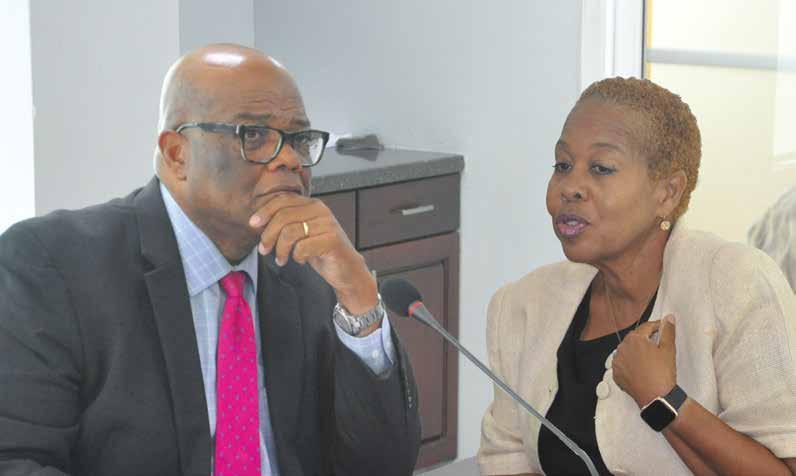
For this most important focus group, we followed our mantra of seeking out some of the sharpest minds and freshest thinkers, with deep in the weeds knowledge of marketing luxury travel. We sought panelists with a granular understanding of brand BVI and what differentiates it in the luxury travel space. I am most pleased to say, we were not disappointed. This panel confidently stepped up to the plate and delivered a thoughtful and incisive discussion about the BVI attractiveness in luxury travel, what is required to remain competitive and responsive to clientele in the space, given the constantly evolving trends shaping this key market segment.
When Laurance S. Rockefeller opened Little Dix Bay Hotel, now Rosewood Little Dix Bay on Virgin Gorda in 1964, he did more than just start the shift of the BVI from a subsistence farming economy to one driven by tourism. What might not have been as obvious at the time was, given the clientele that the resort attracted - the then so called well heeled, he firmly cemented the DNA of the tourism product of the BVI, in what would later emerge as a thriving and globally known destination. Enter brand BVI. That DNA could be traced to all of the other resorts, villas and small properties that to this day have followed in Little Dix’s wake. Five years later in 1969, this DNA was further entrenched when Charlie Cary established the Moorings with six yachts in Road Town, the formal birth of what would become an even more globally defining product for the BVI, yachting. Today, that well heeled market segment has morphed into the global market segment - Luxury Travel, the pond in which we as a destination cast our global tourism net. Joined at the hips, these two niches have established like a duck to water, the essence of the destination - barefoot elegance.
Next to the careful and sustained management of our tourism product, a constant, deep and evolving knowledge and understanding of the luxury travel segment is critical to the success of our tourism sector. And to those who earn their daily keep in the space and by extension, the health and strength of our economy. Over the last decade, many destinations regionally and globally have deliberately and strategically moved in the direction of the DNA of the BVI product, with its discerning boutique attributes. They are driven by the potential for a greater return from their tourism investment. Hence, the battle to attract the luxury travel segment has become intensely competitive. For this reason we have decided to conduct a separate tourism focus group to discuss the trends shaping luxury travel globally, to thus better understand how the BVI as a small destination in the space, must recalibrate its positioning and marketing strategy for continued success. Our quality of life depends on us being nimble. Our interrogation of the panelists covered the following areas among others:
i. Who are we talking about when we say luxury travel
iii. Millennials
iii. We are clearly looking at a sustained period of turbulence and uncertainty
iv. Is the turbulence in the world affecting property sales and people willing to build
and invest in second homes
v. How do you combat access challenges, whether by air or by sea, in terms of your marketing and sales and PR approach
vii. The visitor arrival experience
viii. Issues to be addressed at the national level
ix. People are still chomping at the bit travel
x. How do we ensure that we continue to be a top of mind destination with Millennials and the Boomers
xi. The cruise sector
xii. Destination branding: “Nature’s Little Secrets” versus “BVI Love.”
xiii. BVI competitive set.
These pull quotes provide a flavour of the discussion:
“Tolerance for turbulence”
“So I think turbulence is here to stay.”
“Being nimble and quick and having your plans ready to change — and have lots of ABCD plans — is really the new normal.”
“Money is not their greatest problem: Time is.”
“It’s something that fascinates me, the people who’ve made the effort to get to us.”
“Building on that, culinary is a key driver for that market, I think.”
“What kinds of adventure things are we offering? What kinds of cultural experiences do we have? What kinds of culinary offerings are there that’s going to appeal to the millennial tastes?”
“The one thing I would say — and I don’t want to offend anyone here — I do feel that the Tourist Board has taken its foot off the gas a little bit. Actually, they’ve taken their foot off the gas a lot over the last couple of years.”
“That’s where we’re beginning to see that increase in multigenerational families who are bringing their kids, their grandchildren. I’ve got a guest who will be coming to us this year: I believe it’s going to be her sixty-sixth stay. She’s ninety-six years old, and we have her, her children, her grandchildren, and her great-great grandchildren. It’s a beautiful thing.”
“The third point I’d make is that by 2030, thirty percent of the workforce will be Gen Z. Thirty percent of the workforce will be Gen Z in eight years. We’ve got to start now if we’re going to get them.”
“So that TikTok person is going to be our guest sooner than we think.”
“One of the big focuses of Rosewood Little Dix Bay since the pre-opening is really on how we geo-target and how we build a new age demographic.”
“Most of those are guests that we refer to as our legacy guests. They are guests that came to us
before the closure back in 2015. But now we’ve looked for that new luxury demographic of late thirties to late forties. And we’ve been seeing that shift, which is great.”
“And because we are also in the business of selling properties and constructing homes and villas, we are seeing a younger buyer. We have more and more people who want to be here longer term and actually run their businesses from Oil Nut Bay.”
“It’s just not the traditional marketing anymore. Yes, we still have to go to the boat shows and what have you. But a lot of it is going to be determined by what we do in cyberspace.”
“The way I look at luxury travel, our clientele always has money. What changes, however, is potentially length of stay; the time of year that they may come to the resort; potentially, on occasion, the amount of money that they spend on resort.”
“Generally for us, that’s when we tend to see our highest level of occupancy pick up: about 120 days out. But that has been changing. We have been seeing in-the-month-for-the-month bookings, which has never happened in Little Dix Bay’s history.”
“Another interesting thing that’s happening now, especially after this past spring and summer, is what they’ve coined “flightmares” and the uncertainty of knowing that when you book your flight you’re actually going to get to the place where you want to vacation.”
“They want to make sure that they’re getting on the flights that are direct. They’re less willing to bounce around and go onto different legs and take the chance that flights are going to be canceled while they’re en route to their vacations.”
“Jumping onto a helicopter is like getting a taxi for a lot of them.”
“Brad, what am I gonna do? Am I gonna be able to come? I’ve been waiting for five years.” It shows that the BVI is very, very, very special to people — especially if they’ve been before, because they realise the journey is worth it.”
“The other thing we must all remember is first impressions count. That arrival piece that we were just talking about — whether it’s a journey on a boat, whether it’s an airport experience, whatever it is — that first impression is vital.”
“The other thing is, we need to consider our aging boomers and how friendly we are for somebody who is starting to become a little bit more physically challenged. The BVI can be tough.”
“They know that they’ve got to please the grandchildren to get the whole family to go. The advisory board was saying to the cruise line, “Talk to the kids. That’s where you’ll get the business from.”
Russell Harrigan: Firstly, what do you consider as the luxury segment of the market? I mean the normal demographics and psychographics. Who are we talking about when we say luxury travel?
Tammy Peters: There are at least a couple of different layers. The two basic layers that I see are; you have aspirational and more mass-market luxury travel, and then you have the 0.05 percent luxury travel or the ultra luxury travel segment. For a quick example, difference would be a JW Marriott versus a Necker Island. Based on my experience dealing with some ultra-luxe clients, requires a very different marketing approach. The 0.05 per cent of the market is a lot more traditional than what you would have in a more massmarket luxury segment, where they are more influenced by advertising and more traditional mass-market ways of outreach. But with your celebrity and 0.05s, they’re really going to trust what their people are saying; what their high-end travel agents are saying; what an organisation like [membership-based luxury travel company] Indagare is saying. It’s a little bit more nuanced and a little bit more
insider than if you were looking at more basic luxury — the difference really between a room night rate of say $1,200 to $1,500 a night versus $10,000, $15,000, $20,000-plus a night. My look at luxury is always a lot more detailed and layered depending on the resort, the price point, the product, and the goals and aspirations of the property team.
Brad Simmons: We’re lucky. We’ve also worked very hard to get Rosewood Little Dix Bay into that very upper end of the luxury market. To Tammy’s point, we focus very much on that handholding with our high-end travel agencies. That’s a big part of what we do. One of the big focuses of Rosewood Little Dix Bay since the pre-opening is really on how we geo-target and how we build a new age demographic. We’ve been working on that very successfully with our digital marketing programme and [electronic direct mails], and our website presence and so forth. We’ve definitely seen that development of people booking through mobile, through our website. Then often for us is that follow-up: It’s that handholding acting as Sherpas after the reservation’s been made.
From a demographic standpoint, we’ve seen our age group shift a little bit. Historically, we’ve been very much the mid-fifties even through to the seventies. We certainly still see that segment of demographic coming into the resort. Most of those are guests that we refer to as our legacy guests. They are guests that came to us before the closure back in 2015. But now we’ve looked for that new luxury demographic of late thirties to late forties. And we’ve been seeing that shift, which is great. So we’re beginning to see the first-time traveler to Rosewood Little Dix Bay now rebook, which is exactly what we wanted. Likewise, from a geographical standpoint — I think Tammy would probably agree to this — a vast majority of our business comes out of the East Coast of the US. But what we have begun to see is a little shift. Florida, for example, is now beginning to come up to almost the same levels as our New York business. When we dive into that in a bit more detail, what we’re seeing is that a lot of that is guests that were based in New York and now relocated. That’s an interesting trend that we’re beginning to see unfold. And that’s not necessarily changed our strategy, but it has put a little bit more of a focus on seeing Florida as a key market. Likewise, we’ve seen increases in business coming out of Georgia and out of Texas. Not huge in terms of percentages, but certainly in terms of revenue and rate, we’re really seeing some very, very high-end guests coming out of those areas. Markets with potential. To give you an idea, that has been developed purely through our digital performance: our paid search campaigns, our social media advertising, the work that we’ve done through Facebook and Instagram, depending on the age demographic. So that’s some of the strategies, and what we’ve been seeing happening from a luxury standpoint for us.
Russell Harrigan: Clyde, I want you to weigh in here. Unlike Peter Island and Rosewood Little Dix Bay, with a substantial legacy business, what are you seeing? I’m sure you have some of that clientele, but are you also seeing a more millennial crowd, for example, coming to Oil Nut Bay?
Clyde Lettsome: We’re also seeing a shift in the clientele as you’re saying, Brad. We are seeing a younger clientele. We’re in the 35-to-65-year-old age range, but we’re seeing more people under 50. And because we are also in the business of selling properties and constructing homes and villas, we are seeing a younger buyer. We have more and more people who want to be here longer term and actually run their businesses from Oil Nut Bay. So what we’re having is a more technologically savvy group. As a result, they do expect us to engage them very well on social media. To that end, we have created a quite engaging and interactive website, where our guests, our homeowners can really go in and discover things for themselves. They can also make certain suggestions as to the types of information they want. We’re quite open to making it as easy as possible for them to get to know the property. Now, once they get to the property, at this level they are very demanding. They are used to having what they want when they want it. The word that must never be said to them is “no” or “that is not possible.” They’re not used to that. So we have to ensure
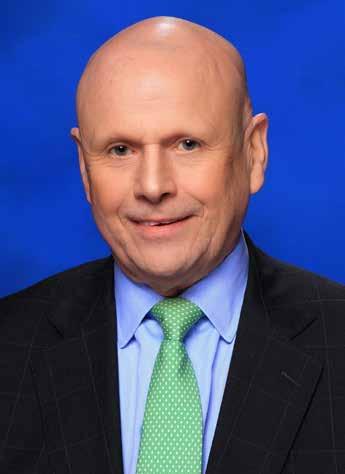
that we also have a staff complement that understands the shifting needs. If they don’t, we’d probably end up with some bad reviews, and then the word of mouth could become damaging to us. And costly to address. We have not ignored the role of influencers: people who have large Instagram or Facebook or LinkedIn followings. We have also used those people to assist us with getting the word out. I think we’re moving to a far more electronic age in terms of the whole marketing ethos. It’s just not the traditional marketing anymore. Yes, we still have to go to the boat shows and what have you. But a lot of it is going to be determined by what we do in cyberspace.
Russell Harrigan: Let’s jump in head first at the global level. There is a lot going on. We are clearly looking at a sustained period of turbulence and uncertainty. Some people are saying it’s the end of globalisation or deglobalisation. We have the war in Ukraine; the related sanctions against Russia. There’s a deepening schism between the United States and China. We see generational inflation going through the roof, like we have not seen since the early eighties. There are supplychain disruptions, and worst of all it seems every day you hear more and more about an imminent downturn in the economy. Against this backdrop, what is the current outlook for the luxury space? Is this turbulence currently affecting business? Does it have the potential to affect business if it continues for some time, which seems to be the thinking: that it will continue into another year or 18 months or even beyond that. Please, each of you weigh in and share your thoughts.
Brad Simmons: It’s a big question. I wish we all had our crystal balls, especially as I’m sure we’re all going through budget season, and we’re all looking at next year and pace and so forth. I tend to be a glass-half-full kind of person. Ultimately, there’s always something going on in the world. I do believe in terms of the pandemic, we’re definitely through the worst of that now. The way I look at luxury travel, our clientele always has money. What changes, however, is potentially length of stay; the time of year that they may come to the resort; potentially, on occasion, the amount of money that they spend on resort. Just yesterday, I was having a conversation about our food-and-beverage and ancillary spend. Those things may change. What I don’t foresee is that it will affect us enough to have a complete downturn.
To give you an example, if we’re pacing behind — I guess we all do this: Tammy,
Clyde and so on — we will really look at what that response promotion looks like. We’re not changing rates: We look at what the promotion looks like; we look at our average day of arrivals and so forth. Then we may just open up a promotion, just to give that perception of value add. Or we’ll work with [travel service providers like] the Internovas or the Virtuosos or even our own consortium, Rosewood Elite, just to promote the added value in their credits and so forth. That’s how we overcome that challenge. What’s important for me is that we’re used to always looking at really a three-month window in terms of that booking window. Generally for us, that’s when we tend to see our highest level of occupancy pick up: about 120 days out. But that has been changing. We have been seeing in-the-month-for-the-month bookings, which has never happened in Little Dix Bay’s history. So what we’re having to do is really analyse this weekly, if not sometimes daily. We’re always continuously looking at it: looking at what our group base is like; making sure that if we’ve got great strong group base six months out, we then are looking to the right promotions to make our occupancy seventy, eighty percent. There is some concern. The downturn in the economy, the inflation: Those things have an effect on us in terms of the cost of running the hotel. Utilities: That’s having a big knock-on effect to our bottom line right now. But for us, it’s really making sure that we’re capturing the right guests at the right time and as far in advance as possible. That’s where our group strategy really comes into place.
Russell Harrigan: Tammy, obviously Peter Island is not back online as yet, but I’m sure the question still applies to your other clients that you can address in a very general way.
Tammy Peters: Absolutely. There are a couple thoughts on it. Since the beginning of the 2000s, I almost see 9/11 as being a benchmark. Because of technology and because of where we’re going in the world, the quickness and pace of change has accelerated. Our planning cycles have decreased. We used to do three- and five-year plans. Now maybe we do a year plan. But the year plan is sort of this rough outline, because everything changes from month to month now. I think the mantra is to be nimble, because we are in a constant state of change. I don’t know if that’s going to go away. I don’t know if the ongoing sustained turbulence, as you put it, is ever going to go away. I feel like the pandemic even accelerated that further, pushing us to have to be able to adapt quickly to different kinds of conditions. That
seems to be continuing now even though we have the pandemic ebbing. Now we have the economic situation and what’s happening globally affecting us every day, as well as the effects of climate change and the hurricanes that we see coming on. That’s always been happening, but they do seem to be happening more often. Some people question that, but I feel like weather conditions and things like that seem to be wreaking havoc more than ever. At the same time, I feel like the public is starting to adapt. Humans adapt, and there seems to be a tolerance for turbulence. And travel will stay a priority. Certainly, health threats are always going to hinder things, but economically I feel like the 0.05 [percent] are going to travel no matter what. For them, travel is like brushing your teeth: It’s just something that most of them do. Whereas your top one percent to five percent, they are going to be looking to maybe reducing the room nights; they are going to be more valueseeking. Maybe they’re not going to take five trips a year: Maybe they’re going to be taking three trips a year instead. They’re going to become a little bit more discriminating. So I think turbulence is here to stay. But the good news is I think that we as humans will adapt to it, and we will continue to evolve and fluctuate with it.
Another important thing to keep in mind: Even though our booking windows are decreasing — and that probably has a lot to do with the instant-gratification mentality that’s been cultivated more and more by technology — another interesting thing that’s happening now, especially after this past spring and summer, is what they’ve coined “flightmares” and the uncertainty of knowing that when you book your flight you’re actually going to get to the place where you want to vacation. The interesting thing that I saw from a study is while consumers are waiting until the last minute to book their hotel, they’re starting to consider booking their flights further in advance, especially if those flights have nocharge flexibilities and cancellation policies. They want to make sure that they’re getting on those more reliable flights. They want to make sure that they’re getting on the flights that are direct. They’re less willing to bounce around and go onto different legs and take the chance that flights are going to be canceled while they’re en route to their vacations. So it’s an interesting time. Being nimble and quick and having your plans ready to change — and have lots of ABCD plans — is really the new normal.
particularly from the standpoint which brings your unique angle to the equation. Is the turbulence in the world affecting property sales and people willing to build and invest in second homes?
Clyde Lettsome: We have always believed that if you build it, they will come. And they had been coming. Then you had recessions and then you had COVID and you have the volatility of exchange rates and high inflation and shipping and everything else. Now it is costing us so much to build per square foot that the numbers are almost prohibitive. So where we should have been engaged at the moment with about eight projects — because people do like the instant gratification — we have reduced that to about three. The good part about us is having an owner who flies solo: He could make changes on a dime if that is what the market is calling for, without any rigmarole in terms of board approval, board meetings, etcetera, etcetera. The most he’s going to have to contend with is the opinion of his executive team. Then there’s something else we’ve come to realise. As you said, Tammy, our clientele is always going to be on the move. Money is not their greatest problem: Time is. What we have seen is that given the uncertainties with air travel — especially what is happening with us to get our guests to BVI to the property — is a big turnoff. People are beginning to wonder, “Should I go to places it is easier to get to?” The problem is when they go to those places, a lot of the times they are not as happy and comfortable as they are with us. They want to be with us. But it can’t be visit at any discomfort, because they’re not used to that. The other thing we have seen for this group is even though they are very free and able to move around at whim and fancy, they still feel a certain amount of guilt about the fact that somewhere down the road somebody probably isn’t able to feed their children or not able to keep that roof over their heads. So we have noted that if we draw them into our philanthropic organisation, and they feel able to contribute to what they think is the greater good, the equation then begins to shift. They don’t feel as guilty. Then they come more often because they are being a part of improving the lot for others, and they don’t feel they’re just consuming for themselves.
Brad Simmons: With the amount of flight cancellations and the reduction in airlift this year, it amazes me how many guests we’ve still had come to the resort and to the region. It’s been kind of incredible. It’s been a bumper year. It just shows you that people who are willing to make the journey will make the journey whatever happens. I was just speaking to someone the other day who’s due to come in January, and his flights have been canceled twice already. He’s calling me kind of going, “Brad, what am I gonna do? Am I gonna be able to come? I’ve been waiting for five years.” It shows that the BVI is very, very, very special to people — especially if they’ve been before, because they realise the journey is worth it.
So if we can figure out the airlift issue, and if we can figure out not having so many cancellations, can you imagine really how successful the region could be? I know it’s not anyone’s fault, but it’s a very good point from Clyde. It’s something that fascinates me, the people who’ve made the effort to get to us.
of last-minute changes. We’re not going to charge a guest because their flight’s been canceled and they can’t get to us for another two days. That’s not their fault. So we try and show as much flexibility as possible. What we do, though: I would say a good 80 percent of our business, we touch that guest within 24 hours, 48 hours, of their reservation. Because they then want to talk to us about how best to get to the resort: the best route; what airlines to use; and so forth. So we’re doing a lot of that communication. One of the other biggest challenges that we have, Sharon, is really the amount of guests who want to fly through St. Thomas. In our SWOT analysis, we see that as a weakness because, number one, there’s the lack of transfers from St. Thomas to Tortola. We prefer people to come through Tortola because we facilitate that arrival to the resort. But also, the costs of private water taxis. Maybe I’m talking out of line, but they’ve been taking advantage in terms of cost. It’s hugely expensive. And it’s very hit or miss. Sometimes it works brilliantly, and they can get from St. Thomas to the resort within sixty minutes, maybe an hour and a quarter. Other times, it’s like a three-hour journey: The guests arrive, and they’re all kind of just... . We’re having to clean up that kind of mess. I don’t know how best to fix that. We’ve looked at opportunities to potentially facilitate that transfer, but that’s not an easy process for us to be able to do that. Ultimately, the only way that we deal with it right now is that we offer as much flexibility as we can. And we mention that to guests. We work with the guests ultimately from the moment they book — or even pre-booking — to help them with the flight logistics. That’s all we can do right now. I just hope that situation gets better for everyone.
Sharon Flax Brutus: Brad, there are some things that you mentioned, that certainly you can’t deal with. Some of those should be addressed at the national level. Clyde we want you to weigh in here also.
Sharon Flax Brutus: While we’re on that, Brad: Now that we’re starting to rebound and all of us are seeing that air access is a challenge, how do you foresee BVI moving forward? How do you combat those access challenges, whether by air or by sea, in terms of your marketing and sales and PR approach?
Brad Simmons: That’s a tough question. Ultimately, we don’t have any control over it. There’s nothing that we can do about airlift. I can tell you that we saw a lot of canceled revenue throughout the year because
Clyde Lettsome: Thank you for raising that particular issue. Our Achilles heel is airlift. Airlift has been a problem for us ever since American Eagle stopped all those flights; ever since they no longer hub in San Juan. So we’re going back years. We’ve had the opportunity to sort out our airlift issues, but we haven’t to date which is unfortunate. From the standpoint of Oil Nut Bay, one of the things we have done is we have two helipads at Oil Nut and we’ve gone through a certification process with [BVI aviation regulator Air Safety Support International] to ensure that we can have international flights come. I’m saying international flights, but it just means that the helicopter can leave St. Maarten or St. Thomas or San Juan or wherever it needs to leave and come directly to Oil Nut Bay, where then we could have Customs and Immigration deal with them right there on site. We’ve made a significant investment in that process. It has taken us some time. It has cost us some money. We’re constantly looking at ways to influence airlift. It’s not just sitting and waiting for whatever the government might or might not be doing. You raised the issue of the water taxis. Part of what is happening is the operators have taken what could have been a very scenic and nice experience and then it translates into not being so nice more often than not for the guests. I’m not sure how many of our partners out in the North Sound or other areas have at one point in time interacted with the seaplane group Tropic Ocean. Again, another group that should be able to fly out of San Juan or St. Thomas or even St. Croix if that became necessary. Again, they are tied up in some issues with government because there’s some other things they want to do in terms of interisland movement of guests. The point I’m making here is that I think in the business of airlift, to help our guests sometimes we’re going to have to [take initiative] a little bit because it doesn’t look promising from the government standpoint in terms of how our guests are going to come here. And the airlines are having a field day because it is their market.
Sharon Flax Brutus: Tammy, can you weigh in here? We recognised that air access to the BVI is one of the challenges of the destination. I’d like you to just briefly mention what you consider as two of the other major challenges that BVI tourism faces. And then, Peter welcome, you can then weigh in on those challenges as well as we start to drill a little further down as to how everything really affects the BVI as a destination.
Tammy Peters: To coattail a little bit on what Clyde was saying before, I feel like Peter Island has an advantage over the properties on Virgin Gorda because of its proximity by boat to St. Thomas. One of the advantages that we have is that we could pretty easily accommodate guests flying into St. Thomas and have a private boat transfer. The vacation really started on the water as soon as they land in St. Thomas and take the trip between St. Thomas and Peter Island. Of course, there were always issues with that. It can get pretty rough and undesirable with certain weather conditions. And the transfer from St. Thomas to Peter Island by boat was already cost-prohibitive for certain guests. Now with the higher cost of gas prices, it would become even more prohibitive. So that’s one piece. Another piece, which is just an observation overall with the luxury market, particularly that one percent and 0.05 percent luxury market: Jumping onto a helicopter is like getting a taxi for a lot of them. So I think it’s in the BVI’s best interest to be ahead of the curve and to be very nimble and quick and very welcoming of the private jet business. I’d be curious to see the statistics for increases in private jet landings at the airport in the BVI. I would bet that there’s been an uptick, especially the past 5 to 10 years. Then also becoming more open to helicopter travel. It’s just become such a standard here in the New York City market for people who don’t want to deal with the traffic time to jump in a helicopter. There’s a greater comfort level with that.
In terms of other challenges: It’s been a while since I’ve flown into the BVI, but I think one of the challenges is always trying to make the arrival experience more pleasant and quicker and smoother. It may be fine now: I haven’t been in the BVI since 2019, so I haven’t been able to sample it. But I do know that was often an issue. Just an ease with the whole arrival process, I think, is always helpful. And I think having an offering in the main towns of Virgin Gorda and in Tortola and really having some really good retail sightseeing, cultural opportunities; really cultivating the sights and attractions of the BVI in a way that’s accessible and promoting them more actively. So many of the Gen Z Generation and the Millennial Generation are not happy to sit on a beach. They’re terrified of skin cancer; they’re not interested in that. They want to go see; they want to go explore; they want to have an adventure; they want to have an experience. I think as a destination, it would behoove the BVI to get more aggressive about offering those kinds of experiences and making the ability to book those experiences easy and seamless.
Peter Bates: Going back to helicopters and private jets, that’s where everybody’s going. I think it’s a no-brainer and something we’ve really got to look at for the BVI and really encourage people to look at that option. There are so many options out there now, and the client is booking short-term and they’re booking long-term. They’re wanting to go tomorrow; they’re making up their minds booking for something next week, and they’re also planning a long way ahead. There are different segments in the market, as has just been mentioned. There are those who don’t want to sit on the beach, but there’s also the multigenerational family. What are we doing for them at the moment? How can we make them think more about the BVI? People are still exhausted from everything that happened around COVID. They want to get away, and they want relaxation. So that whole leisure market of being able to get away, enjoy some wellness, is really important to them at the moment. We should be really ratcheting that up, I think.
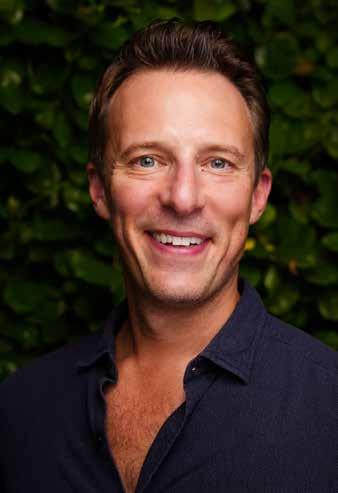
We’ve also got to make sure that the travel advisor knows the latest product offering. Because the travel advisor — we thought they’d all be gone by now, didn’t we, really? I mean, let’s be honest: Ten years ago, we said they would all be gone by now. Well, they haven’t. They’ve consolidated — they’ve
consolidated hugely — but they’re actually doing incredibly well and are incredibly busy. That’s because the client wants more hand-holding than ever before. They want to know that they’re really going to enjoy their time away. They want to know that the advisor has been there themselves and has seen it, so they can ask questions like “Will I like it? Will I enjoy it? Is it for me?” So the travel advisor has become very important again in this market. We should think about how we’re educating those luxury travel agents who are dealing with high-net-worth clients the whole time. I’m not talking about tour operators — different market completely. I’m talking about the luxury travel agent dealing with the [free independent traveler] clients. Sometimes we get a bit confused there. I think that’s what we’re really after: We’re after the luxury travel agent who’s dealing with many different trips for a client at one time. They’re booking a lot of trips: They may be going to Europe; they may be doing something festive. But they’re also looking for breaks as well. The one thing that we’ve really got to think about is this one stop. People want direct. They don’t want a hassle. That’s why, again, helicopters are important and things like that, because they want to know it’s going to be seamless. It’s really important. So many destinations in the Caribbean now have
great air service. Not as great as it was in 2019, but it’s coming back. The harder we make it to get there, the harder it is to convince people to choose that destination. The other thing we must all remember is first impressions count. That arrival piece that we were just talking about — whether it’s a journey on a boat, whether it’s an airport experience, whatever it is — that first impression is vital. That puts them in the mood. We’ve got to get that right. The amount of training that takes is vital to us all, because a happy client on arrival is very important to us.
developments that might take place to entertain or provide other activities for the guests. There are possibilities. There are some fine areas that can really make destinations. We just have not put any energy into it. I don’t know why. But while we all spend quite a bit of money bringing visitors to BVI, the reality is BVI does not belong to any individual. If it did, we would have it looking like our properties look. But because it is a collective, this is where we need the government to weigh in and to be real partners with us. Now, how do we make that happen? I suppose that’s what we’re talking about, because if we don’t, it is severely limiting our guests who want other experiences when they come.
Russell Harrigan: Let’s segue a little bit. Peter was saying that people are still very anxious to travel, which is a very good sign. People are still chomping at the bit to get out and to get to the Caribbean and by extension to the BVI, which I suppose speaks to the volumes of business that Brad spoke of earlier. Correct?
Peter Bates: Yes. Without a doubt. We hear about recession, we talk about interest rates and everything else, but the luxury component of the market is traveling, and they’re going to continue traveling next year.
Russell Harrigan: Let’s interrogate some two key market segments - the baby boomers and millennials. They are certainly joined at the hips in more ways than one for a destination like the BVI. The baby boomers clearly built us; and we are counting on the millennials to continue take us to the next level. But there’s some things we have to put in place. In terms of the luxury end of the market, how do you differentiate the two? What are the demands of each of those segments that we must be most conscious of? I think it was Brad that said earlier that our repeat visitors know the gold at the end of the rainbow. They’re going to put up with all the frustration because once they land on Virgin Gorda and they go to Little Dix, or Oil Nut, or some of Sharon’s villas, they’re going to be, “Ahh, it’s back to home.” But what about that first-time millennial who has not been here, who is accustomed to getting on a private jet or a direct flight and spending an hour or two getting to their destination? How do we ensure that we continue to be a top of mind destination with them?
Peter Bates: The one thing I would say about BVI is do we have the right product today? Yes, we’ve got Rosewood Little Dix Bay, we’ve got Oil Nut Bay, and a good portfolio of villas. But do we have enough of that quality product for this market we’re talking about: the luxury market? Do we promote our villas enough? Are we looking at the villa product in the right way? Looking at other islands in the Caribbean, I think they’re doing a better job of marketing their villas. The villa product is now a very important element that they are now looking for. So I would say the country needs to attract back another brand. We need new buzz stories; we need a big new quality product.
Sharon Flax Brutus: We’ve basically honed in on access to the destination, as well as the arrival experience. Mr. Lettsome, give us one more area that you see as a challenge to BVI tourism

Clyde Lettsome: A big challenge for us is the state of cleanliness of the BVI. The problem is, we need to get the BVI cleaned up. This is quite apart from any attractive
Tammy Peters: Wow, that’s a really loaded question. Sure, there are big differences between the boomers and the millennials. Some people will say, “Well, the millennials need good tech; they need to know that they’re going to get the WiFi.” But in truth, the boomers want that too. They’re staying in touch with their family and friends through Facebook. So you can’t really generalise. There are so many small niche markets within the boomer category, and there are so many niche markets within the millennial category. So it’s tough to say one thing or the other. But I think that two big differences are time and age. With the boomers, they have more time: They’re retired. With the millennials, we need to be sensitive with the private jets, with the helicopters: getting there sooner, being able to really make it a worthwhile stay within a block of three to five or six days, as opposed to 10 days to two weeks. That’s an important thing. The other thing is, we need to consider our aging boomers and how friendly we are for somebody who is starting to become a little bit more physically challenged. The BVI can be tough. The stairs going to certain accommodations can be many, or the hillside inclines and things like that. We have to think about those things.
To Peter’s point, we have to think about our villa products and how user-friendly are those villa products. From the millennial standpoint, I’m going to go back to my point about really marketing the destination to what the millennials are looking for. What kinds of adventure things are we offering? What kinds of cultural experiences do we have? What kinds of culinary offerings are there that’s going to appeal to the millennial tastes? Just offering a beach for them to sit on isn’t good. Even the boomers aren’t sitting on the beaches anymore. Their dermatologists have told them their days in the sun are over. We have to grow and evolve with that, and we have to be sensitive to the different niches within both age groups. A boomer in Texas or Wisconsin is probably going to be a lot different in what they’re looking for and what their expectations are versus a boomer in Los Angeles or New York City. I’m generalising, but there’s a grain of truth in that. So I think that’s important to remember as well.
Peter Bates: Building on that, culinary is a key driver for that market, I think. That’s something that we have to really look at: the culinary experience and what we can offer there. It’s really very important to this group.
Brad Simmons: There’s a few things from my perspective on this. In terms of the millennial aspect, a lot of that is still kind of to do with aspirational travel. We’ve seen an increase in our content being saved, especially our videography. People look at it and go, “Oh, this is something I really want to aspire to do,” and then put it to one side and then come back to it at the right point. There is an element of that in that millennial side of things. We of course also see that a lot of millennials want to share everything. They want to show people that “This is the holiday that I’m having.” And that is about the experiences. It’s not just about being on the resort: It’s about those moments at The Baths and going to these culinary destinations in the region: Saba Rock, CocoMaya; even going to Hog Heaven. Those are moments that the millennials want to share. So do the boomers, but that’s a part of what millennials do. And the Gen Zs as well.
The one thing I would say — and I don’t want to offend anyone here — I do feel that the Tourist Board has taken its foot off the gas a little bit. Actually, they’ve taken their foot off the gas a lot over the last couple of years. I know that the pandemic has affected that, but they’re a little bit late in catching up. We need to really look at what the Tourist Board’s story is, and how we’re making it a little bit cooler, to be honest, to bring those millennials in; increase that
new demographic. We do need it. And just coming to Tammy’s point with regards to age, you’ve also got to remember people are living longer; people are staying fitter.
If you’re from LA or New York, the chances are, if you’re in your 70s you’re probably having the best time of life, right? You’re probably — sweeping statement — but fairly fit, not working, financially independent.
That’s where we’re beginning to see that increase in multigenerational families who are bringing their kids, their grandchildren. I’ve got a guest who will be coming to us this year: I believe it’s going to be her sixty-sixth stay. She’s ninety-six years old, and we have her, her children, her grandchildren, and her great-great grandchildren. It’s a beautiful thing.
My final point on this — and something I feel that we miss — is the physical difficulties in the British Virgin Islands, Rosewood Little Dix Bay included. It’s not an easy region to get around. And I do believe we’re missing out. I had a conference call on this just a few weeks ago. We’re missing out on a huge amount of revenue and demographic of people who are physically challenged.
I’m not necessarily referring to wheelchair access and so forth: I’m referring to even the community that are partially sighted or blind, right? There’s a lot of money there. We need to as a community be able to adapt our options. Whether all restaurants have Braille menus, or whether all our rooms have alarm sensitivity. Little things make a big difference. There are very, very few hotel chains in the world that actually sell their accommodation well when it comes to disabilities. It’s a big project, and it’s not something that changes overnight, but it’s something that would give us an edge within the region. I’m talking millions and millions of dollars of revenue, if it’s something that we were able to do as a project over the next few years for the region. I digress a little bit there, but it’s something that we’re definitely looking at Rosewood Little Dix Bay; something we’re looking at actually as a company: how we adapt some of our accommodations and how we make it accessible to a variation of physical challenges.
Peter Bates: Can I build on three of those points? The Instagrammable moment is what everybody’s looking for. They want that moment. So how do we create that? Secondly, every destination is looking for new markets. We’ve been through this incredible time over the last two and a half years, and everybody is now firing up. There is no time to lose. Brad is absolutely right. You have to be at the front now, because everybody’s out. It’s even more competitive than it ever was. I’ve
never seen so many destinations all looking at how they’re promoting themselves. And they’ve all got to do it. The world has changed completely after the last two and a half years. Now everybody is fighting for market share again, even more than they were before. The third point I’d make is that by 2030 thirty percent of the workforce will be Gen Z. Thirty percent of the workforce will be Gen Z in eight years. We’ve got to start now if we’re going to get them.
Brad Simmons: We’re dabbling with TikTok, right? I mean, everyone has to. So I had a presentation from our social media agency about this. But I spoke to the daughter of one of the guests. I heard her talking about TikTok — she must have been 14 — and I said, “What do you think: Should we be playing around with this?” She said, “Well, put it this way: The vast majority of people who are on TikTok right now are going to be your customer in 10 years’ time.” People’s salaries are going up. The way that they go through their careers, we’re getting more and more entrepreneurs in their twenties than we’ve ever seen in our lifetime. So that TikTok person is going to be our guest sooner than we think.
Peter Bates: Absolutely. And it doesn’t matter if you’re dabbling. Nobody really knows how to use it. But dabble. Dabble away as much as you can. It’s worth it. I don’t think anybody’s got the answer yet. But it’s something we should all do.
Tammy Peters: Two things to springboard off from that. We have to remember that the Millennial Generation, as well as Gen X — they listen to their kids. When their fourteenyear-old is on TikTok and sees something inspiring from a destination or from a hotel, they’re going to mommy and daddy and saying, “This is where I want to go next year. Let’s do this.” And the parents aren’t deciding: The kids are deciding. It used to be that the husband doesn’t decide: The wife decides. But now it’s the kids who really have a say in where the vacation is going to happen. I can’t tell you how many friends I have where it’s like, “Well, Johnny wanted to go on a safari for his birthday, so that’s what we’re doing.” So to Brad’s point, I think TikTok is really almost guerrilla marketing. If it’s done smartly and strategically, I think it could have a big effect.
Peter Bates: The major tech companies actually allow you to go work where you like for a certain number of weeks every year. As long as you’re working, they don’t care where you are. So you’re absolutely right: It’s gonna happen.
Tammy Peters: The other thing to remember: With the entrepreneurial component, remote work and longer stays that include remote work is something that we want to keep our eye on. Now, there’s also a backlash. I’ve been reading about a backlash where people don’t want to do the remote work thing in paradise anymore because it taints their experience in paradise. Some people are starting to say, “You know, this whole working remotely while my family is on vacation kind of sucks. And I don’t want to do that anymore. I either want to be on vacation or not: I don’t want to have to be running in from the beach to take a call.” But I feel like your Gen Z and your younger millennials aren’t going to feel that way quite as much. Their leisure and work lives are going to blur more, and they’re going to be more okay with it. So I think we need to keep our eye on that in terms of being userfriendly from a working-remotely standpoint.
Clyde Lettsome: I am glad we’re having this part of the discussion. We thought at one point that once the baby boomers were off the scene, everybody would be off the scene because the baby boomers brought their children and then their children lost interest. Then they told their children, “I’m getting older; I want my grandchildren with me.” Now the grandchildren still want to come, but they want to come on their own terms. I think that’s where we have to make sure we capitalise on it, and I think our days of operating in silos are probably numbered. It is no longer what they do at The Moorings or what they do at Little Dix or Peter Island or what have you. We have to find a way to be each other’s customers so that our guests — whichever generation they might be — can find some variety and some spice and some interest. For instance, we at Oil Nut Bay have adopted the neighbourhood and we say it is the neighbourhood and we actively encourage our guests to have dinner at Saba Rock; go to Bitter End; when Peter Island was up, go to Peter Island. Experience it. Those things count as a daytrip, and it enhances the quality of the vacation. So I think we ourselves have to be a bit more open to helping our guests to experience more of what’s around them. They’ll be more likely to come back, because suddenly they realise, “Oh, my goodness: Apart from the fact that I had a nice lunch at Little Dix Bay, I met one or two interesting people.” We can’t continue having the same approach and think it’s going to work. When we had the Superyacht dock, for instance, we recognised that the husbands would come in with their families. They would say, “We’ll be here for the week,” because maybe they were doing business or meeting their friends. And the wives would
go to the captains and say, “Get me out of here! Make sure that I can have some fun.” It goes back to the same point: We have to work with each other to create some variety so that these people can really enjoy the days they have in the BVI.
Peter Bates: One piece of market intelligence, talking about multigenerational: On an advisory board meeting for a cruise line I moderated recently, they came to the conclusion that they should create a kid’s brochure. It was a small explorer-type cruise ship company. So the grandparents could give a brochure to the grandchildren saying, “Where would you like to go?” They know that they’ve got to please the grandchildren to get the whole family to go. The advisory board was saying to the cruise line, “Talk to the kids. That’s where you’ll get the business from.” It absolutely underlines everything you’ve been saying, but it’s going to the next level now if you’re going to start creating brochures for the kids.
Russell Harrigan: That’s a great insight. Peter mentioned cruise ships. A couple of weeks ago, some tourism officials in Anguilla announced that they wouldn’t be welcoming cruise ships to the island due to the environmental impact. My marketing question: Are they being clever in signalling to the luxury sector, “Don’t worry: We are not going to go down the wrong road. Keep coming. This is a place where you can be for the long haul.” I think they’ve been very clever with it. Any reactions to that?
Peter Bates: Governments get misled, I think. The economic impact of cruise lines coming in for the day is negligible, really, if you’re turning off luxury guests who are going to come for four or five, six days and spend a lot of money. They’ll spend a lot of money on a hotel accommodation, on food and beverage, and they’ll also go shopping wherever they can. Whereas a cruise will drop a whole lot of people for the day, and actually they won’t spend a lot of money. The economic impact is not the same. I think this is a serious mistake that some governments have been led to believe because they’re only looking at numbers of bodies. Bodies doesn’t mean economic impact. The right customers mean economic employment.
Clyde Lettsome: Peter, I think the one piece you’re missing is the political point. It’s about balance. The political point for the cruise ship and the passengers is that, okay, you have all this foreign direct investment in these luxury properties. Let’s face the fact: That’s what it is. So the one opportunity where the
local man can really interact is to own a taxi, and he’s in business. It is true that [cruise ship passengers] are not dropping a nearly as much money as the overnight visitors, but they’re certainly engaging the little man. That’s the political piece. And that’s why we’ve all had to tolerate cruises and this dumping of large numbers of people. Now, do we then go the extra around the bend and see what more we can get out of it? We should. But just keep that little piece in mind.
Peter Bates: I understand exactly what you’re saying. But at the same time, it doesn’t mix with a luxury destination. Yes, it’s about management of the overall product.
Sharon Flax Brutus: But what if the BVI could pivot to looking more at the boutique, smaller ships, such as the Ritz Line, the SeaDreams, and the Virgins. This we anticipate seeing more such vessels.
Peter Bates: Sharon, you’re thinking of anything under 200 passengers, really. The SeaDream is about 100 people, Silver Sea — there’s 200 people on most of those. But there aren’t as many itineraries as there are with the big ships.
Tammy Peters: I don’t know how realistic this is, but let’s be selective. Let’s only choose the cruise ships that are not only on the smaller side but that are more on the high luxury side. If we’re bringing luxury passengers onto the ground, and if we can improve the product that we’re offering when they disembark from that ship, then we’re tapping into the right audience as a potential revisit. With these bigger ships, I absolutely agree with Peter. I fully understand that it’s getting some business to the smaller businesses, but how much is it really? I mean, it’s reassuring to see the throngs of people, but if we bring in bigger spenders, and if we elevate what we’re offering them when they get off that ship, then everybody rises and everybody benefits. Suddenly, the little tee-shirts that you’re selling, maybe people start getting a little bit more creative; they start putting a little bit more of an investment in it, and suddenly instead of selling a $20 tee-shirt, they’re actually selling a $60 piece of jewellery or locally made art. I don’t know if that would be successful; I don’t know if other people have tried it. But I would say don’t say no completely. Just be super selective and then, critically, improve the product when they get off that ship.
Peter Bates: Which goes back to Clyde’s point about cleanliness. That’s fundamental: They want to come to a beautiful place.
Tammy Peters: The first impression.
Peter Bates: Yes.
Brad Simmons: I completely agree with that. The cruise ship business for Rosewood Little Dix Bay has very little effect on us really, but it does affect our guests’ experience. In particular going to The Baths. That’s one of the major things: I get it. But the way I look at it, it’s probably not wise to turn it off completely. But my humble opinion is that we should be looking at where we want the BVI to be in five years’ time? Think big. What do we want in the optimum situation? And then how do we step back? What’s the small change that we can do in ’23 to then build us to ’24 to then by the time we get to 2030 it’s where we want it to be: cleanliness, the logistics, the culinary aspects, reducing the amount of foot traffic from the cruise lines. We are definitely seen as one of the best destinations in the world and one of the most authentic Caribbean experiences, because it’s not so commercialised. That’s one of the most beautiful things about the BVI, and we really need to make sure that we’re all working together. To Clyde’s point, we work together as partners to build that. I don’t look at the other properties as competition. We’re trying to work together to get more people into this region — the right people — and build awareness of the destination. That really should be our ultimate kind of mission statement.
Sharon Flax Brutus: Let’s talk about destination branding: “Nature’s Little Secrets” has been replaced with “BVI Love.” Your thoughts?
Tammy Peters: I actually think that there’s a big benefit to bringing back “Nature’s Little Secrets” right now. Two main reasons. One, of course, is sustainability. I don’t believe that every single traveler is basing their travel decisions on sustainability. Sometimes you would be led to believe that, depending on what you read and where you read it. I don’t believe it. But I do think it’s going to become more and more important. I do think it’s here to stay. I do think it should be a focus, and “Nature’s Little Secrets” really embraces that and sends that message so beautifully. The other thing about “Nature’s Little Secrets” is it works for the yacht industry as well as the hotel industry, doesn’t it? I am biased: I worked on the BVI Tourist Board account when “Nature’s Little Secrets” was the hot tagline. We really crushed it with that. So I have a fondness with it, which leads to my second point: the trend of nostalgia. We’re seeing so many revivals of Broadway plays; we’re seeing so many revivals of bad movies that aired 15 years ago. Because of Netflix and streaming and things like that, suddenly there’s like a cult following. Kate Bush is popular with Gen Z now. I mean, Kate Bush. I don’t know if you’re familiar, but that’s the eighties. And suddenly, my nephew was listening to it. It’s crazy. There’s all of this nostalgia going on. The Gen Zers seem to be very sentimental. So in the name of nostalgia, why not bring back a wonderful tagline — a wonderful brand positioning and destination positioning — that still has a lot of equity in it and still has even more meaning than ever. Then taking the BVI product from kind of on the more rustic side and really polishing it up just enough to keep it authentic, but not quite as rustic. Really just bring it up to a new level of “Nature’s Little Secrets” without making it commercial, without starting to make it feel like Disneyland.
Brad Simmons: Yeah. I think “Nature’s Little Secrets” was a little bit before my time. I’ve just Googled it and I get the general consensus of it. I’ve got to be honest: I wasn’t a big fan of the “BVI Love” campaign.
Peter Bates: It was quite restricting.
Brad Simmons: It was, and I think it was a little dated, to be quite frank. I think, to Tammy’s point, looking at “Nature’s Little Secrets,” and maybe doing a revamp of that, is not a bad idea. But it just needs to be elevated a little bit in terms of the branding of it.
Again to Tammy’s point, that nostalgia element is so important. We’ve done a lot of that at Rosewood Little Dix Bay. We’ve even replicated vintage photography with our modern guests, because we’ve got that legacy of being around since the sixties and so forth. That is still an element, right? People want to remember the things that they used to do years ago, but they also want to create those new memories. They want to create memories for their kids to think about in 20 years’ time. There’s a really nice story there without a doubt, especially with how popular photography is.
Sharon Flax Brutus: Who do you consider the BVI’s competitive set?
Peter Bates: I think that’s a very broad spectrum, isn’t it? We’re not just competing with the Caribbean. I think we’re competing with a much broader [spectrum] than that.
Brad Simmons: Yeah. Again from a Rosewood Little Dix Bay standpoint, we have our official competitive set. That includes properties in Antigua, Anguilla, and Turks and Caicos. If I
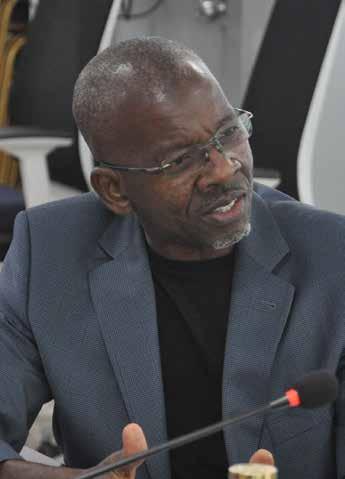
really break it down, we’re competing with everything from Mexico, South America — you know, a whole range. It also depends on whether it’s group business or transient. It’s a very open question, and not an easy one to answer. I lost a group piece of business the other day to a mountain retreat. It’s completely different. Generally speaking, when it comes to the transient guests, we tend to be competing more with St. Barts, Turks and Caicos, Antigua. They’re the general ones.
Peter Bates: But the client doesn’t necessarily go to the travel advisor and say, “We want to go to the Caribbean,” do they? They go to the travel advisor and say, “Where should we go?”
Brad Simmons: Exactly. And to your point, that’s why the travel agent is so important. It’s very rare that Rosewood Little Dix Bay is at 100 percent occupancy — really, if we have a buyout group, or it’s festive. Outside of that, I will say to any travel agent, “Just let me know. You want to come down, I’ll get you there.” The return we get from that is more than anything we do going to Virtuoso or whatever. Because ultimately, that travel agent will say to their clients, “Do you know what? Have you thought about the BVIs? You can go to Rosewood Little Dix Bay.” That’s why that’s so vital.
Peter Bates: We were in Montana at the Montage in Big Sky last week with the Travel and Leisure advisory board, and people were on social media from there saying, “We’re here. It’s fantastic.” And they were getting bookings while they were there. Their own clients follow them and say, “Oh, you like it? Do you think I’ll like it? I’ve always wanted to go to Yellowstone. Can this work?” They need prompting.
Brad Simmons: I was in Rosewood Mayakoba this weekend for a work trip with some colleagues, and a few of us were posting things on social. We had clients reach out to us through our Instagram and say, “I really want to book this; can you help me?” And we ended up booking Mayakoba.
Sharon Flax Brutus: Here in the BVI, the big elephant in the room from a tourism perspective is the LGBTQ market. What do you think the BVI should do relative to that market, especially because we recognise — or at least Russell and I do — that it’s a billion-dollar worldwide industry and there are targeted trade shows for that particular demographic.
Peter Bates: Embrace it. Go after it like you go after every market. It shouldn’t be special. It’s just one of the key markets we all need to look at. It shouldn’t be treated any differently to any other group. There’s a lot of money there. It’s really important that we’re as inclusive as possible with all markets.
Brad Simmons: Same for us. You just need to be inclusive to everyone. It’s the right thing to do. You just need to be open to it. We’ve had a few requests on wedding celebrations — not necessarily the ceremony happening — but we’ve certainly been having a lot of those requests. We’ve been very much open to it, and we’ve treated it like any other piece of business.
Sharon Flax Brutus: The final question is ending a little bit on a political note. We have an election in about eight months. If you had a chance to say to the electorate or those aspiring for office, “These are the top three things you think should be on their tourism agenda,” what would they be?
Peter Bates: Airlift, cleanliness, and agility.
Brad Simmons: I would agree with that. The only other thing I would say is better communication with stakeholders. The communication from the government, especially during the pandemic, was just dreadful. I can only use the pandemic as an example of that, but ultimately that generally has to get better, and there has to be a better open forum. There may be that — it’s just maybe something I’m not involved in — but there needs to be a better forum to discuss tourism and to have everyone on board and supportive of it. Without it, the BVI doesn’t succeed. That open communication, that open forum, is very, very important. But in choosing three things, I’ll go with Peter’s.
Peter Bates: To add to that, I think the politicians who are vying for office have to understand the economic impact of tourism. That’s the bottom line. They have to understand how important this is to the country.
Clyde Lettsome: Peter, on that point, the premier says he understands, and he said last week in his press conference that he is resetting the whole ethos of how government, how the BVI, views tourism. Now, if he is serious, then it was welcome.
Peter Bates: I don’t know what’s going on locally; I’m just thinking aloud. I don’t have that experience that you do. Collectively, you’ve got immense experience.
Clyde Lettsome: Airlift is at the top of the agenda for sure. I continue to be put out by the fact that a lot of things are happening in the tourism sphere, but nobody’s asking the people who are involved in tourism and involved in marketing their properties. We’re fortunate that we can do our marketing despite what happens at the level of the Tourist Board. I always thought that we had a good tagline in “Nature’s Little Secrets.” And overnight without professional advice you could change it to “BVI Love,” which really says nothing in terms of a tagline. If there’s one thing I would love to see ended, it’s this fiddling with tourism without asking the people in tourism what they need or what is required to enhance tourism. You end up with people who are not engaged. They do not know, they’re not talking to anybody, and they just go and fiddle and then we see the downturn in the business. Or we have to put out more effort to hold on to the same business.
Peter Bates: Because they don’t have fiscal responsibility.
Russell Harrigan: Sharon and I want to sincerely thank [you all] for joining us for what I thought was an informed and timely conversation about positioning and marketing the BVI globally as a top tier destination. BB
This discussion was condensed and edited by Business BVI.
It’s a new twist on hospitality in Virgin Gorda. March 2022 saw the opening of The Inn at Cornucopia in Little Trunk Bay.
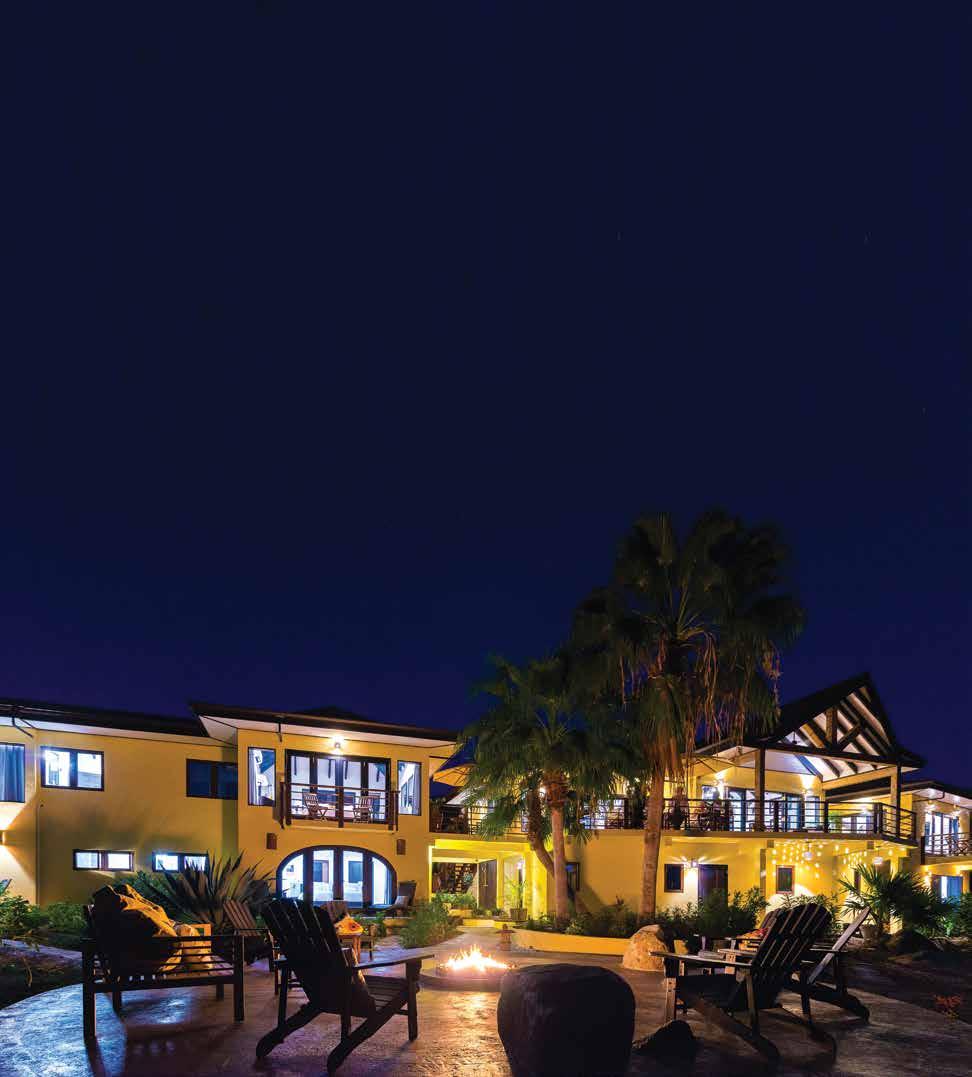
As Inge and Rose have said time and time again, we are not hoteliers, we are innkeepers and there is indeed a distinct difference. Inge Judd and Rose Giacinto have been friends for over forty years and both have been involved in the tourism industry in the British Virgin Islands in varied capacities. Rose is the inspiration behind the Bath and Turtle as well as Chez Bamboo, while Inge joined her in their pursuits of entertaining when they both operated the Mad Dog restaurant a few years ago. Both travel extensively and this has been a tradition, where for the last several years they’ve enjoyed summers in France.
2017 saw Virgin Gorda ravaged by unwanted visits of Irma and Maria, hurricanes which left no structure in Virgin Gorda without damage. While some villas were renovated and rebuilt, quite a few were simply abandoned by their owners with no desire to rebuild. After the storms, building codes changed and the costs of construction skyrocketed. Some owners were in their twilight years and just the thought of a construction project was not something they were willing to entertain.
With her experience as an international business traveler and savvy business woman, with over fifty years of experience, the then 80ish Inge wanted to realize her dream of operating a “French inspired inn”. Rose, on the other hand, wanted to add her 30 years of experience in doing business in the BVI to something different. They chatted extensively about how they could bring their idea to fruition. The pandemic came and both ladies had a lot of time on their hands and they started thinking seriously about how they could make their dream a real thing. Rose is an avid dog lover and walks her rescue dogs every morning in the Greater Baths area. There were a few villas on sale there but Rose was drawn to Westerly. It was one of the casualties of the hurricane roofless and windowless, but with a great location and a moments walk to Little Trunk Bay. Inge loved it and so began the love affair with ‘the French project’ in what has become The Inn at Cornucopia. Inge says “We were looking for an immersive and creative project. Both Rose and I knew what we wanted. Westerly could be our country French Caribbean Inn. The architecture lent itself to our ideas. We also saw the location as being able to provide what some travellers want – an adult environment, which provides peace, quiet and tranquility.”
As the construction took shape, Inge and Rose decided that they wanted their Inn to touch on niceties of France, coupled with the Virgin Gorda flair for accommodations with a difference. Extensive work was done on the villa and quite amazingly, they were able to salvage quite a bit of the wooden beams and the mangled doors, which were refinished and now tell their own story of resilience. The Inn showcases amazing views of Devil’s Bay and the close by island of Fallen and Broken Jerusalem.
A nicety at The Inn at Cornucopia is its bedding and antique linens. The linens distinguish the accommodations from many others. Inge’s parents were married in 1924, when all linen, bed and table was monogrammed, cut work and laced. Inge grew up with that linen and that of her grandparents. She is sometimes saddened that she sold most of her beautiful pieces years ago, She muses “Who knows, I’d have an Inn and have use for them”, but she still had pieces that are in use at the Inn. When she started traveling to France decades ago, she started collecting interesting pieces.
In the four rooms and one suite are a few pieces of antique linen in every bedroom. Soon at the Inn, will be a small curated boutique which will sell old world linens. This past summer in their European travels, they scoured markets and stores for linens. Some will be reworked into signature Inn at Cornucopia linens which will be available for sale. Being French inspired, a full breakfast is included in the rates and is served al fresco, overlooking the panoramic scape down Sir Francis Drakes Channel. Passion fruit mimosas and bellinis are on tap for breakfast.
The Inn also features a firepit which is ideal for relaxing during cooler nights. Being a mere 2 minute walk from the beach at Little Trunk, red wagons are available to carry complimentary beach chairs, umbrellas and snorkel gear.
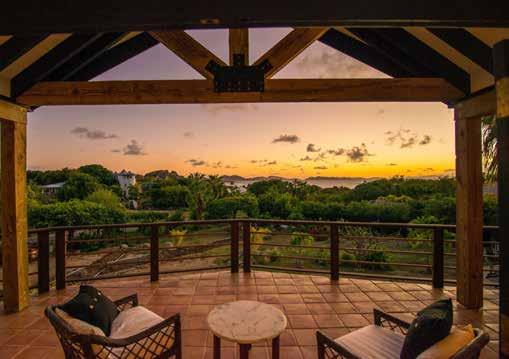
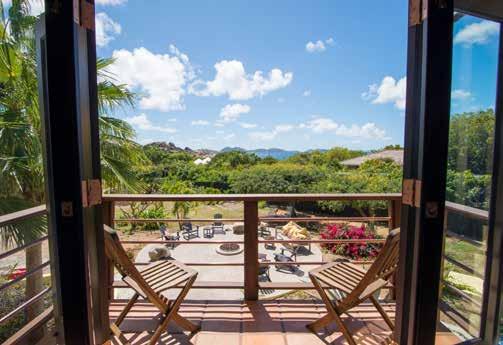
Setting The Inn at Cornucopia at a pinnacle, is that it is the only Inn on Virgin Gorda and one of the few accommodations that is pet friendly for dogs and cats under twenty pounds. A “pet menu” is available so that our furry guests are also treated to service and amenities with a difference.
Inge and Rose are consummate innkeepers. Both ladies are there to welcome guests to the Inn with a Virgin Gorda and French inspired and sophisticated service. It’s an Inn with a difference that redefines personalized luxury, while seeking to exceed expectations. BB
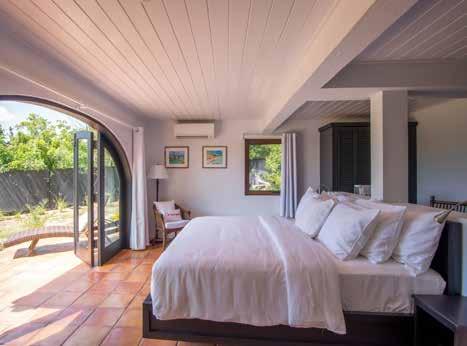
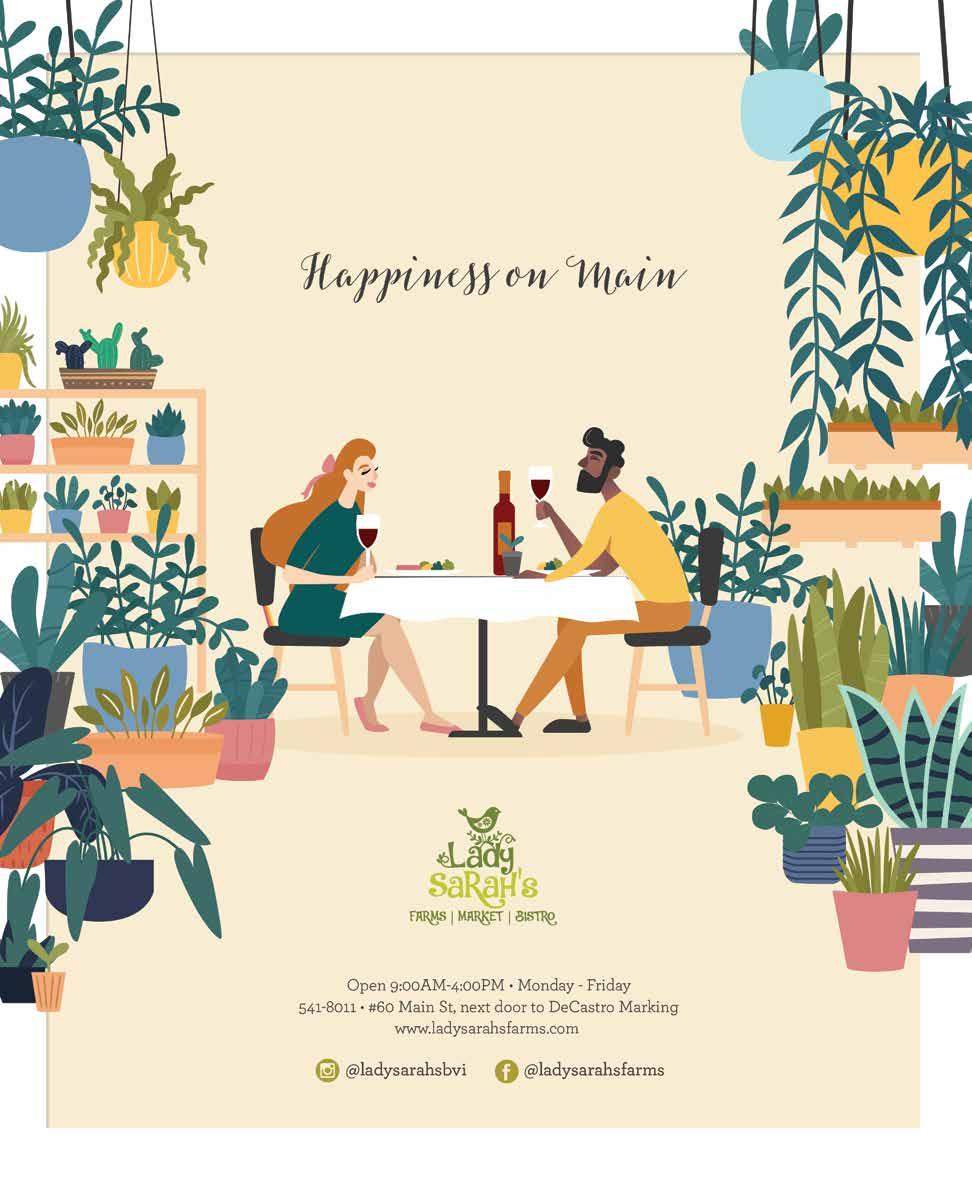
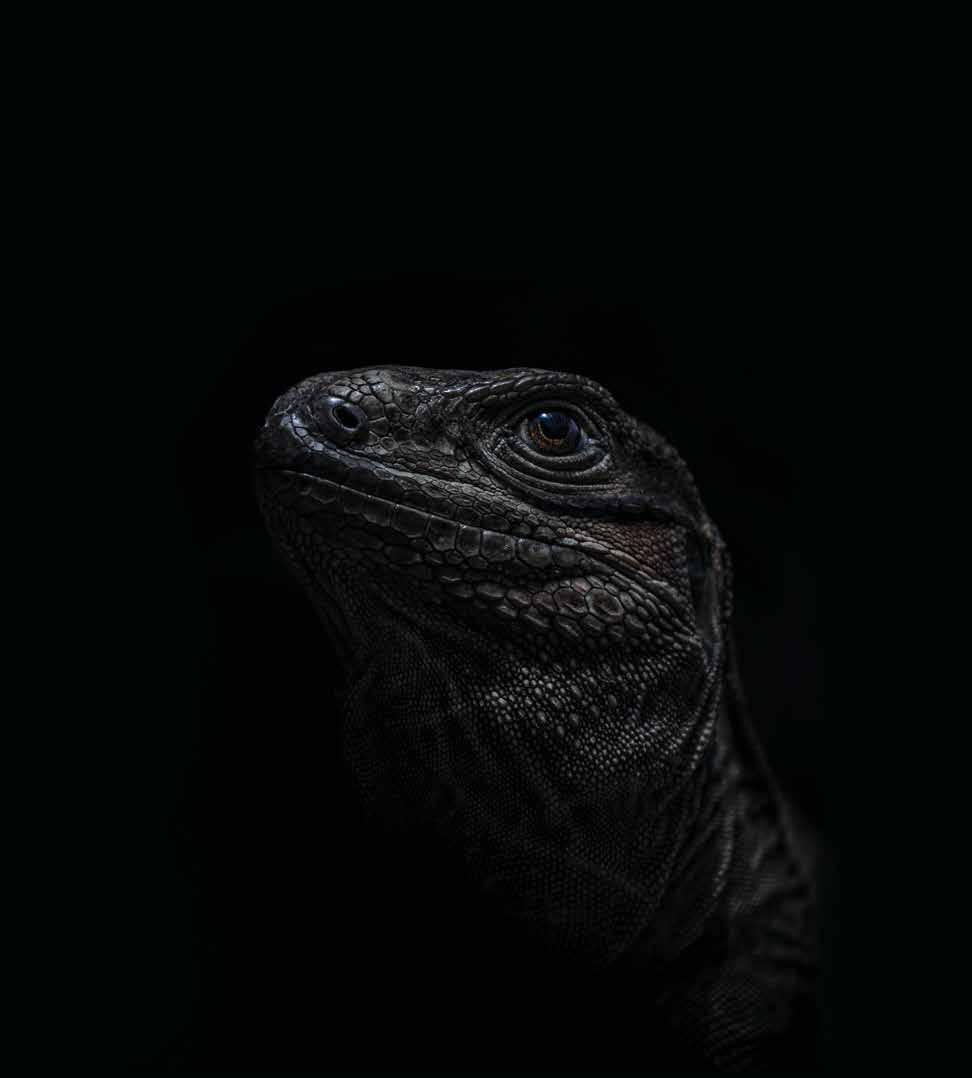
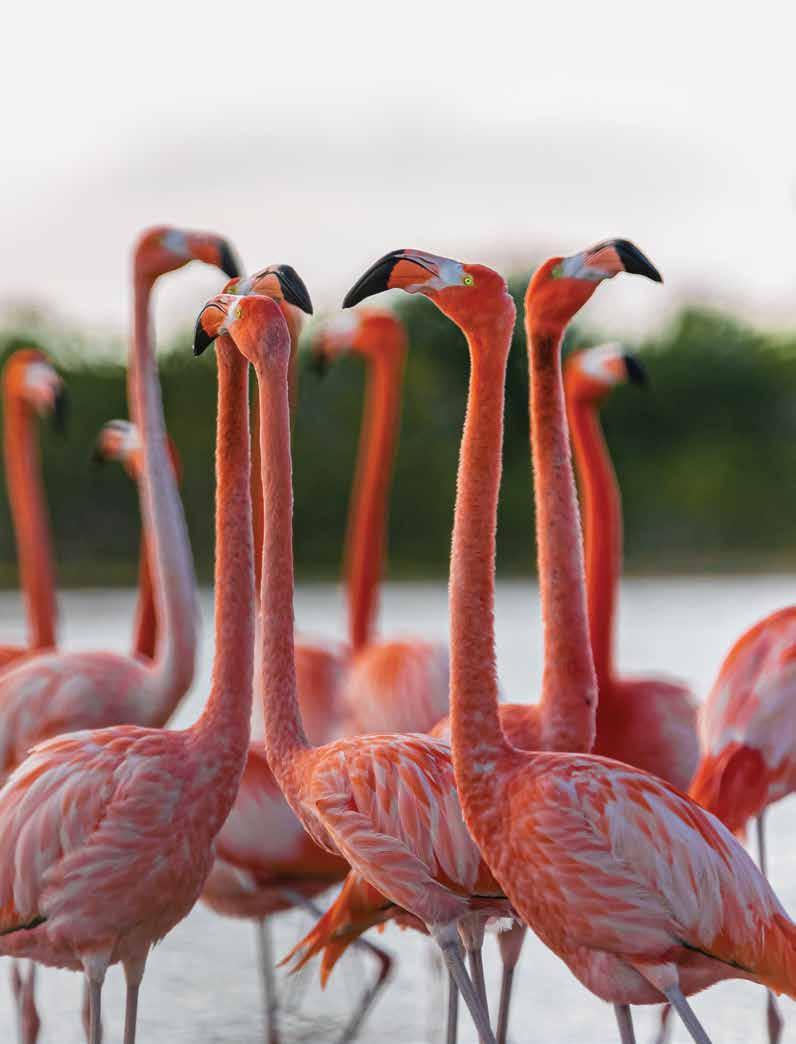
CLOCKWISE:
An adult American Kestrel, the territory’s most abundant bird of prey; a Brown Pelican coming in for landing during golden hour, another breeding resident; various sea birds seem to favor the conch middens found off the coast of Anegada, take this pair of Royal terns for instance.

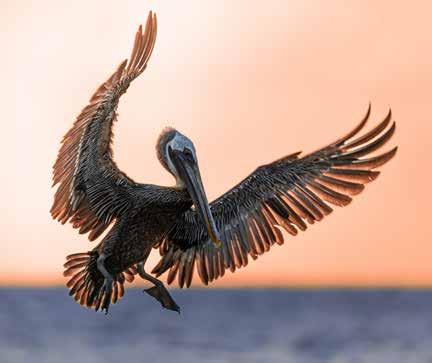

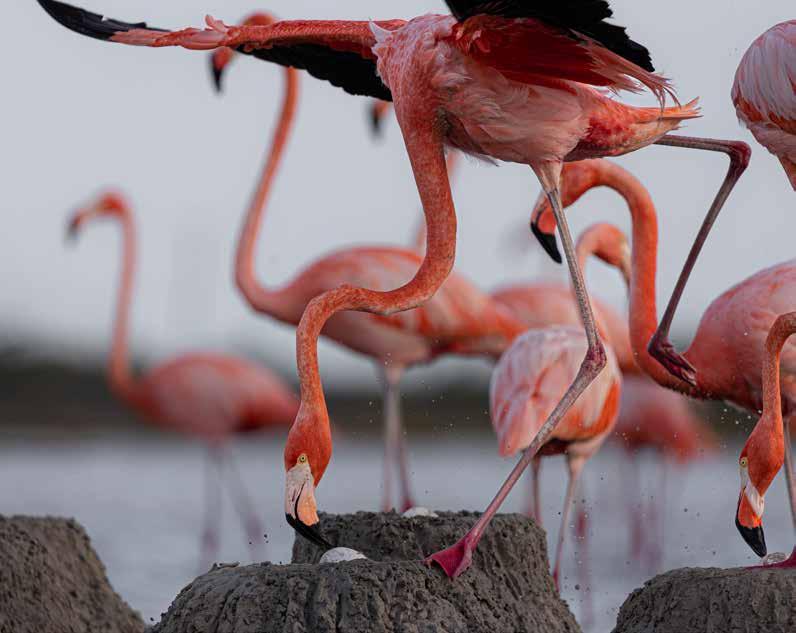
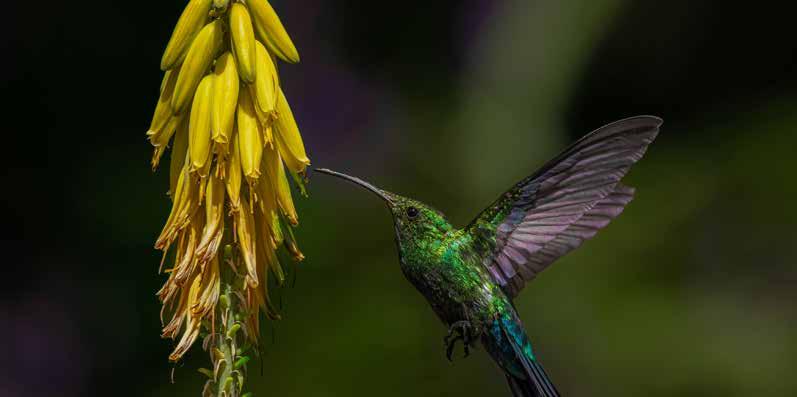

OPPOSITE PAGE:
An Antillean Nighthawk perched on a dead branch against the glow of an Anegada sunset, during the summer months Anegada is the only island in the territory where they’ve been recorded to nest.
FROM TOP:
A female Common Ground Dove, the smallest species of dove in the Americas having being just the size of a sparrow; a Tri-Colored Heron, most of this species appear as migratory but some have been recorded as breeding residents.

Tourism and regained freedoms WINTER/SPRING 2023
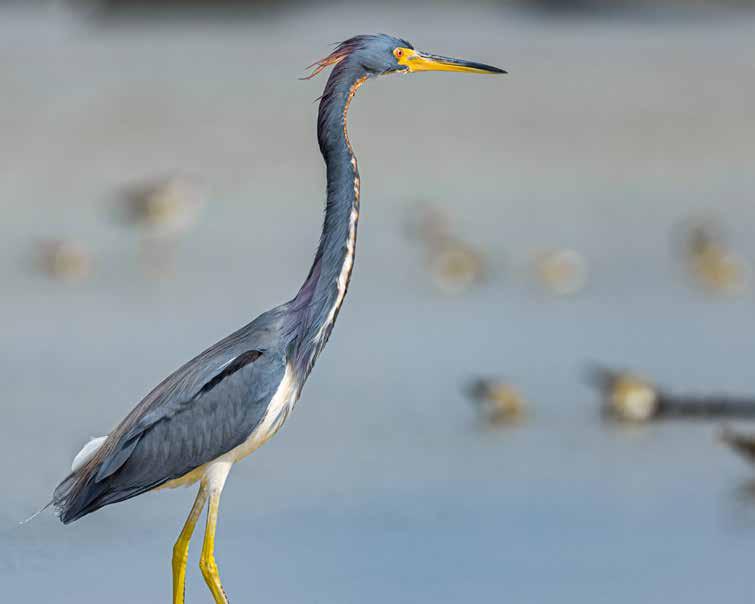
This photography is compliments of Rondel H. Smith, a 21-year-old graduate of the HLSCC, who aspires to be a conservation biologist and wildlife journalist. Living on Anegada for just about all of his life, he says that he has always been fascinated by everything nature related and Anegada offers just that. From the vast acres of salt ponds and miles of coral reefs, to the diverse range of species found within them. In his own words, he says “Being surrounded by inspiration, birthed my passion for wildlife photography. I do this not just to share pictures, but to share experiences, stories and most importantly to highlight how unique our wildlife is and the importance of protecting it.”
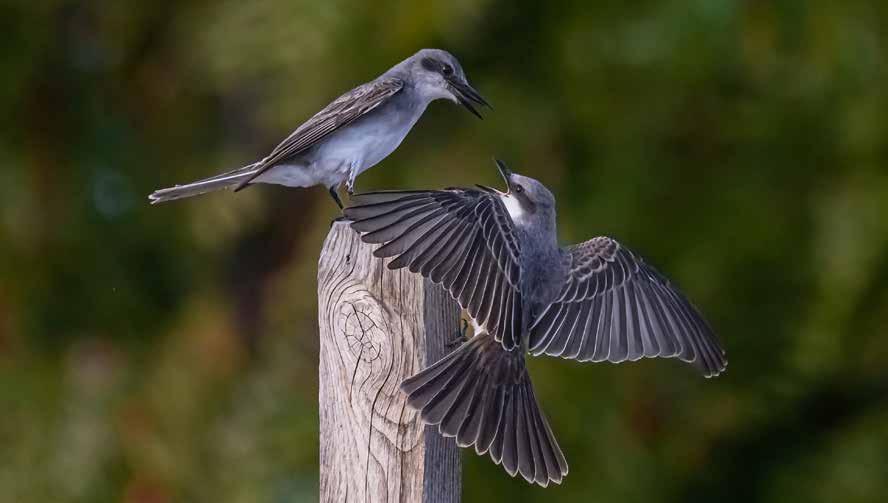

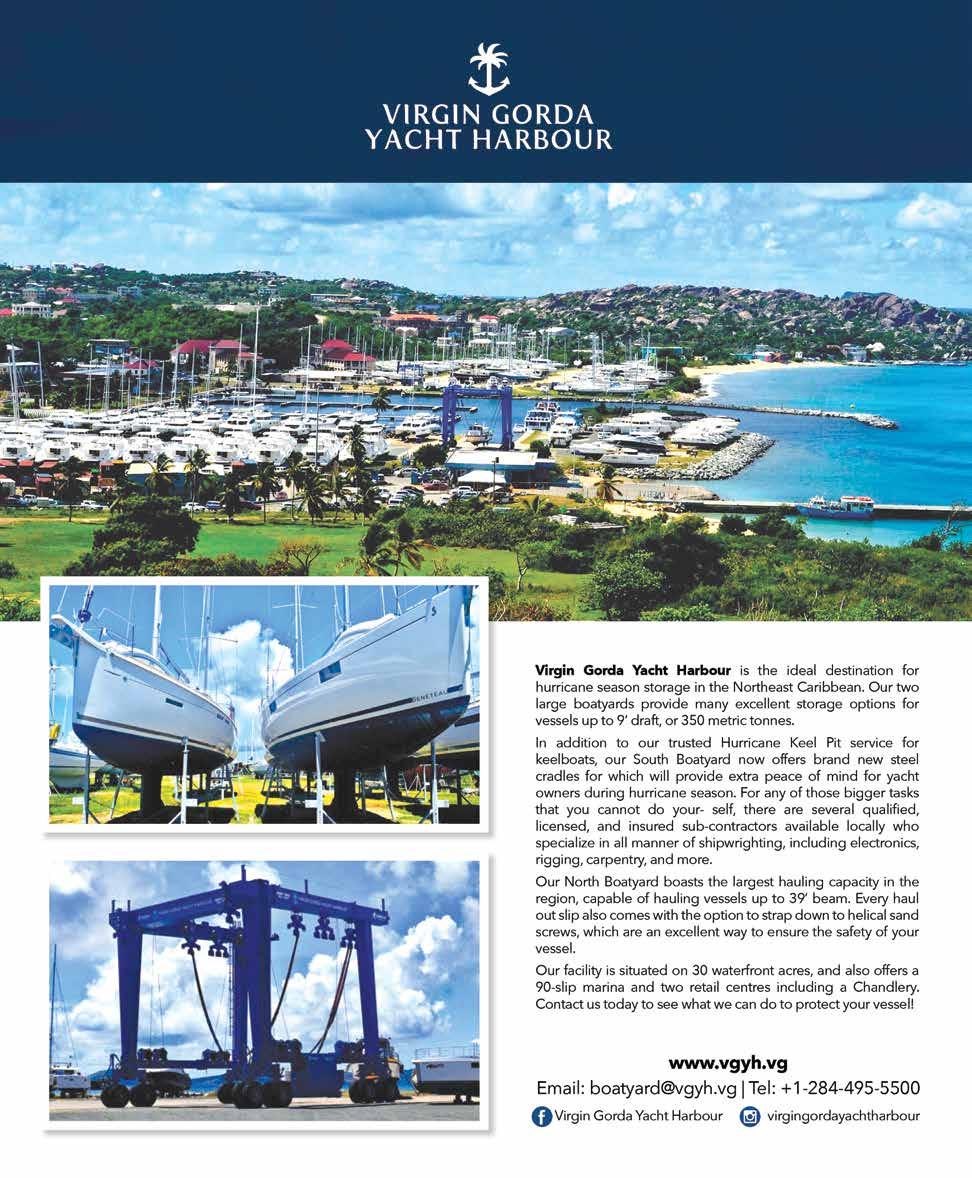
The year 2022 will be remembered for so many events - a whirlwind of political drama, mobilization for war and surprising arrests. Geopolitical uncertainty, fueled by Russia’s invasion of Ukraine has brought war to Europe leading to human catastrophe, the likes of which have not been seen on the continent for over seventy years. Inflation, already in the ascendancy due to post pandemic supply chain issues a year ago, has been further impacted by the fuel crisis which emerged as Europe faced the consequences of past over reliance on Russia’s energy resources. Self-inflicted political chaos in the UK demonstrated how poorly thought through political decisions could quickly be condemned by markets which react to adverse risk. In America, the mid-term elections were a battleground as Republicans and Democrats fought for control of
both houses of Congress, with a population that seems more divided than ever. In April, the BVI found itself on front page news when its former premier was arrested in the United States, precipitating the early release of the Commission of Inquiry (COI) report. In the midst of this, the death of the Queen heralded the end of the second Elizabethan Age, a symbol of continuity for over seventy years.
Geopolitical and economic uncertainty, following a pandemic which impacted economies for the better part of two years, have combined to create the conditions where countries are once again on the brink of recession. Whereas in 2008 the economic crisis was one created by financial institutions and the collapse of the housing market, the economic conditions in 2022 are more complex. Government support across many economies during and following the pandemic, led
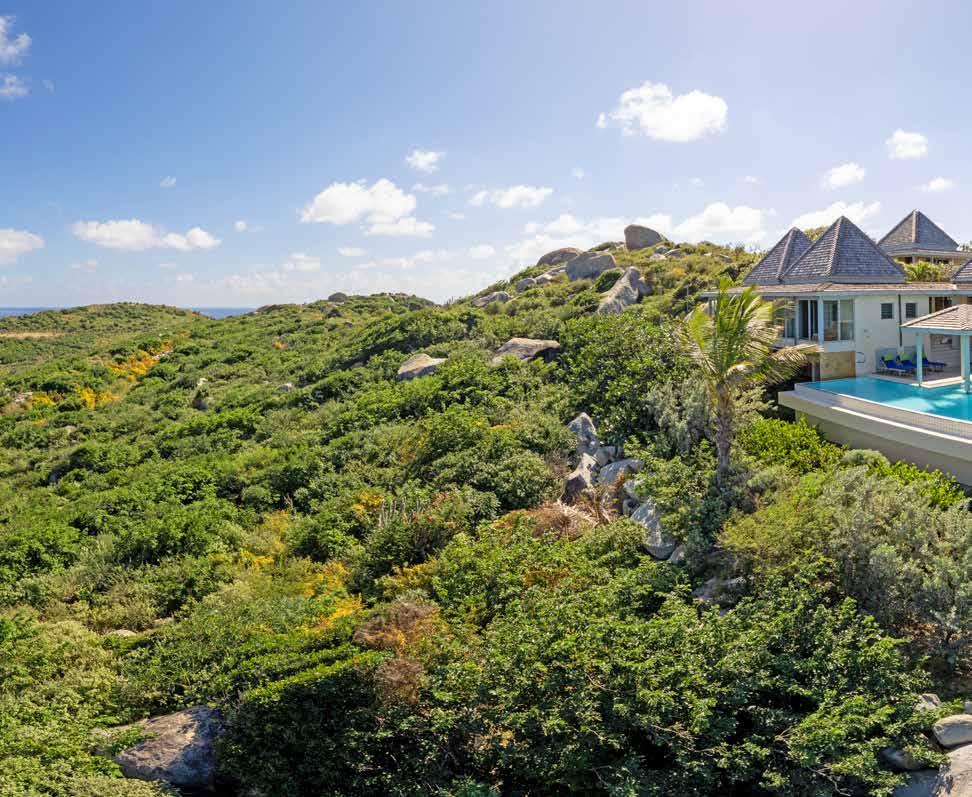
to increased spending once COVID restrictions eased as increased savings during lockdown gave way to pent up demand for goods and services. Supply chain issues built up as manufacturers were unable to keep up with demand often due to labour shortages, placing inflationary pressure on the economy with central banks looking to ease demand by increasing interest rates. Stock markets, which had bounced back after the early days of the pandemic, started to falter, first as inflation rose and then as the impacts of the Russian invasion on fuel prices and inflation started to be felt, creating greater uncertainty for investors.
The recently completed G20 summit in Bali and COP27 in Egypt highlighted more the divisions between nations and the developed/ undeveloped world rather than areas of common ground. With the
war in Ukraine dominating the G20 agenda, Presidents Biden and Xi Jinping found ways to tone down the rhetoric over Taiwan that has increased in recent months. Despite the G20 theme ‘Recover Together, Recover Stronger’, deepening economic and climate concerns combined with food and fuel insecurity resulted in a statement that highlighted the considerable challenges being faced globally, but in particular condemned the aggression of the Russian Federation against Ukraine and consequences for the global economy. The COP27 climate conference struggled to reach a conclusion as divisions over the cost of climate change to developing economies dominated discussions. By the end of the conference, an EU initiative promoting a fund to help developing nations deal with the fallout from climate change, sought to resolve the issue.
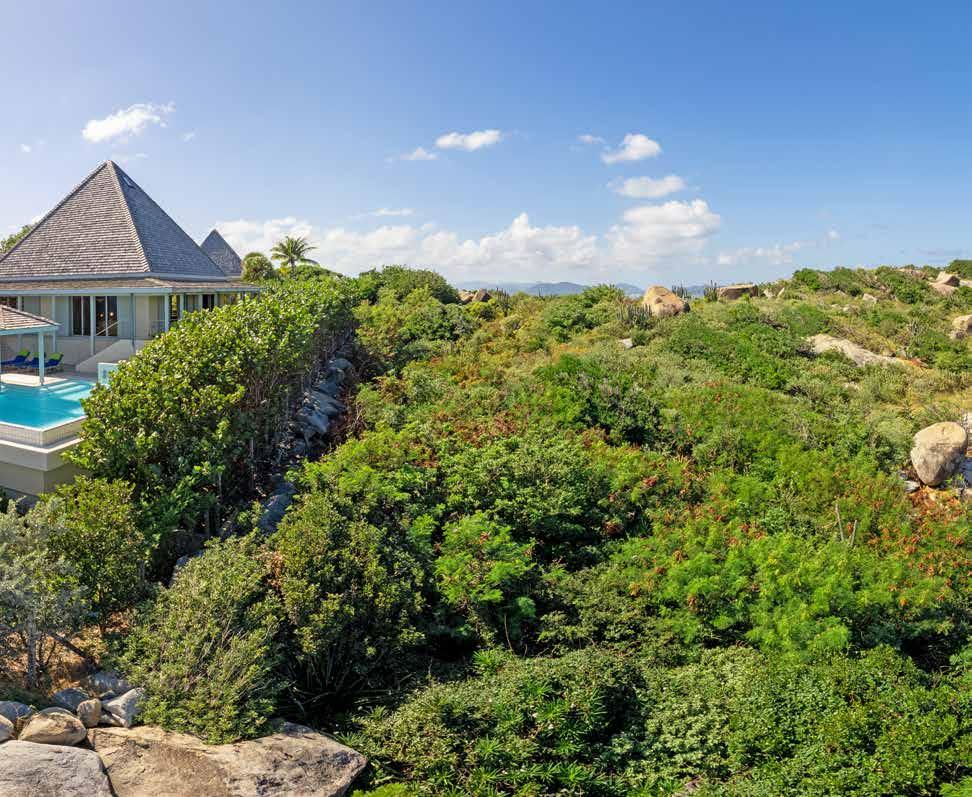
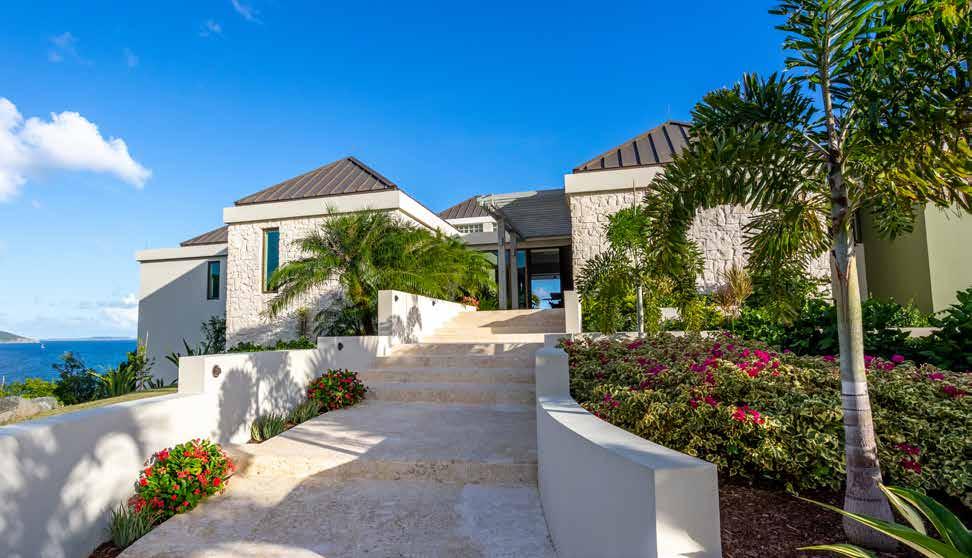
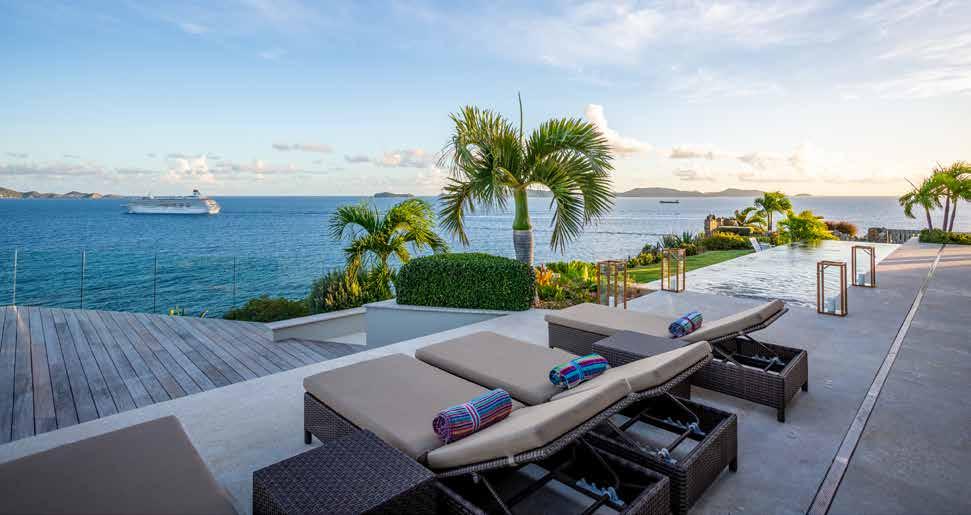
The mid term elections in America perhaps left more questions on the table than provided answers, as the “red wave” of Republican seats never materialized, with blame placed more on former President Trump’s endorsement of 2020 election denial candidates than on the track record of President Biden’s prior two years in office. With the Democrats losing control of the House by a slender margin but retaining control of the Senate, President Biden emerged generally unscathed despite the fact the next two years in office will prove to be legislatively challenged. The focus now moves to the 2024 elections with Trump declaring his candidacy in mid- November and Biden considering his options.
As we move into the final quarter of the year, economic indicators in the US show that while productivity is increasing, albeit slowly, unemployment rates continue to fall. Economists are looking for signs that growth is slowing down and the Federal Reserve’s brakes on the economy, through increasing interest rates, can be reversed. Annual inflation in the US was at 8.2% in September, slightly down in August but still higher than predicted. However, inflation rates are now predicted to fall more quickly as rising interest rates impact the housing market and slow the economy. Predictions of a recession in the US remain just that – for now.
Investment is based around risk, or perception of risk, and global events can have a significant impact on how investors react. The economic rebound following the pandemic has faced unprecedented geopolitical events impacting stock markets globally. The real estate market surge of 2021 and 2022 in the US with consequential impacts on real estate markets in the Caribbean, is now being reigned in as interest rates start to impact mortgages reducing the demand for houses. The UK’s “mini-budget” announcing substantial, unfunded, tax cuts in September, spooked markets resulting in a run on the pound as the cost of UK Government borrowing increased. This had a consequential impact on interest rates which in turn have impacted mortgages and the housing market, while the Bank of England had to buy up Government bonds to support pension funds. The link between macro-economic and geopolitical events and investors’ aversion to risk is therefore well established with missteps in Government policy having a quick impact on the economy at times of uncertainty. The uncertainty created by the “mini-budget” resulted in the sacking of the Chancellor and the resignation of the Liz Truss, the shortest serving prime minister in UK history.



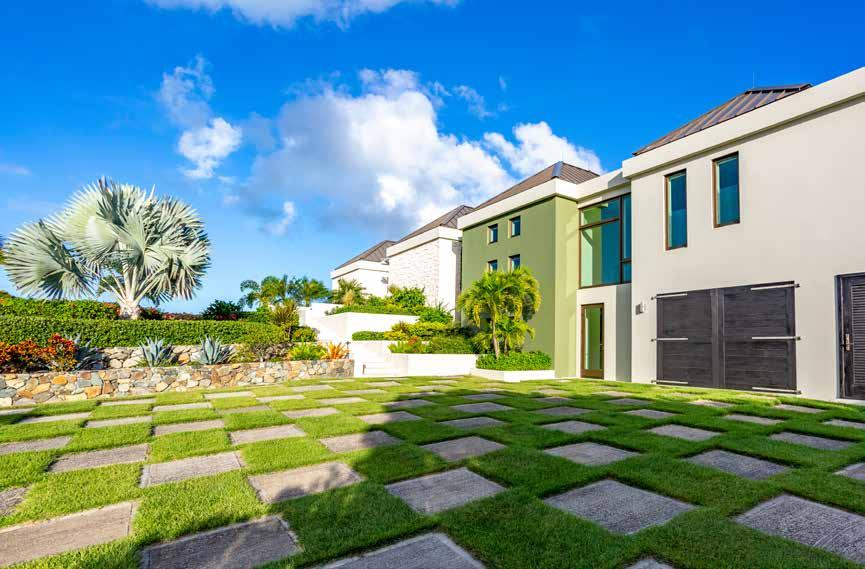
The completion of the COI process in 2021 led to a six month wait for the anticipated presentation of the Commission’s report. The Governor eventually received the report in early April and set out a timetable for release, first to the Government for initial review in May before a public release in June. However, the announcement that the then Premier Andrew Fahie had been arrested in Miami in a DEA sting operation, along with the former head of the BVI Ports Authority and her son, on money laundering and drug smuggling charges, led to the Governor releasing the report publicly on 29 April. The BVI community was facing the double shock of reacting to the arrest on criminal charges of the Premier combined with the findings of serious financial and administrative mismanagement contained in the COI report. The report found evidence of widespread failings in governance and, most controversially amongst its more than forty recommendations, was the recommendation that the Constitution should be suspended for a period of two years while measures were put in place to remedy the problems identified.
A Government of National Unity was quickly formed under the then acting Premier, Dr Natalio Wheatley, and on 6 May 2022, following a vote of no confidence in Hon Andrew Fahie, Dr Wheatley was sworn in as Premier by the Governor. On 7 June, the Governor announced his decision, in consultation with the UK Foreign and Commonwealth Development Office, that the UK would not impose direct rule in the BVI. The decision was made on the basis that it would give the Government of National Unity the opportunity to demonstrate their commitment to a programme of reform to address the findings of the Commission of Inquiry. The Unity Government set out their proposals to tackle the recommendations in a document entitled “Framework for Implementation of the Recommendations of The Commission of Inquiry Report and other Reforms”.
Following the establishment of the Commission of Inquiry Implementation Unit, the National Unity Government is in the process of undertaking an ambitious programme of reforms based on the COI recommendations. In a press release on 12 October, the Permanent Secretary in the Premier’s Office reported that work had commenced, or been completed, on 47 of the 50 recommendations with 34 recommendations being actioned at the date of the press release. Overall, 79.6% of the work on recommendations was on track while 20.4% of the recommendations had challenges in meeting deadlines, typically because the remit of the review had been expanded. As the Premier stated in a press interview at the end of September: “It’s important to say that overall, we need to go through a process of reform to make sure we’re able to deliver public services in a more efficient and more effective manner than we have done in the past. So, we’re looking to reform all of our institutions to make them more efficient, more effective, more community based and community driven and of course, give better value for money to the taxpayer.”
Released on 4 October 2022, the Governor’s first quarterly report on the progress of implementing the recommendations under the COI report noted that for the most part, good progress had been made : “To date, as set out in this Quarterly Review, there has been good progress in a number of areas. All but two of the reviews recommended in the COI Report have been initiated. I have also ordered the Royal Virgin Islands Police Force to conduct all the criminal investigations recommended in the COI Report, and the Auditor General is conducting the recommended audits. However, there are areas where there has been less or no progress. In most cases where deadlines have been missed, there are credible reasons for delay, and I am satisfied that work is under way.”
However, the Governor singled out three areas of concern in implementing the COI recommendations. These included the revisions to the Register of Interests Bill, which restrict public access to the Register; the resistance to some of the Governor’s nominees for the Constitutional Review Committee and the continued use of tender waivers without justification. The Premier was quick to respond to the criticisms, in particular setting out the process relating to the approval of tenders, noting that had this issue been questioned prior to the release of the report, some of the misunderstandings about the process would have been resolved. The Premier went on to state: “We were very ambitious in our commitments and, unfortunately, deadlines have been missed. It is important to note that deadlines have been missed on the governor’s side as well as on the side of Cabinet. In all instances, these deadlines have been missed for good reason. For instance, we have insisted that the Jury Act and the Register of Interests Act, both which fall under the Governor’s Group’s responsibilities, receive proper consultation as opposed to being rushed through the legislative process.”
The UK’s agreement to the Unity Government being allowed to
recommendations being undertaken within a certain agreed timetable. In the event the Governor concluded that sufficient action was not being taken to implement the recommendations then certain actions could be taken, including the temporary suspension of the House of Assembly and Cabinet, with an administration led by the Governor and an advisory Council carrying on the work to implement the recommendations. Controversially, the UK passed an Order in Council (Privy Council) which would allow the swift suspension of the constitution and transfer of power to the Governor.
This unilateral action on the part of the UK Government has not sat well with the local politicians with a delegation going to the UK in November 2022 to request that this Order in Council be reversed. As Special Envoy to the Premier, Benito Wheatley, stated to the 77th session of the UN General Assembly: “Among other things, the BVI delegation will encourage the UK government to reconsider their current position on maintaining an Order in Council in reserve that allows the governor to impose direct rule over the islands at his discretion.”
Prior to the announcement in January 2021 of the Commission of Enquiry, the VIP Government started the process for the next round of the constitutional review, the last review having been completed in 2007. The imposition of the COI and subsequent change to the National Unity Government delayed the process but the Constitutional Review Committee was eventually appointed in June 2022 (the previous Board appointed under the VIP being disbanded) comprising 16 board members. The recommendations of the COI called for Cabinet to propose a revised committee by 30 June 2022 and that final membership be jointly agreed between the Premier and the Governor, although there was some dispute over the recommendation of two board members by the Governor.
The first meeting of the Constitutional Review Committee was held on 18 July with board members tasked to prepare the draft Terms of Reference for the committee. These were approved in Cabinet on 20 July and agreed and adopted by the House of Assembly on 21 September 2022.
The question of self-determination for the people of the Virgin Islands sits centre stage in the review process with the Terms of Reference clearly stating that the process should “review the next step towards self- determination for the Territory of the Virgin Islands.” The Commission is also tasked with evaluating “the current Virgin Islands Constitutional Order, 2007, and determine whether it is a strategic fit to facilitate the people of the Virgin Islands in achieving the vision in (i) above,” namely to evaluate the vision expressed in the preamble of the Constitutional Order, 2007. The Commission is also tasked with reviewing “the powers that need to be reserved to the Governor, and how issues as to the exercise of devolved and reserved powers, respectively, when they arise, are to be resolved.”
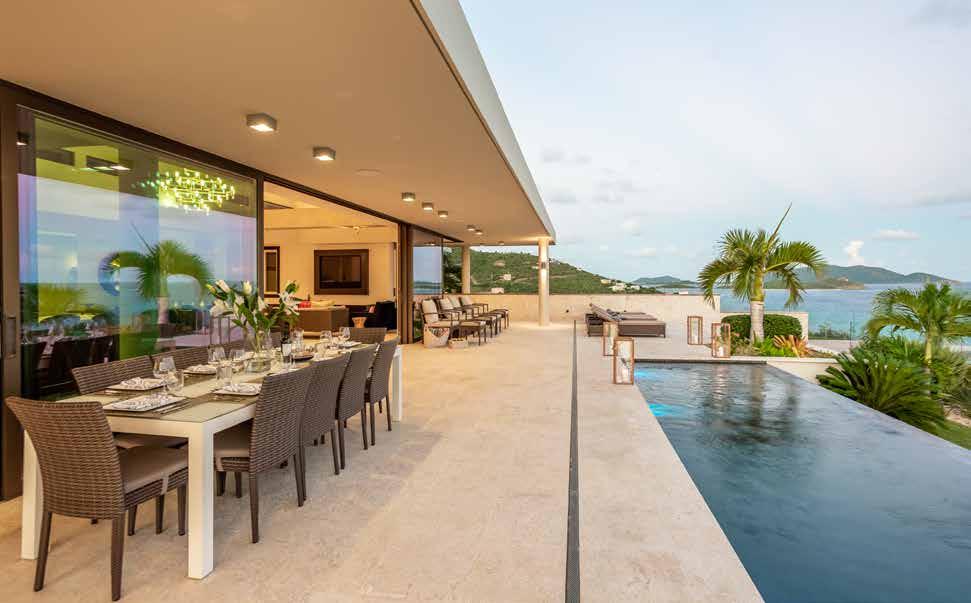



Five years after the devastating impact of Hurricane Irma and the lock-down of the Territory in 2020 and 2021 as a result of the COVID-19 pandemic, the BVI has weathered both storms, albeit at a cost. The post Irma path to recovery, spearheaded by the Recovery and Development Agency, has not resulted in the original $187M recovery programme (the proposed expenditure in the “Revised Recovery to Development Plan 2019-2023”) that was envisaged being implemented. A $65M loan from the Caribbean Development Bank plus some limited direct funding from the UK in the aftermath of Irma has enabled a number of projects to be completed; but the vision to rebuild the infrastructure, services and facilities of the BVI never evolved and much of the BVI’s infrastructure and facilities remain in poor condition. This was partly due to the reluctance of the BVI Government to access the loan guarantee of $400M offered by the UK Government in the wake of Irma to help facilitate the recovery programme. The Government is now seeking to secure loans from other avenues to continue infrastructure improvements, as the window to access the UK loan guarantee has apparently closed. A request by the Chairman of the RDA to extend the RDA’s mandate by a further three years has been rejected by the Government, with the RDA’s tenure due to expire at the end of December 2025.
In December 2021, the VIP Government passed the 2022 budget of $397,174,331 of which $337M was put aside for recurrent expenditure and $39.4M on capital expenditure which included the rehabilitation works to the Elmore Stoutt High School, which are now nearing completion, and the East End Long Look sewerage project. The budget estimated revenues at US$356.7M, resulting in a deficit of US$40.5M, compared with a shortfall of US$69.8M in 2021.
The “twin pillars” of the economy, financial services and tourism, have both been impacted in recent years. International financial centres have faced increasing scrutiny from the US and Europe in the wake of the leak of information from “offshore” financial jurisdictions (Panama Papers 2016; Paradise Papers 2017 and Pandora Papers 2021) resulting in ever tightening regulations relating to transparency and money laundering. The passing of the Economic Substance (Companies and Limited Partnerships) Act, 2018 and the commitment by the government to set up public registers of companies by 2023, reflect the need for the BVI to update the financial services legislation in response to these external pressures. A landmark decision in late November by the ECJ (European Court of Justice) ruled that it was unlawful for the EU to require Member States have publicly available registers of beneficial owners has wide ranging implications for the financial sector. The decision is now being considered by the EU and the UK and BVI Governments. Shortly after the decision was announced, the BVI Governor’s office responed: “The Governor’s Office will work with colleagues both in the territory and the UK to understand the implications of the recent judgement by the ECJ and will continue to support work towards publicly accessible registers of beneficial ownership.”
Graphs 1 and 2 show the declining company registrations in the BVI since 2011 which presents a longer-term problem for the BVI given that historically around 60% of its annual budget has been generated through financial services. While there was a rally in company registrations in 2021, the decline has continued in 2022.
Tourist arrivals were significantly impacted first in the aftermath of Hurricane Irma in September 2017 and secondly in 2020 and 2021 as a result of the closure of borders during the COVID-19 pandemic. While tourists were able to visit the BVI towards the end of 2020, the restrictions on travel were not lifted until October 2021, when double vaccinated tourists could travel to the BVI without completing the gateway protocols and then all travels restrictions to the BVI were finally lifted on 15 July 2022.
Graph 3 shows the double impact on tourism of Hurricane Irma in 2017 and the longer impact of the pandemic in 2020 and 2021, with tourism numbers starting to recover. The 2021/22 high season was the first full high season the BVI enjoyed since 2016/17 with cruiseship arrivals recovering more quickly than overnight arrivals. While cruiseship companies recommenced their operations in 2021, on-board occupancy restrictions during 2021 and 2022 combined with staff shortages, kept total cruiseship passengers lower while the number of port calls increased. The cruiseship industry does not expect to see cruiseship occupancy levels return to pre- pandemic levels until the 2023 season when 417 cruise calls are expected during the 2022/23 high season. The BVI is expected to earn $75 million from the industry with the average spending per cruiseship visitor expecting to increase from $78 per visitor to $107.14 per visitor (Business Research and Economic Advisors).
Overnight tourism numbers remain impacted by the pandemic and are around 40% of pre-Irma overnight tourist arrivals comparing January to August 2017 with the same period in 2022. This is a concern as most Caribbean destinations experienced a COVID bounce in tourist arrivals, with increased occupancy rates compared to prepandemic levels. While the majority of tourists to the BVI are from the USA, access issues to be the BVI have likely played a part in restricting more tourist arrivals to the BVI.
Air links between the BVI and Antigua, which is the main route for passengers arriving from the UK, have been impacted by LIAT entering administration with a reduced flight schedule and InterCaribbean flights becoming unreliable. Prior to Hurricane Irma, tourists arriving from the USA could choose between connecting flights to Beef Island via Puerto Rico or direct flights to St Thomas and a connecting ferry trip, clearing in at West End, Tortola. The West End ferry terminal on Tortola has not been rebuilt post Irma with only a small temporary facility allowing for clearance of private vessels; while public ferries continued to clear at the Road Town ferry terminal until end of November 2022 when the West End ferry terminal opened to limited public ferry services operating Friday to Sunday.
The impact of the Hurricane Irma and the COVID-19 pandemic on arrivals to the BVI can be seen in Graph 4 which shows port arrivals by air and sea since 2016 as a moving average. Historically around 80% of overnight visitors have arrived by sea (excluding cruiseship visitors), indicating the importance of the St Thomas link to tourism in the BVI. In 2016, there were a total of 324,723 visitors arriving by sea compared to 83,041 arriving by air. By 2022, the moving average indicated 62,278 arriving by air (approximately 75% of 2016 arrivals) but only 92,917 arriving by sea (29% of 2016 arrivals).
Graph 5 shows the arrival of overnight visitors to the main ports of entry into the BVI, being Terrance B. Lettsome International Airport (Beef Island), the Road Town ferry terminal and the West End ferry terminal. Tourists can also arrive at Jost Van Dyke (sea), Anegada (air) and Virgin Gorda Airport and ferry terminals, although recently these arrival numbers have been significantly less. Graph 5 shows the decline of the West End ferry terminal as a port of entry, and while visitors can still take the ferry from St Thomas to Road Town, this route has not picked up the overnight visitor arrivals that were evident even up to 2019, before the pandemic.
Resolving access issues to the BVI, whether by air or sea, should be a priority for any Government wanting to encourage the overnight tourism sector. At the start of December, Minister for Communication and Works, Hon. Kye Rymer, announced that American Airlines would be commencing direct flights from Miami to Tortola commencing in June 2023. In announcing the flights, Minister Rymer stated: “We are very happy to welcome back American Airlines to the British Virgin Islands. This venture to have direct flights between Miami and the British Virgin Islands will make it significantly easier, faster and more affordable for persons from around the world to come to the British Virgin Islands, which is one of the must-visit tourist destinations in the world. Our residents will also benefit from convenient connections for business and leisure travel to dozens of destinations across American’s route network.”
While questions remain about the Government’s intentions to address the expansion of the Terrance B. Lettsome International Airport to improve direct access to the BVI, the inability to rebuild the West End ferry terminal appears to have impacted the previously significant tourist arrivals from St Thomas. The RDA has plans to rebuild the West End ferry terminal although a timetable to commence works has yet to be set.

In the last edition of the BVI Business Guide, we provided an overview of the Investment Act 2021, which was passed into law in August 2021, and the Business Licence Bill was passed by the House of Assembly in June 2022 and is waiting for Assent.
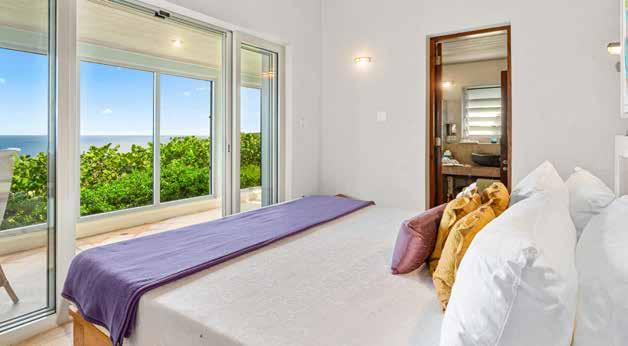
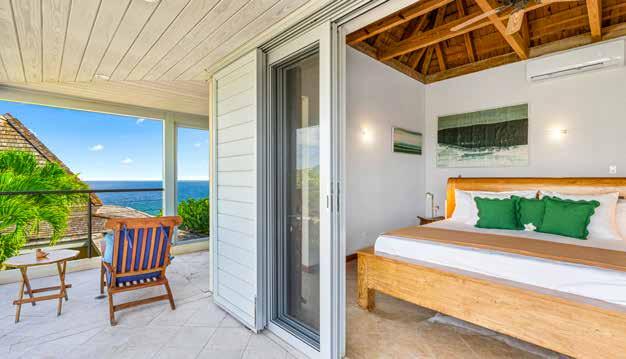
These two acts will run side by side, to encourage investment in the Virgin Islands and to control how investment is undertaken, particularly by foreign investors. The acts will be administered by a newly created Trade Commission, which itself will be created under the Trade Commission Act. The Investment Act is also intended to prevent “fronting” where Belongers front businesses for foreign investors in order to obtain trade licences.
The Government has yet to announce the policy that will govern how the Investment Act will be administered, so exactly how the Act will impact investment remains to be seen. There are some fundamental changes to how investment will be undertaken in the BVI, including the requirement for foreign investors to be approved under the Investment Act before they will be considered for a business licence. Applications will be considered against a range of criteria, including joint ventures with Virgin Islanders, particularly as certain sectors of the economy will be reserved for business licences only for Belongers and other sectors as joint ventures with Belongers. The act does establish the Invest and Stay scheme and the Residence by Investment scheme for foreign investors, although criteria for each scheme has yet to be developed.
Once the Business Licence Act is passed into law, the cost of business licences will be increased, with licences for foreign investors between $1,500 to $15,000 per trade licence per annum. Business licences are granted based on certain criteria and the act also requires that renewals each year are also subject to the business meeting the same criteria.
Overall, these changes to how businesses operate in the BVI, particularly those with foreign ownership, could have a significant impact on investment in the BVI. However, until such time that the policy has been developed, it is too soon to determine exactly what that impact may be.
In a move that has affected some NonBelonger property owners and surprised professionals involved in the real estate industry, the Ministry of Natural Resources and Labour (MNRL) has reviewed the policy on breaches of landholding licences and what penalties should be levied as a result. Historically, the Government has imposed development commitments on foreigners purchasing land in the BVI to prevent speculation in property, whereby the foreign investor is expected to invest a minimum amount in construction within a stipulated time frame, typically given as three years. Foreign investors purchasing existing houses could hold a landholding licence without any further development commitment.
In the late 1990’s, changes to landholding licences when purchasing houses were introduced, first with a restriction on renting the property without the consent of Government (and the requirement to obtain a trade licence), and secondly, a brief description of a property was introduced into the landholding licence. Initially, this description was limited to the number of bedrooms and bathrooms that the house contained although in subsequent years, major improvements such as swimming pools were added. Sometimes, but not always, additional features could include improvements such as a dock, a guest cottage or manager’s house.
Around this time, the Ministry also required that any alterations to the property first had to be approved by Exco (now Cabinet) and the landholding licence changed before the property owner could apply for planning consent for the proposed changes. Planning applications to the Planning Department had to be accompanied by a copy of the landholding licence so that any planning decisions made were in line with the approval in the landholding licence. However, given the very brief description of the property within the landholding licence, only major changes such as the construction of a new bedroom or additional bathrooms or perhaps the addition of a pool, were captured under this requirement.
The current policy on penalties evolved in the early 2000’s when the Ministry established a policy that penalties for the breach of a landholding licence would range between 20% to 40% of the value of the property. It quickly became evident that the Ministry would have an issue
implementing penalties at this level with one of the first penalties levied in 2003 for non-performance being reduced from 25% to 10% of the purchase price. Since then, penalties have been applied mainly for non-performance when land has not been developed or when a development commitment has exceeded the three-year limit and has been extended, with penalties reflecting fairly modest amounts, typically less than $10,000 but occasionally more.
The recent change concerns the interpretation of what constitutes a breach of a landholding licence. A breach can be for non-performance, where development has not occurred having acquiring land, or when development has taken place but exceeds the permission granted in the landholding licence, for example when an additional building has been constructed or the number of bedrooms or bathrooms exceeds that permitted in the landholding licence. The current problem concerns the latter where the Ministry is now interpreting changes to a building to include improvements not mentioned in the landholding licence description or where a room is being used for a purpose not permitted in the landholding licence, such as a hallway being used as an office.
The difficulty for investors with landholding licences is that all properties will have improvements or uses of rooms which are not mentioned in the landholding licence description, mainly because the descriptions themselves are minimal in nature. A typical description of a property in a landholding licence could read: “A primary residence containing four bedrooms, four bathrooms and a pool”. Examples of recent breaches of the landholding licence have been for external showers, storerooms and external kitchens by a pool as none of these are contained in the property description. Other breaches have been where a hallway has a desk and computer (which is described in a valuation report as a study) and this use is not permitted in the landholding licence. The breaches have been identified as a result of valuation reports being submitted to the Ministry as part of a purchaser’s landholding licence application or when changes to an existing landholding licence have been requested. The property owner could therefore have full planning consent for the property, but then be found to be in breach of the landholding licence due to the interpretation by the Ministry based on the minimal description in the landholding licence.
Having identified areas of breach, the Ministry is then implementing penalties between 20% to 25% of the value of the property, or sometimes the original development commitment, with significant penalties being levied for the type of breaches outlined above. Understandably property owners are disputing that breaches have occurred let alone the extent of the penalty, which they consider excessive relative to the nature of the alleged breach. The Ministry has stated that it is in the process of reviewing its policy on penalties but at the time of writing this article, the position remains unchanged.
Foreign investors acquiring property in the Caribbean look at destinations where the regulations for purchasing property are transparent and straightforward. Some islands, such as the Turks & Caicos Islands and the Cayman Islands, do not have landholding licence requirements while many other islands do. Development and investment risk play a significant role in the decision-making process as well as the ability to exit an investment. When Governments introduce changes which can have a substantial impact on a property owner’s investment, changing the risk profile, there will be consequential changes to the market as foreign investment moves to alternative destinations.
The implication of this interpretation of policy is that vendors will be reluctant to enter into contracts if there is a risk of being exposed to a fine of up to 25% of the value of the property should the Ministry interpret that there have been breaches to the description of the property contained in the landholding licence. The Ministry will need to quickly clarify their position on this subject in order to reduce the uncertainty that foreign investors and property owners are currently facing.
The requirement for property owners to seek consent to change their landholding licence prior to undertaking additional investment, already acts as a deterrent to investment and has prevented many homeowners from making further investment in the BVI due to the time taken to obtain the necessary consent. The move to penalize property owners for possible breaches of landholding licences adds further uncertainty when investing in the BVI and will impact foreign investment into the Territory.

The BVI property market accelerated in the wake of Hurricane Irma (2017) and during the pandemic (2020/21) due to the stamp duty waiver for Belongers put in place by the Government to encourage investment. The exit of foreign property owners in 2018 and 2019 opened up opportunities for local investors, mainly BVIslanders and Belongers, to acquire damaged property from motivated sellers. It was not until late 2019 and early 2020 that more normal market conditions returned as the sale of damaged homes dwindled.
The arrival of the pandemic in March 2020 and closure of international borders, created an unprecedented set of circumstances and another shock to the system in the BVI so soon after the devastating effects of Hurricane Irma. However, far from stalling the real estate recovery, the stamp duty waiver for Belongers, introduced in May 2020, helped sales of both land and houses. Chart 1 shows the change in total real estate sales volume between 2018 and September 2022 (Q3). This chart includes commercial property sales as well as residential land and houses.
Real estate sales increased by 106.5% between 2018 and 2021 with total real estate sales in 2022 likely to match, or exceed, the total sales of 2021. However, total sales in 2022 have been boosted by a single sale of $44.34M within the Oil Nut Bay development. The stamp duty waiver for Belongers continued through to December 2021 with the Government introducing a revised policy in 2022 whereby first time Belonger purchasers could still qualify for the stamp duty waiver.
Breaking the sale data into quarterly periods as shown in Chart 2, the impact of the stamp duty waiver is evident with the volume of sales that closed in Q4 2021, when the general stamp duty waiver for Belongers ended. The $44.34M sale at Oil Nut Bay had a significant impact on the real estate market in Q2 2022 when the trend in sales was otherwise falling once the stamp duty waiver for all Belonger sales was ended.

Hurricane Irma was for so many people a devastating event, damaging properties, businesses and disrupting lives in ways not previously seen within the BVI. However, once the initial shock wore off, opportunities opened up for Belongers to acquire damaged properties from foreign owners who were motivated to sell. Once owners had resolved their insurance payments (where properties were insured), the logistics of organizing reconstruction from a distance was more than many could manage and the decision was made to exit from their investment in the BVI. The market for damaged homes gathered pace in 2018 and into the summer of 2019 with most sales in this category being completed towards the end of 2019 when more normal market conditions for homes emerged during the 2019/20 high season.
The Covid-19 pandemic then shut down travel to the BVI from late March 2020, preventing foreign investors from being able to travel to the BVI until the end of 2020 when strict quarantine restrictions were in place which were not lifted for a further 12 months, with all restrictions finally being removed in July 2022. While the impact on international economies, and particularly the tourism industry, was immediate, it became evident that real estate markets were less impacted as purchasers continued to make investments, making use of virtual tours to view properties and complete purchases. This access to technology helped create a mini boom in real estate which continued through to the summer of 2022 when headwinds in the form of inflation, led to increased interest rates which dampened demand for housing.
Chart 3 tracks the market for all home sales in the BVI (including Belongers and Non-Belongers), excluding sales in the luxury destinations of Oil Nut Bay, Little Dix Bay Resort and Moskito Island to reflect the more general housing market prevailing in the BVI during this period. The chart again reflects how the market responded to the stamp duty waiver with sales peaking in 2020 and 2021 before falling in 2022. During this period, there were a total of 297 house sales, with 76 sales amounting to $45.2M in 2020. While the number of sales dropped slightly in 2021 to 73 transactions, the total sales volume increased by 37% to $61.9M. The average home price also increased by 106% between 2019 to 2021 from $411,000 to $847,000 with the differential reflecting the change in the market from the sale of damaged homes in 2019 to more normal market conditions by 2021.
The house market is dominated by sales under $1.0M which comprise 85% of total house sales as shown in Chart 4 with 254 homes sold in this price category since 2018. This chart, which includes house sales in the luxury destinations of Oil Nut Bay, Little Dix Bay Resort and Moskito Island, indicates that 10% of house sales (31 transactions in total) are between $1.0M and $2.0M with just 5% of house sales in excess of $2.0M.
The data indicates that the market peaked in 2020 with the sale of 67 houses in the sub $1.0M category, followed by 57 sales in 2021 and 31 sales through to September 2022. The number of sales above $1.0M increased in 2020 and 2021 as the market for damaged homes receded and more normal market conditions returned.
Excluding the years 2018 and 2019, which reflect a market dominated by the sale of damaged property, there is a small change in the percentage with 82% of house sales below $1.0M in the period 2020 to September 2022.

Belongers have been responsible for 73% of all house purchases (by count) in the period 2018 to September 2022 as shown in Chart 5 with a total of 226 sales, compared to 83 sales to Non-Belongers over this period. Belongers make up 55% of the market in terms of market share by dollar sales volume, recording a total of $123.8M in sales during this period compared to $101.2M for Non-Belongers.
The data underlines the activity of Belongers in the house market post Hurricane Irma with the stamp duty waiver for Belongers encouraging market activity through 2021. Similarly, it also reflects that the market for houses above $1.0M is limited, in part due to the small number of foreign investors in the BVI who tend to be the main purchasers of houses above the $1.0M threshold.
Belonger / Non-Belonger Share of Market by number of transactions
Belonger 226 Sales 73%
Non- Belonger 83 Sales 27%
Belonger / Non-Belonger Share of Market by Sale Value ($M)
Belonger S123.8M 55%
Non- Belonger $101.2M 45%
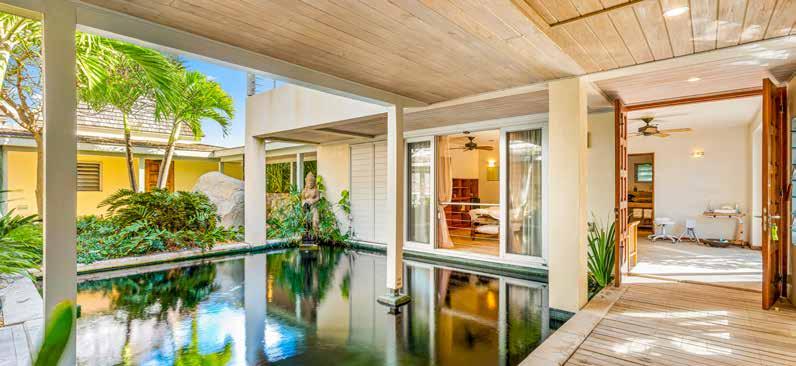
The sale of residential lots in the BVI increased significantly between 2018 and 2022, a reflection of the market responding to the stamp duty waiver for Belongers, with new sub-divisions opening up particularly on Tortola. The amount of market activity is positive for the future of construction in the BVI with a significant potential pipeline of new homes as purchasers start to build.
Chart 6 shows the distribution of residential lot sales by island. Sales on Tortola dominate the market, with 496 sales during this period which accounts for 86% of the market. Virgin Gorda (including the luxury estates) accounts for just 10% of lot sales in the BVI. The number of lot sales on Tortola increased by 193% between 2018 and 2021 before declining in 2022 once the stamp duty waiver for Belongers ended (except for first time purchasers).
Looking at the share of the total market by value and island in Chart 7, land sales within Oil Nut Bay, Little Dix Bay and Moskito Island account for 71% of total value with $126.1M in sales between 2018 and 2022. This compares to $43.2M in sales on Tortola and $4.5M in sales on Virgin Gorda, outside these three luxury sub- markets.
There was a total of 22 lot sales within the three luxury destinations which averages $5.73M per transaction compared to $138,461 per transaction on Tortola. Excluding the one sale of $44.34M at Oil Nut Bay in May 2022, the average lot sale within the three luxury destinations was $3.89M.
The data reflects the importance of residential resort developments to the overall land market in the BVI in terms of value. Land sales at Little Dix Bay commenced in the mid 2000’s while land sales at Oil Nut Bay and Moskito Island commenced in 2010 and 2012 respectively. Combined, the three developments have accounted for over $300M in land sales, generating over $36M in stamp duty for the Government.
The purchase of residential lots is dominated by Belongers, with 534 total transactions or 93% of the market compared to 43 sales to Non-Belongers which accounts for just 7% of market transactions. However, as shown in Chart 8, Non-Belongers account for 68% of the market in terms of value, spending $120.8M on the purchase of land, mainly within the three luxury developments of Oil Nut Bay, Moskito Island and Little Dix Bay Resort.
Separating out the residential lot market on Tortola, Chart 9 shows the expansion of the market from 2018 to 2021 before declining in 2022 once the stamp duty waiver programme was terminated. Despite the number of sales over this period, the average price per square foot paid for land on Tortola has only increased by 20.5% and now averages $5.22 psf.
In light of the Government’s revised interpretation of policy regarding breaches of landholding licences and the imposition of penalties, it is important to understand the impact that foreign investment has on real estate and Government revenues in the BVI. Many Caribbean destinations experienced a mini real estate boom in 2021 and 2022 as countries reopened following the pandemic. These destinations include the Turks and Caicos Islands, Cayman Islands, the Bahamas and the USVI. There was also increased interest in real estate from foreign investors in the BVI during the 2021/22 high season, although many sales that were agreed during the high season have yet to close due to the time taken to process landholding licences. However, the picture in the BVI remains one where the market is dominated by Belonger activity as the uplift in foreign investment experienced in other islands was not so evident in the BVI.
Chart 10 sets out the sale of residential land and houses to NonBelongers between 2018 and 2022 across all properties in the BVI. The data shows that there are fewer than thirty sales each year to Non-Belongers except for 2020 when there were 31 sales, 22 of which were homes. Sales to Non-Belongers declined in 2021 and 2022 with 23 and 26 sales respectively, although there may be further sales closing in 2022 once landholding licences have been approved. This data confirms that the real estate boom experienced in most Caribbean islands in 2020, 2021 and the first half of 2022 has not materialized in the same way in the BVI.
Land sales at Oil Nut Bay made up 46% of all real estate sales to Non-Belongers between 2018 and 2022. Land sales outside Oil Nut Bay account for an additional 8% of total real estate sales. The land sales at Oil Nut Bay do include the single land sale of $44.34M
which closed in May 2022 which itself contributed to 43% of land sales within Oil Nut Bay. Combined property sales within the luxury resorts of Oil Nut Bay, Moskito Island and Little Dix Bay have contributed significantly to total sales to Non-Belongers since 2015.
By analysing the data relating to house and residential lot sales to Non-Belongers, the significance of foreign investment in the BVI becomes more evident. Overall, there is relatively little foreign investment in the BVI, typically under thirty sales a year for both land and houses, with much of this investment concentrated in the three luxury resort developments on Virgin Gorda comprising Oil Nut Bay, Moskito Island and Little Dix Bay. However, each land sale and villa development introduces capital to the BVI, with money circulating in the economy and a significant contribution to Government finances through stamp duty payments.
As we close out 2022, there is considerable uncertainty about the future and how the economy will perform in 2023. With elections looming in the BVI in early 2023, the new Government will be facing many challenges, not least of which are economic pressures as countries seek to bring inflation under control, and geo-political risks which have been exacerbated by the war in Ukraine and political turmoil in the UK. While the National Unity Government is
currently focused on implementing the recommendations of the COI report, the new incoming government will need to take a broader view as it seeks to tackle many of the issues in the BVI that have been neglected, including providing proper educational facilities for students, upgrading the many infrastructure issues across the BVI and tackling crime.
Real estate markets in the US are slowing as interest rates inhibit investment which in turn will impact real estate sales in the Caribbean. We in the BVI can expect to see less real estate activity in the coming year now that the stamp duty waiver for Belongers is now restricted to first time purchasers until 21st March 2023. The new interpretation of breaches of landholding licences and the imposition of penalties by the Ministry could also have a significant impact on sales and the collection of stamp duty, as both vendors with landholding licences and foreign investors try to understand the implications of the new policy. BB
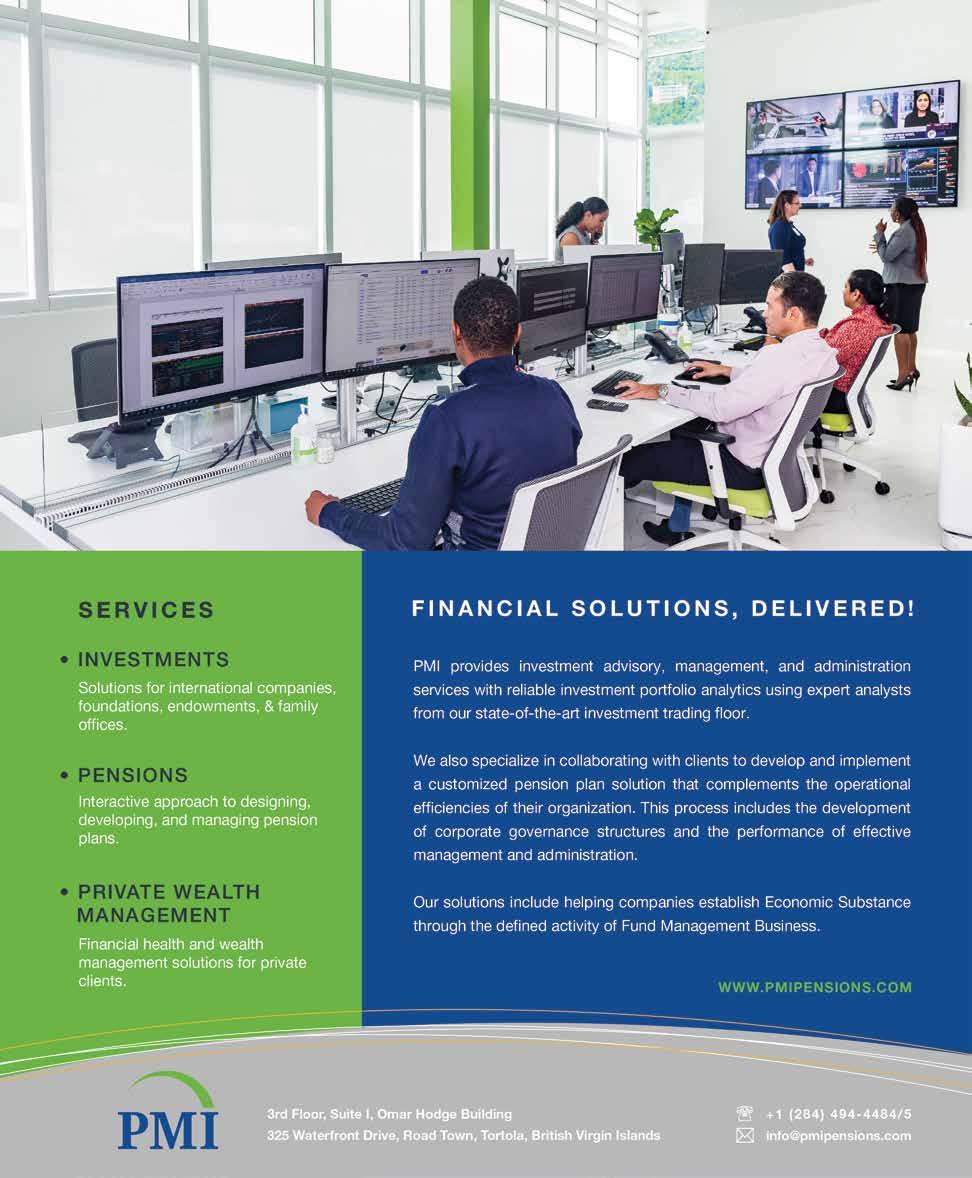

The British Virgin Islands, a series of small islands and cays located a few miles east of the US Virgin Islands and about 95 km (59 miles) east of Puerto Rico. It is part of the Leeward Islands in the Lesser Antilles. The North Atlantic Ocean lies to the east of the islands, and the Caribbean Sea lies to the west.
Tortola where the main airport and the capital Road Town are located is the largest island. Other main islands include Virgin Gorda, Anegada, and Jost Van Dyke which can be accessed from Tortola by ferry, private boat and airplane (with the exception of Jost Van Dyke).
There are two main ways to get to the British Virgin Islands. The first is to fly directly to the Terrance B. Lettsome Airport on Beef Island - Tortola (daily flights from Puerto Rico and other Caribbean Islands). The second is to fly to Cyril E. King Airport in St Thomas in the US Virgin Islands (with direct connections from the mainland United States) and then take the ferry to Tortola. There are other connections from North America and Europe via regional and local airlines out of St. Maarten, Antigua and Barbados.
The British Virgin Islands comprising of around 60 islands and with the exception of Anegada which is flat and composed of limestone and coral, most of the islands are volcanic in origin and have a hilly, rugged terrain. The highest point is Mount Sage at 521 metres (1,709 ft) above sea level located on Tortola.
The BVI has a tropical climate with year-round trade winds and average temperatures of about 28°C. Rainfall averages about 1,105 mm (43 in) per year with the wettest months on average September to November and the driest months on average are February and March. The islands are in the hurricane belt with the hurricane season running from June to November usually peaking in August, September, and October.
The BVI is self-governing overseas Territory of the United Kingdom with the Queen as the Head of State represented locally by the Governor. The Governor is responsible for external affairs, defence and internal security, the Public Service and administration of the Courts. The ministerial system of government is led by an elected Premier, a Cabinet of Ministers and the House of Assembly. The Cabinet consists of the Premier, four other Ministers and Attorney General as an ex officio member. The Cabinet is responsible for formulating and implementing policy. The House of Assembly consists of 13 elected members of which nine are tied to electoral districts and four “at large” seats.
The BVI has an independent legal and judicial system based on a combination of English Common Law and local statutes, orders and civil procedure rules
Lower level disputes and petty crimes are resolved in the Magistrates’ Court. More serious matters are dealt with in the Supreme Court (officially known as the Eastern Caribbean Supreme Court of which the BVI is a member state). Appeals from the Supreme Court lie to the Eastern Caribbean Court of Appeal and the final appeal lies to the Privy Council.
The British Virgin Islands hosts the Commercial Court of the East Caribbean Supreme Court which serves the expanding needs of commercial litigation in the Territory and the Eastern Caribbean. The court officially opened on 30th October, 2009 (although it was in operation since May 2009) and specialises exclusively in domestic and cross-border commercial and insolvency matters. It hears such matters from nine Caribbean nations and territories, including Anguilla, Antigua and Barbuda, Dominica, Grenada, Montserrat, St. Kitts and Nevis, St Vincent, St Lucia and the BVI.
The BVI is a centre for the resolution of domestic and international disputes. The British Virgin Islands’ Arbitration Act 2013 came into force on October 1st, 2014 making provisions for a modern arbitration centre. The BVI International Arbitration Centre provides neutral, efficient and reliable dispute resolution services. The state-of-the-art facilities offers a variety rooms for hearings and meetings, video and audio conferencing, interpretation and translation services and concierge services.
The population of the British Virgin Islands is estimated at over 30,000 residents. The majority of persons are of Afro-Caribbean decent. Minority ethnicities include Caucasians, East Indians, Middle Eastern, and Asian. The major force driving population growth has been immigration mainly to meet the shortage in local labour supply. Approximately 70 percent of the employed are foreigners and the Government sector is the major employer followed by the tourism industry, the financial services sector and the construction sector.
Labour relations in the BVI are governed by the Labour Code, 2010. This comprehensive piece of legislation provides for the framework for the settlement of disputes, health and welfare in the workplace, basic conditions of employment including pay, overtime, vacation and sick leave, benefits including the requirement retirement benefits. It also sets out the requirements for foreigner employment under the work permit regime.
Social Security is a compulsory insurance plan to which employers, employees, selfemployed and voluntary contributors contribute. Benefits are paid out when certain contingencies arise including sickness, maternity, and employment injury. An age benefit is paid out from 65 once the minimum contributions have been made (10 years).
Trade unions are virtually non-existent and workdays lost through industrial action are infrequent. The government has set a minimum wage of $6 per hour.
New Year’s Day
Anniversary of H. Lavity Stoutt’s Birthday
Monday, 2nd January
Monday, 6th March
Good Friday Friday, 7th April
Easter Monday Monday, 10th April
Whit Monday Monday, 29th May
Sovereign’s Birthday
Virgin Islands Day
Emancipation Monday
Emancipation Tuesday
Emancipation Wednesday
Heroes’ and Forefathers Day
Commemoration of the Great March of 1949 and Restoration of the Legislative Council (TBD)
Christmas Day
Boxing Day
Friday, 9th June
Monday, 3rd July
Monday, 7th August
Tuesday, 8th August
Wednesday, 9th August
Monday, 16th October
Monday, 27th November
Monday, 25th December
Tuesday, 26th December
Publicly provided education is free at the primary, secondary and now territory levels thereby facilitating access to all children. Education is compulsory up to the age of 16 and the Education Act, 2004 regulates all aspects of the Territory’s education system including Early Childhood Education.
The Government’s Ministry of Education operates 17 primary schools and four secondary schools, including a technical-vocational school and a school for disabled students. There are also several private primary and secondary schools; some parochial and some secular. The H. Lavity Stoutt Community College (HLSCC) is a two-year tertiary institution offering associate degrees in the areas of business, natural science, social services, hospitality, computer studies, marine studies and financial services. Through affiliations with other tertiary institutions HLSCC also offers degree and master’s programmes in various disciplines. The College also offers specialty courses based on the needs of the local labour market
Currently, primary health care is provided by Dr. D. Orlando Smith Hospital (formally the Peebles Hospital) and community health centres/clinics on Tortola and the outer islands – Virgin Gorda, Anegada and Jost Van Dyke. Access to full treatment at Dr. D. Orlando Smith Hospital from the outer islands can also be achieved when required via helicopter or ferry evacuation.
The new facilities of the Dr. D. Orlando Smith Hospital opened at the end of 2014 is a state-of-the-art facility which offers apart from emergency care, haemodialysis, medical imaging, physiotherapy and laboratory services. Additional medical services such as specialty treatments in dermatology, orthopaedics, plastic surgery, chiropractic care and dentistry are provided by a small private hospital and several private medical clinics. Patients requiring treatment services beyond the scope of the Dr. D. Orlando Smith Hospital are referred to Puerto Rico, the US Virgin Islands, Jamaica, Barbados and mainland United States.
The BVI Health Services Authority (BVIHSA) established under the BVI Health Services Authority Act, 2004 is responsible for managing the public health care service throughout the Territory including the general administration and functioning of the Dr. D. Orlando Smith Hospital and the recruitment and training of health care professionals. In September 2020, The BVIHSA achieved full accreditation with the accrediting body DNVGL (Det Norske Veritas (Norway) and Germanischer Lloyd (Germany)).
The contributory National Health Insurance (NHI) Scheme provides universal affordable health care to all BVI residents.
The BVI economy is based on two distinct economic pillars, namely Tourism and Financial Services. Growth in the tourism and the financial services industries has resulted in expansion of the construction sector, both private (residential and commercial) and public, the real estate sector (residential and commercial) and the wholesale and retail sectors. For the majority of the past decade economic growth has been positive and the BVI’s economy is one of the strongest in the Caribbean.
The BVI’s principal trading partner is the United States. The majority of imports (goods) originate from the United States including Puerto Rico and the US Virgin Islands. Similarly, the vast majority of BVI exports (in the form of services - specifically financial services and tourism) are used by United States consumers in the case of tourism and Asia in the case of financial services. The BVI is not a major exporter of goods.
With its crystal-clear waters and white sand beaches, breath-taking scenery, intricate coral formations, tranquil atmosphere and warm people the BVI is a popular destination for sports enthusiasts as well as those who want a peaceful vacation. The largest island Tortola is the major hub for most visitors and the starting point for discovering the other islands. Major attractions include the nature trails at Sage Mountain National Park on Tortola, the huge boulders at the Baths on Virgin Gorda, the pristine waters of White Bay on Jost Van Dyke, the wreck of the Rhone off Salt Island and the flamingos at Nutmeg Point on Anegada. Yearly scheduled activities which attract numerous visitors include: the Emancipation Festival in August, the Anegada Lobster Festival in November, and the BVI Spring Regatta in April.
Sailing is one of the most popular activities for tourists. The year-round trade winds and numerous islands, inlets and cays has given the BVI the title of the ‘sailing capital of the world’. Other water sports such as scuba diving, snorkelling, windsurfing, kite boarding, paddle boarding and kayaking are also extremely popular.
The BVI is also a popular port of call for major cruiseships. The Cyril B. Romney Tortola Pier Park opened in 2016 can accommodate larger cruiseships and the landside development includes shops (international brands and local treasures), restaurants and entertainment.
The Government and private sector continue to rebuild and upgrade tourist attractions and infrastructure post Hurricane Irma in 2017. Other infrastructural developments expected in the near future include upgrades to the T.B Lettsome International Airport and various ports of entry throughout the BVI.
Tourist arrival numbers were approaching pre-2017 levels at the end of 2019 with expectations for this upward trend to continue into 2020 and 2021. Unfortunately, the COVID-19 crisis has resulted in tourism numbers plummeting in 2020 and 2021. With the rebound of global travel tourism arrivals to the BVI have started to increase.
promotion of the products and services of the financial services sector is conducted by the BVI Finance.
The Financial Investigation Agency (FIA) which was launched in 2004 functions as a specialist investigative law enforcement arm of the government with the objective of curbing financial crime. Its primary focus is to investigate the BVI financial services industry and support the Virgin Islands mutual legal assistance regimes.
The BVI London Office and the BVI Asia House in Hong Kong were commissioned to establish a presence in Europe and Asia to take advantage of economic opportunities not limited to financial services and tourism.
The BVI is one of the largest centres for the incorporation of business companies with around 1 million companies incorporated since the enactment of the International Business Companies (IBC) Act in 1984. Over 360,000 are still active as of end of 2021. Because of the flexibility of its use BVI business companies have been used in a plethora of business transactions and structures including structured finance and securitisation, succession planning, IPOs and listings on stock exchanges and joint ventures etc. The incorporation regime has changed somewhat with the introduction of new company legislation – the BVI Business Companies Act, 2004 which replaced the IBC Act repealed on January 1 2007. The core features of the IBC Act which made it a success remain along with improvements to ensure the longevity of the Virgin Island’s market share. The new Act for instance widens the range of corporate vehicles available for use, simplifies the statement of capital and the registration of charges.
Effective January 2018 the incorporation fee and annual fee payable to maintain a standard company authorised to issue up to 50,000 shares increased from US$350 to US$450, and for a company authorised to issue more than 50,000 shares, from US$1,100 to US$1,200.
The BVI captive insurance market is one of the fastest growing and largest in the world with the majority of business originating from the United States. Other countries of origin include Guernsey, Taiwan, Switzerland, and areas such as the Middle East and South America. In addition to this excellent geographic spread of business, there also has been a significant distribution of captives from an industry segment standpoint. The captives cover the following industries: finance and insurance, construction, health care and retail trade. The domestic insurance market is, however, smaller in comparison. The new Insurance Act, 2008 which replaced the 1994 provides a modern structure for licensing, supervision and administration of insurance business in the Virgin Islands while simultaneously meeting international insurance standards. The Insurance Regulations 2009 which replaced the 1995 regulations provides clarity on details relating to insurance business in and from within the BVI. Both came into force on February 1st, 2010. More recently the Insurance (Amendment) Act and Regulations 2015 provide greater flexibility for captive insurers with the introduction of two new categories for captive licences.Investment Business
The growth of the financial services sector in the BVI was mainly due to the success of the International Business Company (IBC) (now known as the BVI Business Company subsequent to the enactment of new incorporation legislation – BVI Business Company Act, 2004) first unveiled 30 years ago in 1984. In later years the BVI secured business that was redirected from Panama during the Noriega regime and from Hong Kong when it was handed back to China in 1997. The Asian market thus accounts for a large portion of company incorporations in the BVI.
Modern and innovative legislation, a robust regulatory framework, clever marketing, economic and political stability, quality technology and communication facilities and a full range of legal, banking and account services have contributed significantly to the continued growth of incorporations. Closely related sectors such as captive insurance, investment business (mutual funds), trust and estate formation, company management, corporate restructuring, securitisation, insolvency and shipping and trademarks have developed. The sector is regulated by the Financial Services Commission (FSC) which is an autonomous body responsible for the licensing, regulation, supervision and inspection of all financial services business. Marketing and
The BVI is one of the premier jurisdictions for fund domiciliation and is now is regulated by the Securities and Investment Business Act (SIBA) and Regulations which came into force on 17th May, 2010 replacing the Mutual Funds Act 1996 (as amended 1997). SIBA sets out the new legislative framework under which the Financial Services Commission (FSC) regulates individuals, mutual funds and other investment related entities conducting business in and from within the BVI. Persons such as investment advisers, those dealing in investments or arranging dealings in investments, managers, custodians, those providing administration services with respect to investments, and operators of investment exchanges are now required to be licensed. SIBA introduces the authorised representative regime where all BVI funds are required to appoint an authorised representative resident in the BVI and licensed by the FSC. SIBA also provides a framework for dealing with insider trading and market abuses.
The BVI continues to update its regulatory regime to meet the needs of stakeholders. The Approved Managers Regime came into force the end of 2012 and creates a new regulatory environment for fund managers by reducing the regulatory burden under SIBA. The SIBA (Amendment), 2012 facilitates the new regulations for the Approved Managers Regime.
The most recent amendment to SIBA in 2019 and the corresponding regulations provide for the recognition and regulation of closed-ended funds by way of the Private Investment Fund. The new regime came into force on 31 December 2019.
Additionally, the FSC has created two new regulated fund categories – incubator fund and approved funds. They were created in order to provide more flexibility to smaller and start-up financial services businesses. Under the new fund categories, managers and principals of smaller, open-ended funds may be approved to conduct business within a lighter regulatory framework. The Securities and Investment Business (Incubator and Approved Funds) Regulations 2015 come into force on 1 June 2015.
The Virgin Islands is characterised as a conservative banking jurisdiction. At the end of 2021 there were 7 banking institutions licensed to operate in and from within the BVI with total assets of approximately US$2.8 billion. The domestic market is serviced by the following commercial banks which offer a wide range of competitive services: Scotia Bank (BVI) Limited now Republic Bank, First Caribbean International Bank, First Bank Virgin Islands, Banco Popular de Puerto Rico, VP Bank (BVI), the National Bank of the Virgin Islands and the Bank of Asia. The banking sector is regulated by the Financial Services Commission under the Banking and Trust Companies Act, 1990 and subsequent amendments.
Financing and money services businesses also fall under the regulatory remit of the FSC. The Financing and Money Services Act (2009) sets up the licensing and regulatory framework governing local businesses in the BVI conducting consumer financing, lending, and money payments and transfers. Subsequent legislative amendments in 2018 broaden the reach of the regime by expanding the range of licenses offered and including for more sophisticated financing arrangements utilising FinTech.
In 2020 the Government instituted a levy on money services Class A licensees that is those businesses providing money transmission services outside of the Virgin Islands (excluding banks). The 7% withholding tax applies to the gross amount being transmitted as provided for in the Financial and Money Services (Amendment) Act (2020).
The Virgin Islands boasts a modern comprehensive insolvency regime that meets the needs of the growing incorporation, investment and financial services activities in the BVI. The governing legislation, the Insolvency Act 2003, makes provisions for the licensing and regulation of insolvency practitioners a wide range of liquidation and rehabilitation alternatives, a director’s disqualification regime and the establishment of an Official Receiver’s office.
Trust Management forms a major component of financial services activity in the Virgin Islands. Revised legislation, together with the highly flexible BVI Business Company, has opened up wider markets for the BVI trust.
Trusts are formed under the Trust Ordinance 1961 (based on the English Trustee Act 1925), as updated and amended by the Trustee Amendment Act 1993 and 2003. The amendment Acts considerably modernise and update the legislation, creating a more flexible regime for trusts. Changes include provisions to make trusts more attractive in a commercial context and a new set of conflict of law rules that contain robust, comprehensive, and carefully crafted provisions to protect BVI trusts against “forced heirship” claims. In addition, the rules surrounding trust duty have been updated to make it clear what documents are subject to trust duty and how this must be paid. At the same time, rules which require
no public register of trusts in retained, thereby protecting confidentiality.
The Virgin Islands Special Trusts Act, 2003 (VISTA) is another piece of legislation which updated the trust regime. VISTA trust, overcomes many problems associated with the “prudent man of business rule”, which typically made trusts unattractive vehicles to hold assets which settlers intended trustees to retain. The Act enables a shareholder to establish a trust of his company which disengages the trustee from management responsibility and permits the company and its business to be retained as long as the directors see fit.
The majority of Virgin Island trusts are exempt from all taxes provided there are no beneficiaries resident in the BVI, and that the trust does not conduct any business in the BVI or own any land in the jurisdiction.
There is a large and sophisticated community of professional advisers on trust matters in the Virgin Islands. Companies offering trust services must be licensed under the Banks and Trust Companies Act, 1990.
The British Virgin Islands passed the Economic Substance (Companies and Limited Partnerships) Act, 2018, which addresses the European Union’s concerns about entities in financial services jurisdictions like the BVI over their ability to demonstrate “economic substance”. It came into force January 1, 2019.
The Act outlines which entities need to comply and what are their obligations. Entities that conduct ‘relevant activities’1 and ‘core income-generating activities’2 are subject to the ‘economic substance’ requirements. Relevant activities include: Banking business; Insurance business; Shipping business; Fund management business; Finance and leasing business; Headquarters business; Holding business; Intellectual property business; and Distribution and Service Centre Business.
Section 8 of the Act identifies further economic substance requirements. The Act also introduces additional reporting obligations to ascertain ongoing compliance. The BVI International Tax Authority (ITA) is the ‘competent authority’ under the Act and is responsible for enforcing the economic substance requirements. Entities must be able to show that they have an adequate level of employees and expenditure in the BVI and appropriate physical offices or premises for the core income generating activity.
The Rules (and Explanatory Notes) on Economic Substance which contains explicit information on how the economic substance requirements may be met and guidance on the interpretation of the legislation and the manner in which the ITA will carry out its obligations are now available. Additionally, the Economic Substance Portal went live on 12 June 2020 and facilitates the electronic filing of economic substance information by BVI registered agents on behalf of their clients.
The BVI’s commitment to business innovation progressed with the passing of the Financial Services (Regulatory Sandbox) Regulations, 2020. This provides the licensing, operational and regulatory environment to support innovative FinTech business initiatives. The Sandbox provides 2 clear benefits: allows FinTech businesses to test their innovations for a defined time period while permitting the FSC to access possible legal and regulatory structures that may be needed to support new financial service products. On 31 August 2020 eligible businesses could apply to the FSC for admission to the sandbox regime.
As the sailing capital of the Caribbean and an esteemed corporate domicile, the Virgin Islands is also a popular jurisdiction for the registration of ships. As a Category One Register, within the Red Ensign Group, large vessels of unlimited tonnage and mega yachts of up to 3,000 gross tons can be registered in the Territory. In both instances, the owners must be a Virgin Islands citizen, British citizen, British Overseas Territories Citizen, British subject, a British national under the Hong Kong Order 1986, a national of a European Union member state, or a body corporate incorporated in a member state of the European Union or a British possession, including the Virgin Islands. If you do not meet the nationality requirement, you may register a company in the Virgin Islands in order to register a vessel.
Registration procedure also requires the de-registration of the vessel from its current registry, a survey of the vessel and the submission of ownership documents to the Registrar of Shipping. The registration fee is $550, and an annual fee of $100 is payable to maintain registration. In addition, there will be legal fees charged by the firm you choose to assist you with registration.
A Tax Information Exchange Agreements (TIEAs) is a bilateral agreement that has been negotiated and signed between two countries to establish a formal regime for the exchange of information relating to civil and criminal tax matters. The purpose of TIEAs is to promote international co-operation in tax matters through exchange of information. TIEAs grew out of the work undertaken by the Organisation for Economic Cooperation and Development (OECD) to address the lack of effective exchange of information among financial centres. Information exchange is based on requests relating to specific criminal or civil tax matters that are under investigation.
The BVI has a long tradition of providing legal assistance to foreign regulatory and law enforcement authorities and continues to be committed to the OECD’s principles of transparency and effective exchange of information. Under the guidelines provided by the OECD and the new international tax standard emanating from the G-20 Summit in April 2009, jurisdictions are required to sign at least 12 TIEAs. To date the BVI has signed 28 TIEA’s.
The BVI has agreements with Ireland, the Netherlands, Curacao, St. Maarten, Aruba, the United States, the United Kingdom, Australia, New Zealand, France, the Faroe Islands, Greenland, China, India, Germany, Poland, Portugal, the Czech Republic, Guernsey, Isle of Man, Canada, Japan and South Korea and the Nordic group of countries Sweden, Norway, Finland, Denmark and Iceland.
The International Tax Authority (ITA), established under the Ministry of Finance, is the Competent Authority in respect of all matters relating to Tax Information exchange. It ensures that the BVI effectively exchanges tax information with other countries
under the laws of the Virgin Islands and the relevant TIEAs.
For a deeper dive, also see the section on Real Estate - The Outlook for Real Estate, which is updated for each edition. Foreigners planning to purchase property in the British Virgin Islands require a Non-Belonger Land Holding License. Agreements to purchase property are therefore made contingent upon such a license being obtained by the purchaser. Application for a Non-Belonger Land Holding License is made to the Government of the British Virgin Islands, Ministry of Natural Resources and Labour. If the application for a license relates to undeveloped or partly developed land, the applicant will be required to make a commitment to the Government of the British Virgin Islands to expend a specified sum on development within a specified time period.
The purchase of property by all persons including citizens and foreigners is subject to a Government stamp duty subsequent to transference of the property. The rate of 12% of the purchase price or appraised value whichever is higher, is payable by any foreigner and citizens are required to pay a 4%. The stamp duty on leaseholds is lower. Other costs associated with the purchasing of property in the BVI include: legal fee (usually between 1.5% to 2% of the purchase price), bank fees, 10% deposit to the seller’s agent to be held in escrow on the signing of the purchase agreement, pending acceptance and completion.
There are no restrictions on an overseas investor re-selling a developed property. The property must however, be advertised for four weeks in the local press to give any local person the opportunity to purchase the property on the same terms.
The Government introduced on 22 October 2020 the Financial Services Industry Expedited Work Permit Processing Initiative to assist in alleviating bottlenecks that existed as the BVI creates a more business friendly environment. The service is extended to businesses and their employees in the financial services industry including banks, auditing companies, insurance companies, registered agents, legal firms etc. Benefits include reduced processing timelines, online applications, remote payment of fees, and designated service for ancillary departments such as Immigration and Inland Revenue. An expedited fee of $150 is required in additional to the customary work permit processing charges. BB
Government Ministries and Departments
Central Administrative Complex
Road Town
Tortola
British Virgin Islands Website: www.bvi.gov.vg
Premier’s Office
Cutlass Tower, 3rd Floor Road Town, Tortola
Tel: (284) 468-2152
Fax: (284) 468-3294
E-mail: premieroffice@gov.vg
Ministry of Finance
RFG Building
Francis Drake Highway, Tortola
Tel: (284) 468-2144
Fax: (284) 468-3299
Email: finance@gov.vg
Ministry of Health & Social Development
Sea Meadow House, Blackburne Highway, Road Town, Tortola
Tel: (284) 852-7742
Fax: (284) 468-4412
E-mail: ministryofhealth@gov.vg
Ministry of Transportation, Works & Utilities
Manuel Reef,
Pieces of Eight, Tortola
Tel: (284) 468-2183
Fax: (284) 468-3090
Email: mcw@gov.vg
Ministry of Natural Resources, Labour and Immigration
Pusser’s Building, 3rd Floor
Lower Estate, Tortola
Tel: (284) 468-2147
Fax: (284) 468-3321
Email: nrl@gov.vg
Ministry of Education, Culture, Youth affairs, Fisheries and Agriculture
Ward’s Building, 2nd Floor
Road Town, Tortola
Tel: (284) 468-4949
Fax: (284) 468-3343
Email: mec@gov.vg
Immigration Department
2nd Floor
RJT Edifice Building
Wickham’s Cay 1, Tortola
Tel: (284) 468-4700
Fax: (284) 468-4729
E-mail: immigrationinfo@gov.vg
Labour Department
2nd Floor, Ashley Ritter Building Road Town, Tortola
Tel: (284) 468-4707/4780
Fax: (284) 468-2570
E-mail: labour@gov.vg
Statutory Bodies/ Associated Agencies
Financial Investigations Agency
Ritter House
Wickhams Cay II
Road Town, Tortola
Tel: (284) 494-1335
Fax: (284) 494-1435
E-mail: info@fiabvi.vg
Website: www.fiabvi.org
BVI Finance
Cutlass Tower, 4th Floor Road Town, Tortola
BVI Tourist Board
3rd Floor, Akara Building
Road Town, Tortola
Tel: (284) 852-6020
Fax: (284) 494-3866
E-mail: info@bvitourism.com
Website: www.bvitourism.com
The BVI Commercial Court
Old Banco Popular Building
Main Street Road Town, Tortola
Tel: (284) 468-2724
Fax: (284) 468-2729
cdecsc@gov.vg
Financial Services Commission
18 Pasea Estate Road Town, Tortola
Tel: (284) 494-1324/4190
Fax: (284) 494-5016
E-mail: commissioner@bvifsc.vg
Website: www.bvifsc.vg
Telecommunications Regulatory Commission
27 Fish lock Road
LM Business Centre 3rd Floor Road Town, Tortola
Tel: (284) 468-4165
Fax: (284) 494-6786
E-mail: contract@trc.vg
Website: www.trc.vg
Virgin Islands Shipping Registry
Ground Floor Ritter House, Wickams Cay II Road Town, , Tortola
Tel: (284) 468-9646/9499
Fax: (284) 468-2913
E-mail: vishipping.gov.vg
Website: www.vishipping.gov.vg
BVI International Arbitration Centre Ritter House Wickhams Cay II Road Town, Tortola
Tel: (284) 393-8000
E-mail: info@bviiac.org
Website: www.bviiac.org
Government Overseas Offices
BVI London Office
15 Upper Grosvernor Street London WIK 7PJ
United Kingdom
Tel: + 44 207 355 9570
BVI House Asia Suite 5106, 51/F., Central Plaza, 18 Harbour Road, Wanchai, Hong Kong
Tel: (852) 3468 8533
Fax: (852) 3107 0019
BVI Tourism Offices
New York 1 West 34th Street
Suite 302, New York, NY 10001
Tel: 800-835-8530 / 212-563-3117
Fax: 212-563-2263
E-mail: info@bvitourism.com
Los Angeles 6601 Center Drive Suite 500, Los Angeles, CA 90045
Tel: 213-304-2993
United Kingdom
15 Upper Grosvenor St., London W1K 7PJ
Tel: + 44-207-355-9585
Fax: + 44-207-355-9587
E-mail: info@bvitourism.com
Emergency Numbers
Police & Ambulance 911/311
Search & Rescue (284) 499-0911
BVI Electricity Corp (284) 494-3911/3912
Fire and Rescue (284) 494-3473
All of the information in this guide has been carefully collected and prepared, but it still remains subject to change and correction. Use these contents for general guidance only and seek extra assistance from a professional adviser with regards to any specific matters. Readers can contact the relevant authorities mentioned in this Fast Fact Guide.
Tel: (284) 852-1957
E-mail: info@bvifinance.vg
Website: www.bvifinance.vg
Health Services (284) 852-7500/394-3497
Police HQ (284) 368-5371/494-3822
Water and Sewage (284) 468-5766/499-2924

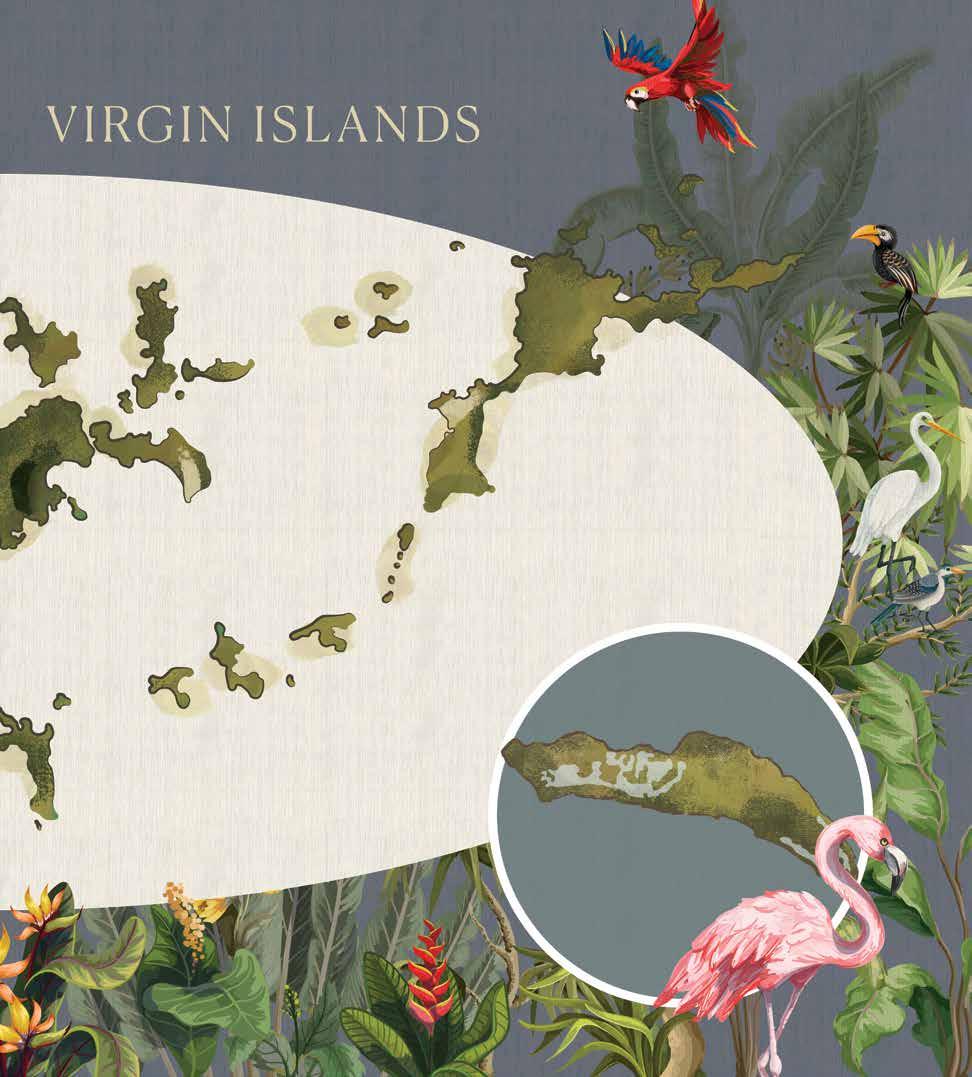

St. Bernard’s Hill House clearly has pedigree. It literally stands above the rest. It is one of the top tier villas in the BVI, an unquestionably dramatic, unforgettable and breathtaking location with endless panoramic views. A stunning 300-degree view spanning Soper’s Hole, West End, Frenchman’s Cay, the National Park on St. John, Little Thatch, Great Thatch, Jost Van Dyke and the Little Van Dykes, Sandy Cay, Sandy Spit, Smugglers Cove, Belmont and Sugar Loaf, Long Bay, Apple Bay, Carrot Bay and the sheer undisturbed beauty of Sage Mountain. Nature is delivered, with green and blue and golden sunlight as far as the eye can see.
This 8-acre 5-star one of a kind estate was recently acquired by Dr. Juleen Christopher, a Belonger and Islander raised in the islands with a rich and diverse Caribbean heritage. A cognitive behavioural research scientist by training, with some 20 years in academic medicine and the healthcare industry, Juleen has a passion that focuses on developing training and educational programs, workshops, and conferences directed at benefiting minorities.
Driven by our curiosity about Juleen’s vision for the evolution of the estate, Business BVI sat down with her in late November for an insightful and in-depth conversation about her vision for the property, her varied and most interesting career and life driven by a personal mission that is socially conscious with a globally minded equity lens. And, to learn how St. Bernard’s Hill House will help to advance her many interests.
It is hard to imagine a place more peaceful than St. Bernard’s Hill House where “Privacy is the Ultimate Luxury.”

Firstly, our congratulations are in order on the acquisition of St. Bernard’s Hill House - SBHH. Please share with us your vision for the continued development and operation of the property, which is undoubtedly one of the destination’s top tier villas. Thank you. Your congratulations are truly appreciated, and I want to emphasize that part of my mission is to make accomplishments like this by people of colour and more specifically Caribbean Islanders, unremarkable; so that these types of successes become a type of casual norm that young BVIIslanders see more often and can attain, if desired. Everything I have set out to accomplish in my adult life has been driven by a personal mission that is socially conscious with a globally minded equity lens underscored by a collaborative team approach. My Vision for St. Bernard’s Hill House is based on this personal mission and my desire is to elevate this 8-acre estate into a 5-star luxury enterprise known for its personalized interpretation of high-end luxury that translates into an unparalleled guest experience here in the BVI.
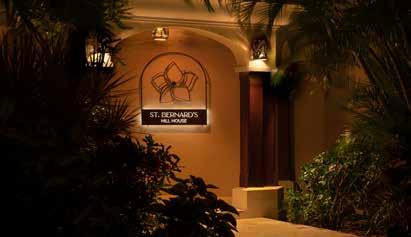
One of the dominant travel trends emanating from the pandemic was the increasing demand for destinations such as the BVI, where nature and the natural environment form the core DNA of the destination. Was this trend an influencing factor in your decision to purchase SBHH?
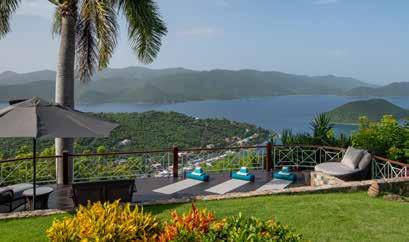
I was born and raised in the islands where I was afforded a rich and diverse Caribbean heritage fueled by my community, the culture and most importantly the land and ocean, the core of my DNA. Nature and the natural environment are at the heart of our way of life here. Caribbean people have long learned to work, play, thrive and cultivate our lives alongside nature. We learn to use only what we need and replenish where we can— so this is not a trend to me—but I am happy that others are beginning to understand and take part in this beautiful tradition and way of life.

St. Bernard’s Hill House possesses a 300-degree view that is unmatched in the entire BVI. Many people I talk with have either never visited or do not know where the British Virgin Islands are located. The BVI is a well-kept secret, and I want more people to have the opportunity to experience the joy of a very special place.
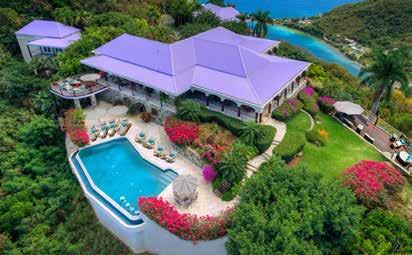
As you mentioned, travel trends are changing and at the risk of being overly simplistic, I have observed trends towards two types of travellers. There are those who may want to isolate, protected from the locals and who choose to share the local culture only when it has been Americanized or Westernized. On the other hand, there are those who want to expand their horizons, expose themselves to new cultures and, immerse themselves in the local scene. At St. Bernard’s Hill House, our highly curated guest experience is intentionally personalized to be as private or immersive as a guest desires.
Guests can enjoy the vastness of the open seas, engage in cultural activities and events, and then relax in the tranquility of the exquisite gardens here at SBHH. Whether one wants quiet solitude or a place of refuge after a day of adventure, St. Bernard’s Hill House environs are unmatched. For those who are more adventurous, SBHH captures the essence of the BVI. Regardless of your preferences, SBHH is for people who want to appreciate the remarkable beauty of this amazing island.
We are sure that you looked at several properties before deciding that SBHH was what you wanted in a villa, what you were looking for. Was there an ‘Ah Ha’ moment when you said in your mind that SBHH was it?

There is nothing like coming back to the BVI where my mother was born and raised. I smile when I recall riding my uncle Jimmy’s donkey and traversing the hills with my uncle Rinso while looking for mammee apples. It is after I became a Belonger that I started seriously looking for property in the BVI. I spent time in some amazing spots throughout the territory and have been grateful for the wonderful relationship developed with Lucienne Smith at Red Coral Properties.
It is through this connection that I was able to get an even deeper level of appreciation for all the hidden real estate treasures of the territory. And after many days of viewing properties, considering pros and cons, I still wasn’t quite sure about the two options I was considering. I think Lucienne sensed that and shared she had one more property that was a “must see” before I returned home. She was right!
The views along the driveway up to the property were spectacular and once on the veranda, I was immediately struck by the panoramic views, the quiet, the serenity, the carefully tended gardens, the vastness of nature coexisting with the villas in perfect harmony to create a complete tranquil experience. I thought, “this is the entire package!”
As an investor in the BVI notwithstanding that you are a Belonger, please tell us about the process in making this acquisition - the regulatory challenges if any and your thoughts for enhancing and improving the process?
There is an old saying that, “it takes a village” and that adage is true here too. I am grateful to my cousin, a local real estate attorney, for helping walk me through the process to complete my paperwork to become a Belonger. It would have been a challenging exercise without his professional support.
As a Belonger, I am very appreciative of the way the BVI government protects its local citizens, for example, by providing an avenue to purchase property. I was heartened by the relationships that I developed along the way with many of the locals in various sectors in the community. With any administrative process, there are always potential opportunities for streamlining and simplifying the work, but the successful acquisition of SBHH speaks to the fact that with discipline, all such challenges are manageable.
We understand that you specifically wanted to purchase a property on Tortola as opposed to another island in the BVI, say Virgin Gorda. Why Tortola?

Tortola is where my mother was born and raised. It’s where I have the most memories, fondness, and connection. I feel that Tortola is the heart of the BVI. Don’t get me wrong, I love the entire territory. Each island has its own uniqueness and beauty. I have seen countless beautiful places in the world, yet there is nothing like sailing around the BVI. I have mentioned my mother and “home” a few times here, so you won’t be surprised to know that both were central to this decision. Put differently, this was a homecoming. Choosing Tortola—or perhaps Tortola choosing me—was about coming home. Most importantly, it’s where St. Bernard’s Hill House is located and to me, it doesn’t get any better than that.
Since the acquisition you have spent a great deal of time, planning and carefully redecorating the property, more of an evolution, refreshing the property’s look and ambience. What
The panoramic views and the grounds of the estate are spectacular. Every single person who has ever experienced St. Bernard’s Hill House has been captivated by the natural beauty of the property. Many locals that I have invited to the property have commented that they “have never experienced the views of their island from this vantage point” and were amazed. Yet, the property needed a refresh. My vision was to use furnishings that would provide minimal obstruction to the enjoyment of the panoramic views. I wanted my guests to intentionally experience St. Bernard’s Hill House through their senses. I didn’t want the furnishings to compete with the natural environment. I want guests to enjoy the views and the serenity during the day and take cues from the surroundings to continue the experience at night using colour, paintings, curated scent, and the touch of luxurious linens and robes, and the branding throughout the property.
You are woman of great depth, talent and experience with a dedication to social justice and health equity. This is coupled with your formal training as a cognitive behavioural research scientist, with some 20 years in academic medicine and the healthcare industry with a passion focused on developing training and educational programs, workshops, conferences directed at benefitting minorities. Firstly, please share with our readership the source of your passion which drives you daily, and secondly, how does SBHH fit into and advance your varied interests?
This is not easy work. It takes constant grounding and determination to do it. I’m reminded by a quote shared by another remarkable Black woman. She said, something to effect of—when talking about her experience in corporate rooms and the imposter syndrome—that she had to remember that “though I stand as one, I come as 10,000.” I interpret that to mean that I bring my community, my ancestors, my parents and all the values transmitted down to me, with me into every room, into every struggle, into every opportunity. I never stand alone, and I am committed to doing what’s right.
I was raised to have deep conviction and passion for whatever work I set out to do. I was born into a very large family, the last of 10 children and a vast extended family network of uncles, aunts, cousins, nieces, nephews extending into the greats (nieces/nephews). My father was considerably older than my mother so when he died when I was 13 years old, I was devastated because I felt that I was robbed of the time that my siblings had with him.
From my teens into my early 20’s, I began to create an archetype of who I wanted to be based on the values that I observed and learned from my father: A strong work ethic and drive to be my best, to be reliable, dependable and embody the type of leadership style that inspires and fosters community.
You mentioned social justice. To me, the crux of social justice is the idea that no matter who you are, what you look like—your gender, your colour, etc. — your success should depend on your determination and ability to succeed. Your class, race, gender etc. should not be a barrier. This is what I believe—that an equitable society is one where everyone is given a fair shake to succeed, with access to the same resources, knowledge, and healthy environments (climate & otherwise), and I’m committing to making this so.
At St. Bernard’s Hill House all are welcomed. I am committed to creating a fair and equitable work environment where our team works collaboratively, and positive assumptions are made about everyone who works or stays as a guest at our property. I am keenly interested in the success of young BVI Islanders and finding collaborative, community driven solutions to help drive their accomplishments.
The success of my work in the states is driven by the shared values and goals my colleagues and investors and I have. I intend to create such partnerships with individuals from communities of colour and beyond who share similar values and have a vested interest in the success of the BVI and its people. Although we are curating a high-end luxury enterprise, we recognize that an important part of our success includes the community. Through this recognition and based on these and other values, we can provide the type of positive guest experience that will keep guests coming back on repeat. The St. Bernard’s Hill House experience is not just about the activities that we curate for our guests, but also our collaborative approach to how we make our guests feel.
Segueing to the marketing and positioning of SBHH, what are the primary market segments you are targeting and what challenges do you see on the road to success?
My goal is to bring as much attention as possible to the beauty of the BVI. There are many people who have not visited or experienced the BVI both in the US, Europe and beyond. I intend to change that. There is also a growing number of BIPOC (Black Indigenous People of Colour) individuals with the spending power who would be thrilled to enjoy SBHH. Currently, many from BIPOC communities are exploring other island nations or even Africa and have bypassed the BVI. There is a lot of meaningful history and beauty here that can capture the hearts and minds of these individuals. Additionally, many people in other parts of the globe have not been enticed enough to visit our parts. While ambitious, my desire is to increase that number even if it is by a small percentage point. Any endeavour worth undertaking is always filled with invigorating opportunities, and I think as we continue to create partnerships with the right local partners, SBHH will be even more successful.
We know that you are keen on attracting African Americans as a central part of your strategy for expanding SBHH market appeal. Clearly you bring substantial knowledge (demographics and psychographics) of this market segment to this effort as someone who operates in that space. What specific challenges do you believe you will have to address in targeting this market segment?
I am excited to find creative ways to capture the attention and trust of every potential guest willing to consider the St. Bernard’s Hill House experience. We will establish key relationship pipelines that foster trust and underscore the value of enthusiastic recommendations from these individuals. Many have ties to the Caribbean, while others are interested in supporting different segments of the Diaspora. I am exploring creative ways to help facilitate their access to the BVI and the communities within the territory.
Every business has its own unique set of complications, and as a Black, Caribbean woman I have experienced my own set of challenges, and yet through grit, determination and support from family and friends, here I am talking with you. Entering a new market always has its obstacles, but the illuminating part is the meaning derived from the opportunities that present themselves and are realized. SBHH is the antithesis of the allinclusive resort with hundreds of people who are all jammed together and completely isolated from the local population. SBHH is for everyone who considers themselves curious and adventurous. Everyone who wants to see and experience the world, to enjoy new cultures, and who want to find amazing beauty, kindness, and generosity of spirit.
The global wellness market is a growing travel segment that has seen strong pull post the pandemic, and it is one where the BVI as a destination and SBHH have great upside potential. Is this an area of opportunity for SBHH? Are you making further investment aimed at enhancing the villa’s appeal to this market segment?
Absolutely! It is hard to imagine a place more peaceful than St. Bernard’s Hill House where “Privacy is the Ultimate Luxury.” From the massage room to the warm breezes and exquisite sunsets that seem to get more beautiful with each passing,
SBHH is the perfect setting for anyone who wants to find tranquility and beauty. It’s the perfect intimate setting for corporate leadership and wellness programs with ample settings to explore and unpack a myriad of topics. We are in the process of developing specific wellness packages and retreats for those who hunger for rejuvenation.
We are aware of your involvement with adopting the Truth and Reconciliation concept in the US as a vehicle for addressing intractable societal issues. Do you see SBHH’s unique setting as a potential venue for advancing this vital work?
As I approach my 50th year alive, I become more aware of how my experiences shape the way I see the world and how those experiences hone the skills I use to make an impact. As human beings, we are all influenced by stereotypes and narratives that either encourage us to be more inclusive and accepting of differences or keep us separated and locked in a tribal mindset, because it makes us feel safe to be surrounded by people who are like us and places that are familiar.
As an accomplished woman of colour, I am keenly aware of how stereotypes and narratives can positively or adversely affect one’s life experiences. For many BIPOC people, it is a constant theme that runs through the tapestry of their lives. However, I think this is only one part of human interaction: one part of an individual’s story. Therefore, one of my goals is to do my part to undo the conditions, policies and assumptions that contribute to the global narrative which is that BIPOC people ONLY exist in a story line where they are always disadvantaged, weak, poor and should be feared. I would like to see us, as a global society, reach a point at which we can stand in our humanness and allow each other to thrive and enjoy the best parts of being alive.
I see opportunities for cultivating and tapping into the resiliency of the human potential in so many ways. At the end of the day, we are all human beings who need time and space to maybe heal, to relax, to be inspired, to enjoy our families and friends and to reflect on what matters most to us. At St. Bernard’s Hill House, we recognize that everyone has a story, and our curated experiences are meant to rejuvenate, inspire, and connect guests to the things that matter most.
Pivoting to the global economic outlook, do you see a slowing US economy as a short and near term challenge to marketing SBHH?
That’s certainly one possible scenario, and yet for our price point, I do not see this as a significant challenge. As seen in previous recessions, the upper end of the market is less affected than the lower end of the market. During the pandemic, people spent money on things rather than experiences, because getting out carried significant risk for many. Following the pandemic, people are hungry for experiences, and the entire buying behaviour of the population has made a remarkable shift. Stores are now overloaded with inventory they cannot sell, as people once again realize that spending money on experiences brings far more joy than buying things.
It’s taken over a year of careful planning and execution, and I am excited that the property is now in the five-star condition I imagined. I am grateful to both the Minneapolis based team and the BVI team that helped to coordinate and facilitate shipping, receiving and everything in between. Everyone worked extremely hard to get us to this point. The website (stbernardshillhouse.com) has been officially launched with the new photos to showcase the property as I envisioned. Although a bit late for the coming season, given the extraordinary attributes of the property, we fully expect an exciting response.
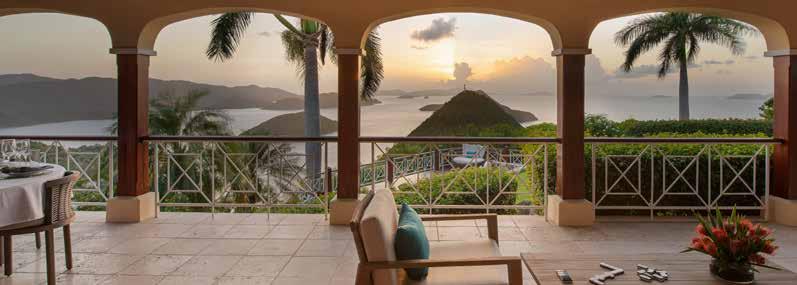
If I had to pick one thing, I would say our natural resources and more specifically, the coral reefs. Their exquisite beauty is fragile, and they are in decline around the world. It is in all our best interests to preserve our natural resources, which is a very large part of why people come to the BVI. They come to experience the sailing, diving, snorkelling and many other types of water related activities. Without our precious reefs, we might not attract as many visitors to the BVI. There is plenty in the world that can keep anyone with a pulse up at night. Regardless of where people stand on climate change, anyone who has property, especially on the southeastern coast of the US to the southernmost tip of the Caribbean, are keen to protect their investments from hurricane and other natural disasters. Other possible threats are a catastrophic economic worldwide depression or war, another COVID scenario, or even dysfunction within the local government. The ultimate challenge of any business is to turn a disaster into an opportunity. One can either become immobilized with fear or look at the Canary as a lifesaving savant and take constructive action while there is still time. BB
